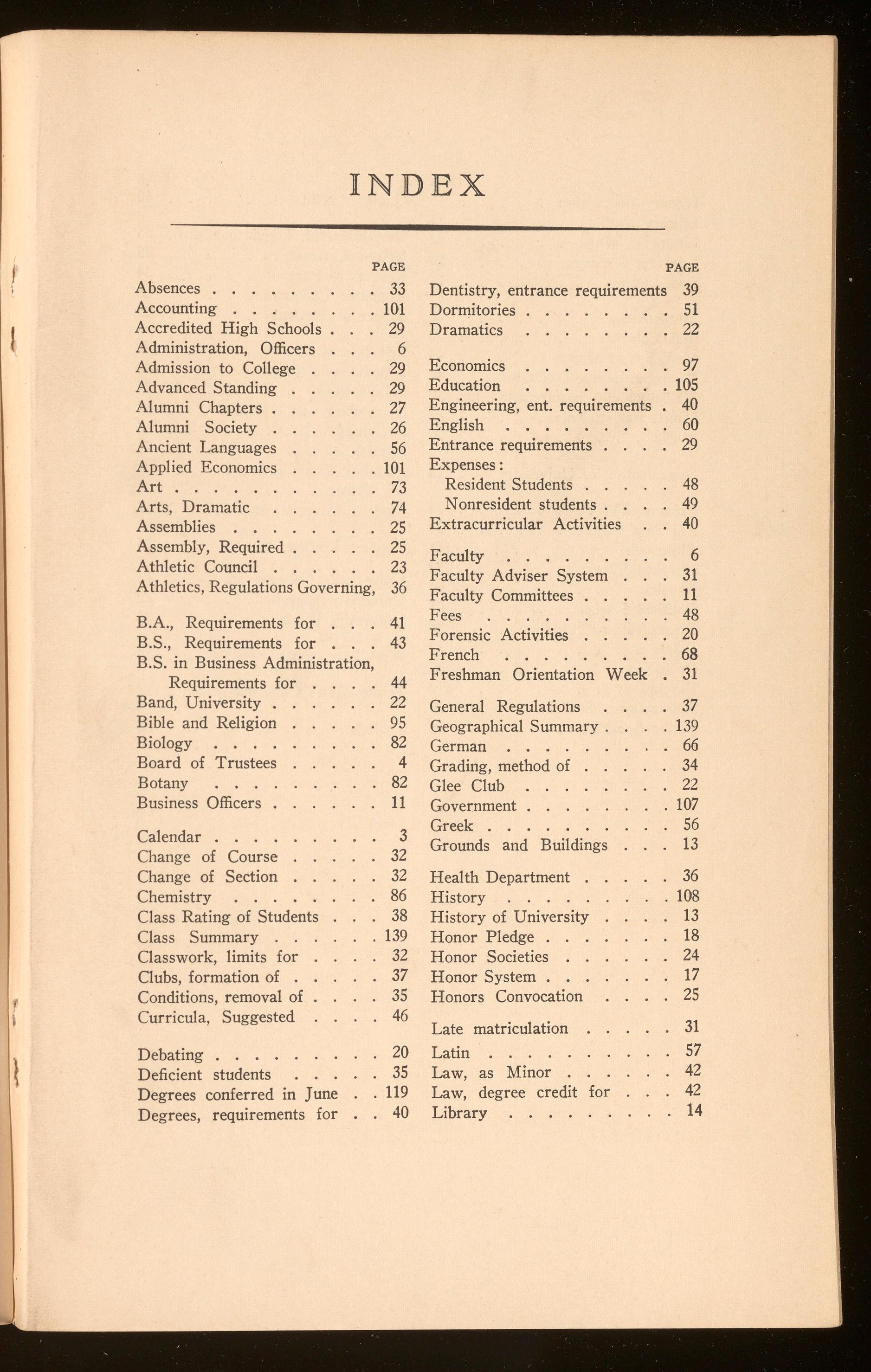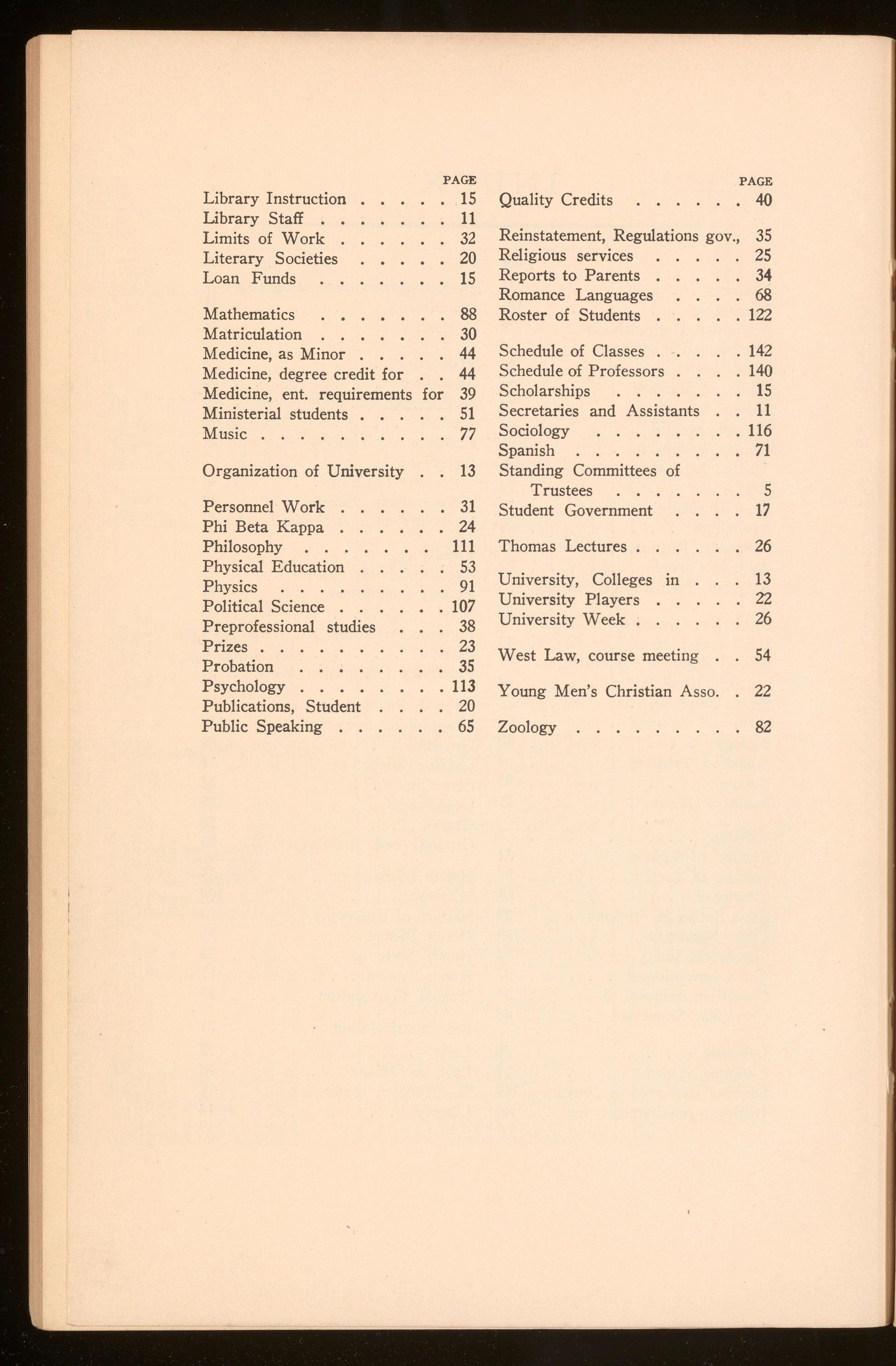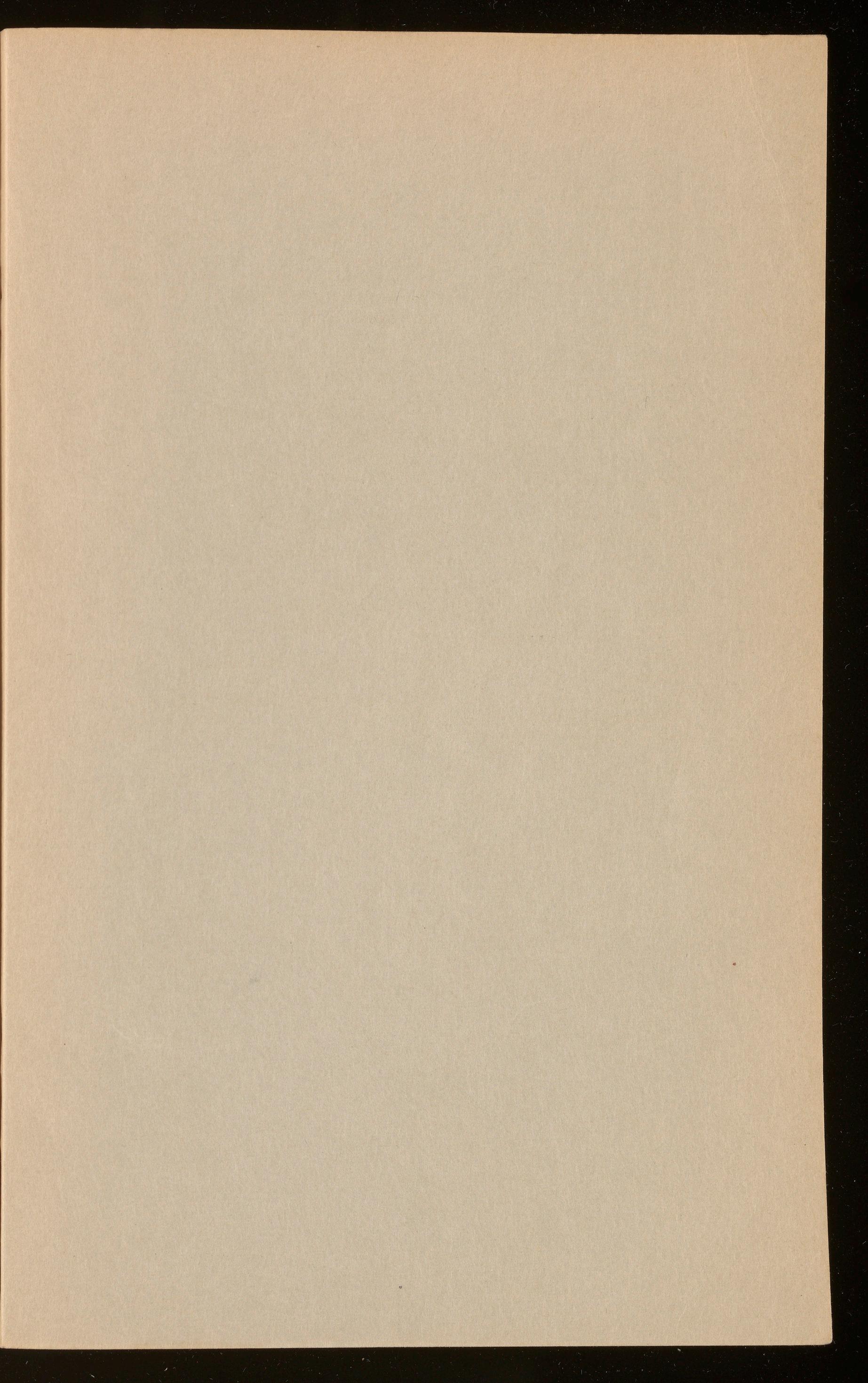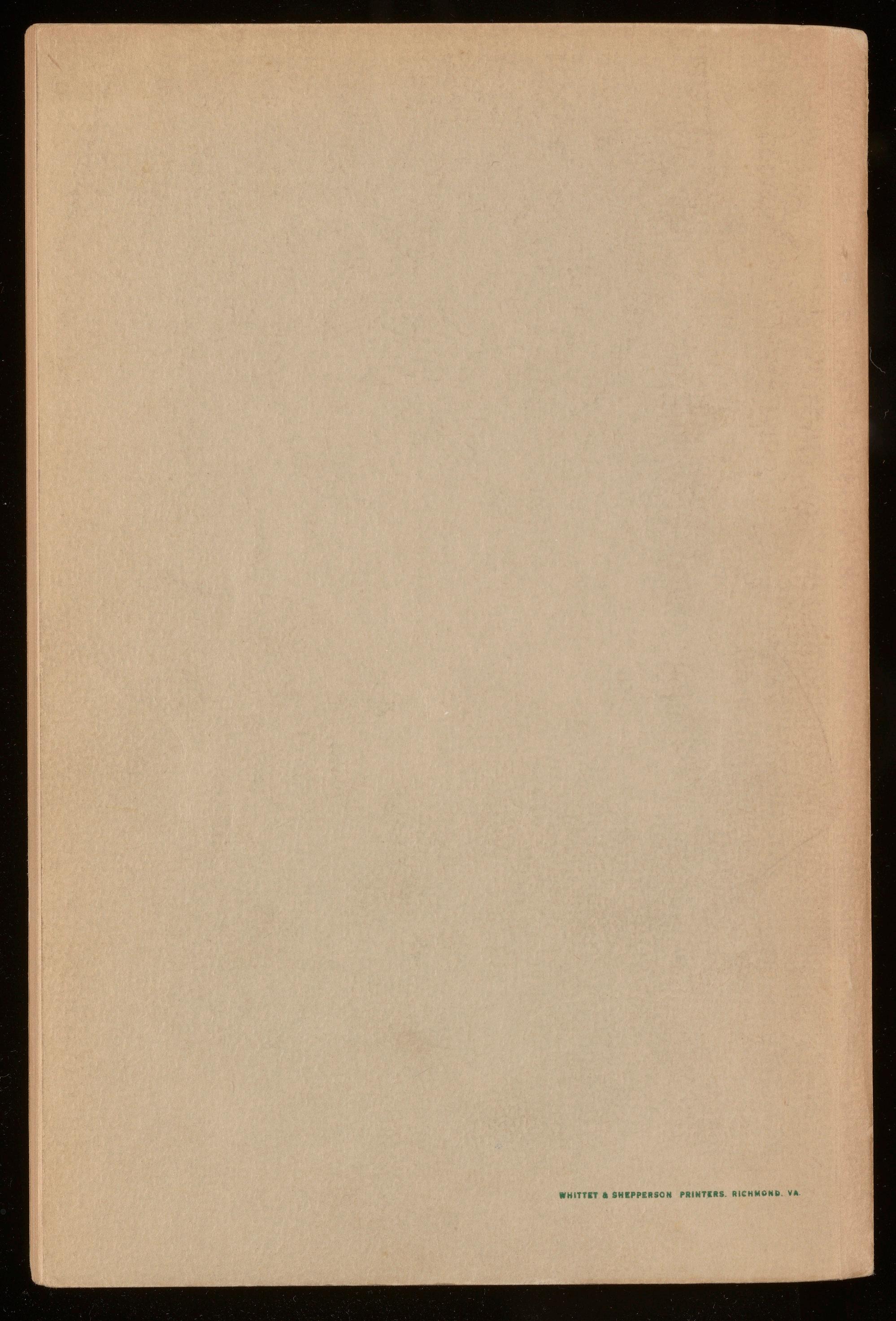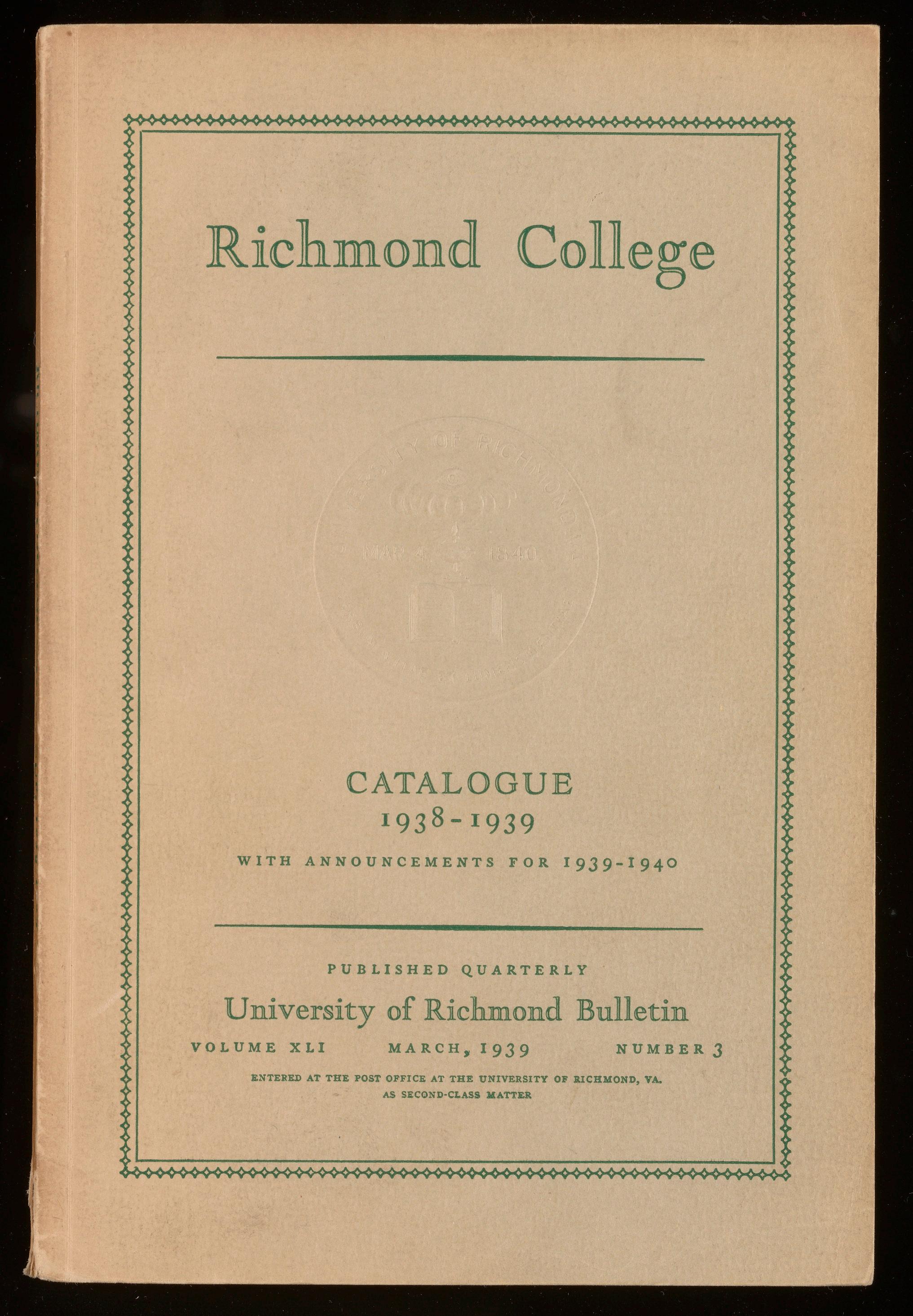
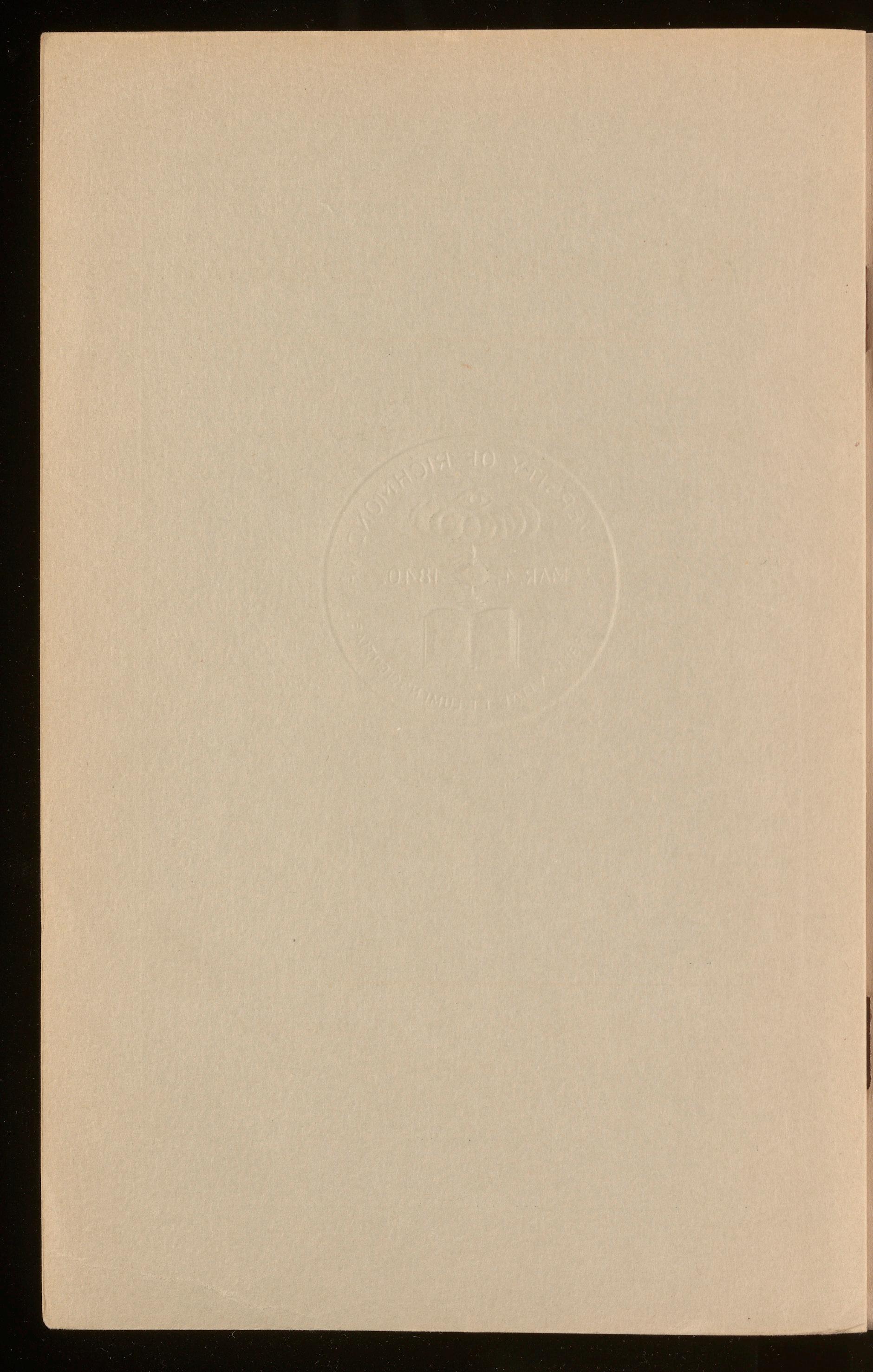



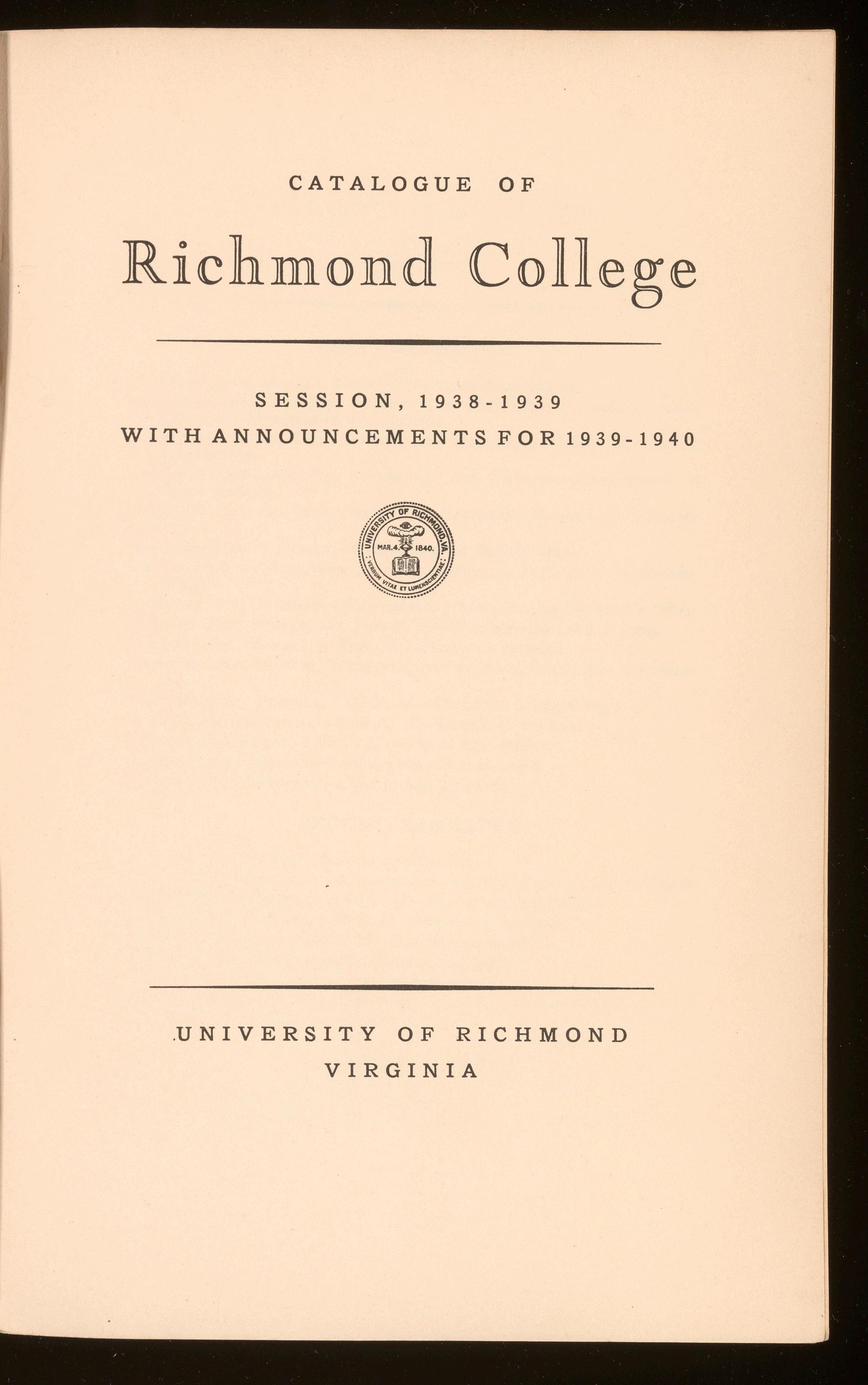
SESSION, 1938-1939 WITH ANNOUNCEMENTS FOR 1939-1940
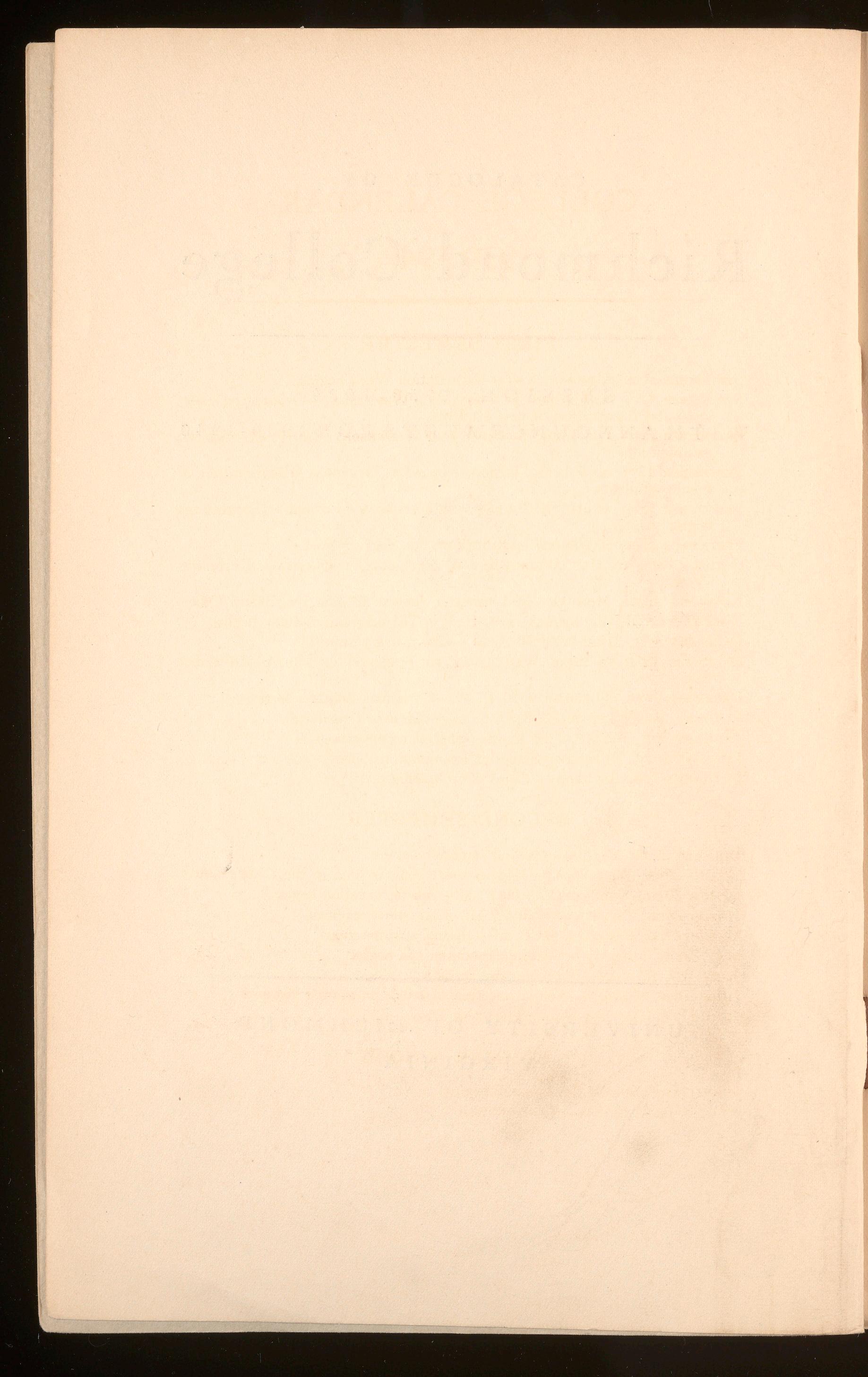
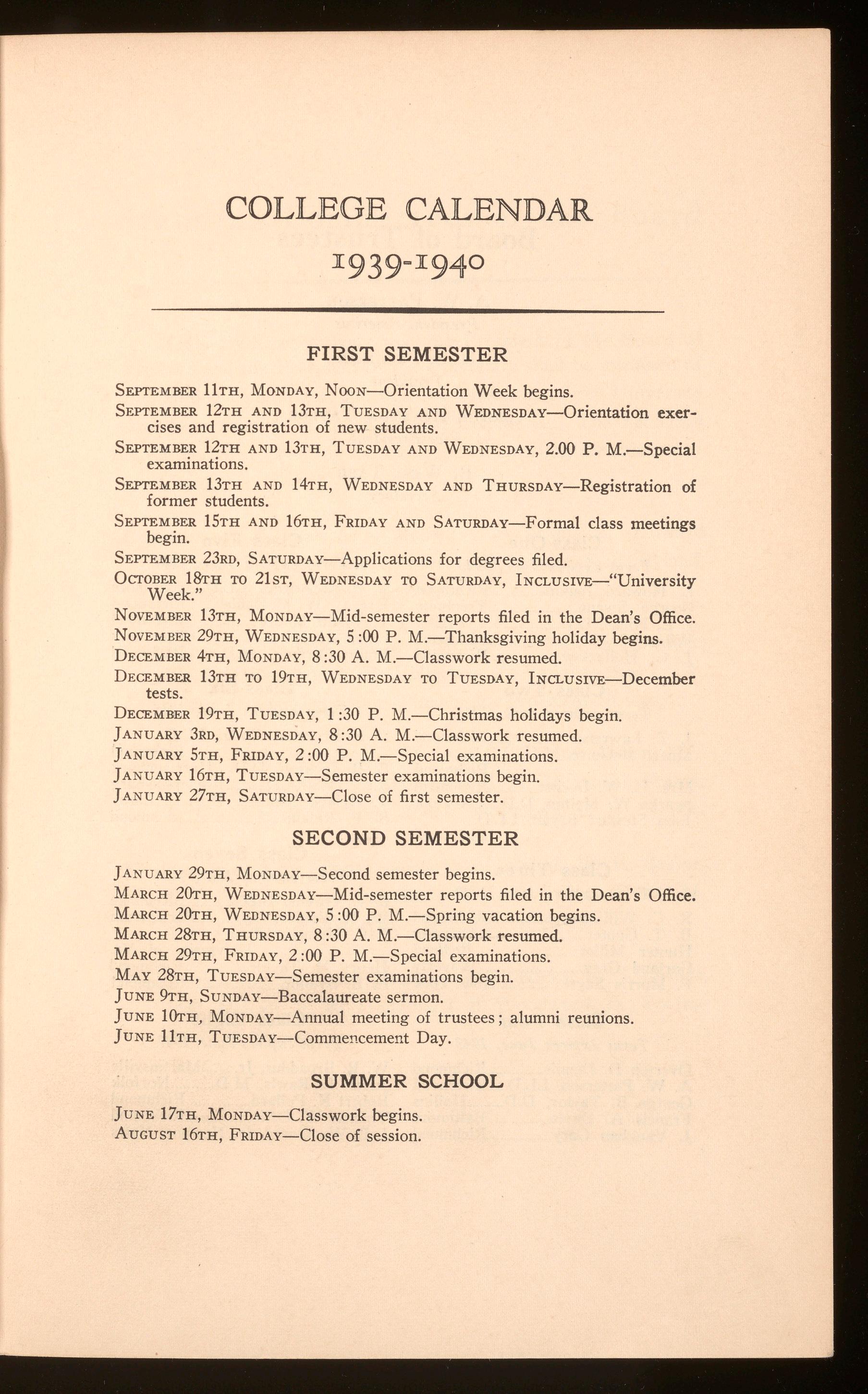
SEPTEMBER11TH, MONDAY,NOON-Orientation Week begins.
SEPTEMBER12TH AND 13TH, TUESDAY AND WEDNESDAY-Orientation exercises and registration of new students.
SEPTEMBER12TH AND 13TH, TUESDAYAND WEDNESDAY,2.00 P. M.-Special examinations.
SEPTEMBER13TH AND 14TH, WEDNESDAYAND THURSDAY-Registration of former students
SEPTEMBER15TH AND 16TH, FRIDAY AND SATURDAY-Formal class meetings begin .
SEPTEMBER23RD , SATURDAY-Applications for degrees filed.
OCTOBER18TH TO 21ST, WEDNESDAYTO SATURDAY , INCLUSIVE-"University Week."
NovEMBER 13TH, MONDAY-Mid-semester reports filed in the Dean's Office
NovEMBER29TH, WEDNESDAY , 5 :00 P. M .-Thanksgiving holiday begins.
DECEMBER4TH, MONDAY, 8 :30 A. M -Classwork resumed
D ECEMBER13TH TO 19TH, WEDNESDAYTO TUESDAY, INCLUSIVE-December tests.
DECEMBER19TH, TUESDAY, 1 :30 P . M.-Christmas holidays begin.
JANUARY 3RD, WEDNESDAY,8:30 A. M.-Classwork resumed.
JANUARY 5TH, FRIDAY , 2 :00 P. M.-Special examinations.
JA NUARY16TH, TUESDAY-Semester examinations begin
JA NUARY27TH, SATURDAY-Close of first semester.
JAN UARY29TH, MONDAY-Second semester begins.
MARCH 20TH, WEDNESDAY-Mid-semester reports filed in the Dean's Office.
MARCH 20TH, WEDNESDAY,5 :00 P M.-Spring vacation begins.
MARCH 28TH, THURSDAY,8 :30 A. M.-Classwork resumed.
MARCH 29TH, FRIDAY , 2 :00 P. M.-Special examinations.
MAY 28TH, TUESDAY-Semester examinations begin.
JUNE 9TH, SUNDAY-Baccalaureate sermon.
JUNE 10TH, MONDAY-Annual meeting of trustees; alumni reunions.
JUNE 11TH, TUESDAY-Commencement Day.
JUNE 17TH, MONDAY-Classwork begins.
AUGUST 16TH, FRIDAY-Close of session.
A. w. PATTERSON President-Emeritus
D. s. FREEMAN President
GEORGE BRAXTON TAYLOR Vice-President
B. WEST TABB Secretary
Class One
Tenn expires '1,ne, 1940
L. Howard J enkins ............Richmond
George Swann Trenholm
J. E. Hicks, D D Bristol
Wilmer L. O'Flaherty Richmond
J. G. Holtzclaw . ................Richmond
Class Two
Tenn expires June, 1941
J. T. Lawrence ....................Richmond
Stuart McGuire, M.D., LL.D. Richmond
Mrs. H. W. Decker ...Richmond
Sparks W. Melton, D.D Norfolk
John Stewart Bryan, LL.D. Richmond
Class Three
Term expires June, 1942
R. C. Williams ....................Richmond
B. T. Gunter ..........................Accomac
Hunter Miller Bedford
Garland Gray ....................Waverly
F. Morris Sayre New York
Class Four
Term expires June, 1943
Overton D. Dennis ..............Richmond
A. W. Patterson, LL.D .. Richmond
George B. Taylor, D.D Hollins
Francis A. Davis .. .........Baltimore
J. Vaughan Gary Richmond
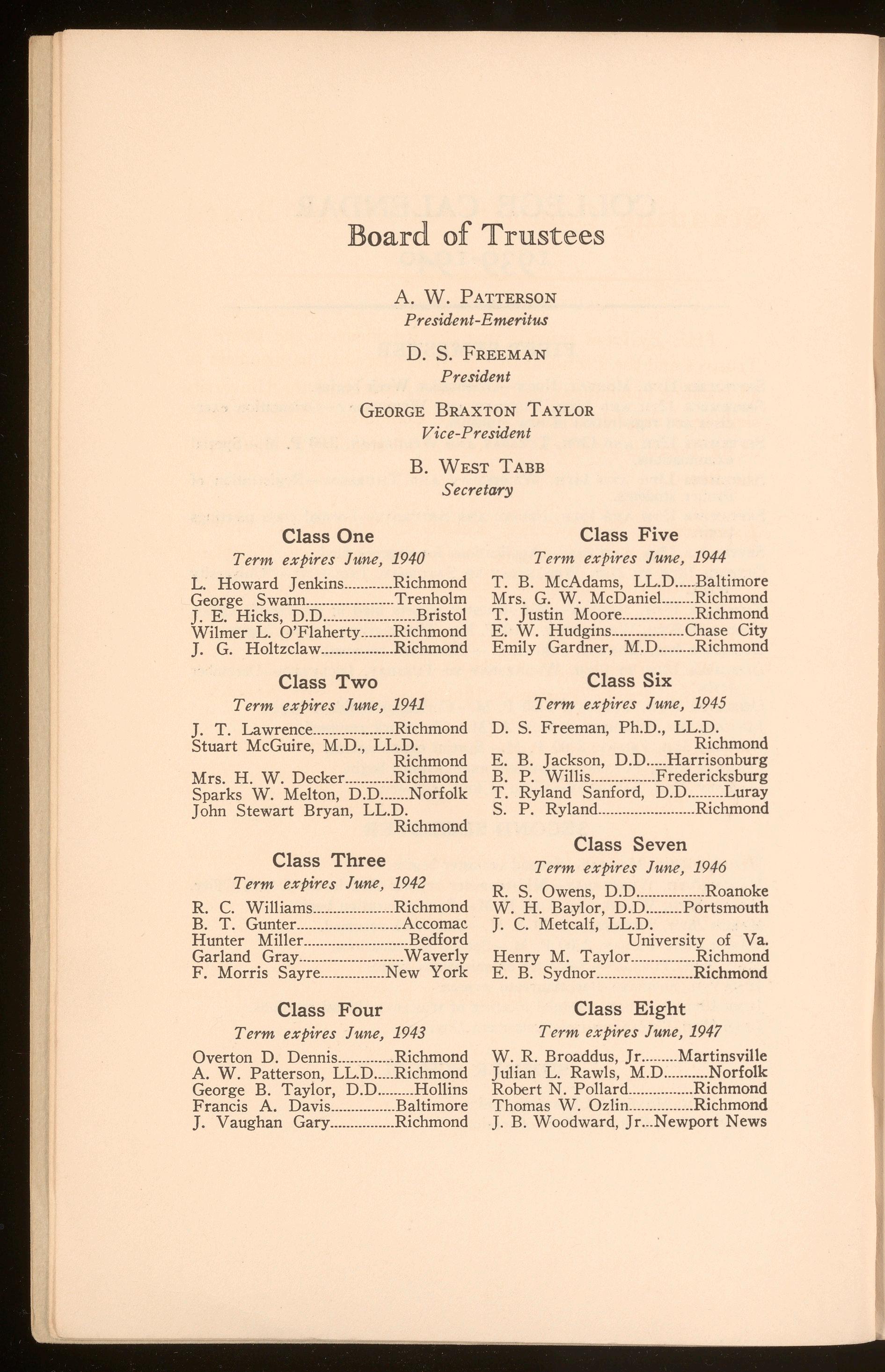
Class Five
Term expires June, 1944
T. B. McAdams, LL.D .....Baltimore
Mrs. G. W. McDaniel... .....Richmond
T. Justin Moore Richmond
E. W. Hudgins ..................Chase City
Emily Gardner, M.D .... ..Richmond
Class Six
Term expires June, 1945
D. S. Freeman, Ph.D., LL.D. Richmond
E. B. Jackson, D.D .....Harrisonburg
B. P. Willis Fredericksburg
T. Ryland Sanford, D.D .........Luray
S. P. Ryland Richmond
Class Seven
Tenn expires June, 1946
R. S. Owens, D.D Roanoke
W. H. Baylor, D.D Portsmouth
J. C. Metcalf, LL.D.
University of Va.
Henry M Taylor ................Richmond
E. B. Sydnor ........................Richmond
Class Eight
Term expires June, 1947
W. R. Broaddus, Jr ...... Martinsville
Julian L. Rawls, M.D Norfolk
Robert N. Pollard . ...Richmond
Thomas W. Ozlin .Richmond
J. B. Woodward, Jr ...Newport News
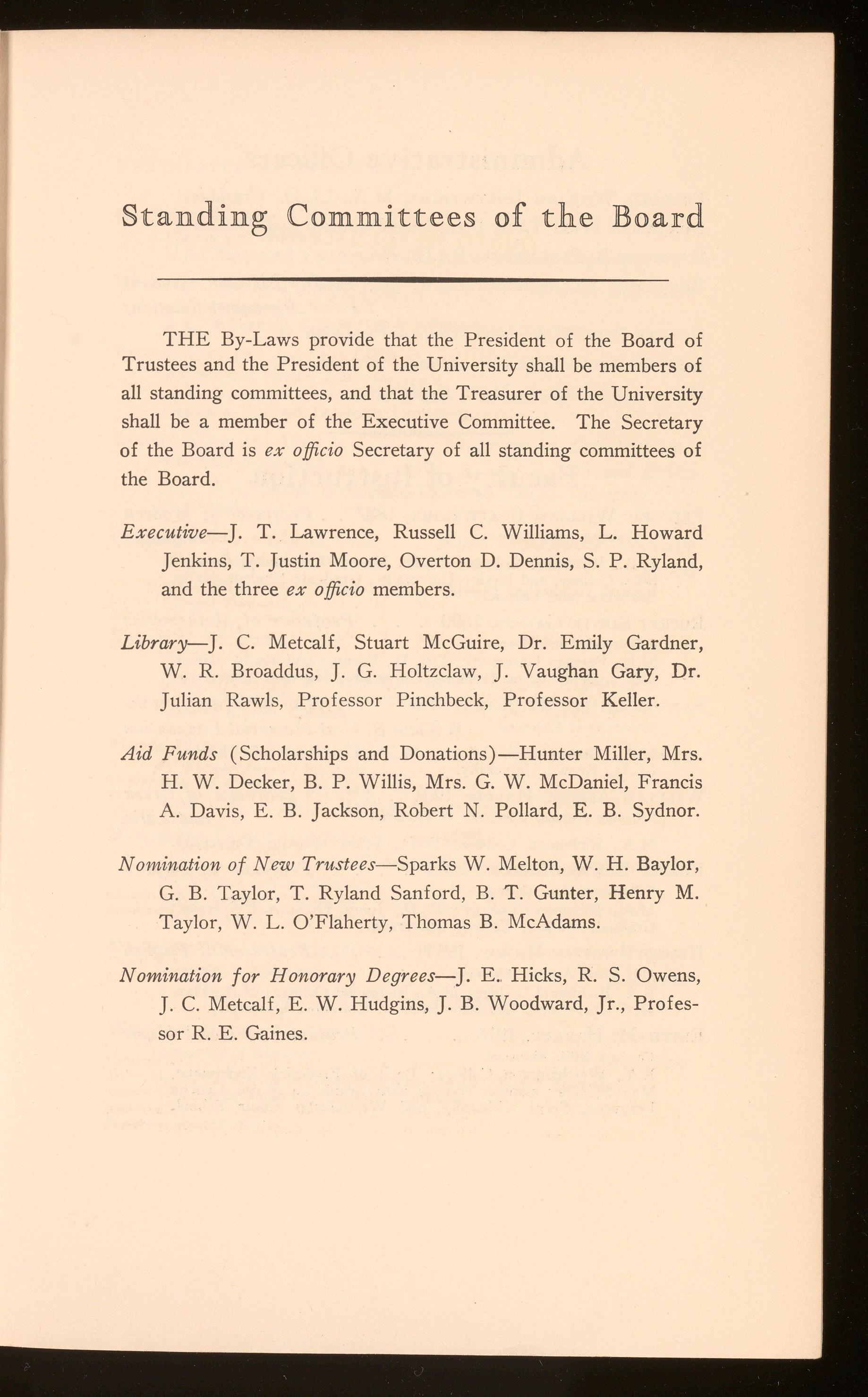
THE By-Laws provide that the President of the Board of Trustees and the President of the University shall be members of all standing committees, and that the Treasurer of the University shall be a member of the Executive Committee. The Secretary of the Board is ex officio Secretary of all standing committees of the Board.
Executive-]. T. Lawrence, Russell C. Williams, L. Howard Jenkins, T. Justin Moore, Overton D. Dennis, S. P. Ryland, and the three ex officio members.
Library-]. C. Metcalf, Stuart McGuire, Dr. Emily Gardner, W. R. Broaddus, J. G. Holtzclaw, J. Vaughan Gary, Dr. Julian Rawls, Professor Pinchbeck, Professor Keller.
Aid Funds (Scholarships and Donations)-Hunter Miller, Mrs. H. W. Decker, B. P. Willis, Mrs. G. W. McDaniel, Francis A. Davis, E. B. Jackson , Robert N. Pollard, E. B . Sydnor.
Nomination of New Trustees-Sparks W. Melton, W. H. Baylor, G. B. Taylor, T. Ryland Sanford, B. T. Gunter, Henry M. Taylor, W. L. O ' Flaherty, Thomas B. McAdams .
Nomination for Honorary Degrees- J. E .. Hicks, R. S. Owens, J. C. Metcalf, E . W. Hudgins, J. B. Woodward, Jr., Professor R. E. Gaines.
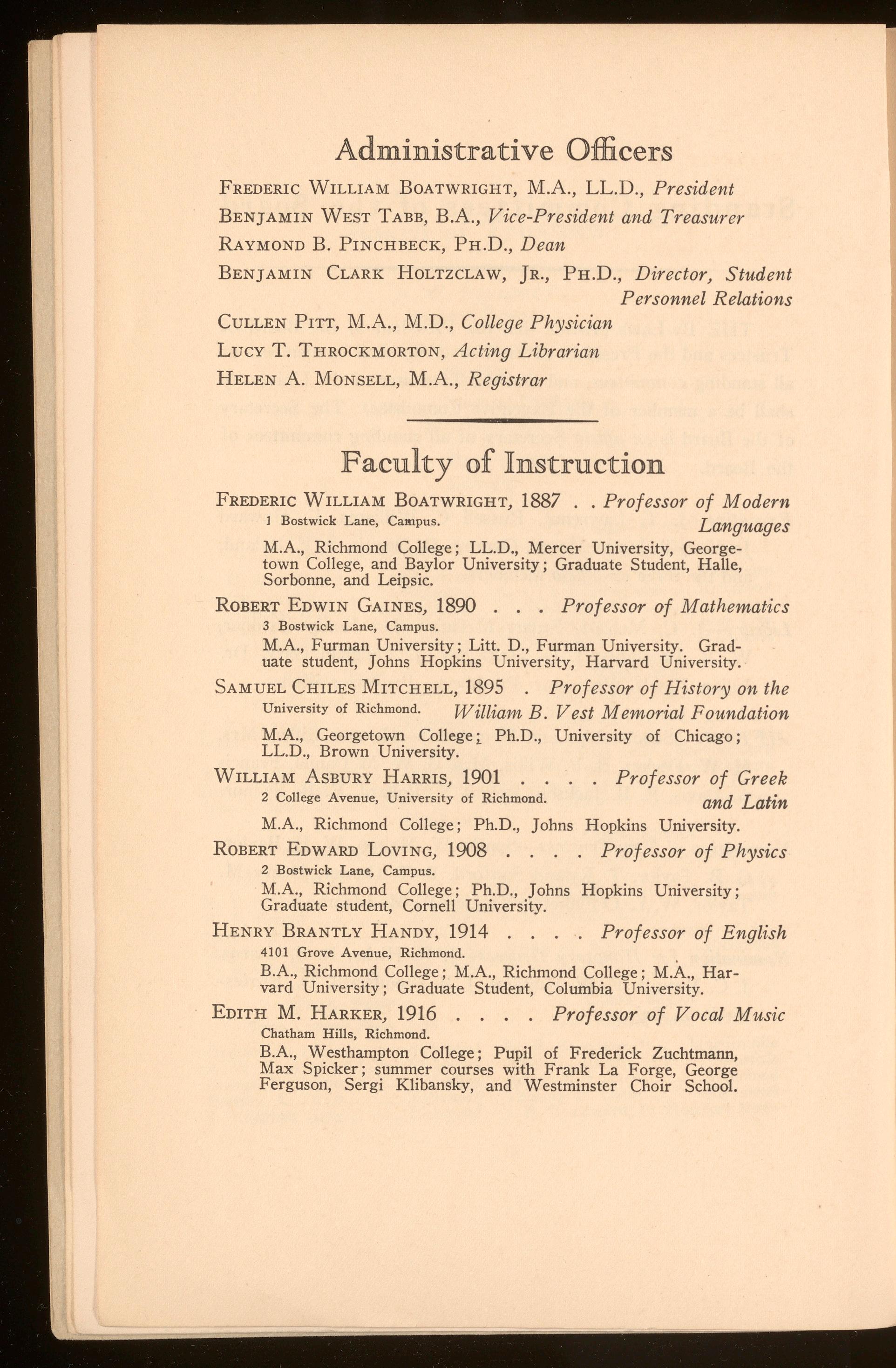
FREDERIC WILLIAM BOATWRIGHT, M.A., LLD., President
BENJAMIN WEST TABB, B.A., Vice-President and Treasurer
RAYMOND B. PINCHBECK, PH.D., Dean
BENJAMIN CLARK HOLTZCLAW, JR., PH.D., Director, Student Personnel Relations
CULLEN PITT, M.A., M.D., College Physician
Lucy T. THROCKMORTON, Acting Librarian
HELEN A. MoNSELL, M.A., Registrar
FREDERIC WILLIAM BOATWRIGHT, 1887 .. Professor of Modern J Bostwick Lane, Campus. Languages
M.A., Richmond College; LL.D., Mercer University, Georgetown College, and Baylor University; Graduate Student, Halle, Sorbonne, and Leipsic.
ROBERT EDWIN GAINES, 1890 . . Professor of Mathematics 3 Bostwick Lane, Campus.
M.A., Furman University; Litt. D., Furman University. Graduate student, Johns Hopkins University, Harvard University.
SAMUEL CHILES MITCHELL, 1895 Professor of History on the University of Richmond. w illiam B. Vest Memorial Foundation
M.A., Georgetown College~ Ph.D., University of Chicago; LL.D., Brown University.
WILLIAM ASBURY HARRIS, 1901
2 College Avenue, University of Richmond. Professor of Greek and Latin M.A., Richmond College; Ph.D., Johns Hopkins University.
ROBERT EDWARD LOVING, 1908 Professor of Physics 2 Bostwick Lane, Campus.
M.A., Richmond College; Ph.D., Johns Hopkins University; Graduate student, Cornell University.
HENRY BRANTLY HANDY, 1914 Professor of English 4101 Grove Avenue, Richmond.
B.A., Richmond College ; M.A., Richmond College ; M.A., Harvard University; Graduate Student, Columbia University.
EDITH M. HARKER, 1916 Professor of Vocal Music Chatham Hills, Richmond.
B.A., Westhampton College; Pupil of Frederick Zuchtmann, Max Spicker; summer courses with Frank La Forge, George Ferguson, Sergi Klibansky, and Westminster Choir School.
GARNETT RYLAND, 1917 Professor of Chemistry University of Richmond.
M.A., Richmond College; Ph.D., Johns Hopkins University.
WILLIAM LOFTIN PRINCE, 1920 . . Professor of Education 2423 Grove Avenue, Richmond.
B.A., Richmond College; M.A., Columbia University.
ROBERT COLLINS ASTROP, 1920 . . Professor of Psychology 343 Albemarle Avenue, Richmond.
A. B., Randolph-Macon College; M.A., Univer1,ity of Virginia; Graduate Student, Columbia University.
ROLVIX HARLAN, 1922 University of Richmond.
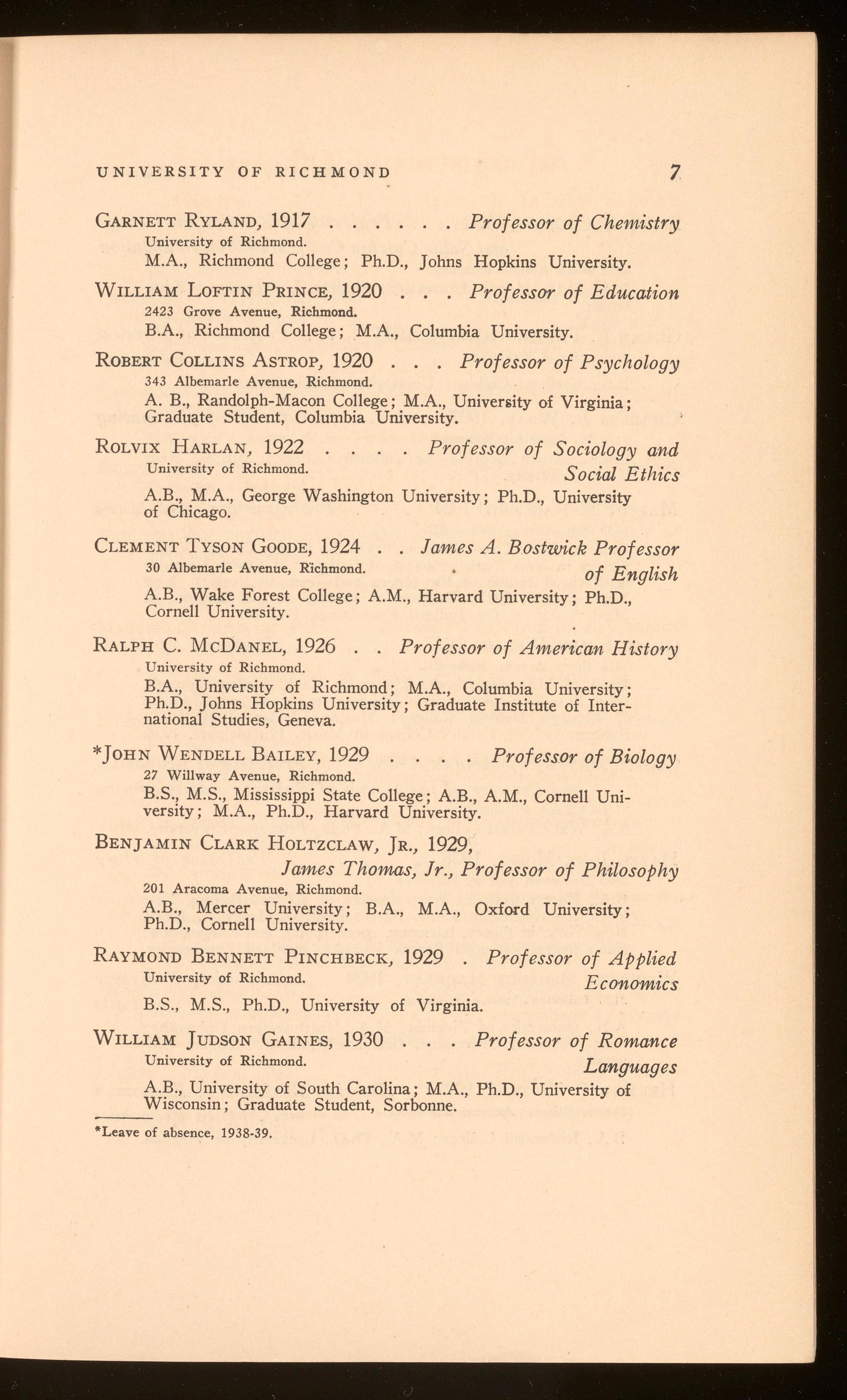
Professor of Sociology and Social Ethics
A.B., M.A., George Washington University; Ph.D., University of Chicago.
CLEMENT TYSON GOODE, 1924 .. James A. Bostwick Professor 30 Albemarle Avenue, Richmond. of English
A.B., Wake Forest College; A.M., Harvard University; Ph.D., Cornell University.
RALPH C. McDANEL, 1926 . Professor of American History University of Richmond.
B.A., University of Richmond; M.A., Columbia University; Ph.D., Johns Hopkins University; Graduate Institute of Inter- national Studies, Geneva.
*JOHN WENDELL BAILEY, 1929 Professor of Biology 27 Willway Avenue, Richmond.
B.S., M.S., Mississippi State College; A.B., A.M., Cornell University; M.A., Ph.D., Harvard University.
BENJAMIN CLARK HOLTZCLAW, JR., 1929, James Thomas, Jr., Professor of Philosophy 201 Aracoma Avenue, Richmond.
A.B., Mercer University; B.A., M.A., Oxford University; Ph.D., Cornell University.
RAYMOND BENNETT PINCHBECK, 1929 University of Richmond.
B.S., M.S., Ph.D., University of Virginia. Professor of Applied Economics
WILLIAM JunsoN GAINES, 1930 Professor of Romance University of Richmond. Languages
A.B., University of South Carolina; M.A., Ph.D., University of Wisconsin; Graduate Student, Sorbonne.
*Leave of absence, 1938-39.
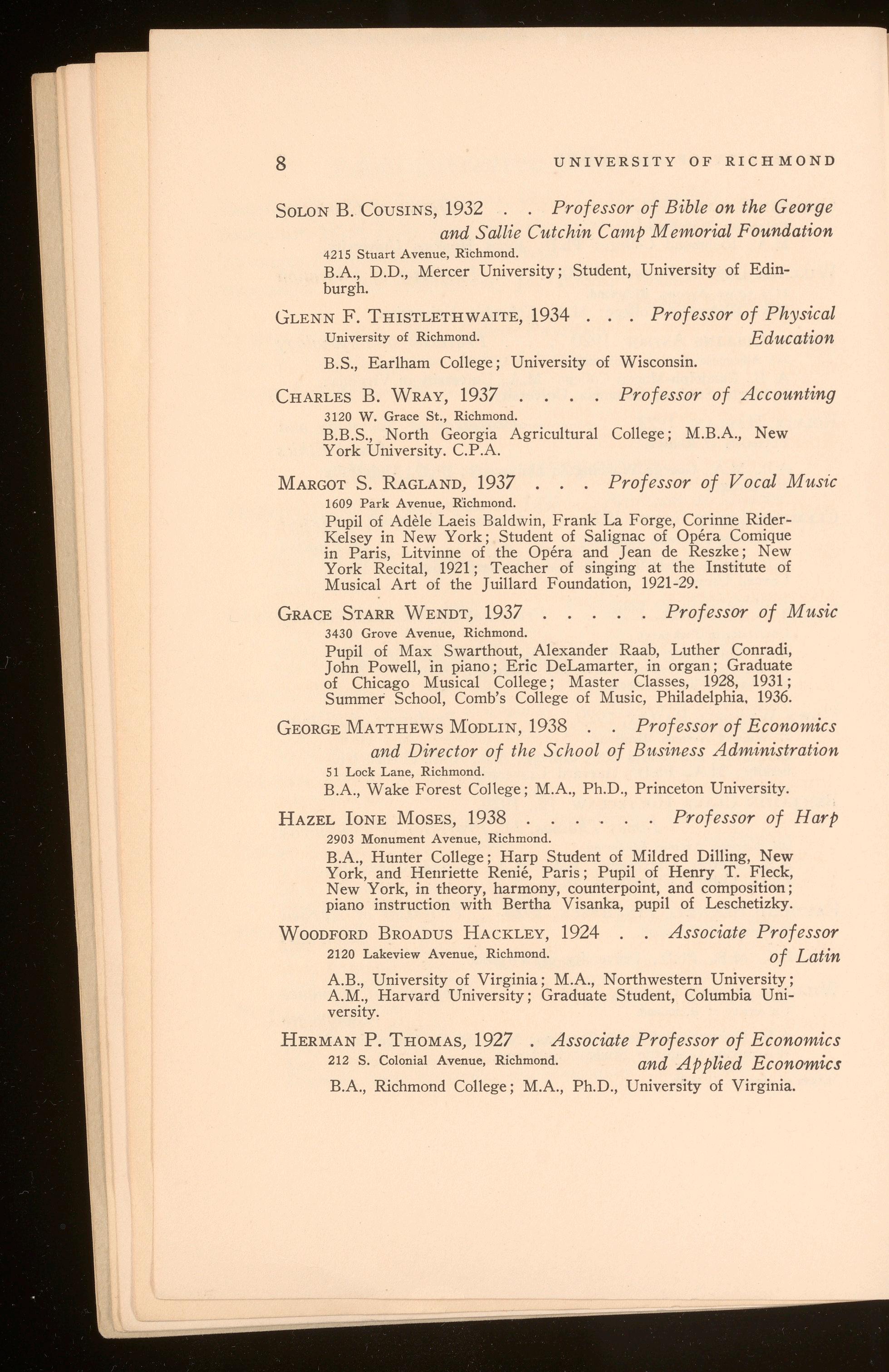
SOLON B. Cousrns, 1932 Professor of Bible on the George and Sallie Cutchin Camp Memorial Foundation
4215 Stuart Avenue, Richmond.
B.A., D.D., Mercer University; Student, University of Edinburgh.
GLENN F. THISTLETHWAITE, 1934 Professor of Physical University of Richmond. Education
B.S., Earlham College; University of Wisconsin.
CHARLES B. WRAY, 1937 Professor of Accounting
3120 W. Grace St ., Richmond.
B.B.S., North Georgia Agricultural College; M.B.A., New York University. C.P.A.
MARGOT S. RAGLAND, 1937 Professor of Vocal Music 1609 Park Avenue, Richmond.
Pupil of Adele Laeis Baldwin, Frank La Forge, Corinne RiderKelsey in New York; Student of Salignac of Opera Comique in Paris, Litvinne of the Opera and Jean de Reszke; New York Recital, 1921; Teacher of singing at the Institute of Musical Art of the Juillard Foundation, 1921-29.
GRACE STARR WENDT, 1937 Professor of Music 3430 Grove Avenue, Richmond.
Pupil of Max Swarthout, Alexander Raab, Luther Conradi, John Powell, in piano; Eric DeLamarter, in organ ; Graduate of Chicago Musical College; Master Classes, 1928, 1931 ; Summer School, Comb's College of Music, Philadelphia, 1936.
GEORGE MATTHEWS M 'oDLIN, 1938 Professor of Economics and Director of the School of Business Administration
51 Lock Lane, Richmond.
B.A., Wake Forest College; M.A., Ph.D., Princeton University.
HAZEL loNE MOSES, 1938 Professor of Harp 2903 Monument A venue, Richmond
B.A., Hunter College; Harp Student of Mildred Dilling, New York, and Henriette Renie, Paris ; Pupil of Henry T. Fleck, New York, in theory, harmony, counterpoint, and composition; piano instruction with Bertha Visanka, pupil of Leschetizky.
WooDFORD BROADUS HACKLEY, 1924 Associate Professor 2120 Lakeview Avenue, Richmond. of Latin
A.B., University of Virginia; M.A., Northwestern University; A.M., Harvard University; Graduate Student, Columbia University.
HERMAN P. THOMAS, 1927 . Associate Professor of Economics
212 s. Colonial Avenue, Richmond. and Applied Economics
B.A., Richmond College; M.A., Ph.D., University of Virginia.
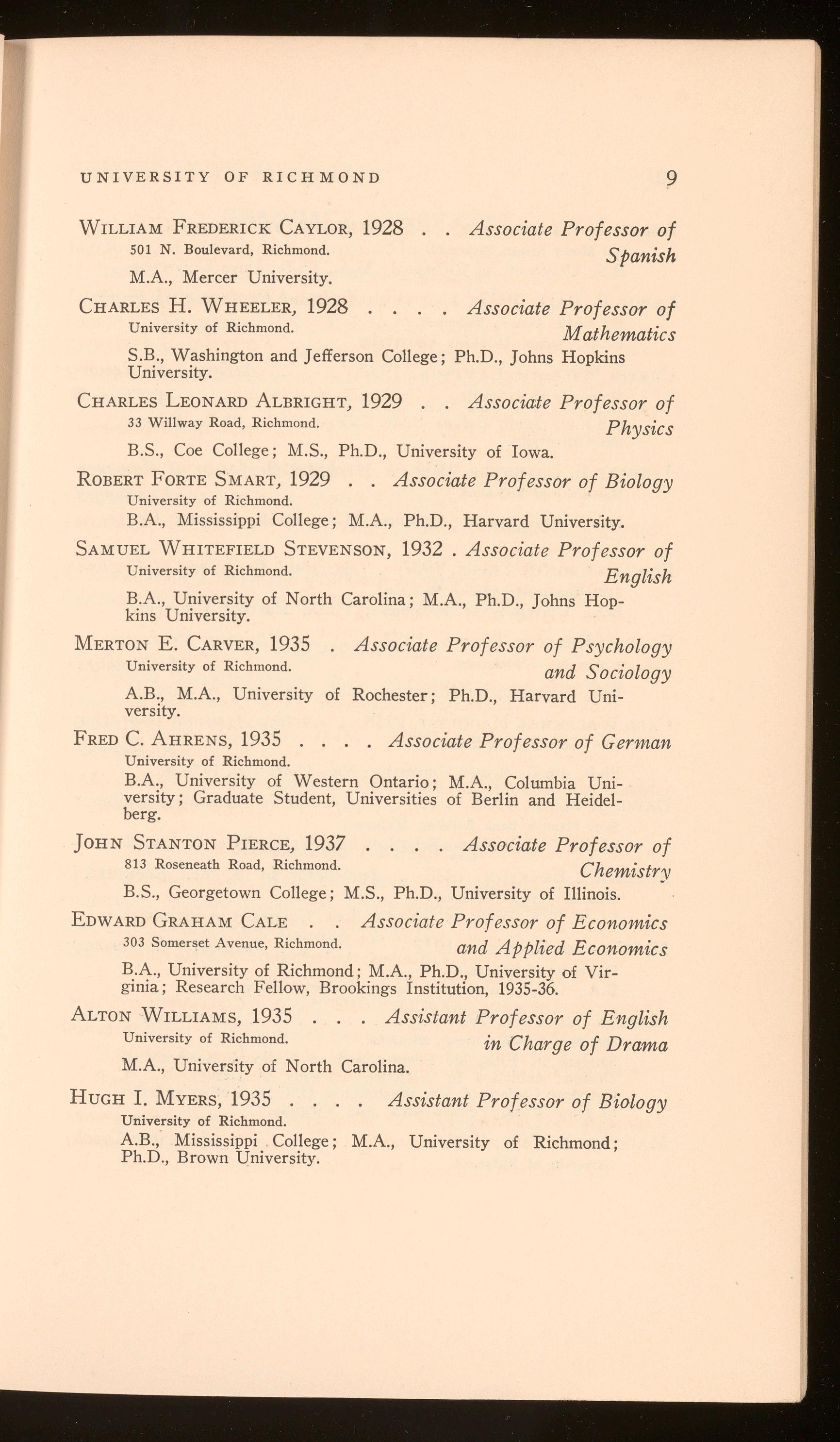
WILLIAM FREDERICK CAYLOR, 1928
501 N. Boulevard, Richmond. Associate Professor of Spanish
M.A., Mercer University.
CHARLES H. WHEELER, 1928 University of Richmond. Associate Professor of Mathematics
S.B., Washington and Jefferson College; Ph.D., Johns Hopkins University.
CHARLES LEONARD ALBRIGHT, 1929 . . Associate Professor of Physics 33 Willway Road, Richmond.
B.S., Coe College; M.S., Ph.D., University of Iowa.
ROBERT FORTE SMART, 1929 . . Associate Professor of Biology University of Richmond.
B.A., Mississippi College; M.A., Ph.D., Harvard University.
SAMUEL WHITEFIELD STEVENSON, 1932 . Associate Professor of University of Richmond English
B.A., University of North Carolina; M.A., Ph.D., Johns Hop- kins University.
MERTON E. CARVER, 1935 University of Richmond. Associate Professor of Psychology and Sociology
A.B., M.A., University of Rochester; Ph.D., Harvard Uni- versity.
FRED C. AHRENS, 1935 . . . . Associate Professor of German University of Richmond.
B.A., University of Western Ontario; M.A., Columbia Uni- versity; Graduate Student, Universities of Berlin and Heidel- berg.
JOHN STANTON PIERCE, 1937
813 Roseneath Road, Richmond. Associate Professor of Chemistry
B.S., Georgetown College; M.S., Ph.D., University of Illinois.
EDWARD GRAHAM CALE Associate Professor of Economics
303 Somerset Avenue, Richmond and Applied Economics
B.A., University of Richmond; M.A., Ph.D., University of Vir- ginia; Research Fellow, Brookings Institution, 1935-36.
ALTON WILLIAMS, 1935 Assistant Professor of English University of Richmond in Charge of Drama
M.A., University of North Carolina.
HUGH I. MYERS, 1935 . Assistant Professor of Biology University of Richmond.
A.B., Mississippi College; M.A., University of Richmond; Ph.D ., Brown University.
ABRAM I. WHITENFISH, 1935 . Assistant Professor of Chemistry 900 Mosby Street, Richmond.
B.S., University of Richmond; M.A., Ph.D., Duke University.
LEWIS F. BALL, 1937 Assistant Professor of English 315 Libbie Avenue, Richmond. Ph.D., Johns Hopkins University.
CURTIS WILLIAM LAMPSON, 1937 University of Richmond.
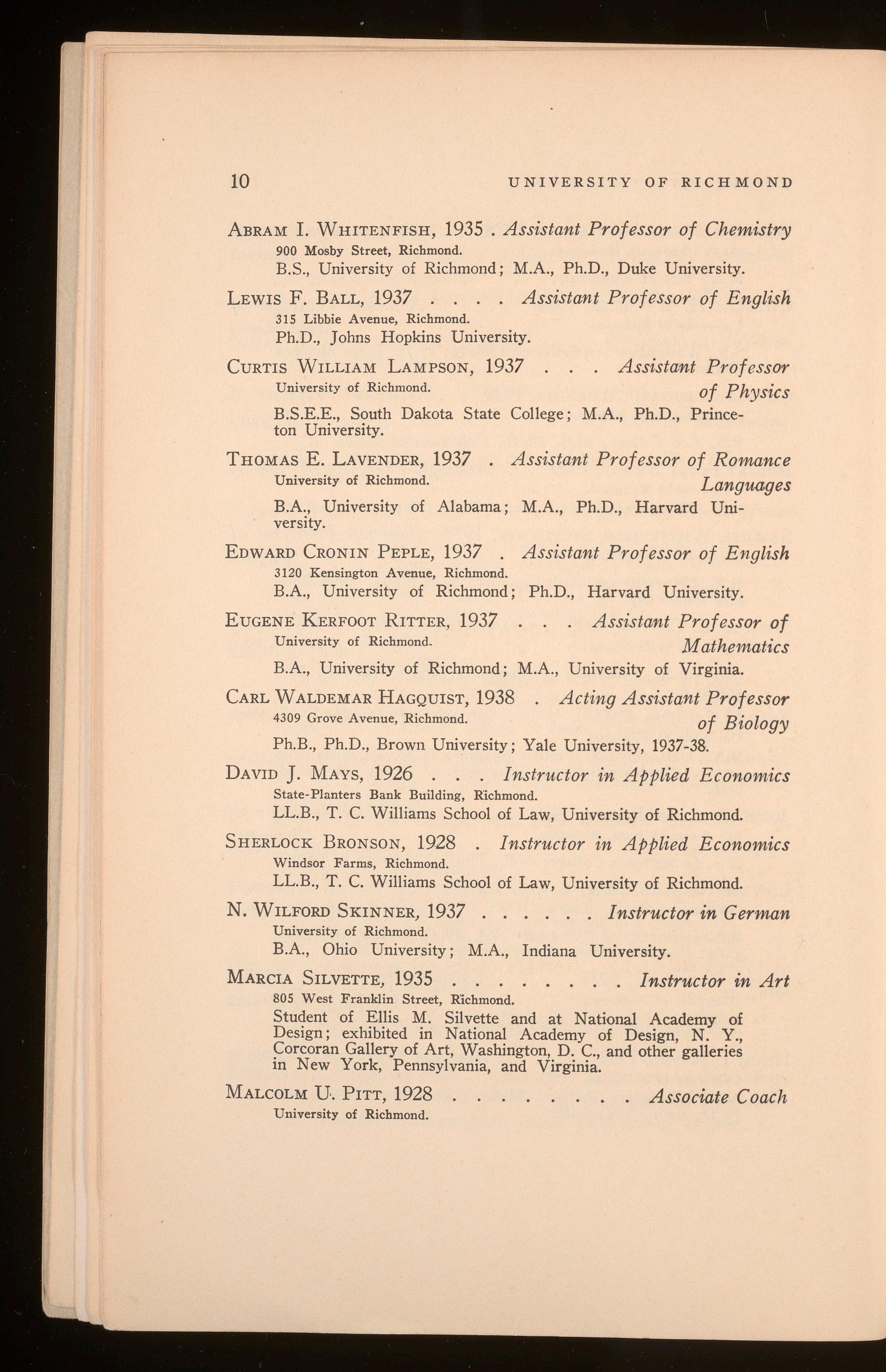
Assistant Professor of Physics
B.S.E.E., South Dakota State College; M.A., Ph.D., Prince- ton University.
THOMAS E. LAVENDER, 1937 Assistant Professor of Romance University of Richmond. Languages
B.A., University of Alabama; M.A., Ph.D., Harvard Uni- versity.
EDWARD CRONIN PEPLE, 1937 Assistant Professor of English 3120 Kensington Avenue, Richmond.
B.A., University of Richmond; Ph.D., Harvard University.
EUGENE KERFOOT RITTER, 1937 University of Richmond Assistant Professor of Mathematics
B.A., University of Richmond; M.A., University of Virginia.
CARL WALDEMAR HAGQUIST, 1938 Acting Assistant Professor 4309 Grove Avenue , Richmond. of Biology
Ph.B., Ph.D., Brown University; Yale University, 1937-38.
DAVID J. MAYS, 1926
Instructor in Applied Economics State-Planters Bank Building, Richmond.
LL.B., T. C. Williams School of Law, University of Richmond.
SHERLOCK BRONSON, 1928 Instructor in Applied Economics Windsor Farms, Richmond.
LL.B., T. C. Williams School of Law, University of Richmond.
N. WILFORD SKINNER, 1937 . . . Instructor in German University of Richmond.
B.A., Ohio University; M.A., Indiana University.
MARCIA SILVETTE, 1935
Instructor in Art 805 West Franklin Street, Richmond. Student of Ellis M. Silvette and at National Academy of Design; exhibited in National Academy of Design, N. Y., Corcoran Gallery of Art, Washington, D. C., and other galleries in New York, Pennsylvania, and Virginia.
MALCOLM U. PITT, 1928
Associate Coach University of Richmond.
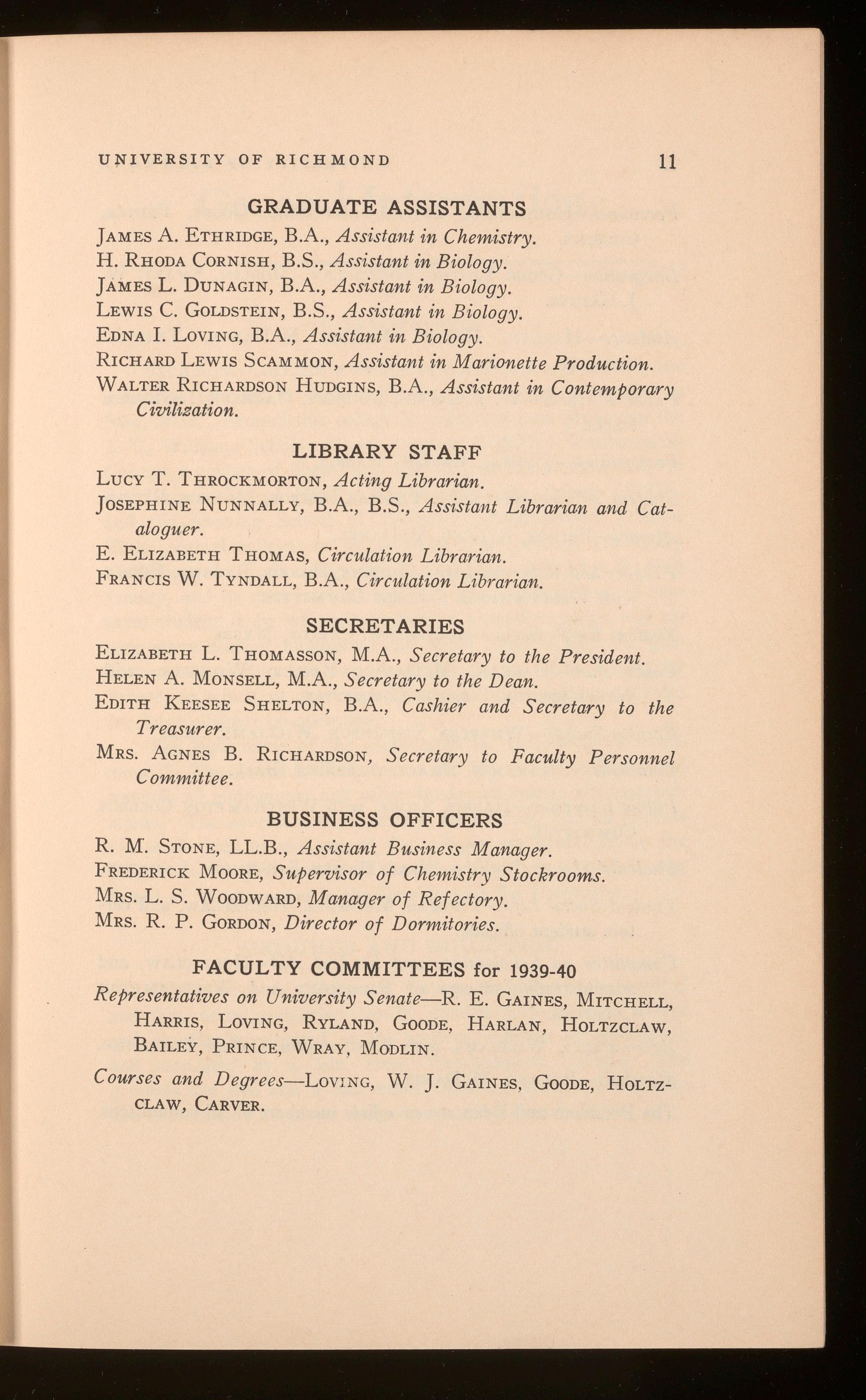
UNIVERSITY OF RICHMOND
JAMES A. ETHRIDGE, B.A., Assistant in Chemistry.
H. RHODA CORNISH, B.S., Assistant in Biology.
JAMES L. DUNAGIN, B.A., Assistant in Biology.
LEWIS C. GOLDSTEIN, B.S., Assistant in Biology.
EDNA I. LOVING, B.A., Assistant in Biology.
RICHARD LEWIS SCAMMON, Assistant in Marionette Production.
WALTER RICHARDSON HUDGINS, B.A , Assistant in Contemporary Civilization.
Lucy T. THROCKMORTON, Acting Librarian.
JOSEPHINE NUNNALLY, B.A., B.S., Assistant Librarian and Cataloguer.
E. ELIZABETH THOMAS, Circulation Librarian.
FRANCIS W . TYNDALL, B.A., Circulation Librarian.
ELIZABETH L. THOMASSON, M.A., Secretary to the President.
HELEN A. MoNSELL, M.A., Secretary to the Dean.
EDITH KEESEE SHELTON, B.A., Cashier and Secretary to the Treasurer.
MRS. AGNES B. RICHARDSON, Secretary to Faculty Personnel Committee.
R. M. STONE, LL.B., Assistant Business Manager.
FREDERICK MooRE, Supervisor of Chemistry Stockrooms.
MRS. L. S. WOODWARD, Manager of Refectory.
MRs. R. P. GORDON, Director of Dormitories.
Representatives on University Senate-R. E. GAINES, MITCHELL, HARRIS, LOVING, RYLAND, GOODE, HARLAN, HOLTZCLAW, BAILEY, PRINCE, WRAY, MODLIN.
Courses and Degrees-LOVING, W. J. GAINES, GOODE, HOLTZCLAW, CARVER.
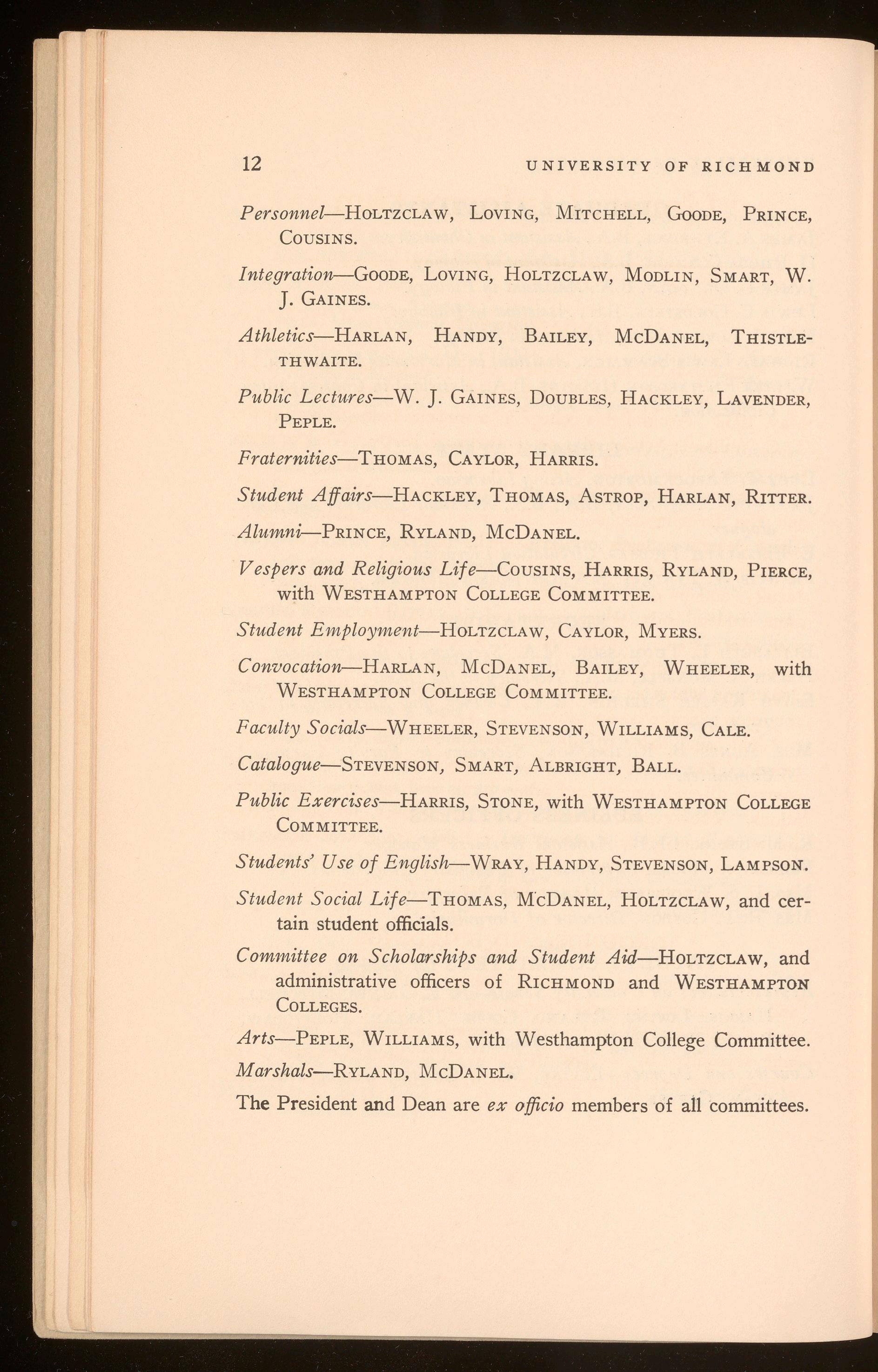
UNIVERSITY OF RICHMOND
Personnel-HOLTZCLAW, LOVING, MITCHELL, GooDE, PRINCE, COUSINS.
lntegration--GooDE, LOVING, HOLTZCLAW, MODLIN, SMART, W. J. GAINES.
Athletics-HARLAN, HANDY, BAILEY, McDANEL, THISTLETHWAITE.
Public Lectures-W. J. GAINES, DouBLES, HACKLEY, LAVENDER , PEPLE.
Fraternities-THOMAS, CAYLOR, HARRIS.
Student Affairs-HACKLEY, THOMAS, AsTROP, HARLAN, RITTER.
Alumni-PRINCE, RYLAND, McDANEL.
Vespers and Religious Life-CousINS, HARRIS, RYLAND, PIERCE, with WESTHAMPTON COLLEGE COMMITTEE.
Stud ent Employment-HOLTZCLAW , CAYLOR , MYERS.
Convocation--HARLAN, McDANEL, BAILEY, WHEELER, with WESTHAMPTON COLLEGE COMMITTEE.
Faculty Socials-WHEELER, STEVENSON, WILLIAMS, CALE
Catalogue-STEVENSON, SMART, ALBRIGHT, BALL.
Public Exercises-HARRIS, STONE, with WESTHAMPTON COLLEGE COMMITTEE.
Students ' Use of English-WRAY, HANDY, STEVENSON, LAMPSON.
Stud ent Social Life-THOMAS, McDANEL, HOLTZCLAW, and certain student officials.
Comniittee on Scholarships and Student Aid-HOLTZCLAW, and administrative officers of RICHMOND and WESTHAMPTON COLLEGES.
Arts-PEPLE, WILLIAMS, with Westhampton College Committee.
Marshals-RYLAND, McDANEL.
The President and Dean are ex officio members of ail committees.
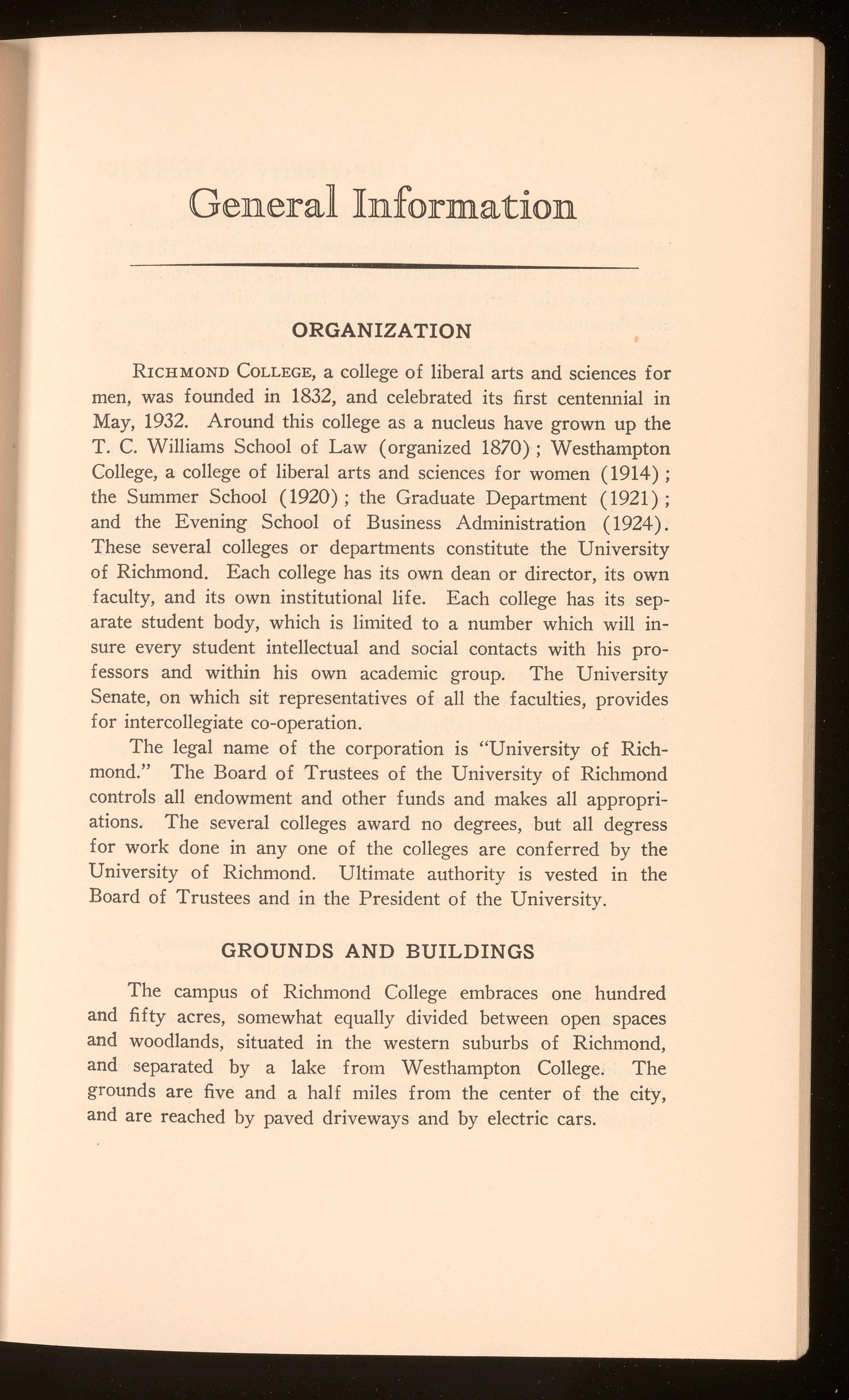
RICHMONDCOLLEGE, a college of liberal arts and sciences £or men, was founded in 1832, and celebrated its first centennial in May, 1932. Around this college as a nucleus have grown up the T. C. Williams School of Law (organized 1870); Westhampton College, a college of liberal arts and sciences for women ( 1914) ; the Summer School (1920); the Graduate Department (1921); and the Evening School of Business Administration ( 1924). These several colleges or departments constitute the University of Richmond. Each college has its own dean or director, its own faculty, and its own institutional life. Each college has its separate student body, which is limited to a number which will insure every student intellectual and social contacts with his professors and within his own academic group. The University Senate, on which sit representatives of all the faculties, provides for intercollegiate co-operation.
The legal name of the corporation is "University of Richmond." The Board of Trustees of the University of Richmond controls all endowment and other funds and makes all appropriations. The several colleges award no degrees, but all degress for work done in any one of the colleges are conferred by the University of Richmond . Ultimate authority is vested in the Board of Trustees and in the President of the University.
The campus of Richmond College embraces one hundred and fifty acres, somewhat equally divided between open spaces and woodlands, situated in the western suburbs of Richmond, and separated by a lake from Westhampton College. The grounds are five and a half miles from the center of the city, and are reached by paved driveways and by electric cars.
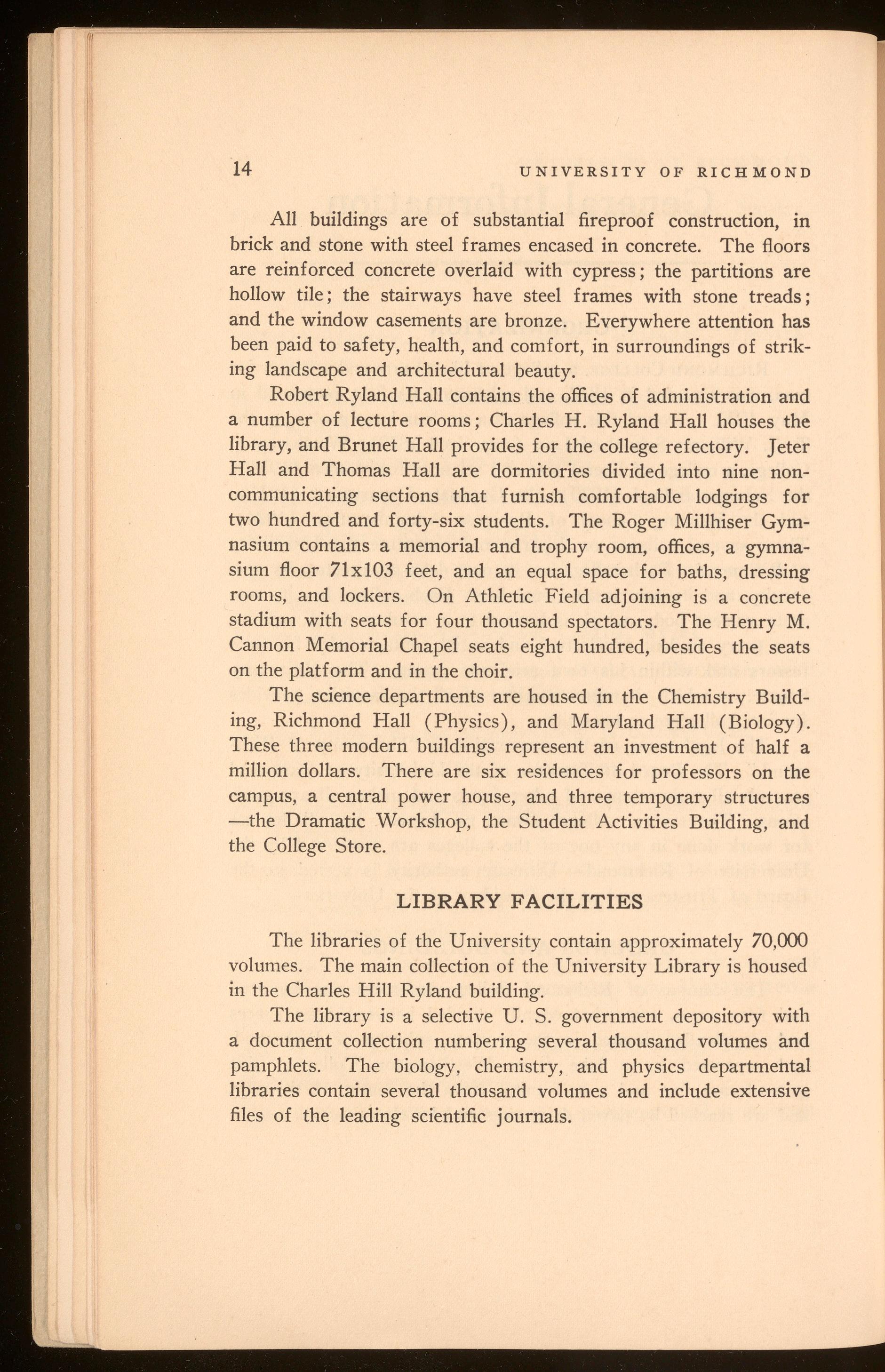
All buildings are of substantial fireproof construction, in brick and stone with steel frames encased in concrete. The floors are reinforced concrete overlaid with cypress; the partitions are hollow tile; the stairways have steel frames with stone treads; and the window casements are bronze. Everywhere attention has been paid to safety, health, and comfort, in surroundings of striking landscape and architectural beauty.
Robert Ryland Hall contains the offices of administration and a number of lecture rooms; Charles H. Ryland Hall houses the library, and Brunet Hall provides for the college refectory. Jeter Hall and Thomas Hall are dormitories divided into nine noncommunicating sections that furnish comfortable lodgings for two hundred and forty-six students. The Roger Millhiser Gymnasium contains a memorial and trophy room, offices, a gymnasium floor 71x103 feet, and an equal space for baths, dressing rooms, and lockers. On Athletic Field adjoining is a concrete stadium with seats for four thousand spectators. The Henry M. Cannon Memorial Chapel seats eight hundred, besides the seats on the platform and in the choir.
The science departments are housed in the Chemistry Building, Richmond Hall (Physics), and Maryland Hall (Biology). These three modern buildings represent an investment of half a million dollars. There are six residences for professors on the campus, a central power house, and three temporary structures -the Dramatic Workshop, the Student Activities Building, and the College Store.
The libraries of the University contain approximately 70,000 volumes. The main collection of the University Library is housed in the Charles Hill Ryland building.
The library is a selective U. S. government depository with a document collection numbering several thousand volumes and pamphlets. The biology, chemistry, and physics departmental libraries contain several thousand volumes and include extensive files of the leading scientific journals.
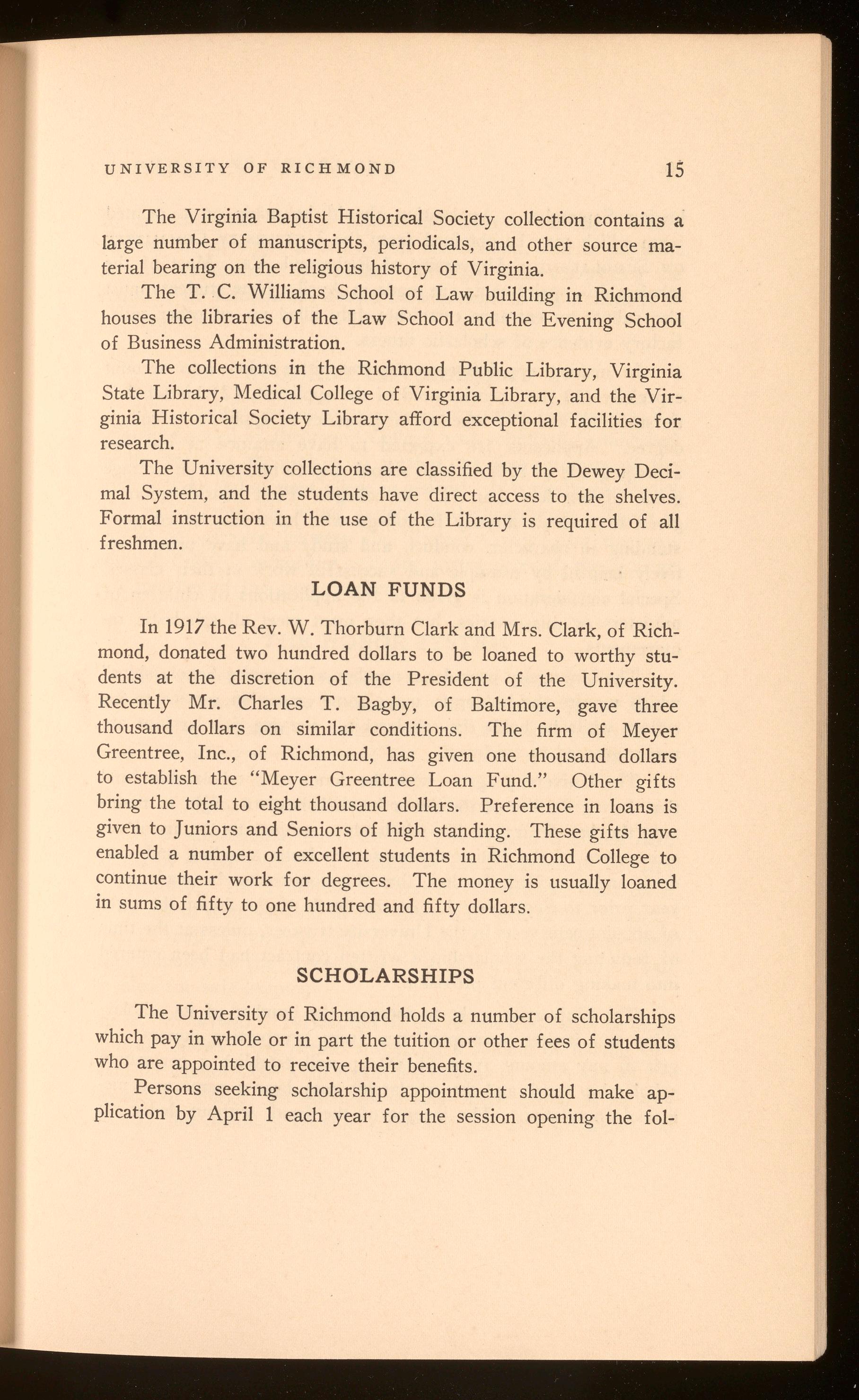
The Virginia Baptist Historical Society collection contains a large number of manuscripts, periodicals, and other source material bearing on the religious history of Virginia.
The T. C. Williams School of Law building in Richmond houses the libraries of the Law School and the Evening School of Business Administration.
The collections in the Richmond Public Library, Virginia State Library, Medical College of Virginia Library, and the Virginia Historical Society Library afford exceptional facilities for research.
The University collections are classified by the Dewey Decimal System, and the students have direct access to the shelves. Formal instruction in the use of the Library is required of all freshmen.
In 1917 the Rev. W. Thorburn Clark and Mrs. Clark, of Richmond, donated two hundred dollars to be loaned to worthy students at the discretion of the President of the University. Recently Mr. Charles T. Bagby, of Baltimore, gave three thousand dollars on similar conditions. The firm of Meyer Greentree, Inc., of Richmond, has given one thousand dollars to establish the "Meyer Greentree Loan Fund." Other gifts bring the total to eight thousand dollars. Preference in loans is given to Juniors and Seniors of high standing. These gifts have enabled a number of excellent students in Richmond College to continue their work for degrees. The money is usually loaned in sums of fifty to one hundred and fifty dollars.
The University of Richmond holds a number of scholarships which pay in whole or in part the tuition or other fees of students who are appointed to receive their benefits.
Persons seeking scholarship appointment should make application by April 1 each year for the session opening the fol-
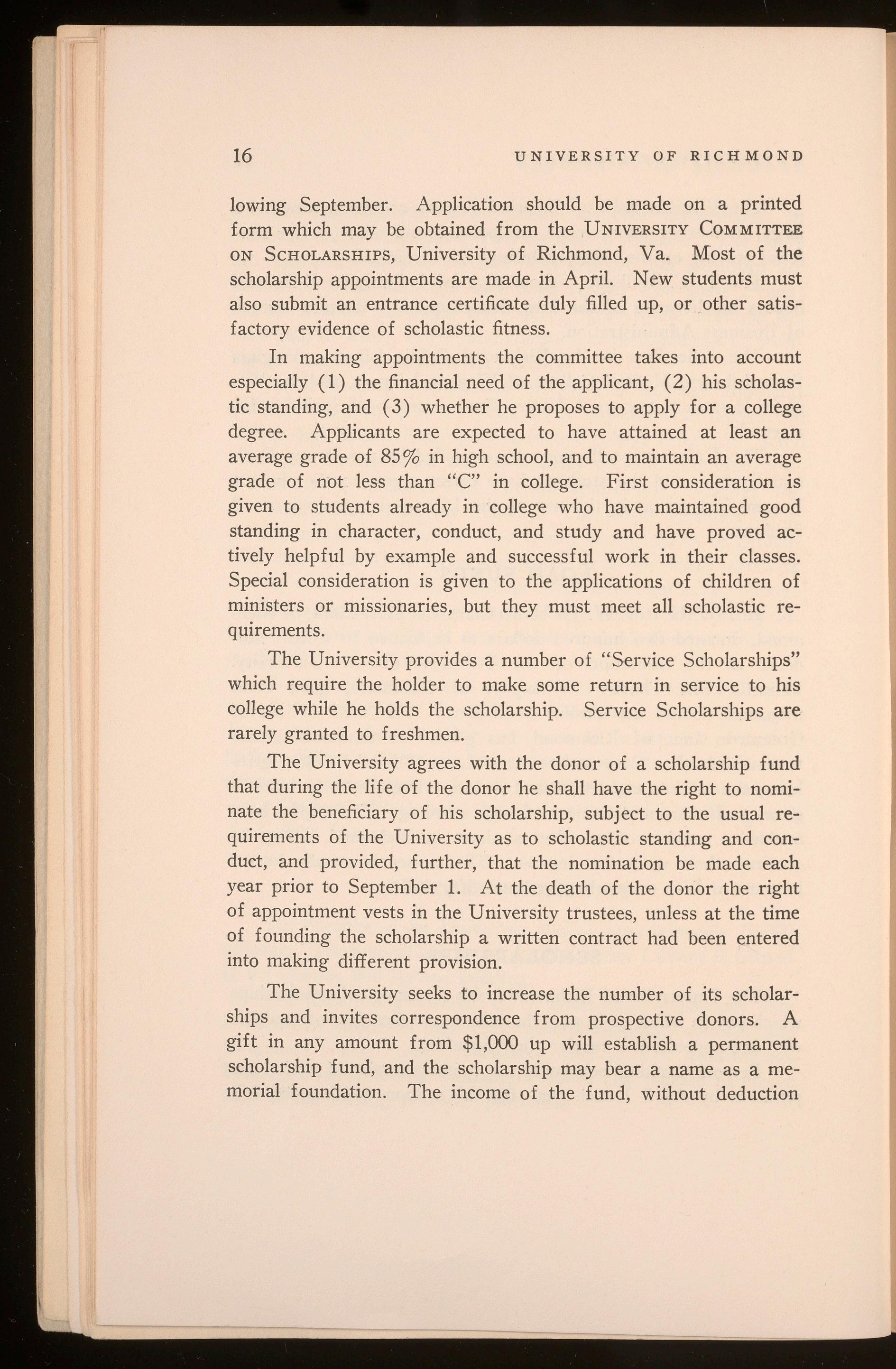
lowing September. Application should be made on a printed form which may be obtained from the UNIVERSITYCOMMITTEE ON SCHOLARSHIPS,University of Richmond, Va. Most of the scholarship appointments are made in April. New students must also submit an entrance certificate duly filled up, or other satisfactory evidence of scholastic fitness.
In making appointments the committee takes into account especially ( 1) the financial need of the applicant, ( 2) his scholastic standing, and ( 3) whether he proposes to apply for a college degree. Applicants are expected to have attained at least an average grade of 85 % in high school, and to maintain an average grade of not less than "C" in college. First consideration is given to students already in college who have maintained good standing in character, conduct, and study and have proved actively helpful by example and successful work in their classes. Special consideration is given to the applications of children of ministers or missionaries, but they must meet all scholastic requirements.
The University provides a number of "Service Scholarships" which require the holder to make some return in service to his college while he holds the scholarship. Service Scholarships are rarely granted to freshmen.
The University agrees with the donor of a scholarship fund that during the life of the donor he shall have the right to nominate the beneficiary of his scholarship, subject to the usual requirements of the University as to scholastic standing and conduct, and provided, further, that the nomination be made each year prior to September 1. At the death of the donor the right of appointment vests in the University trustees, unless at the time of founding the scholarship a written contract had been entered into making different provision.
The University seeks to increase the number of its scholarships and invites correspondence from prospective donors. A gift in any amount from $1,000 up will establish a permanent scholarship fund, and the scholarship may bear a name as a memorial foundation. The income of the fund, without deduction
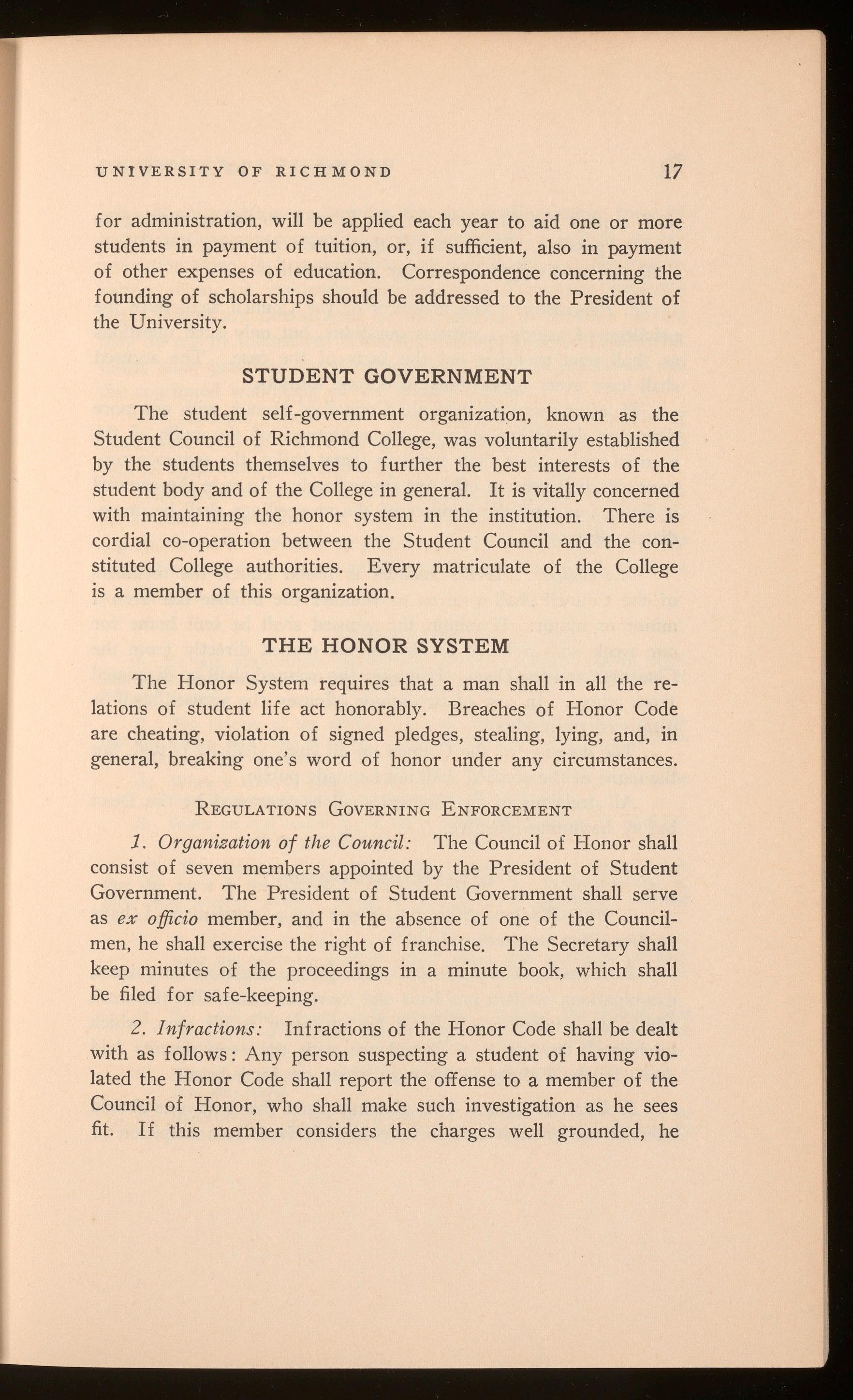
for administration, will be applied each year to aid one or more students in payment of tuition, or, if sufficient, also in payment of other expenses of education. Correspondence concerning the founding of scholarships should be addressed to the President of the University
The student self-government organization, known as the Student Council of Richmond College, was voluntarily established by the students themselves to further the best interests of the student body and of the College in general. It is vitally concerned with maintaining the honor system in the institution. There is cordial co-operation between the Student Council and the constituted College authorities. Every matriculate of the College is a member of this organization.
The Honor System requires that a man shall in all the relations of student life act honorably. Breaches of Honor Code are cheating, violation of signed pledges, stealing, lying, and, in general, breaking one's word of honor under any circumstances.
1 . Organization of the Council: The Council of Honor shall consist of seven members appointed by the President of Student Government. The President of Student Government shall serve as ex officio member, and in the absence of one of the Councilmen, he shall exercise the right of franchise. The Secretary shall keep minutes of the proceedings in a minute book, which shall be filed for safe-keeping.
2. Infractions: Infractions of the Honor Code shall be dealt with as follows : Any person suspecting a student of having violated the Honor Code shall report the offense to a member of the Council of Honor, who shall make such investigation as he sees fit. If this member considers the charges well grounded, he
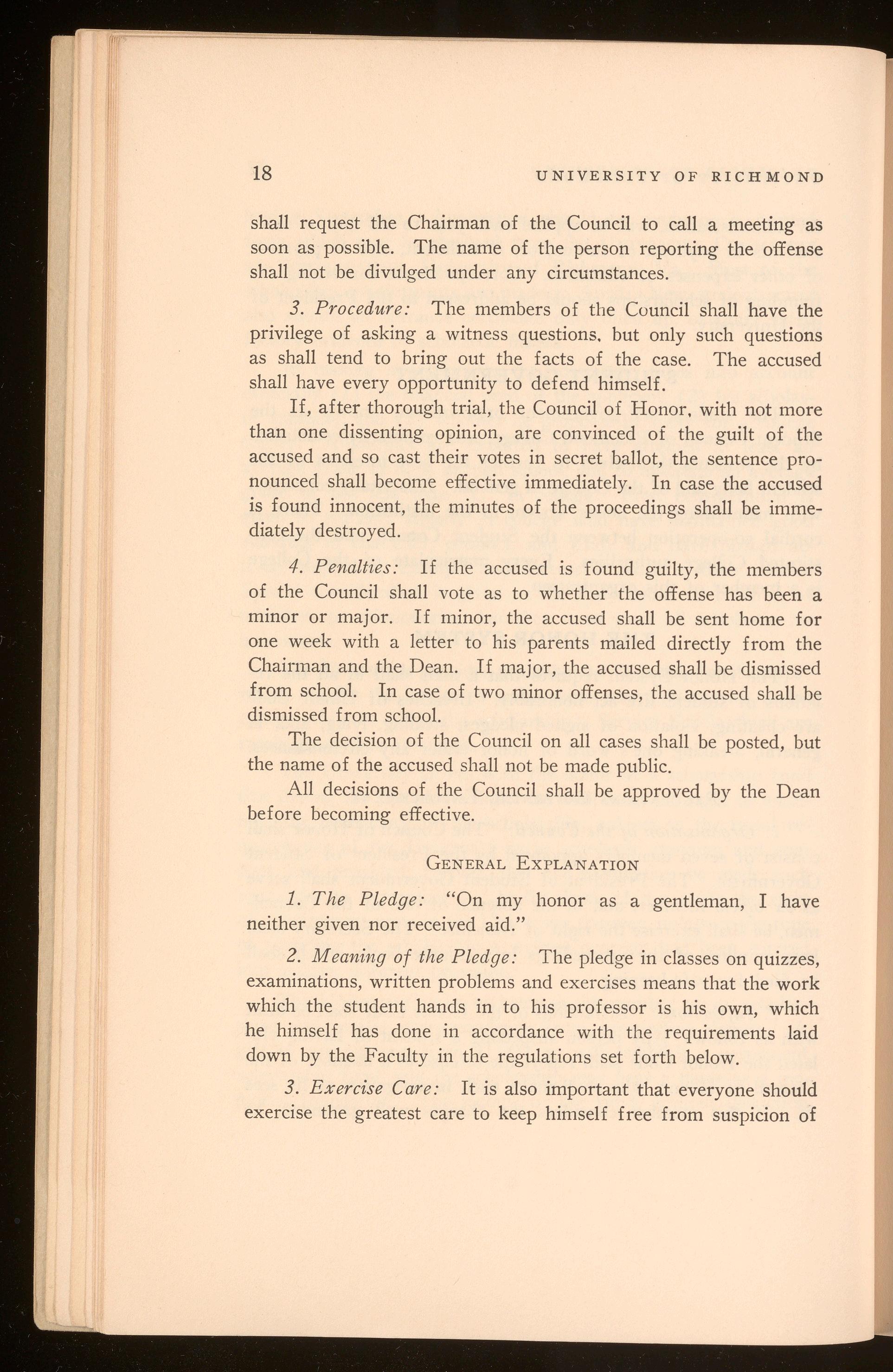
shall request the Chairman of the Council to call a meeting as soon as possible. The name of the person reporting the offense shall not be divulged under any circumstances.
3. Procedure: The members of the Council shall have the privilege of asking a witness questions. but only such questions as shall tend to bring out the facts of the case. The accused shall have every opportunity to defend himself.
If, after thorough trial, the Council of Honor, with not more than one dissenting opinion, are convinced of the guilt of the accused and so cast their votes in secret ballot, the sentence pronounced shall become effective immediately. In case the accused is found innocent, the minutes of the proceedings shall be immediately destroyed.
4. Penalties: If the accused is found guilty, the members of the Council shall vote as to whether the offense has been a minor or major. If minor, the accused shall be sent home for one week with a letter to his parents mailed directly from the Chairman and the Dean. If major, the accused shall be dismissed from school. In case of two minor offenses, the accused shall be dismissed from school.
The decision of the Council on all cases shall be posted, but the name of the accused shall not be made public.
All decisions of the Council shall be approved by the Dean before becoming effective.
1. The Pledge: "On my honor as a gentleman, I have neither given nor received aid."
2. Meaning of the Pledge: The pledge in classes on quizzes, examinations, written problems and exercises means that the work which the student hands in to his professor is his own, which he himself has done in accordance with the requirements laid down by the Faculty in the regulations set forth below.
3. Exercise Care: It is also important that everyone should exercise the greatest care to keep himself free from suspicion of
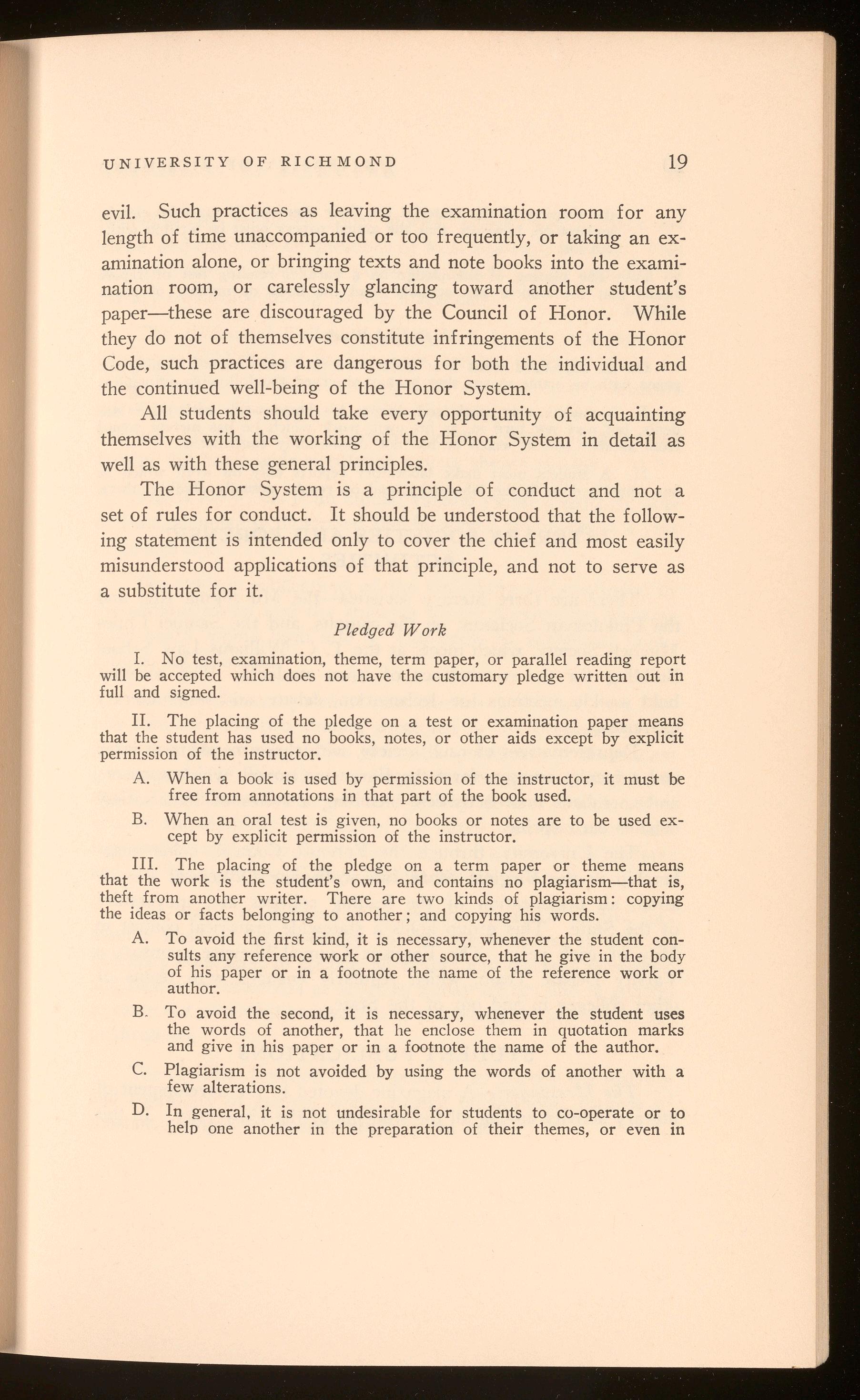
evil. Such practices as leaving the examination room for any length of time unaccompanied or too frequently, or taking an examination alone, or bringing texts and note books into the examination room, or carelessly glancing toward another student's paper-these are discouraged by the Council of Honor. While they do not of themselves constitute infringements of the Honor Code, such practices are dangerous for both the individual and the continued well-being of the Honor System.
All students should take every opportunity of acquainting themselves with the working of the Honor System in detail as well as with these general principles.
The Honor System is a principle of conduct and not a set of rules for conduct. It should be understood that the following statement is intended only to cover the chief and most easily misunderstood applications of that principle, and not to serve as a substitute for it.
I. No test, examination, theme, term paper, or parallel reading report will be accepted which does not have the customary pledge written out in full and signed.
IL The placing of the pledge on a test or examination paper means that the student has used no books, notes, or other aids except by explicit permission of the instructor.
A. When a book is used by permission of the instructor, it must be free from annotations in that part of the book used.
B. When an oral test is given, no books or notes are to be used except by explicit permission of the instructor.
III. The placing of the pledge on a term paper or theme means that the work is the student's own, and contains no plagiarism-that is, theft from another writer. There are two kinds of plagiarism: copying the ideas or facts belonging to another; and copying his words.
A. To avoid the first kind, it is necessary, whenever the student consults any reference work or other source, that he give in the body of his paper or in a footnote the name of the reference work or author.
B. To avoid the second, it is necessary, whenever the student uses the words of another, that he enclose them in quotation marks and give in his paper or in a footnote the name of the author.
C. Plagiarism is not avoided by using the words of another with a few alterations.
D. In general, it is not undesirable for students to co-operate or to help one another in the preparation of their themes, or even in
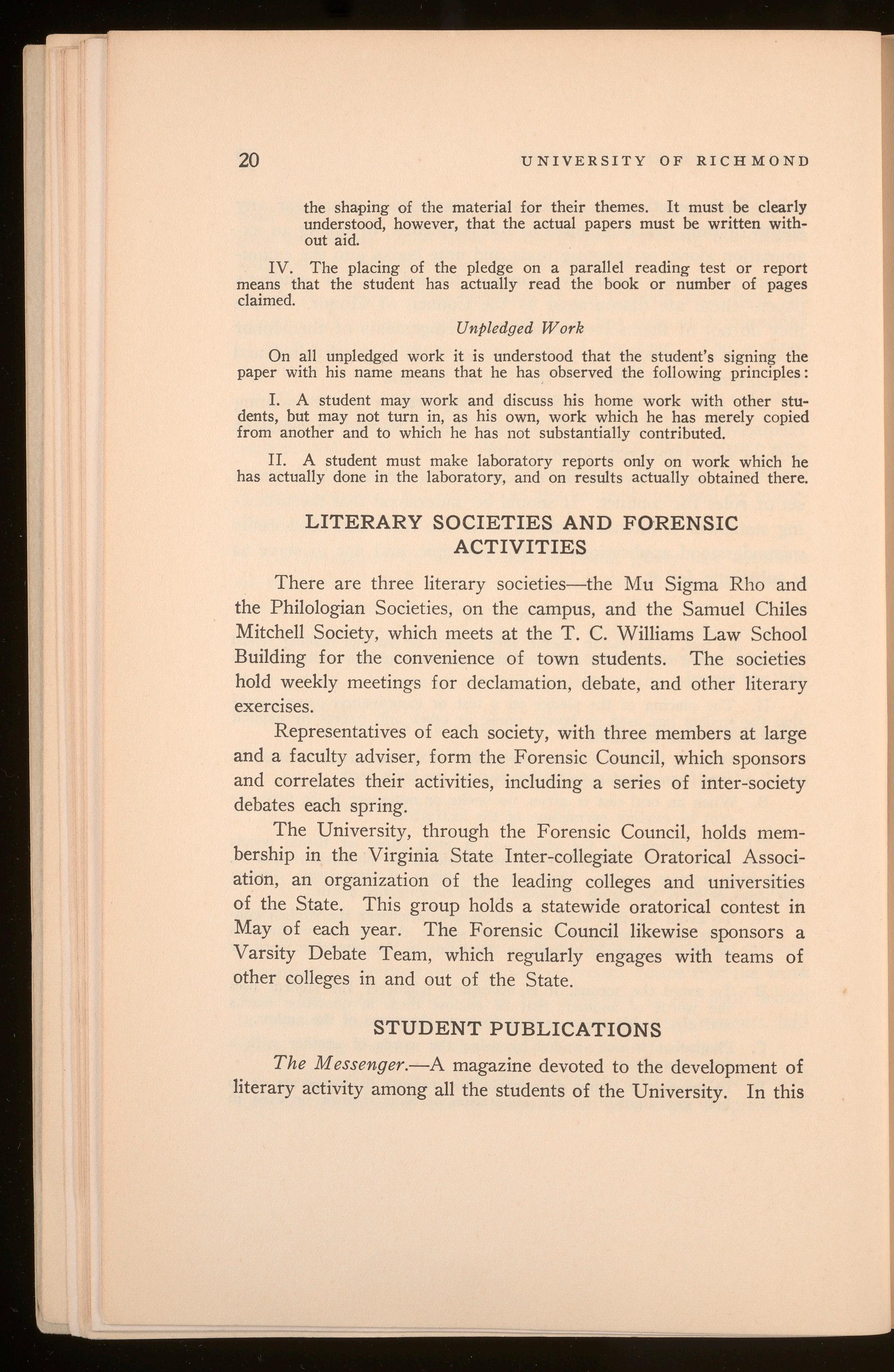
the shaping of the material for their themes. It must be clearly understood, however, that the actual papers must be written without aid.
IV. The placing of the pledge on a parallel reading test or report means that the student has actually read the book or number of pages claimed.
On all unpledged work it is understood that the student's signing the paper with his name means that he has observed the following principles :
I. A student may work and discuss his home work with other students, but may not turn in, as his own, work which he has merely copied from another and to which he has not substantially contributed.
II. A student must make laboratory reports only on work which he has actually done in the laboratory, and on results actually obtained there.
There are three literary societies-the Mu Sigma Rho and the Philologian Societies, on the campus, and the Samuel Chiles Mitchell Society, which meets at the T. C. Williams Law School Building for the convenience of town students. The societies hold weekly meetings for declamation, debate, and other literary exercises.
Representatives of each society, with three members at large and a faculty adviser, form the Forensic Council, which sponsors and correlates their activities, including a series of inter-society debates each spring.
The University, through the Forensic Council, holds membership in the Virginia State Inter-collegiate Oratorical Association, an organization of the leading colleges and universities of the State. This group holds a statewide oratorical contest in May of each year. The Forensic Council likewise sponsors a Varsity Debate Team, which regularly engages with teams of other colleges in and out of the State.
The M essenger.-A magazine devoted to the development of literary activity among all the students of the University. In this
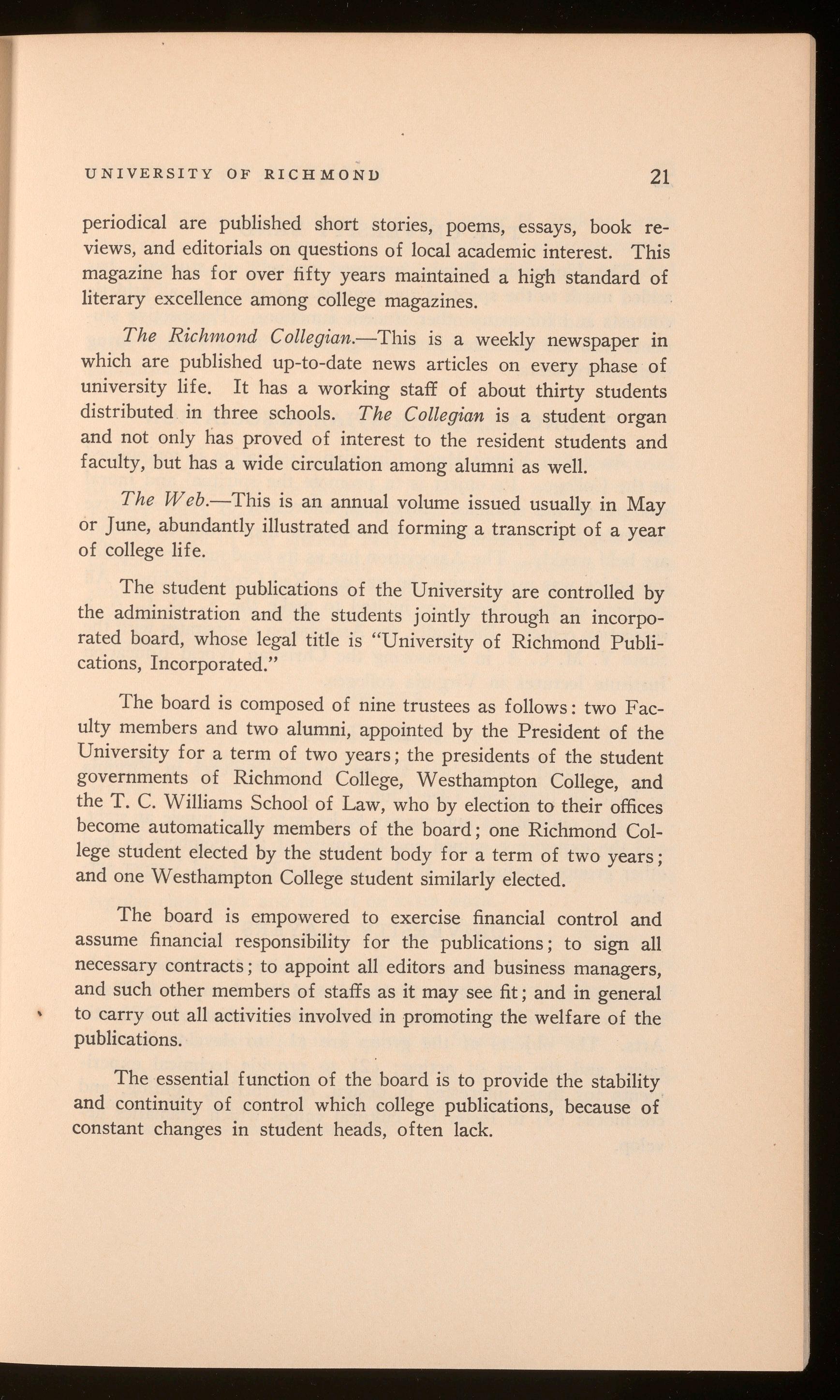
periodical are published short stories, poems, essays, book reviews, and editorials on questions of local academic interest. This magazine has for over fifty years maintained a high standard of literary excellence among college magazines.
The Richmond Collegian.-This is a weekly newspaper in which are published up-to-date news articles on every phase of university life. It has a working staff of about thirty students distributed in three schools. The Collegian is a student organ and not only has proved of interest to the resident students and faculty, but has a wide circulation among alumni as well.
The W eb -This is an annual volume issued usually in May or June, abundantly illustrated and forming a transcript of a year of college life.
The student publications of the University are controlled by the administration and the students jointly through an incorporated board, whose legal title is "University of Richmond Publications, Incorporated."
The board is composed of nine trustees as follows: two Faculty members and two alumni, appointed by the President of the University for a term of two years; the presidents of the student governments of Richmond College, Westhampton College, and the T. C. Williams School of Law, who by election to their offices become automatically members of the board; one Richmond College student elected by the student body for a term of two years; and one Westhampton College student similarly elected.
The board is empowered to exercise financial control and assume financial responsibility for the publications; to sign all necessary contracts ; to appoint all editors and business managers, and such other members of staffs as it may see fit; and in general to carry out all activities involved in promoting the welfare of the publications.
The essential function of the board is to provide the stability and continuity of control which college publications, because of constant changes in student heads, often lack.
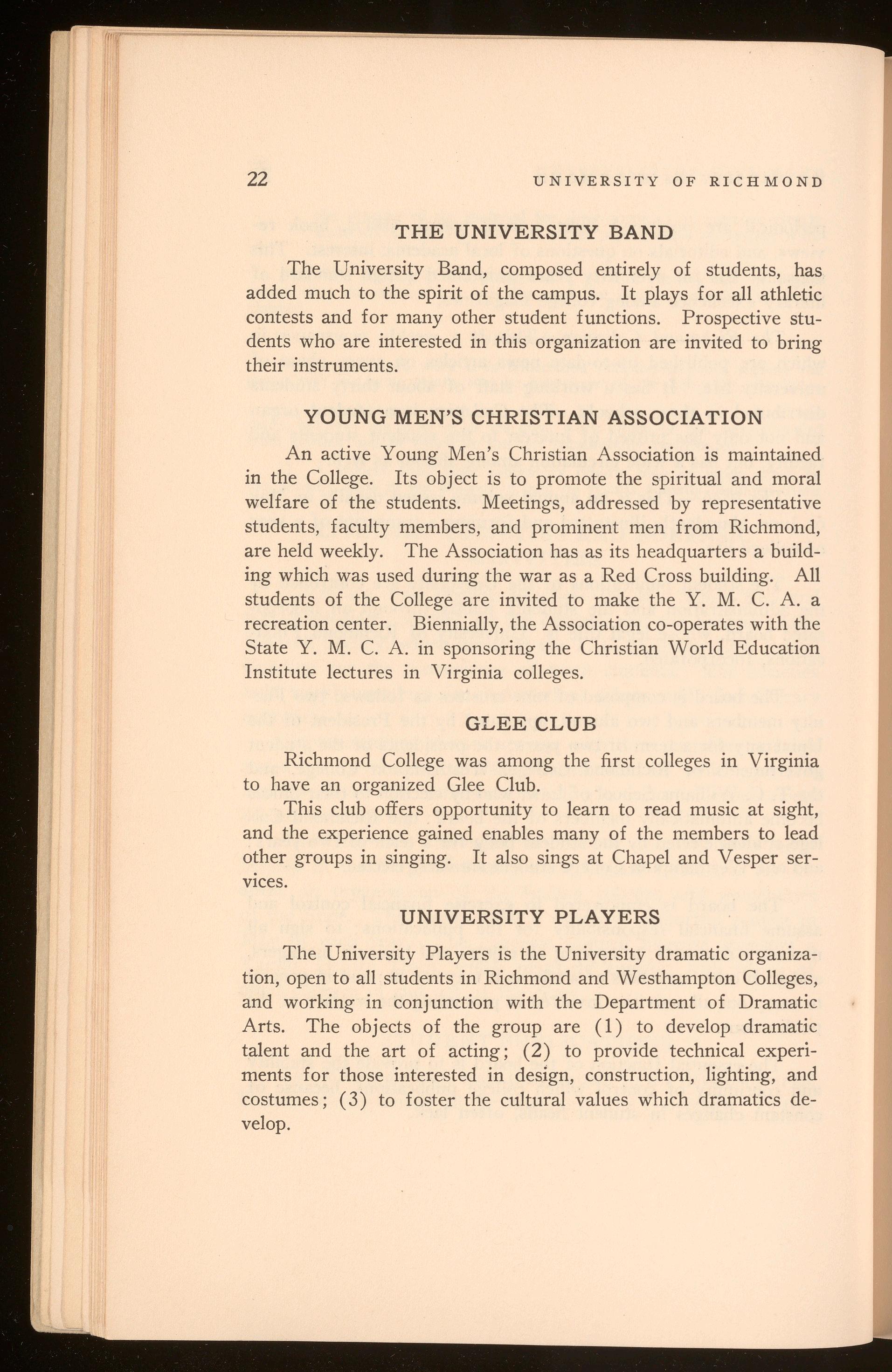
The University Band, composed entirely of students, has added much to the spirit of the campus. It plays for all athletic contests and for many other student functions. Prospective students who are interested in this organization are invited to bring their instruments.
An active Young Men's Christian Association is maintained in the College. Its object is to promote the spiritual and moral welfare of the students. Meetings, addressed by representative students, faculty members, and prominent men from Richmond, are held weekly. The Association has as its headquarters a building which was used during the war as a Red Cross building. All students of the College are invited to make the Y. M. C. A. a recreation center. Biennially, the Association co-operates with the State Y. M. C. A. in sponsoring the Christian World Education Institute lectures in Virginia colleges.
Richmond College was among the first colleges in Virginia to have an organized Glee Club. This club offers opportunity to learn to read music at sight, and the experience gained enables many of the members to lead other groups in singing. It also sings at Chapel and Vesper services.
The University Players is the University dramatic organization, open to all students in Richmond and Westhampton Colleges, and working in conjunction with the Department of Dramatic Arts. The objects of the group are ( 1) to develop dramatic talent and the art of acting; (2) to provide technical experiments for those interested in design, construction, lighting, and costumes; ( 3) to foster the cultural values which dramatics develop.
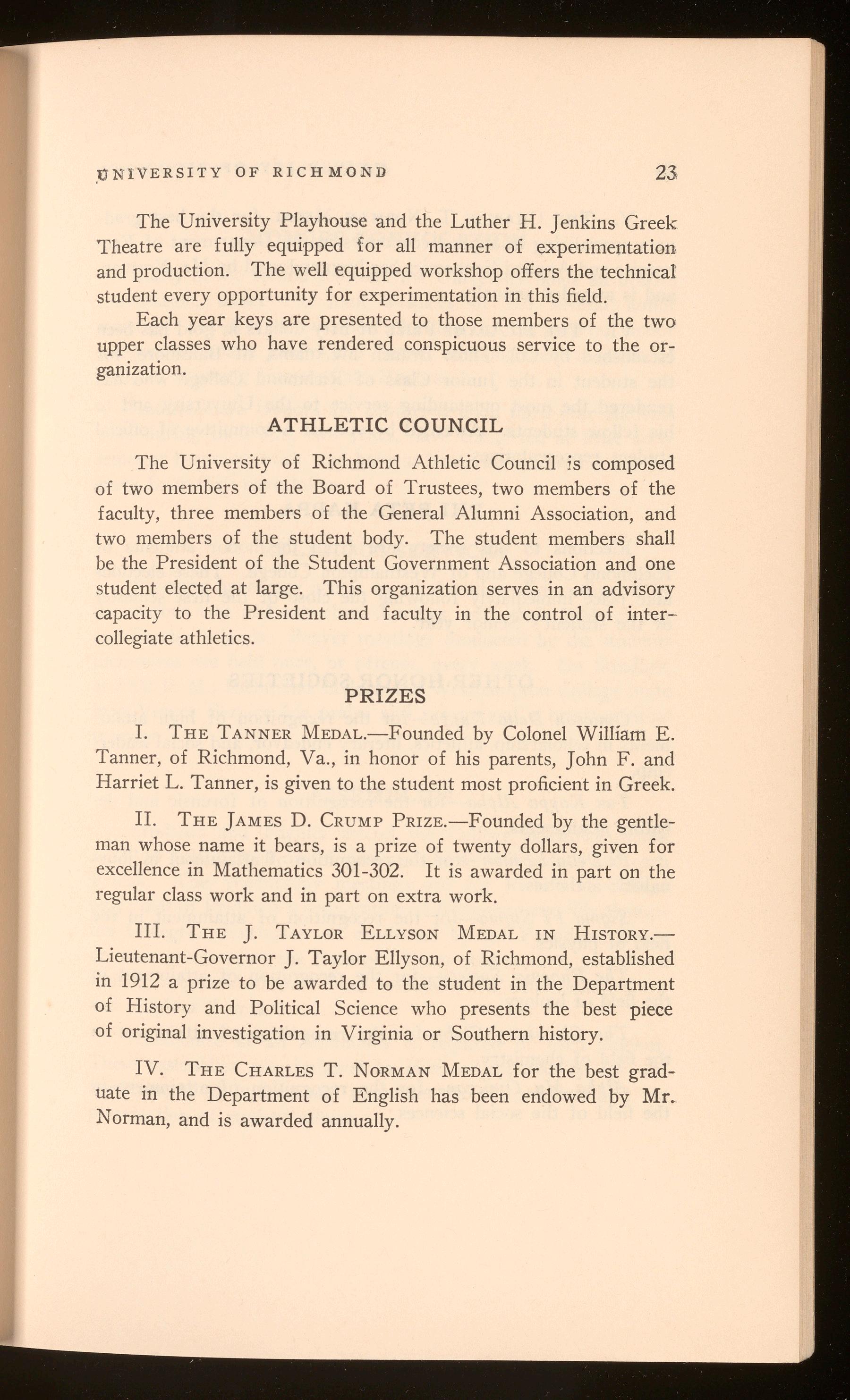
The University Playhouse and the Luther H. Jenkins Greek Theatre are fully equipped for all manner of experimentation and production. The well equipped workshop offers the technical student every opportunity for experimentation in this field. Each year keys are presented to those members of the two upper classes who have rendered conspicuous service to the organization.
The University of Richmond Athletic Council is composed of two members of the Board of Trustees, two members of the faculty, three members of the General Alumni Association, and two members of the student body. The student members shall be the President of the Student Government Association and one student elected at large. This organization serves in an advisory capacity to the President and faculty in the control of intercollegiate athletics.
I. THE TANNER MEDAL.-Founded by Colonel William E. Tanner, of Richmond, Va., in honor of his parents, John F. and Harriet L. Tanner, is given to the student most proficient in Greek.
II. THE JAMES D. CRUMP PRIZE.-Founded by the gentleman whose name it bears, is a prize of twenty dollars, given for excellence in Mathematics 301-302. It is awarded in part on the regular class work and in part on extra work.
III. THE J. TAYLOR ELLYSON MEDAL IN HISTORY.Lieutenant-Governor J. Taylor Ellyson, of Richmond, established in 1912 a prize to be awarded to the student in the Department of History and Political Science who presents the best piece of original investigation in Virginia or Southern history.
IV. THE CHARLEST. NORMANMEDALfor the best graduate in the Department of English has been endowed by Mr. Norman, and is awarded annually.
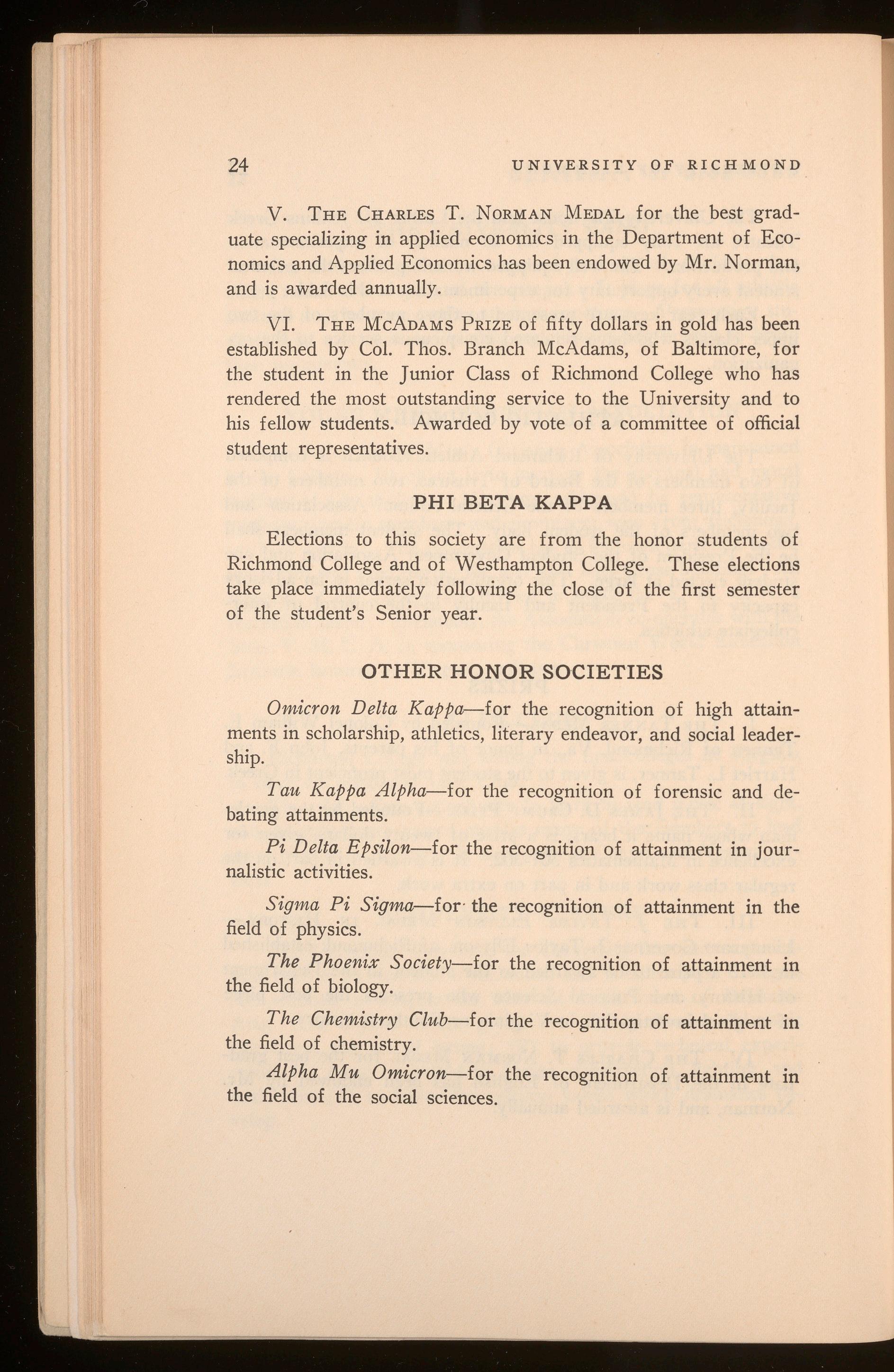
V. THE CHARLEST. NORMAN MEDAL for the best graduate specializing in applied economics in the Department of Economics and Applied Economics has been endowed by Mr. Norman, and is awarded annually.
VI. THE McADAMSPRIZE of fifty dollars in gold has been established by Col. Thos. Branch McAdams, of Baltimore, for the student in the Junior Class of Richmond College who has rendered the most outstanding service to the University and to his fellow students. Awarded by vote of a committee of official student representatives.
Elections to this society are from the honor students of Richmond College and of Westhampton College. These elections take place immediately following the close of the first semester of the student's Senior year.
Omicron Delta Kappa-for the recognition of high attainments in scholarship, athletics, literary endeavor, and social leadership .
Tau Kappa Alpha-for the recognition of forensic and debating attainments.
Pi Delta Epsilon-for the recognition of attainment in journalistic activities.
Sigma Pi Sigma-for · the recognition of attainment in the field of physics.
The Phoenix Society-for the recognition of attainment in the field of biology.
The Chemistry Club-for the recognition of attainment m the field of chemistry.
Alpha Mu Omicron-for the recognition of attainment m the field of the social sciences.
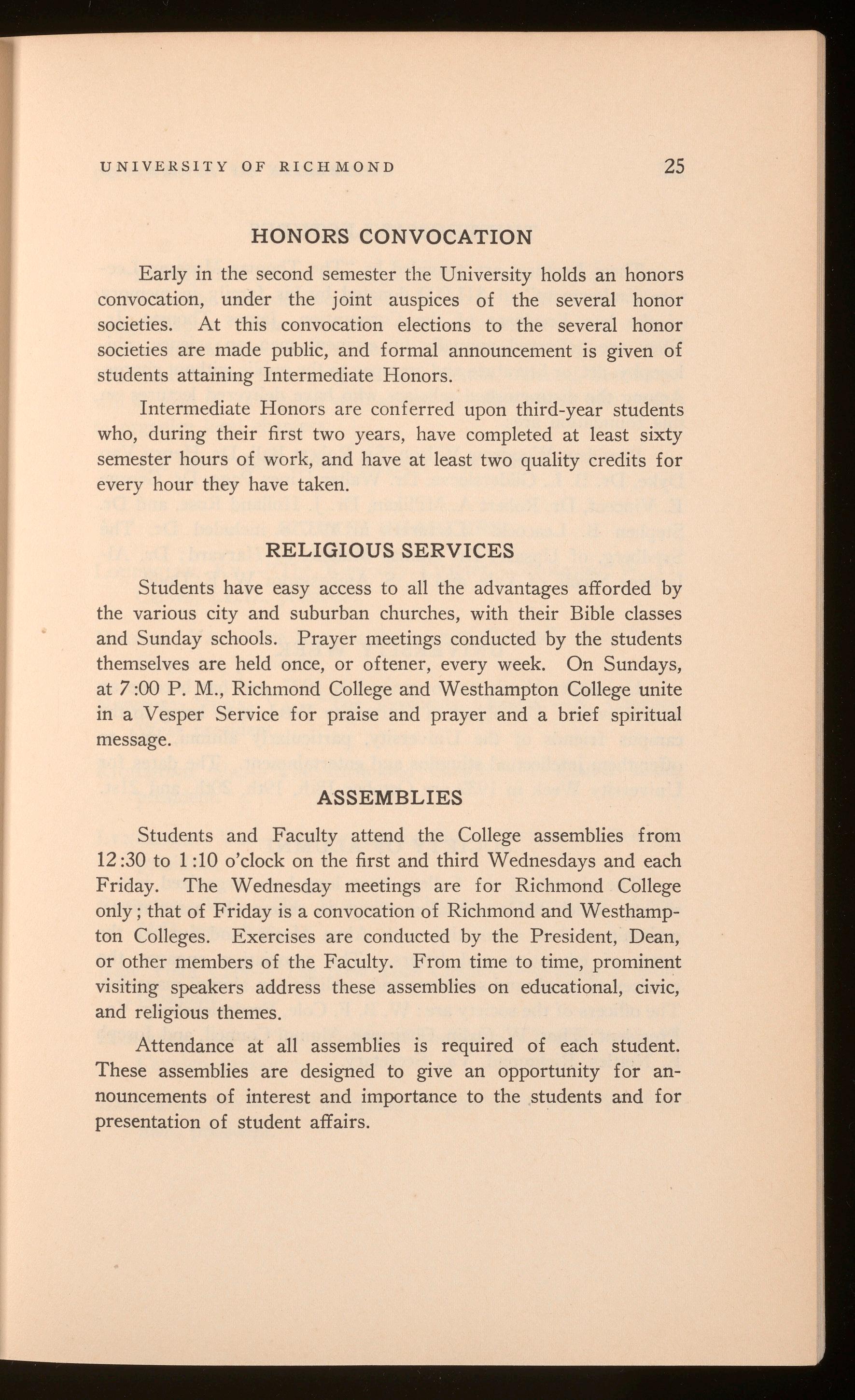
Early in the second semester the University holds an honors convocation, under the joint auspices of the several honor societies. At this convocation elections to the several honor societies are made public, and formal announcement is given of students attaining Intermediate Honors.
Intermediate Honors are conferred upon third-year students who, during their first two years, have completed at least sixty semester hours of work, and have at least two quality credits for every hour they have taken.
Students have easy access to all the advantages afforded by the various city and suburban churches, with their Bible classes and Sunday schools. Prayer meetings conducted by the students themselves are held once, or oftener, every week. On Sundays, at 7 :00 P. M., Richmond College and Westhampton College unite in a Vesper Service for praise and prayer and a brief spiritual message.
Students and Faculty attend the College assemblies from 12 :30 to 1 :10 o'clock on the first and third Wednesdays and each Friday. The Wednesday meetings are for Richmond College only; that of Friday is a convocation of Richmond and W esthampton Colleges. Exercises are conducted by the President, Dean, or other members of the Faculty. From time to time, prominent visiting speakers address these assemblies on educational, civic, and religious themes.
Attendance at all assemblies is required of each student. These assemblies are designed to give an opportunity for announcements of interest and importance to the students and for presentation of student affairs.
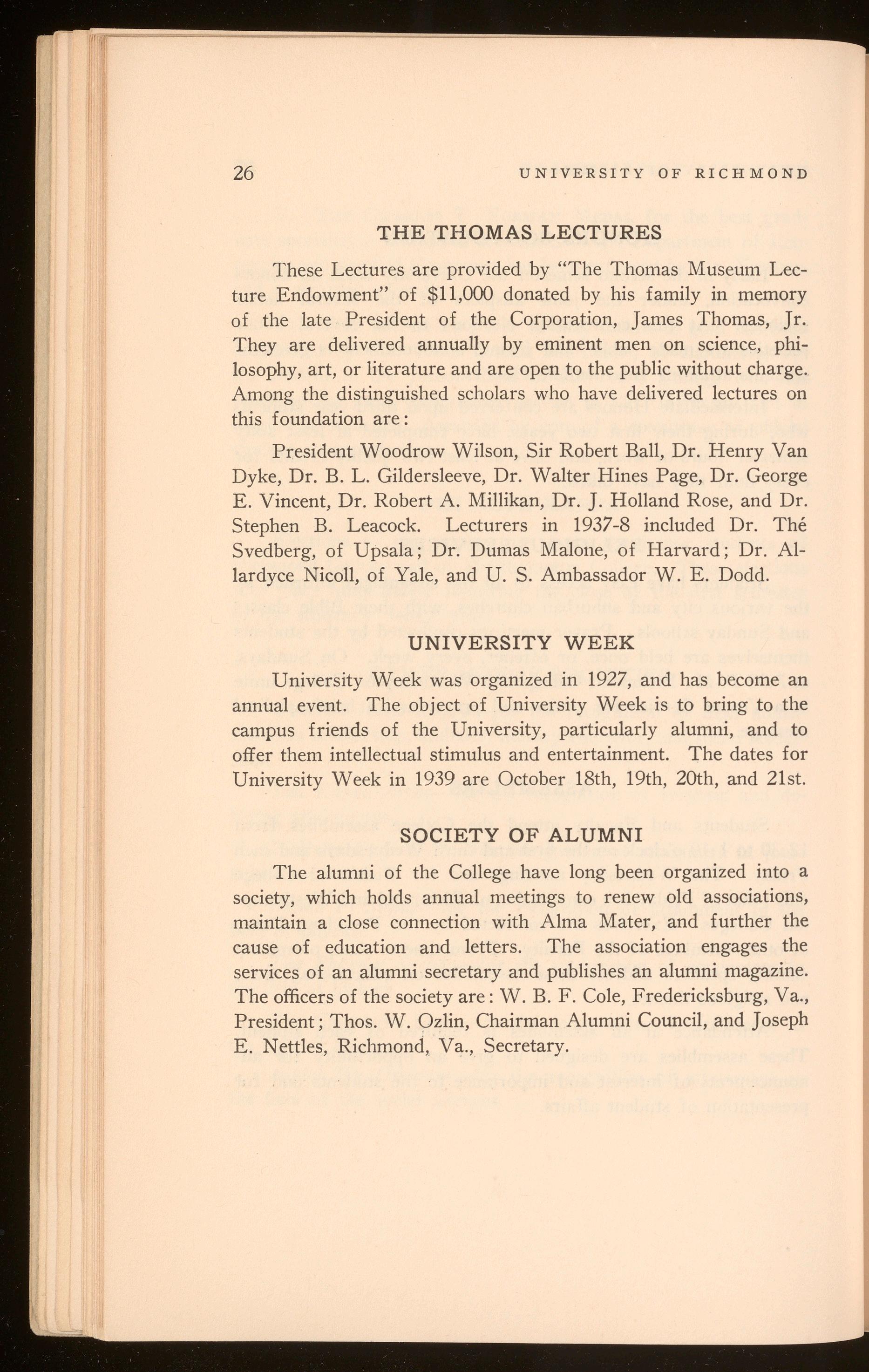
UNIVERSITY OF RICHMOND
These Lectures are provided by "The Thomas Museum Lecture Endowment" of $11,000 donated by his family in memory of the late President of the Corporation, James Thomas, Jr. They are delivered annually by eminent men on science, philosophy, art, or literature and are open to the public without charge. Among the distinguished scholars who have delivered lectures on this foundation are :
President Woodrow Wilson, Sir Robert Ball, Dr. Henry Van Dyke, Dr. B. L. Gildersleeve, Dr. Walter Hines Page, Dr. George E. Vincent, Dr. Robert A. Millikan, Dr. J. Holland Rose, and Dr. Stephen B. Leacock. Lecturers in 1937-8 included Dr. The Svedberg, of Upsala; Dr. Dumas Malone, of Harvard; Dr. Allardyce Nicoll, of Yale, and U. S. Ambassador W. E. Dodd.
University Week was organized in 1927, and has become an annual event. The object of University Week is to bring to the campus friends of the University, particularly alumni, and to offer them intellectual stimulus and entertainment. The dates for University Week in 1939 are October 18th, 19th, 20th, and 21st.
The alumni of the College have long been organized into a society, which holds annual meetings to renew old associations, maintain a close connection with Alma Mater, and further the cause of education and letters. The association engages the services of an alumni secretary and publishes an alumni magazine. The officers of the society are: W. B. F. Cole, Fredericksburg, Va., President; Thos. W. Ozlin, Chairman Alumni Council, and Joseph E. Nettles, Richmond, Va., Secretary.
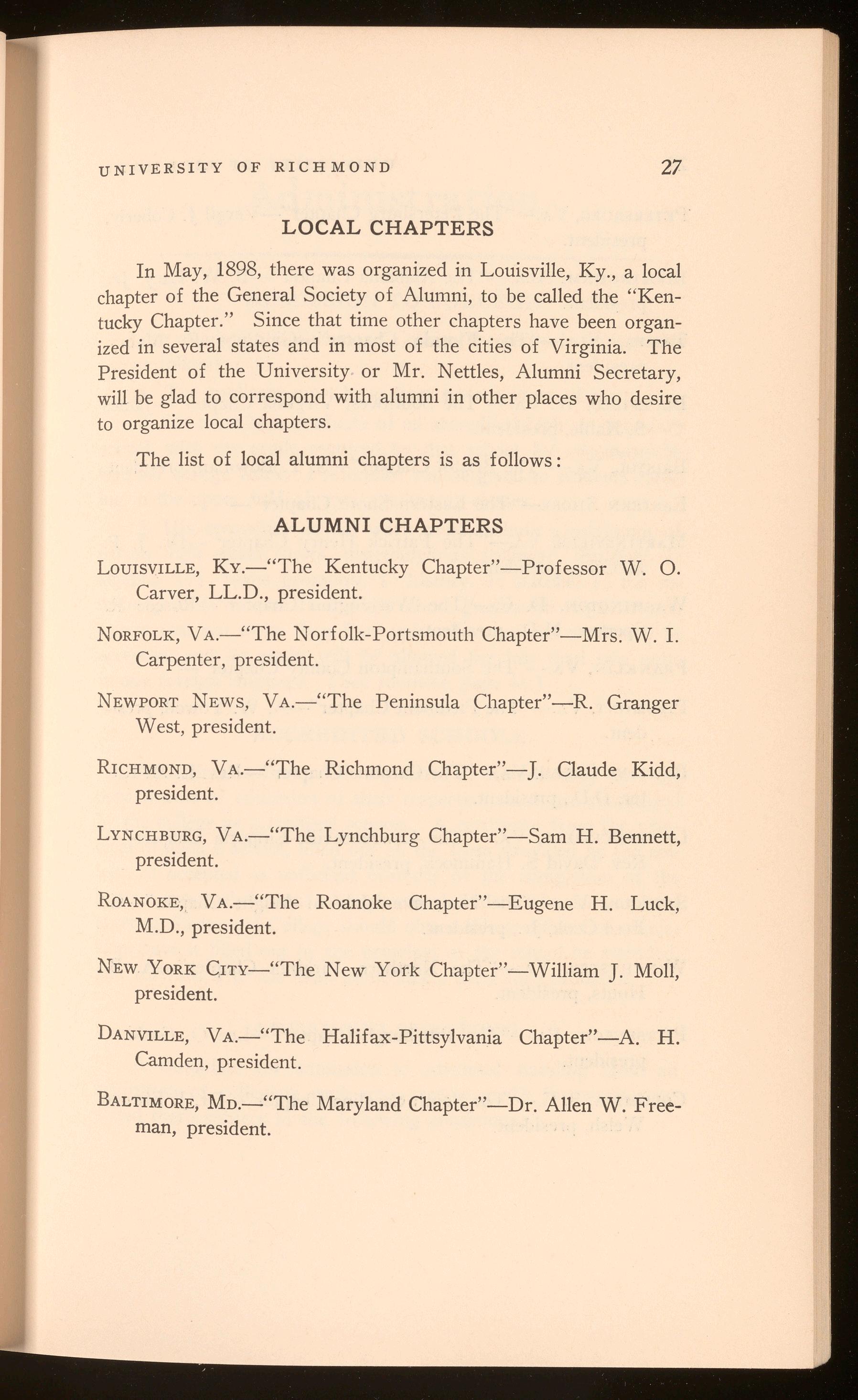
In May, 1898, there was organized in Louisville, Ky., a local chapter of the General Society of Alumni, to be called the "Kentucky Chapter." Since that time other chapters have been organized in several states and in most of the cities of Virginia. The President of the University or Mr. Nettles, Alumni Secretary, will be glad to correspond with alumni in other places who desire to organize local chapters.
The list of local alumni chapters is as follows :
LOUISVILLE,KY.-"The Kentucky Chapter"-Professor W. 0. Carver, LL.D., president.
NoRFOLK,VA.-"The Norfolk-Portsmouth Chapter"-Mrs. W. I. Carpenter, president.
NEWPORTNEws, VA.-"The Peninsula Chapter"-R. Granger West, president.
RICHMOND,VA.-"The Richmond Chapter"-J. Claude Kidd, president.
LYNCHBURG,VA.-"The Lynchburg Chapter"-Sam H. Bennett, president.
ROANOKE,VA.-"The Roanoke Chapter"-Eugene H. Luck, M.D., president.
NEw YORK CITY-"The New York Chapter"-William J. Moll, president.
DANVILLE, VA.-"The Halifax-Pittsylvania Chapter"-A. H. Camden, president.
BALTIMORE,MD.-"The Maryland Chapter"-Dr. Allen W. Freeman, president.
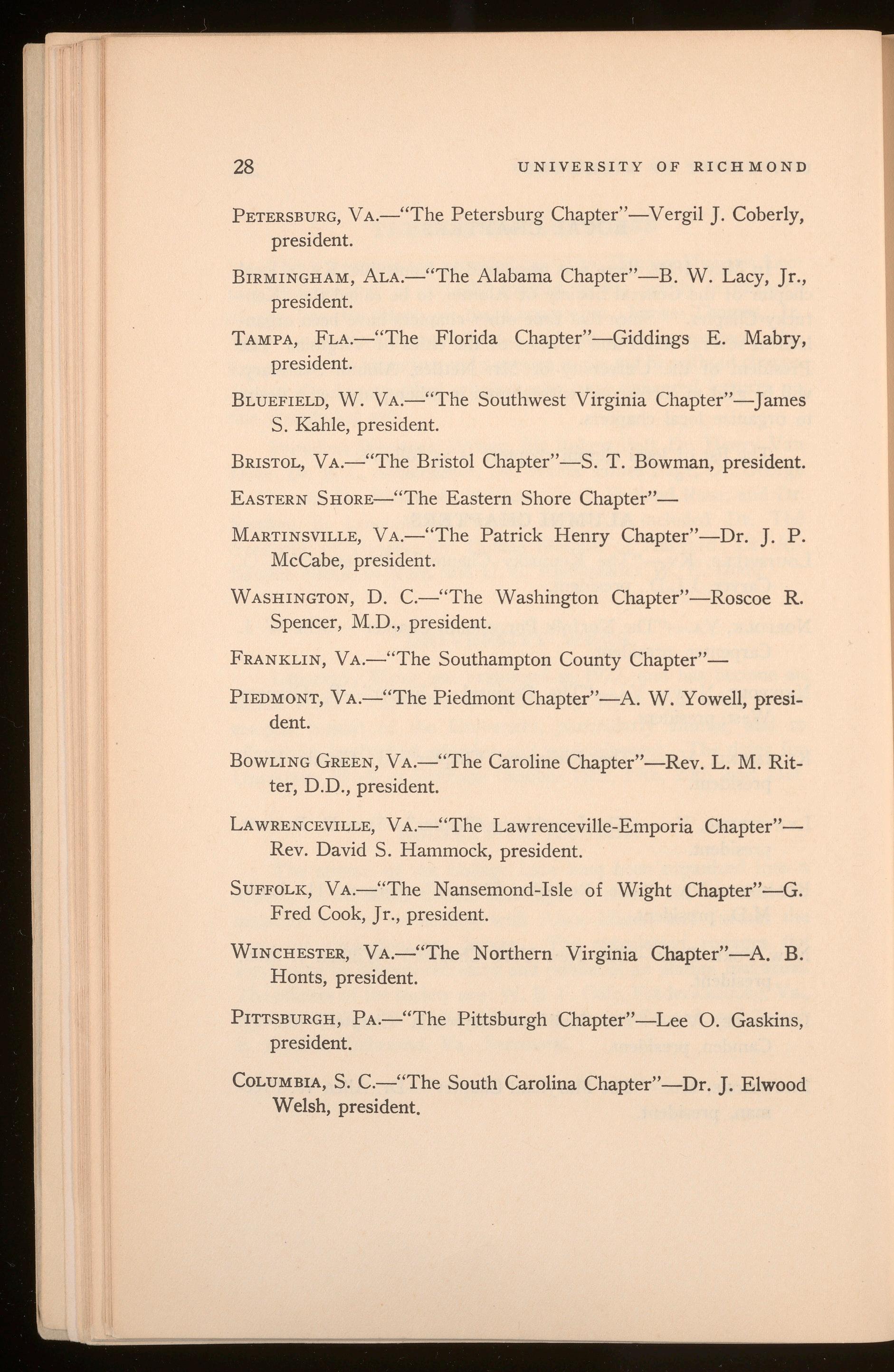
PETERSBURG,VA.-"The Petersburg Chapter"-Vergil J. Coberly, president.
BIRMINGHAM,ALA.-"The Alabama Chapter"-B. W. Lacy, Jr., president.
TAMPA, FLA.-"The Florida Chapter"-Giddings E. Mabry, president.
BLUEFIELD,W. V A.-"The Southwest Virginia Chapter"-J ames S. Kahle, president.
BRISTOL,VA.-"The Bristol Chapter"-S. T. Bowman, president.
EASTERNSHORE-"The Eastern Shore Chapter"-
MARTINSVILLE,VA.-"The Patrick Henry Chapter"-Dr. J. P. McCabe, president.
WASHINGTON,D. C.-"The Washington Chapter"-Roscoe R. Spencer, M.D., president.
FRANKLIN,VA.-"The Southampton County Chapter"-
PrnnMONT,VA.-"The Piedmont Chapter"-A. W. Yowell, president.
BowLING GREEN,VA.-"The Caroline Chapter"-Rev. L. M. Ritter, D.D., president.
LAWRENCEVILLE, V A.-"The Lawrenceville-Emporia Chapter"Rev. David S. Hammock, president.
SUFFOLK, VA.-"The Nansemond-Isle of Wight Chapter"-G. Fred Cook, Jr., president.
WINCHESTER,VA.-"The Northern Virginia Chapter"-A. B. Honts, president.
PITTSBURGH,PA.-"The Pittsburgh Chapter"-Lee 0. Gaskins, president.
COLUMBIA,S. C.-"The South Carolina Chapter"-Dr. J. Elwood Welsh, president.
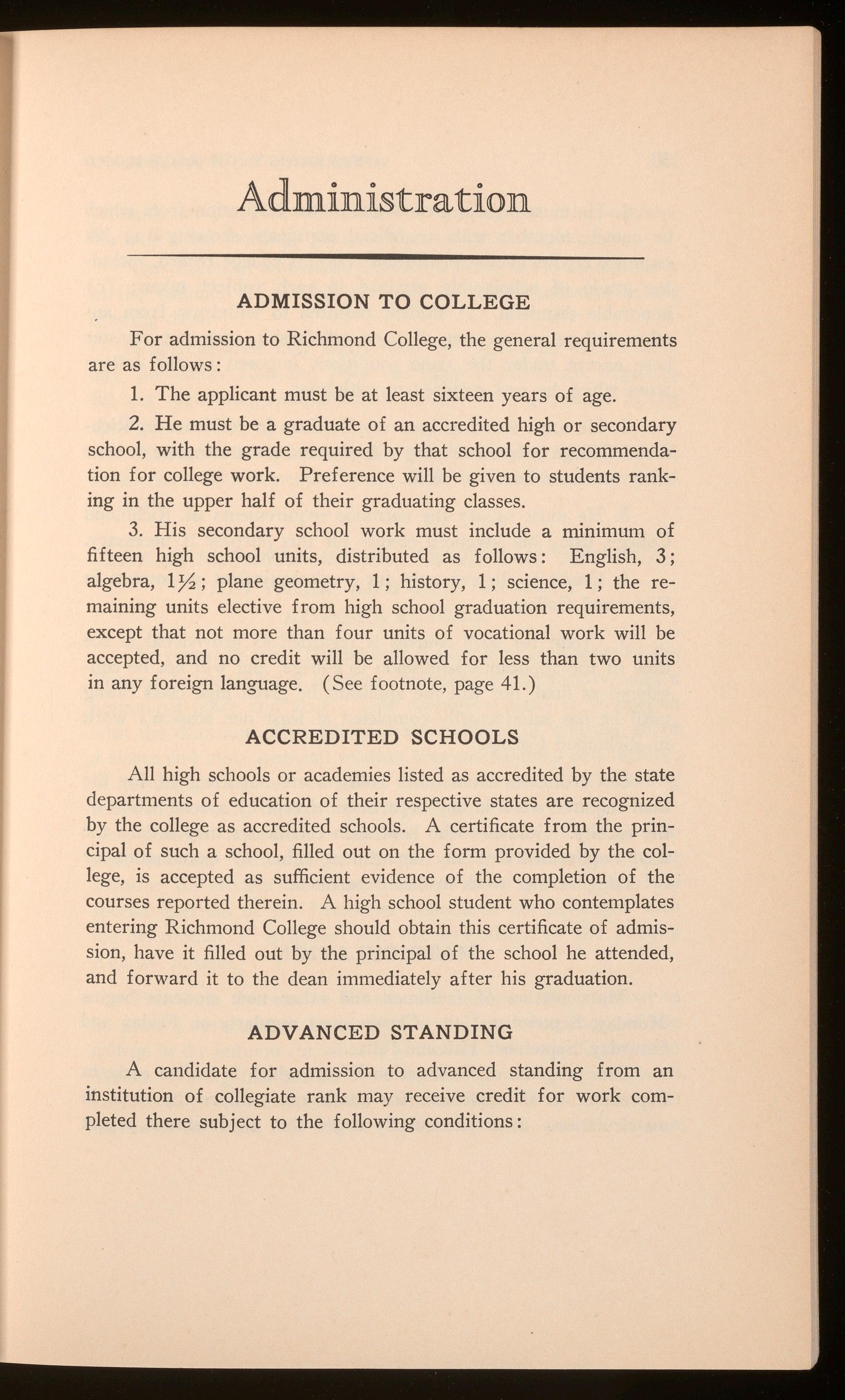
For admission to Richmond College, the general requirements are as follows :
1. The applicant must be at least sixteen years of age .
2. He must be a graduate of an accredited high or secondary school , with the grade required by that school for recommendation for college work. Preference will be given to students ranking in the upper half of their graduating classes.
3. His secondary school work must include a minimum of fifteen high school units, distributed as follows : English, 3; algebra, 1.¼; plane geometry, 1; history, 1; science, 1; the remaining units elective from high school graduation requirements, except that not more than four units of vocational work will be accepted , and no credit will be allowed for less than two units in any foreign language. ( See footnote , page 41.)
All high schools or academies listed as accredited by the state departments of education of their respective states are recognized by the college as accredited schools. A certificate from the principal of such a school, filled out on the form provided by the college, is accepted as sufficient evidence of the completion of the courses reported therein . A high school student who contemplates entering Richmond College should obtain this certificate of admission, have it filled out by the principal of the school he attended, and forward it to the dean immediately after his graduation.
A candidate for admission to advanced standing from an institution of collegiate rank may receive credit for work completed there subject to the following conditions:
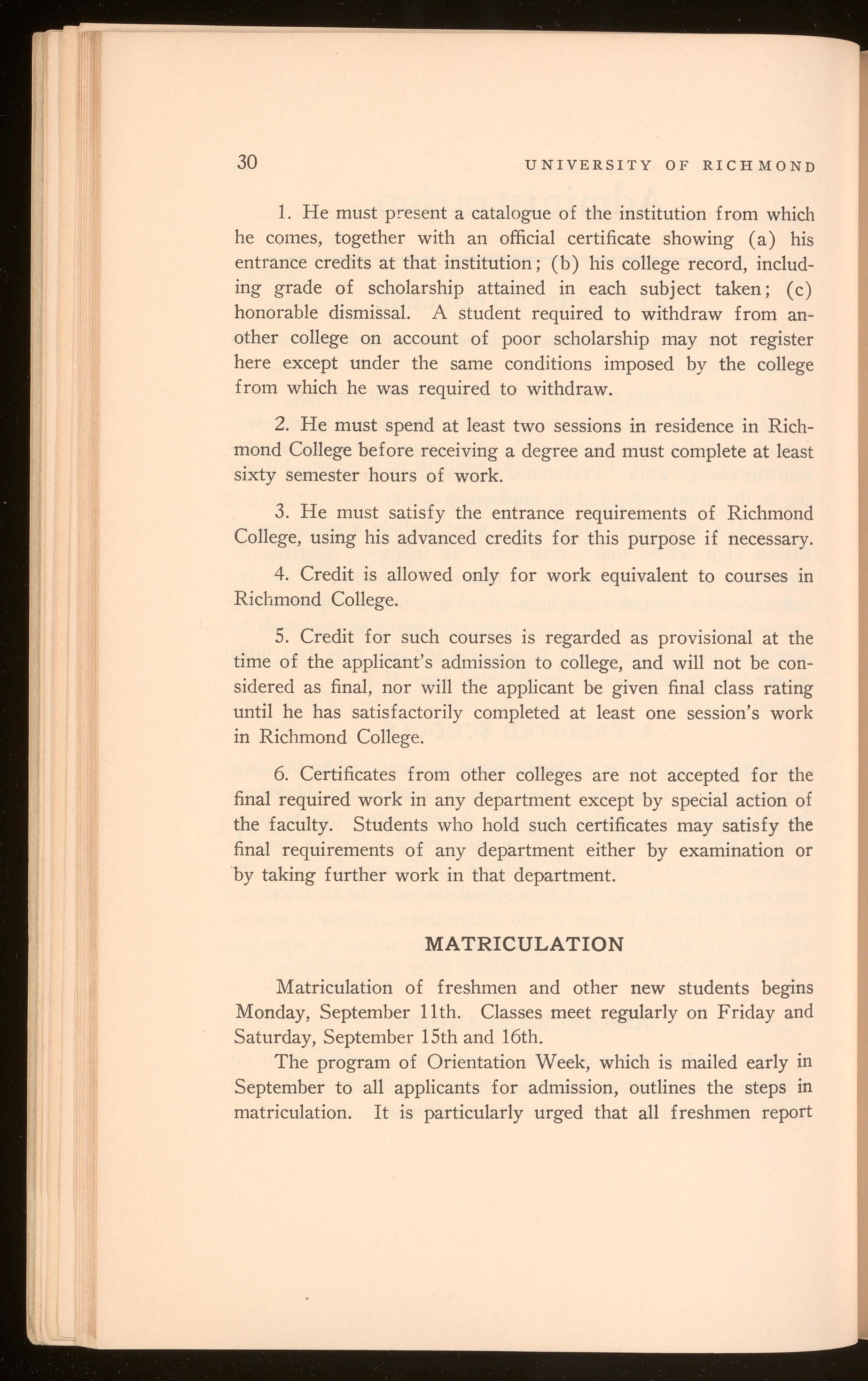
1. He must present a catalogue of the institution from which he comes, together with an official certificate showing (a) his entrance credits at that institution; (b) his college record, including grade of scholarship attained in each subject taken; ( c) honorable dismissal. A student required to withdraw from another college on account of poor scholarship may not register here except under the same conditions imposed by the college from which he was required to withdraw.
2. He must spend at least two sessions in residence in Richmond College before receiving a degree and must complete at least sixty semester hours of work.
3. He must satisfy the entrance requirements of Richmond College, using his advanced credits for this purpose if necessary.
4. Credit is allowed only for work equivalent to courses m Richmond College.
5. Credit for such courses is regarded as provisional at the time of the applicant's admission to college, and will not be considered as final, nor will the applicant be given final class rating until he has satisfactorily completed at least one session's work in Richmond College.
6. Certificates from other colleges are not accepted for the final required work in any department except by special action of the faculty. Students who hold such certificates may satisfy the final requirements of any department either by examination or by taking further work in that department.
Matriculation of freshmen and other new students begins Monday, September 11th. Classes meet regularly on Friday and Saturday, September 15th and 16th.
The program of Orientation Week, which is mailed early in September to all applicants for admission, outlines the steps in matriculation. It is particularly urged that all freshmen report
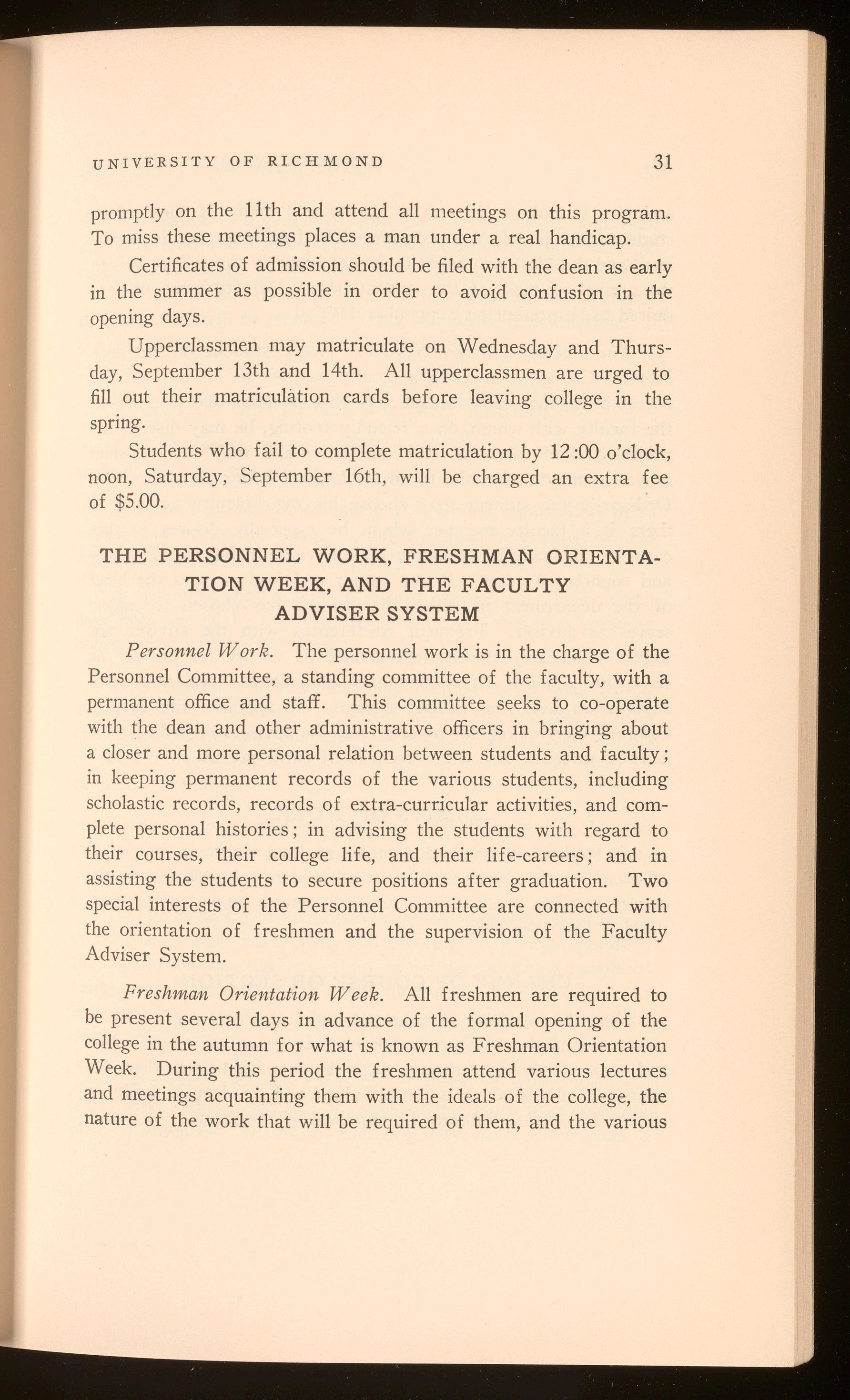
promptly on the 11th and attend all meetings on this program. To miss these meetings places a man under a real handicap.
Certificates of admission should be filed with the dean as early in the summer as possible in order to avoid confusion in the opening days.
Upperclassmen may matriculate on Wednesday and Thursday, September 13th and 14th. All upperclassmen are urged to fill out their matriculation cards before leaving college in the spring.
Students who fail to complete matriculation by 12 :00 o'clock, noon, Saturday, September 16th, will be charged an extra fee of $5.00.
Personnel Work. The personnel work is in the charge of the Personnel Committee, a standing committee of the faculty, with a permanent office and staff. This committee seeks to co-operate with the dean and other administrative officers in bringing about a closer and more personal relation between students and faculty; in keeping permanent records of the various students, including scholastic records, records of extra-curricular activities, and complete personal histories ; in advising the students with regard to their courses, their college life, and their life-careers; and in assisting the students to secure positions after graduation. Two special interests of the Personnel Committee are connected with the orientation of freshmen and the supervision of the Faculty Adviser System.
Freshman Orientation Week. All freshmen are required to be present several days in advance of the formal opening of the college in the autumn for what is known as Freshman Orientation Week. During this period the freshmen attend various lectures and meetings acquainting them with the ideals of the college, the nature of the work that will be required of them, and the various
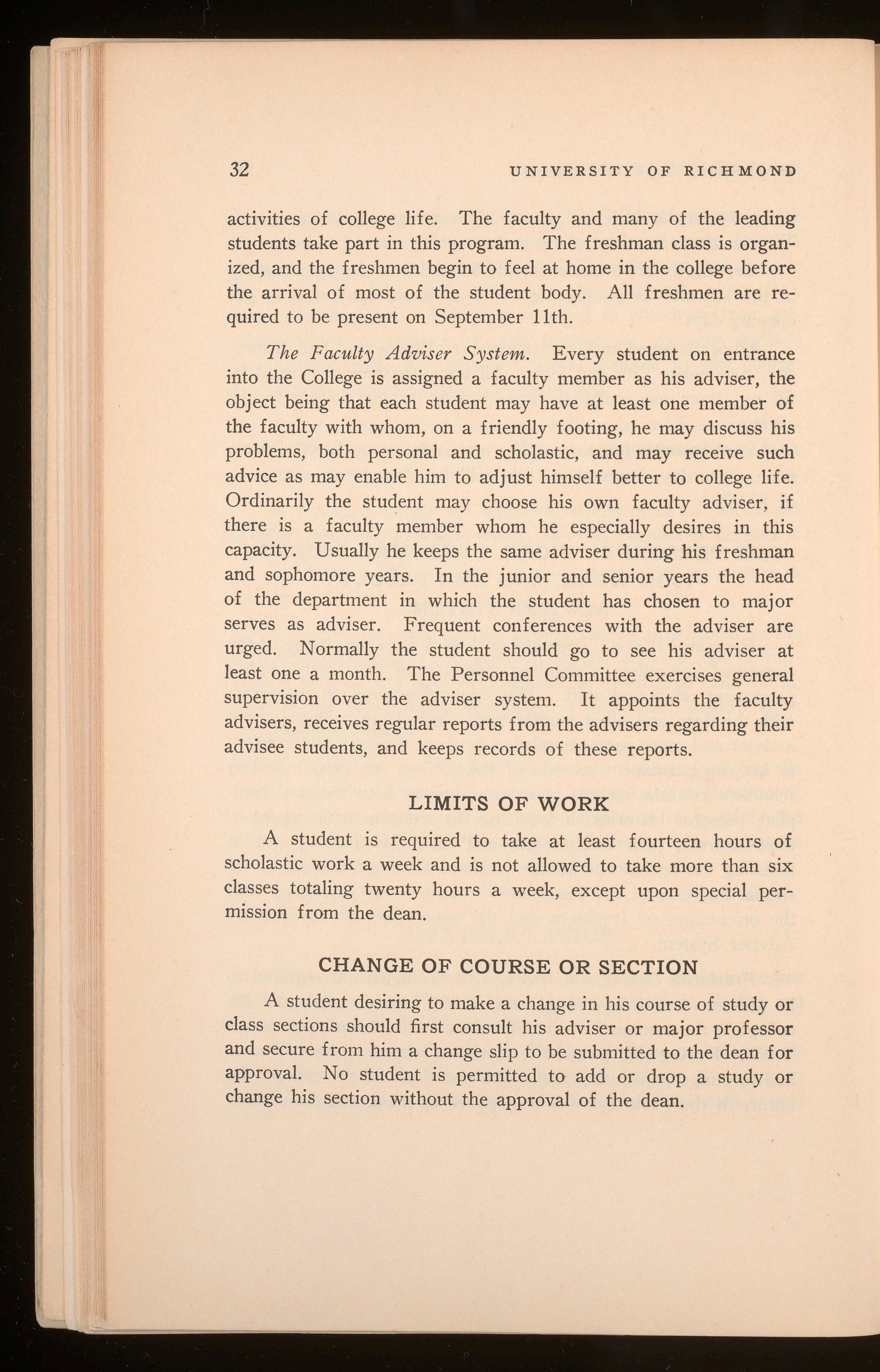
activities of college life. The faculty and many of the leading students take part in this program. The freshman class is organized, and the freshmen begin to feel at home in the college before the arrival of most of the student body. All freshmen are required to be present on September 11th.
The Faculty Advis er System . Every student on entrance into the College is assigned a faculty member as his adviser, the object being that each student may have at least one member of the faculty with whom, on a friendly footing, he may discuss his problems, both personal and scholastic, and may receive such advice as may enable him to adjust himself better to college life. Ordinarily the student may choose his own faculty adviser, if there is a faculty member whom he especially desires in this capacity. Usually he keeps the same adviser during his freshman and sophomore years. In the junior and senior years the head of the department in which the student has chosen to major serves as adviser. Frequent conferences with the adviser are urged. Normally the student should go to see his adviser at least one a month. The Personnel Committee exercises general supervision over the adviser system. It appoints the faculty advisers, receives regular reports from the advisers regarding their advisee students, and keeps records of these reports.
A student is required to take at least fourteen hours of scholastic work a week and is not allowed to take more than six classes totaling twenty hours a week, except upon special permission from the dean.
A student desiring to make a change in his course of study or class sections should first consult his adviser or major professor and secure from him a change slip to be submitted to the dean for approval. No student is permitted to add or drop a study or change his section without the approval of the dean.
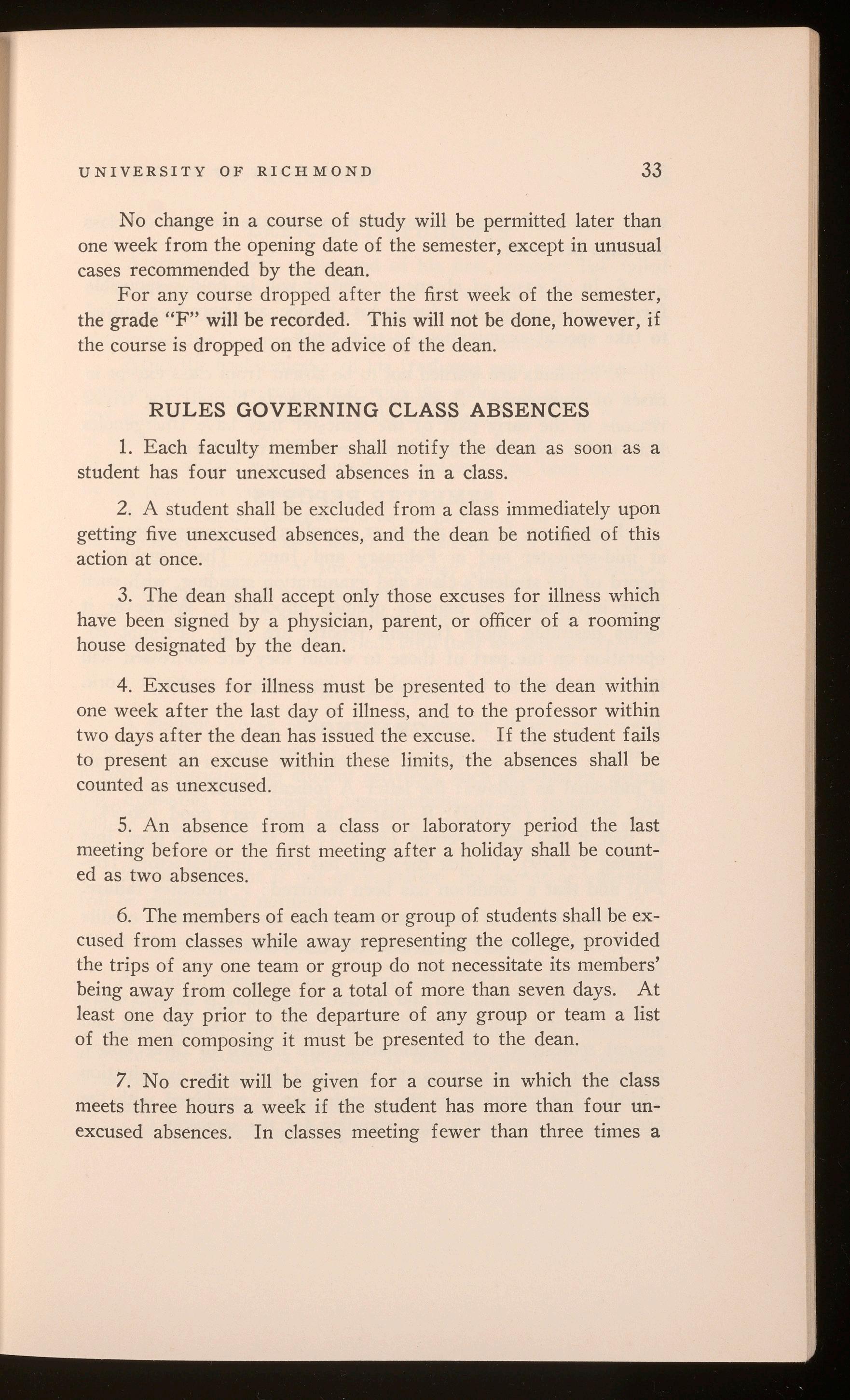
No change in a course of study will be permitted later than one week from the opening date of the semester, except in unusual cases recommended by the dean.
For any course dropped after the first week of the semester, the grade "F" will be recorded. This will not be done, however, if the course is dropped on the advice of the dean
1. Each faculty member shall notify the dean as soon as a student has four unexcused absences in a class.
2 A student shall be excluded from a class immediately upon getting five unexcused absences, and the dean be notified of this action at once.
3. The dean shall accept only those excuses for illness which have been signed by a physician, parent, or officer of a rooming house designated by the dean.
4 . Excuses for illness must be presented to the dean within one week after the last day of illness, and to the professor within two days after the dean has issued the excuse If the student fails to present an excuse within these limits, the absences shall be counted as unexcused.
5. An absence from a class or laboratory period the last meeting before or the first meeting after a holiday shall be counted as two absences.
6. The members of each team or group of students shall be excused from classes while away representing the college, provided the trips of any one team or group do not necessitate its members' being away from college for a total of more than seven days. At least one day prior to the departure of any group or team a list of the men composing it must be presented to the dean
7. No credit will be given for a course in which the class meets three hours a week if the student has more than four unexcused absences. In classes meeting fewer than three times a
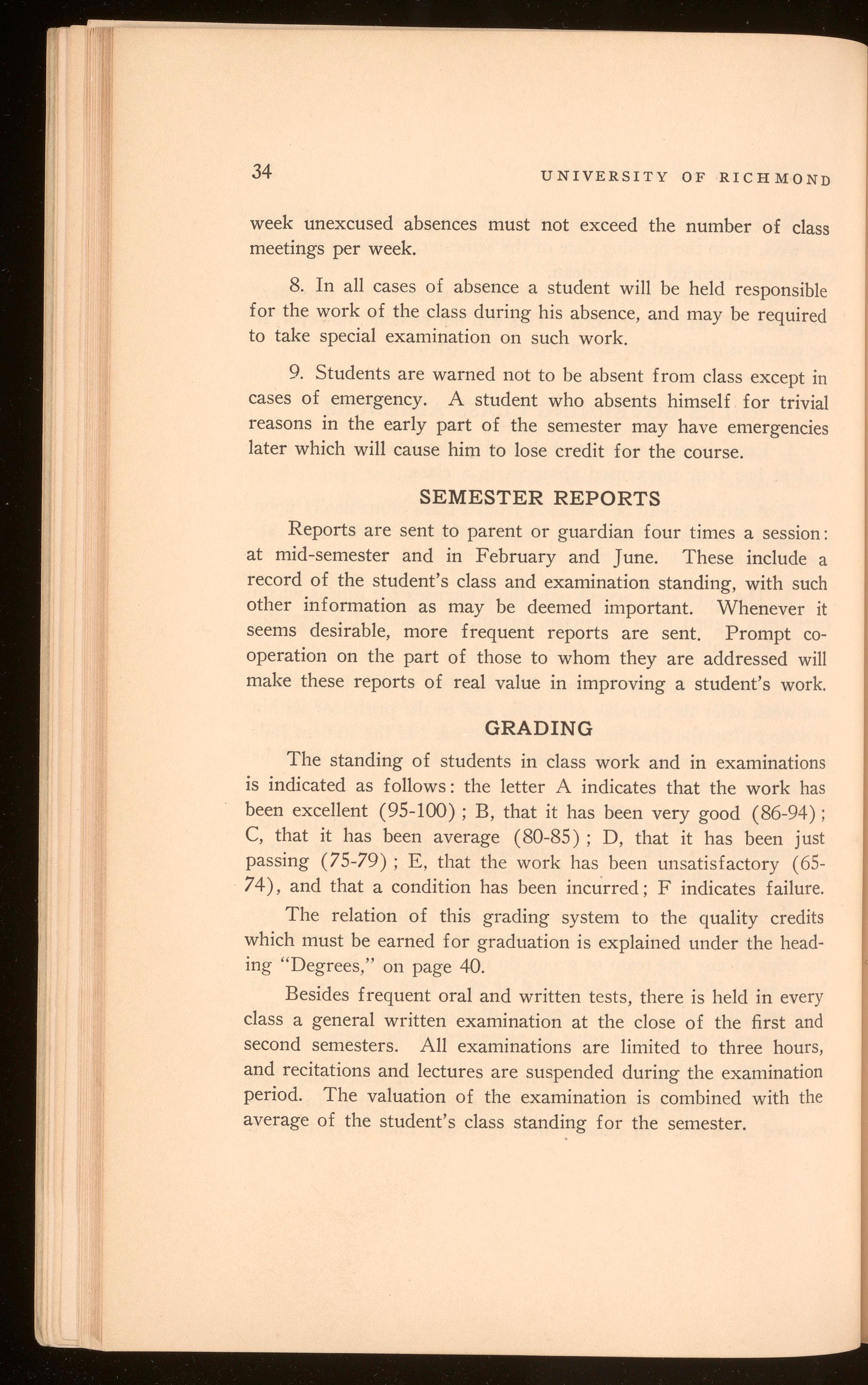
week unexcused absences must not exceed the number of class meetings per week.
8. In all cases of absence a student will be held responsible for the work of the class during his absence, and may be required to take special examination on such work.
9. Students are warned not to be absent from class except in cases of emergency. A student who absents himself for trivial reasons in the early part of the semester may have emergencies later which will cause him to lose credit for the course.
Reports are sent to parent or guardian four times a session: at mid-semester and in February and June. These include a record of the student's class and examination standing, with such other information as may be deemed important. Whenever it seems desirable, more frequent reports are sent. Prompt cooperation on the part of those to whom they are addressed will make these reports of real value in improving a student's work.
The standing of students in class work and in examinations is indicated as follows : the letter A indicates that the work has been excellent (95-100); B, that it has been very good (86-94); C, that it has been average (80-85); D, that it has been just passing (75-79); E, that the work has been unsatisfactory (6574), and that a condition has been incurred ; F indicates failure.
The relation of this grading system to the quality credits which must be earned for graduation is explained under the heading "Degrees," on page 40.
Besides frequent oral and written tests, there is held in every class a general written examination at the close of the first and second semesters. All examinations are limited to three hours, and recitations and lectures are suspended during the examination period. The valuation of the examination is combined with the average of the student's class standing for the semester.
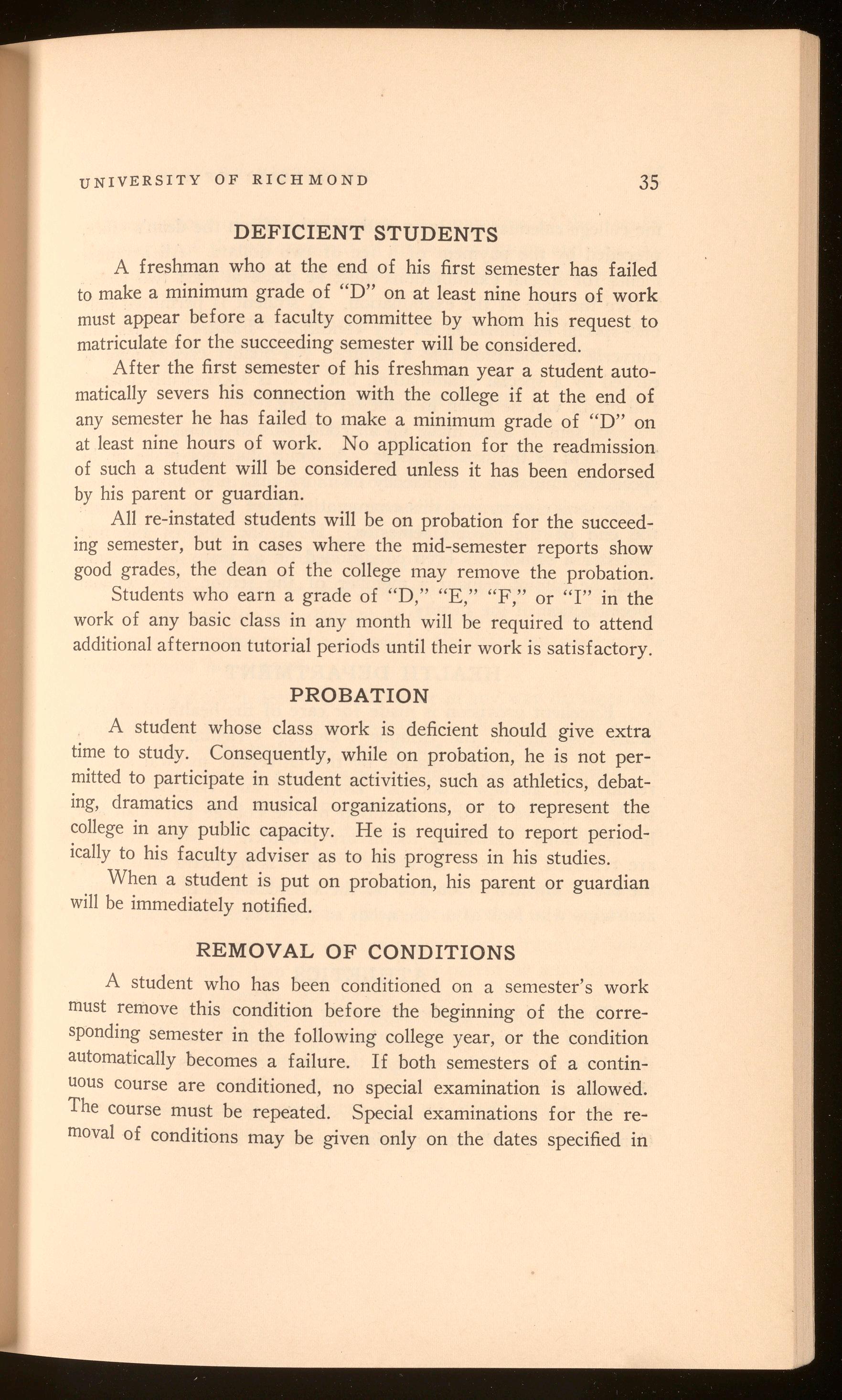
A freshman who at the end of his first semester has failed to make a minimum grade of "D" on at least nine hours of work must appear before a faculty committee by whom his request to matriculate for the succeeding semester will be considered.
After the first semester of his freshman year a student automatically severs his connection with the college if at the end of any semester he has failed to make a minimum grade of "D" on at least nine hours of work. No application for the readmission of such a student will be considered unless it has been endorsed by his parent or guardian.
All re-instated students will be on probation for the succeeding semester, but in cases where the mid-semester reports show good grades, the dean of the college may remove the probation. Students who earn a grade of "D," "E," "F," or "I" in the work of any basic class in any month will be required to attend additional afternoon tutorial periods until their work is satisfactory.
A student whose class work is deficient should give extra time to study. Consequently, while on probation, he is not permitted to participate in student activities, such as athletics, debating, dramatics and musical organizations, or to represent the college in any public capacity. He is required to report periodically to his faculty adviser as to his progress in his studies.
When a student is put on probation, his parent or guardian will be immediately notified.
A student who has been conditioned on a semester's work must remove this condition before the beginning of the corresponding semester in the following college year, or the condition automatically becomes a failure. If both semesters of a continuous course are conditioned, no special examination is allowed. The course must be repeated. Special examinations for the removal of conditions may be given only on the dates specified in
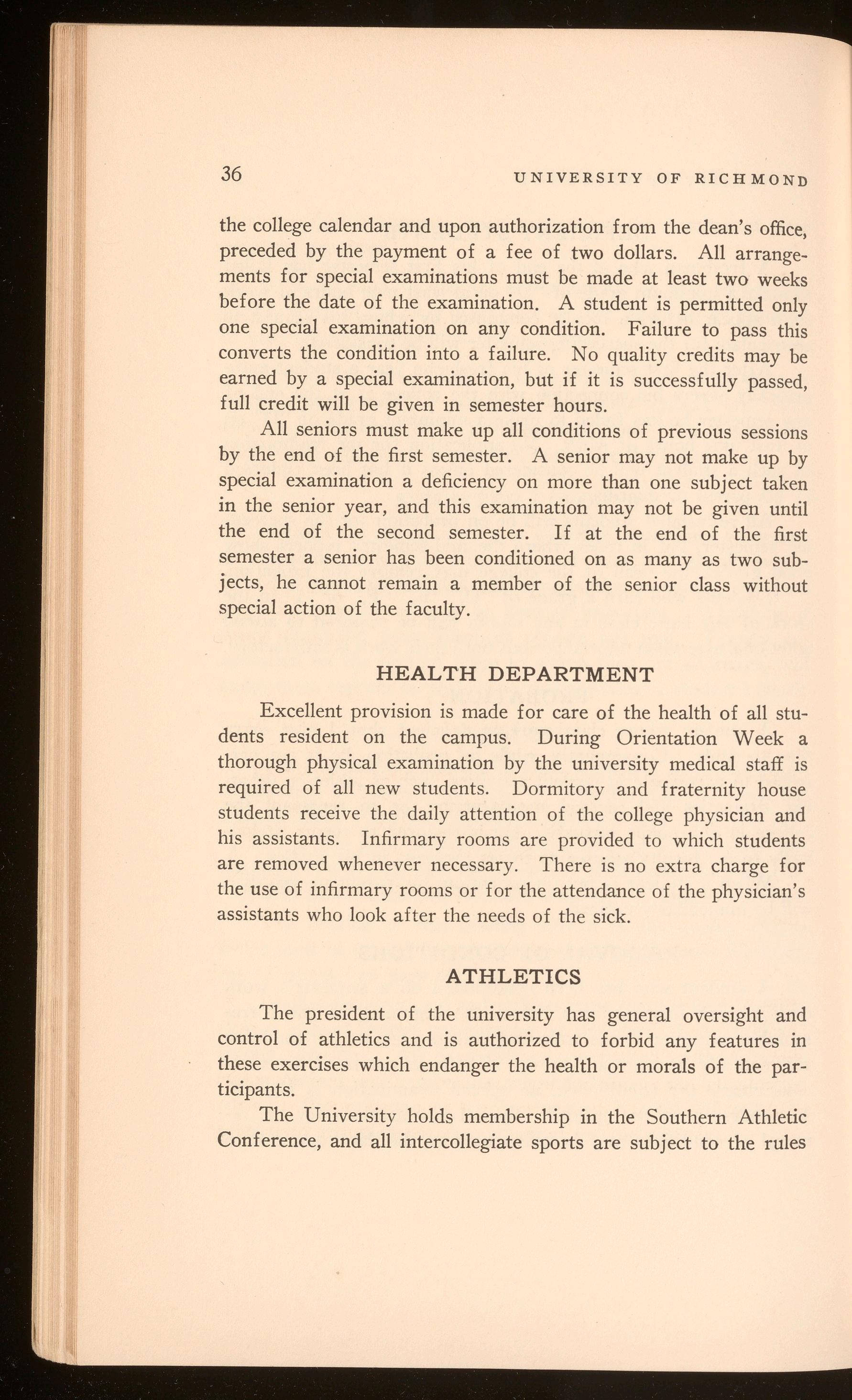
the college calendar and upon authorization from the dean's office, preceded by the payment of a fee of two dollars. All arrangements for special examinations must be made at least two weeks before the date of the examination. A student is permitted only one special examination on any condition. Failure to pass this converts the condition into a failure. No quality credits may be earned by a special examination, but if it is successfully passed, full credit will be given in semester hours.
All seniors must make up all conditions of previous sessions by the end of the first semester. A senior may not make up by special examination a deficiency on more than one subject taken in the senior year, and this examination may not be given until the end of the second semester. If at the end of the first semester a senior has been conditioned on as many as two subjects, he cannot remain a member of the senior class without special action of the faculty.
Excellent provision is made for care of the health of all students resident on the campus. During Orientation Week a thorough physical examination by the university medical staff is required of all new students. Dormitory and fraternity house students receive the daily attention of the college physician and his assistants. Infirmary rooms are provided to which students are removed whenever necessary. There is no extra charge for the use of infirmary rooms or for the attendance of the physician's assistants who look after the needs of the sick.
The president of the university has general oversight and control of athletics and is authorized to forbid any features in these exercises which endanger the health or morals of the participants.
The University holds membership in the Southern Athletic Conference, and all intercollegiate sports are subject to the rules
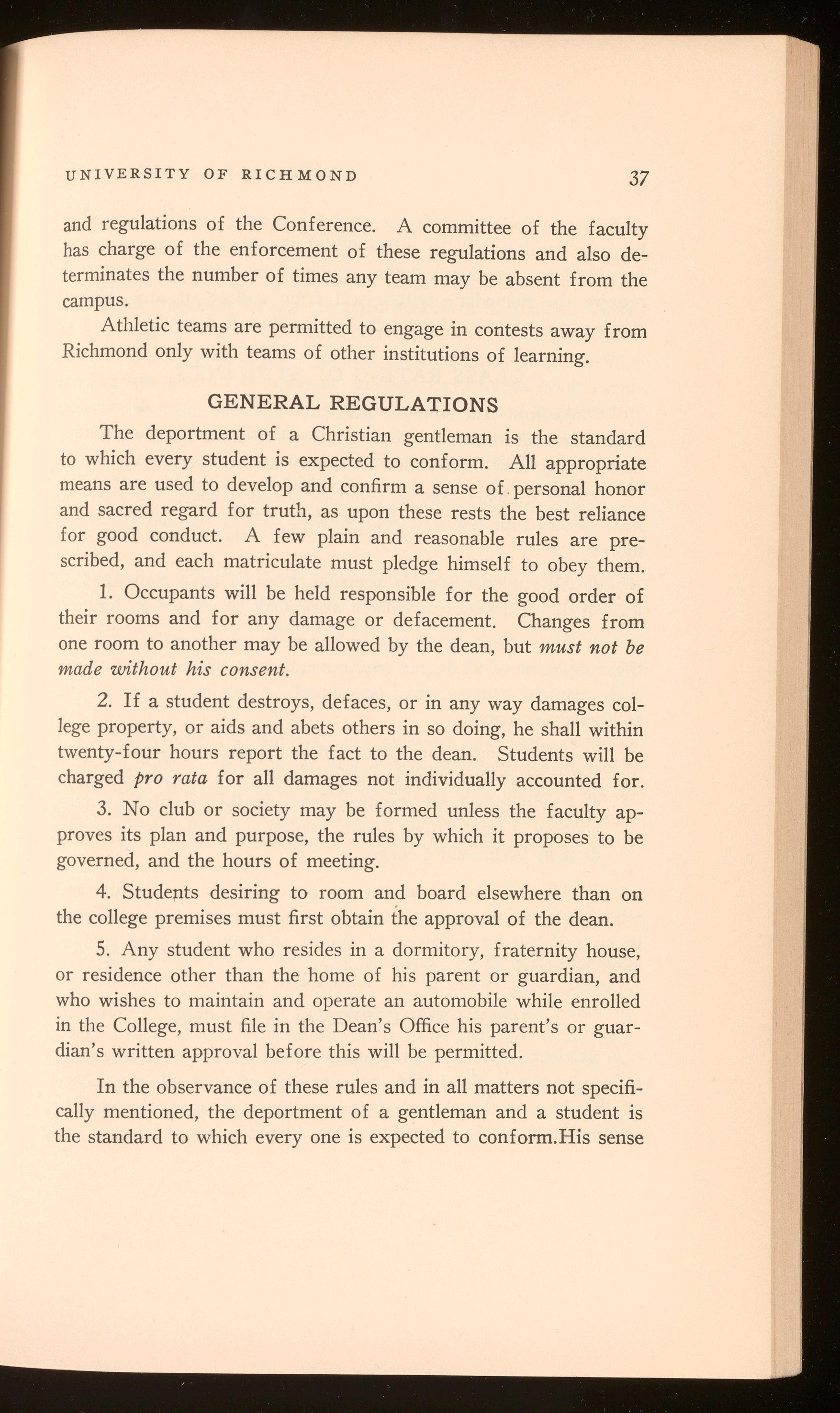
and regulations of the Conference. A committee of the faculty has charge of the enforcement of these regulations and also determinates the number of times any team may be absent from the campus.
Athletic teams are permitted to engage in contests away from Richmond only with teams of other institutions of learning.
The deportment of a Christian gentleman is the standard to which every student is expected to conform. All appropriate means are used to develop and confirm a sense of . personal honor and sacred regard for truth, as upon these rests the best reliance for good conduct. A few plain and reasonable rules are prescribed, and each matriculate must pledge himself to obey them.
1. Occupants will be held responsible for the good order of their rooms and for any damage or defacement. Changes from one room to another may be allowed by the dean, but must not be made without his consent.
2. If a student destroys, defaces, or in any way damages college property, or aids and abets others in so doing, he shall within twenty-four hours report the fact to the dean. Students will be charged pro rata for all damages not individually accounted for.
3. No club or society may be formed unless the faculty approves its plan and purpose, the rules by which it proposes to be governed, and the hours of meeting.
4. Studepts desiring to room and board elsewhere than on the college premises must first obtain the approval of the dean.
5. Any student who resides in a dormitory, fraternity house, or residence other than the home of his parent or guardian, and who wishes to maintain and operate an automobile while enrolled in the College, must file in the Dean's Office his parent's or guardian's written approval before this will be permitted.
In the observance of these rules and in all matters not specifically mentioned, the deportment of a gentleman and a student is the standard to which every one is expected to conform.His sense
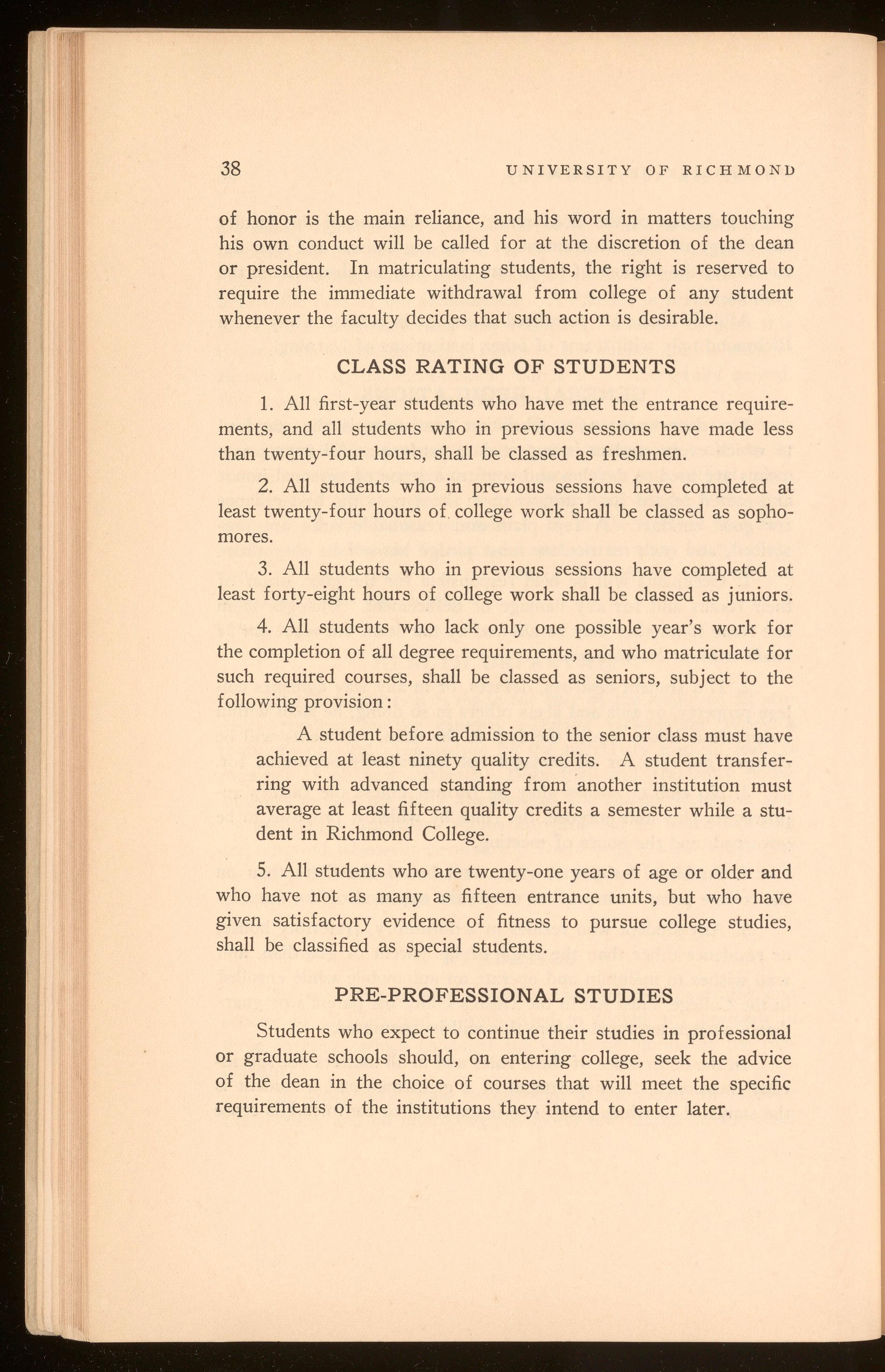
of honor is the main reliance, and his word in matters touching his own conduct will be called for at the discretion of the dean or president. In matriculating students, the right is reserved to require the immediate withdrawal from college of any student whenever the faculty decides that such action is desirable.
1. All first-year students who have met the entrance requirements, and all students who in previous sessions have made less than twenty-four hours, shall be classed as freshmen.
2. All students who in previous sessions have completed at least twenty-four hours of . college work shall be classed as sophomores.
3 . All students who in previous sessions have completed at least forty-eight hours of college work shall be classed as juniors.
4. All students who lack only one possible year's work for the completion of all degree requirements, and who matriculate for such required courses, shall be classed as seniors, subject to the following provision :
A student before admission to the senior class must have achieved at least ninety quality credits. A student transferring with advanced standing from another institution must average at least fifteen quality credits a semester while a student in Richmond College.
5. All students who are twenty-one years of age or older and who have not as many as fifteen entrance units, but who have given satisfactory evidence of fitness to pursue college studies, shall be classified as special students.
Students who expect to continue their studies in professional or graduate schools should, on entering college, seek the advice of the dean in the choice of courses that will meet the specific requirements of the institutions they intend to enter later.
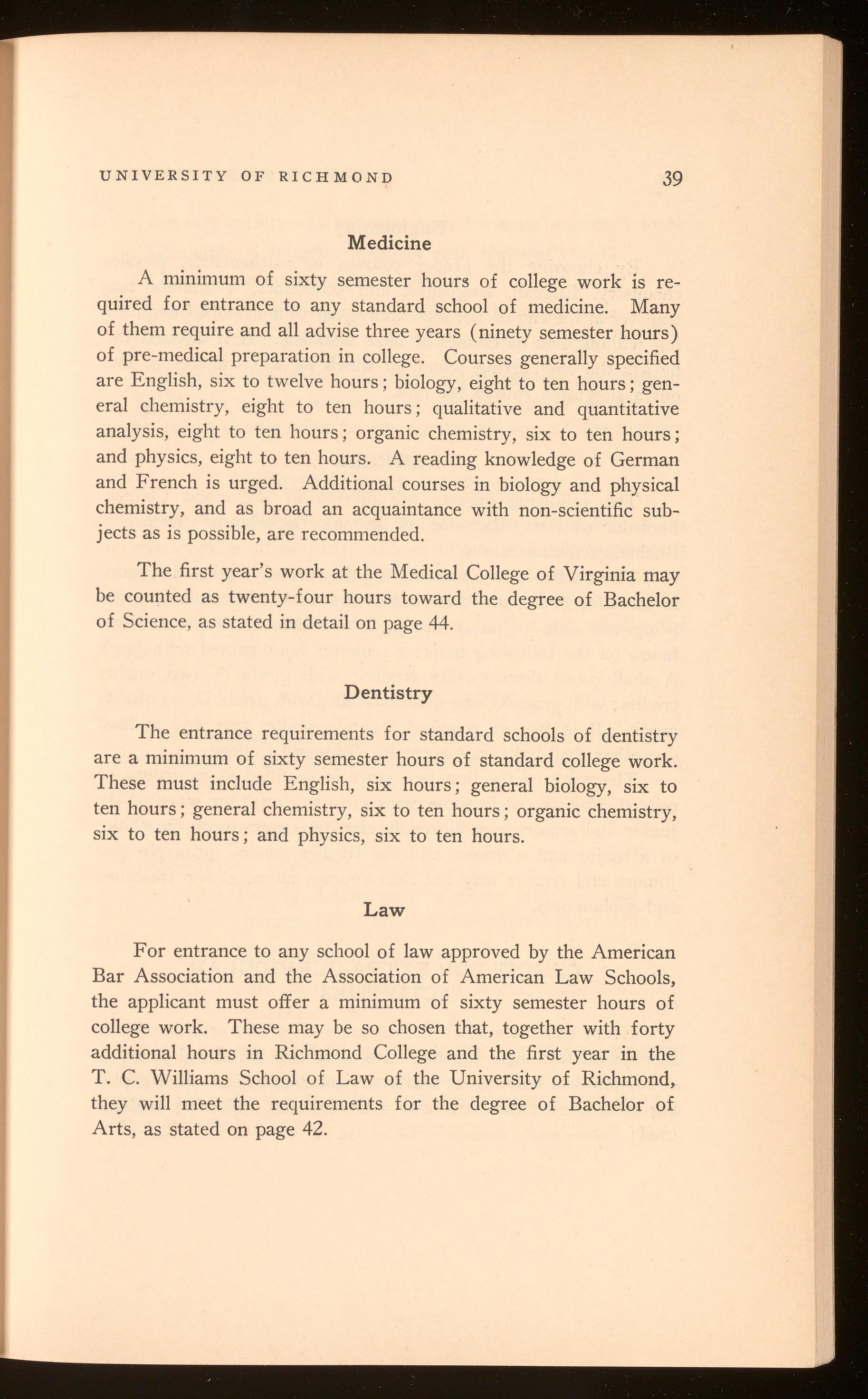
A minimum of sixty semester hour5 of college work is required for entrance to any standard school of medicine. Many of them require and all advise three years ( ninety semester hours) of pre-medical preparation in college. Courses generally specified are English, six to twelve hours; biology, eight to ten hours; general chemistry, eight to ten hours; qualitative and quantitative analysis, eight to ten hours; organic chemistry, six to ten hours; and physics, eight to ten hours. A reading knowledge of German and French is urged. Additional courses in biology and physical chemistry, and as broad an acquaintance with non-scientific subjects as is possible, are recommended.
The first year's work at the Medical College of Virginia may be counted as twenty-four hours toward the degree of Bachelor of Science, as stated in detail on page 44.
The entrance requirements for standard schools of dentistry are a minimum of sixty semester hours of standard college work. These must include English, six hours; general biology, six to ten hours; general chemistry, six to ten hours; organic chemistry, six to ten hours; and physics, six to ten hours.
For entrance to any school of law approved by the American Bar Association and the Association of American Law Schools, the applicant must offer a minimum of sixty semester hours of college work. These may be so chosen that, together with forty additional hours in Richmond College and the first year in the T. C. Williams School of Law of the University of Richmond, they will meet the requirements for the degree of Bachelor of Arts, as stated on page 42.
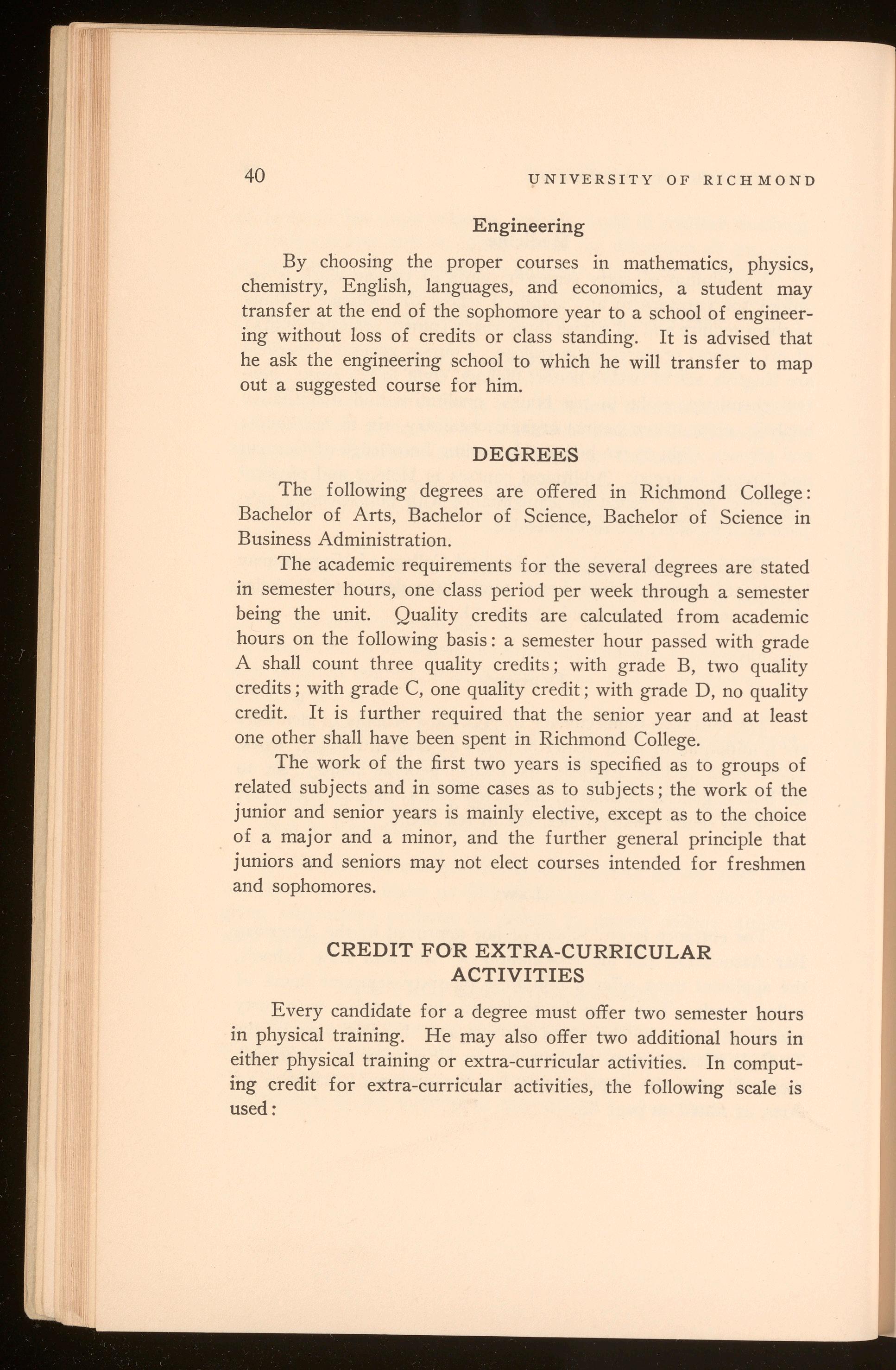
By choosing the proper courses in mathematics, physics, chemistry, English, languages, and economics, a student may transfer at the end of the sophomore year to a school of engineering without loss of credits or class standing. It is advised that he ask the engineering school to which he will transfer to map out a suggested course for him.
The following degrees are offered m Richmond College : Bachelor of Arts, Bachelor of Science, Bachelor of Science in Business Administration.
The academic requirements for the several degrees are stated in semester hours, one class period per week through a semester being the unit. Quality credits are calculated from academic hours on the following basis : a semester hour passed with grade A shall count three quality credits; with grade B, two quality credits; with grade C, one quality credit; with grade D, no quality credit. It is further required that the senior year and at least one other shall have been spent in Richmond College.
The work of the first two years is specified as to groups of related subjects and in some cases as to subjects; the work of the junior and senior years is mainly elective, except as to the choice of a major and a minor, and the further general principle that juniors and seniors may not elect courses intended for freshmen and sophomores.
Every candidate for a degree must offer two semester hours in physical training. He may also offer two additional hours in either physical training or extra-curricular activities. In computing credit for extra-curricular activities, the following scale is used:
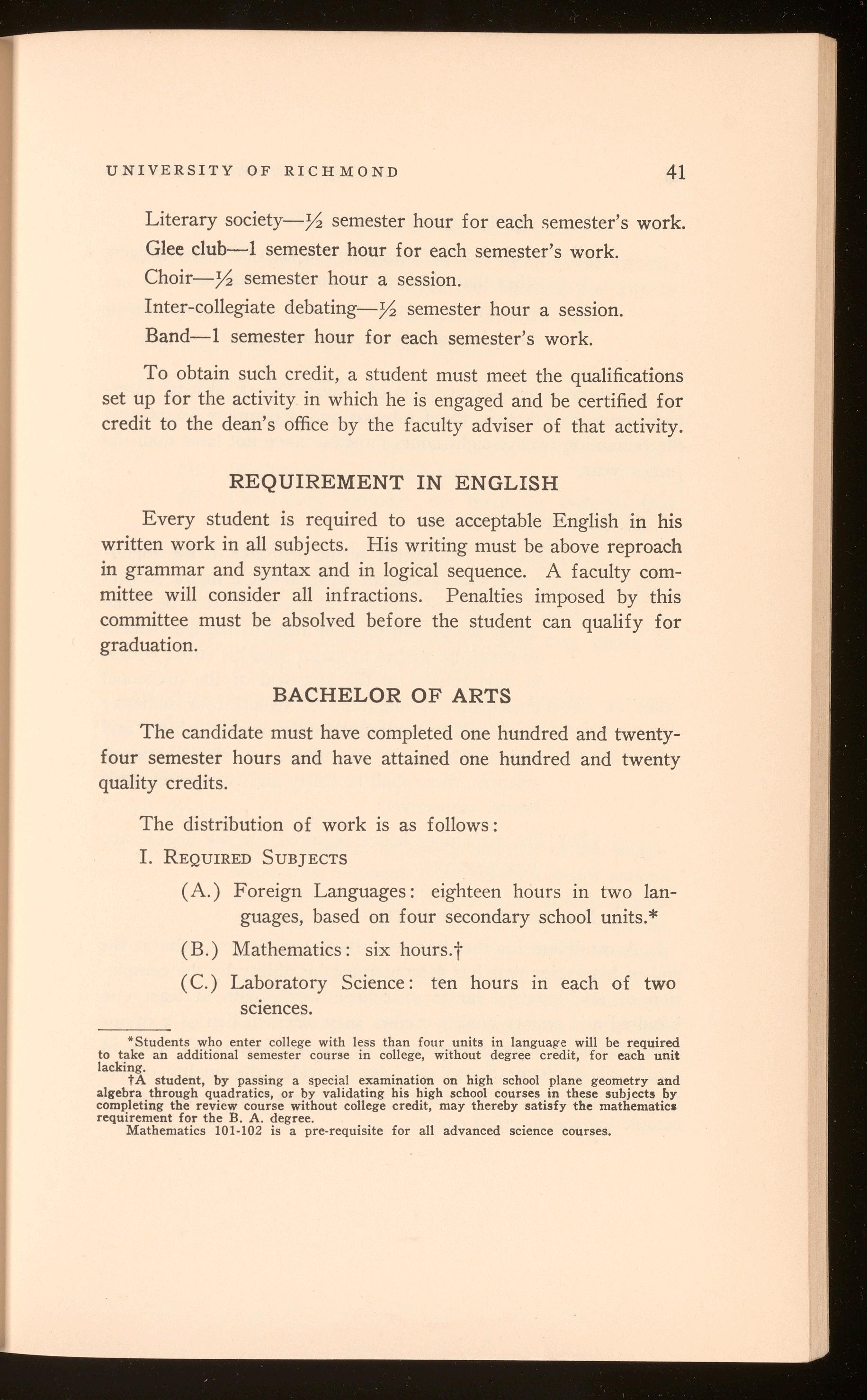
Literary society-,¼ semester hour for each semester's work.
Glee club-1 semester hour for each semester's work.
Choir-¼ semester hour a session.
Inter-collegiate debating-,¼ semester hour a session.
Band-1 semester hour for each semester's work.
To obtain such credit, a student must meet the qualifications set up for the activity in which he is engaged and be certified for credit to the dean's office by the faculty adviser of that activity.
Every student is required to use acceptable English in his written work in all subjects. His writing must be above reproach in grammar and syntax and in logical sequence. A faculty committee will consider all infractions. Penalties imposed by this committee must be absolved before the student can qualify for graduation.
The candidate must have completed one hundred and twentyfour semester hours and have attained one hundred and twenty quality credits.
The distribution of work is as follows :
(A.) Foreign Languages: eighteen hours in two languages, based on four secondary school units.*
(B.) Mathematics: six hours.t
( C.) Laboratory Science: ten hours m each of two sciences.
*Students who enter college with less than four units in langualle will be required to take an additional semester course in college, without degree credit, for each unit lacking.
t A student, by passing a special examination on high school plane geometry and algebra through quadratics, or by validating his high school courses. in these subjects _by completing the review course without college credit, may thereby satisfy the mathematics requirement for the B A degree. Mathematics 101-102 is a pre-requisite for all advanced science courses.
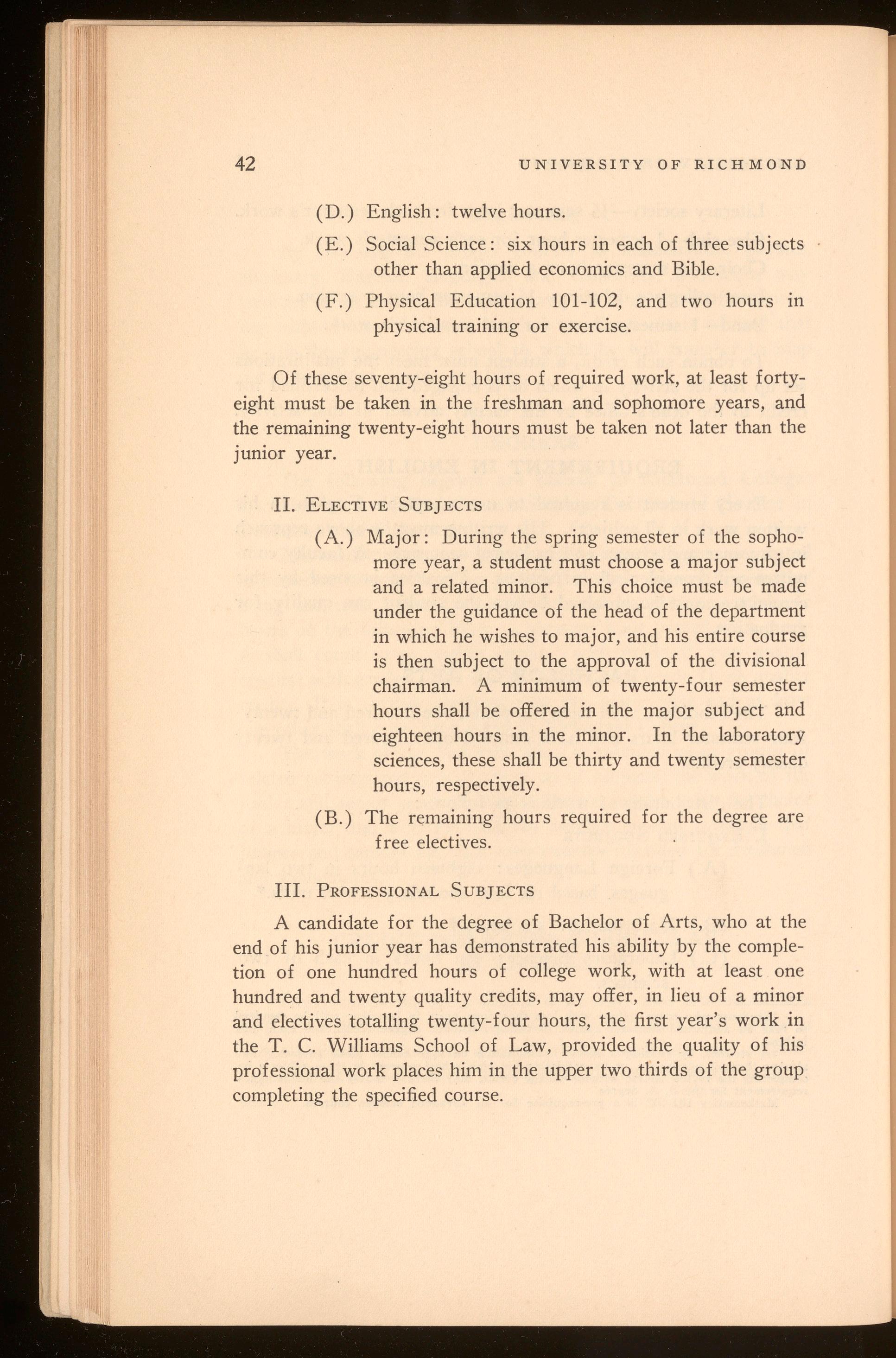
(D.) English: twelve hours .
( E.) Social Science: six hours in each of three subjects other than applied economics and Bible.
(F.) Physical Education 101-102, and two hours in physical training or exercise.
Of these seventy-eight hours of required work, at least fortyeight must be taken in the freshman and sophomore years, and the remaining twenty-eight hours must be taken not later than the junior year.
(A.) Major: During the spring semester of the sophomore year, a student must choose a major subject and a related minor. This choice must be made under the guidance of the head of the department in which he wishes to major , and his entire course is then subject to the approval of the divisional chairman. A minimum of twenty-four semester hours shall be offered in the major subject and eighteen hours in the minor. In the laboratory sciences, these shall be thirty and twenty semester hours, respectively.
(B.) The remaining hours required for the degree are free electives.
A candidate for the degree of Bachelor of Arts, who at the end of his junior year has demonstrated his ability by the completion of one hundred hours of college work, with at least one hundred and twenty quality credits , may offer , in lieu of a minor and electives totalling twenty-four hours, the first year's work in the T C. Williams School of Law, provided the quality of his professional work places him in the upper two thirds of the group completing the specified course.
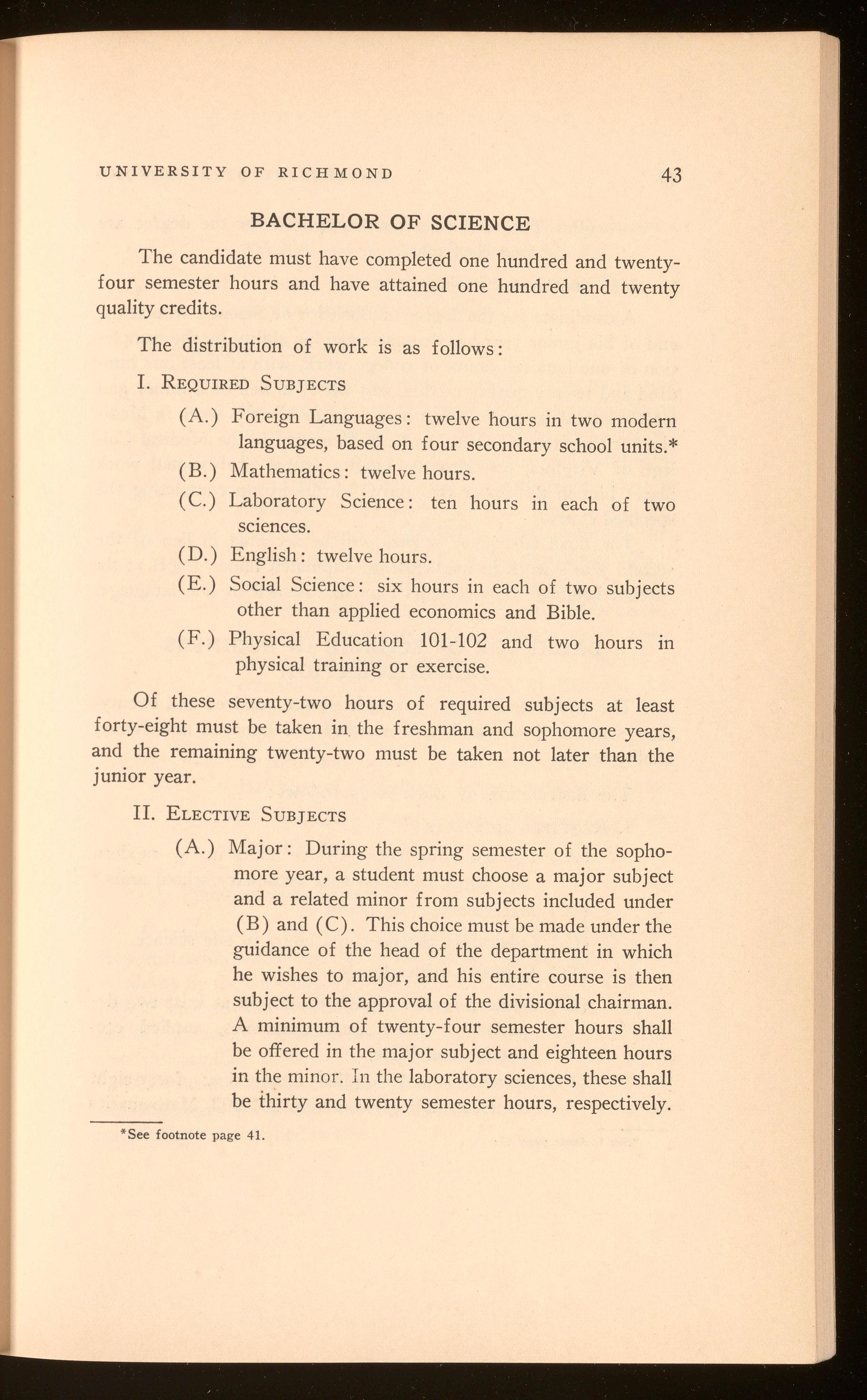
The candidate must have completed one hundred and twentyfour semester hours and have attained one hundred and twenty quality credits.
The distribution of work is as follows:
I.
(A.) Foreign Languages: twelve hours in two modern languages, based on four secondary school units.*
(
(
B.) Mathematics : twelve hours.
C.) Laboratory Science : ten hours in each of two sciences .
(D.) English: twelve hours.
(E.) Social Science: six hours in each of two subjects other than applied economics and Bible.
(F.) Physical Education 101-102 and two hours in physical training or exercise.
Of these seventy-two hours of required subjects at least forty-eight must be taken in the freshman and sophomore years, and the remaining twenty-two must be taken not later than the junior year.
II. ELECTIVE SUBJECTS
(A.) Major:
During the spring semester of the sophomore year, a student must choose a major subject and a related minor from subjects included under ( B) and ( C). This choice must be made under the guidance of the head of the department in which he wishes to major, and his entire course is then subject to the approval of the divisional chairman. A minimum of twenty-four semester hours shall be offered in the major subject and eighteen hours in the minor. In the laboratory sciences, these shall be thirty and twenty semester hours, respectively.
• See footnote page 41.
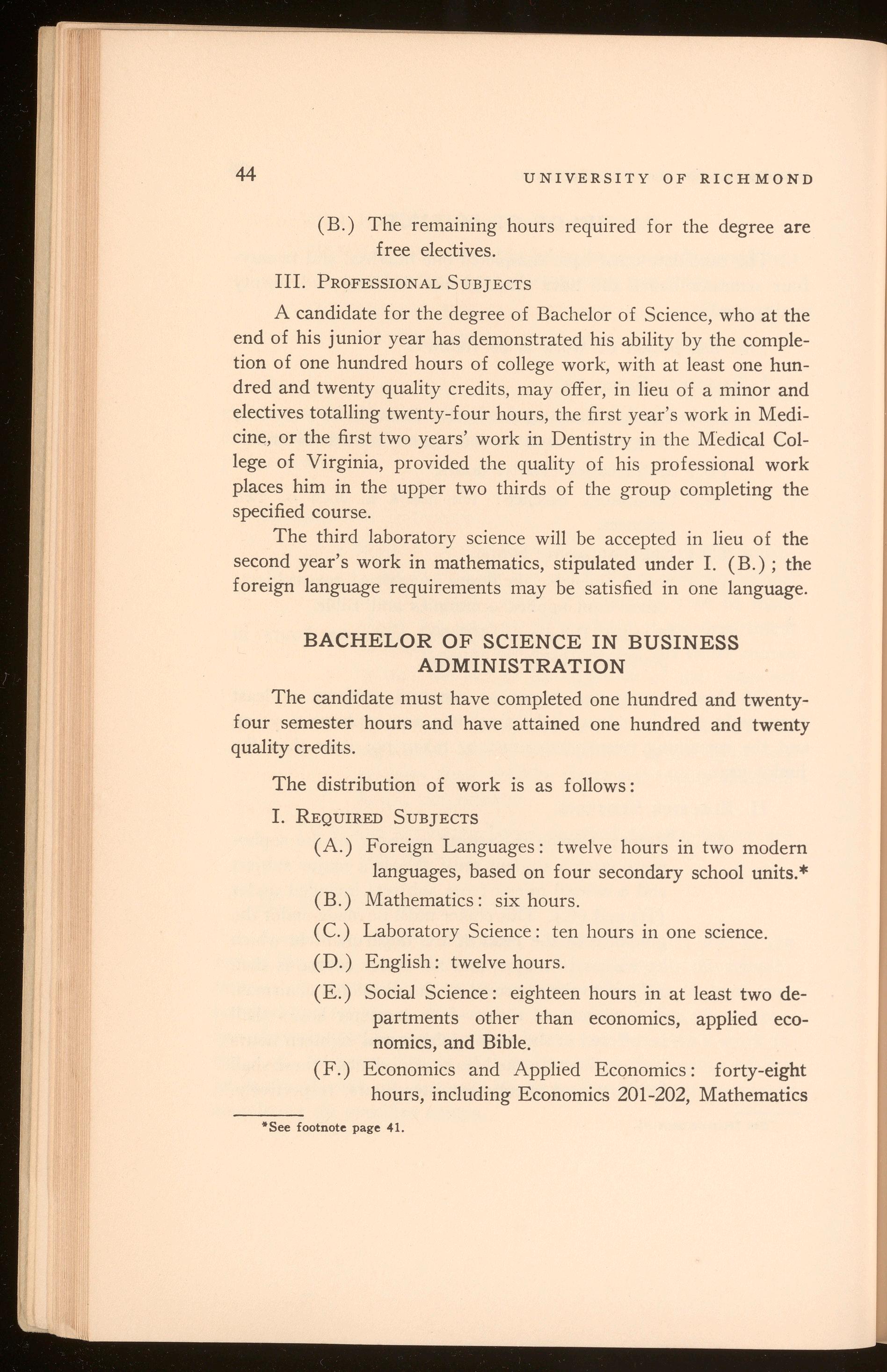
( B.) The remaining hours required for the degree are free electives.
A candidate for the degree of Bachelor of Science, who at the end of his junior year has demonstrated his ability by the completion of one hundred hours of college work, with at least one hundred and twenty quality credits, may offer, in lieu of a minor and electives totalling twenty-four hours, the first year's work in Medicine, or the first two years' work in Dentistry in the Medical College of Virginia, provided the quality of his professional work places him in the upper two thirds of the group completing the specified course.
The third laboratory science will be accepted in lieu of the second year's work in mathematics, stipulated under I. ( B.) ; the foreign language requirements may be satisfied in one language.
The candidate must have completed one hundred and twentyfour semester hours and have attained one hundred and twenty quality credits.
The distribution of work 1s as follows:
I. REQUIRED SUBJECTS
(A.) Foreign Languages: twelve hours in two modem languages, based on four secondary school units.*
( B.) Mathematics: six hours.
( C.) Laboratory Science: ten hours in one science.
(D.) English: twelvehours.
(E.) Social Science: eighteen hours in at least two departments other than economics, applied economics, and Bible.
(F.) Economics and Applied Economics: forty-eight hours, including Economics 201-202, Mathematics
• See footnote page 41.
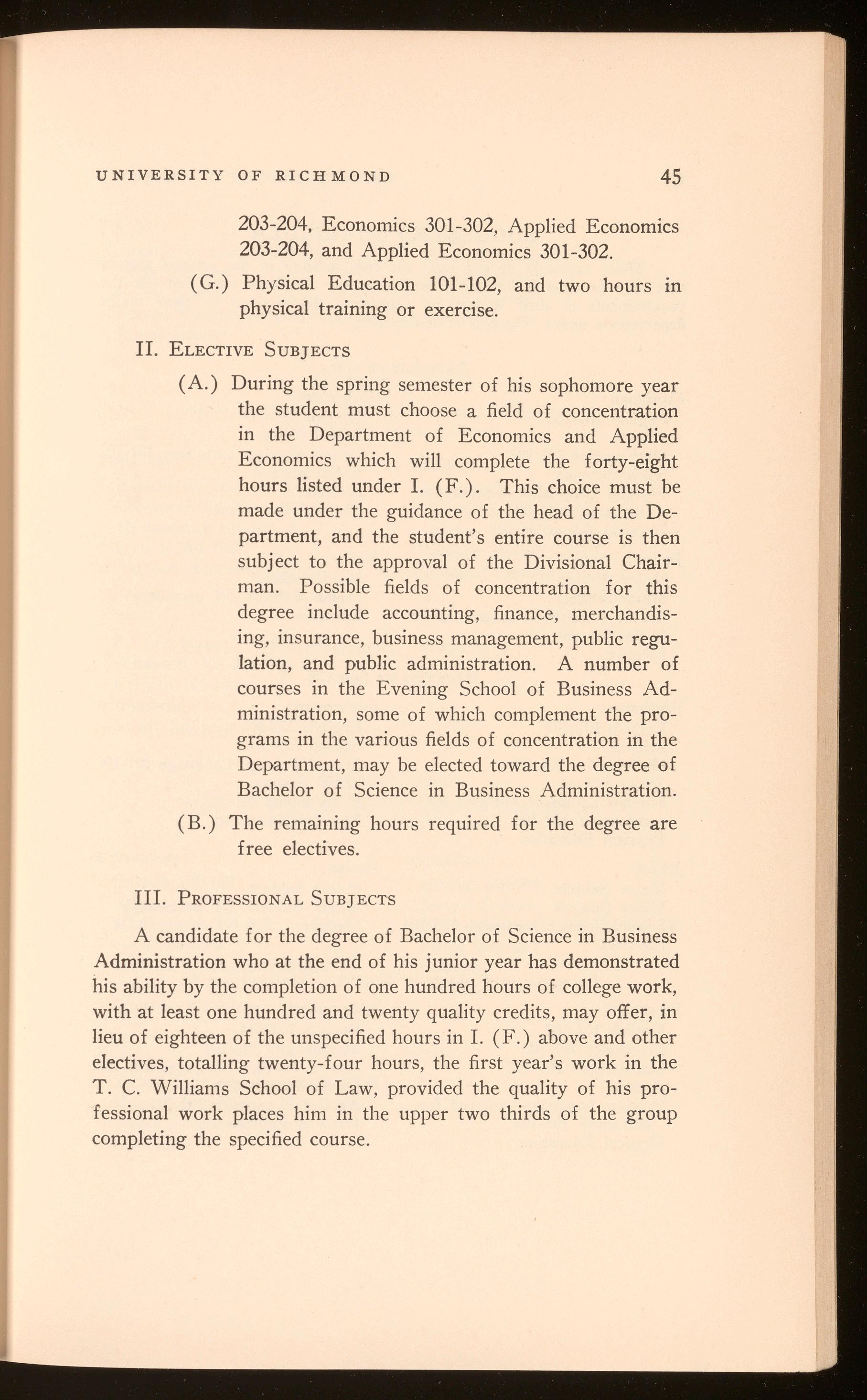
203-204, Economics 301-302, Applied Economics 203-204, and Applied Economics 301-302.
(G.) Physical Education 101-102, and two hours in physical training or exercise.
II. ELECTIVE SUBJECTS
(A.) During the spring semester of his sophomore year the student must choose a field of concentration in the Department of Economics and Applied Economics which will complete the forty-eight hours listed under I. (F.). This choice must be made under the guidance of the head of the Department, and the student's entire course is then subject to the approval of the Divisional Chairman. Possible fields of concentration for this degree include accounting, finance, merchandising, insurance , business management, public regulation, and public administration. A number of courses in the Evening School of Business Administration, some of which complement the programs in the various fields of concentration in the Department, may be elected toward the degree of Bachelor of Science in Business Administration.
(B . ) The remaining hours required for the degree are free electives.
III. PROFESSIONAL SUBJECTS
A candidate for the degree of Bachelor of Science in Business Administration who at the end of his junior year has demonstrated his ability by the completion of one hundred hours of college work, with at least one hundred and twenty quality credits, may offer, in lieu of eighteen of the unspecified hours in I. (F.) above and other electives, totalling twenty-four hours, the first year's work in the T. C. Williams School of Law , provided the quality of his professional work places him in the upper two thirds of the group completing the specified course .
These curricula do not state the requirements of the various majors that may be offered for the several degrees. Students may find out the requirements of their majors by consulting the sections on their major departments under "Courses of Instruction."
BACHELOR OF ARTS
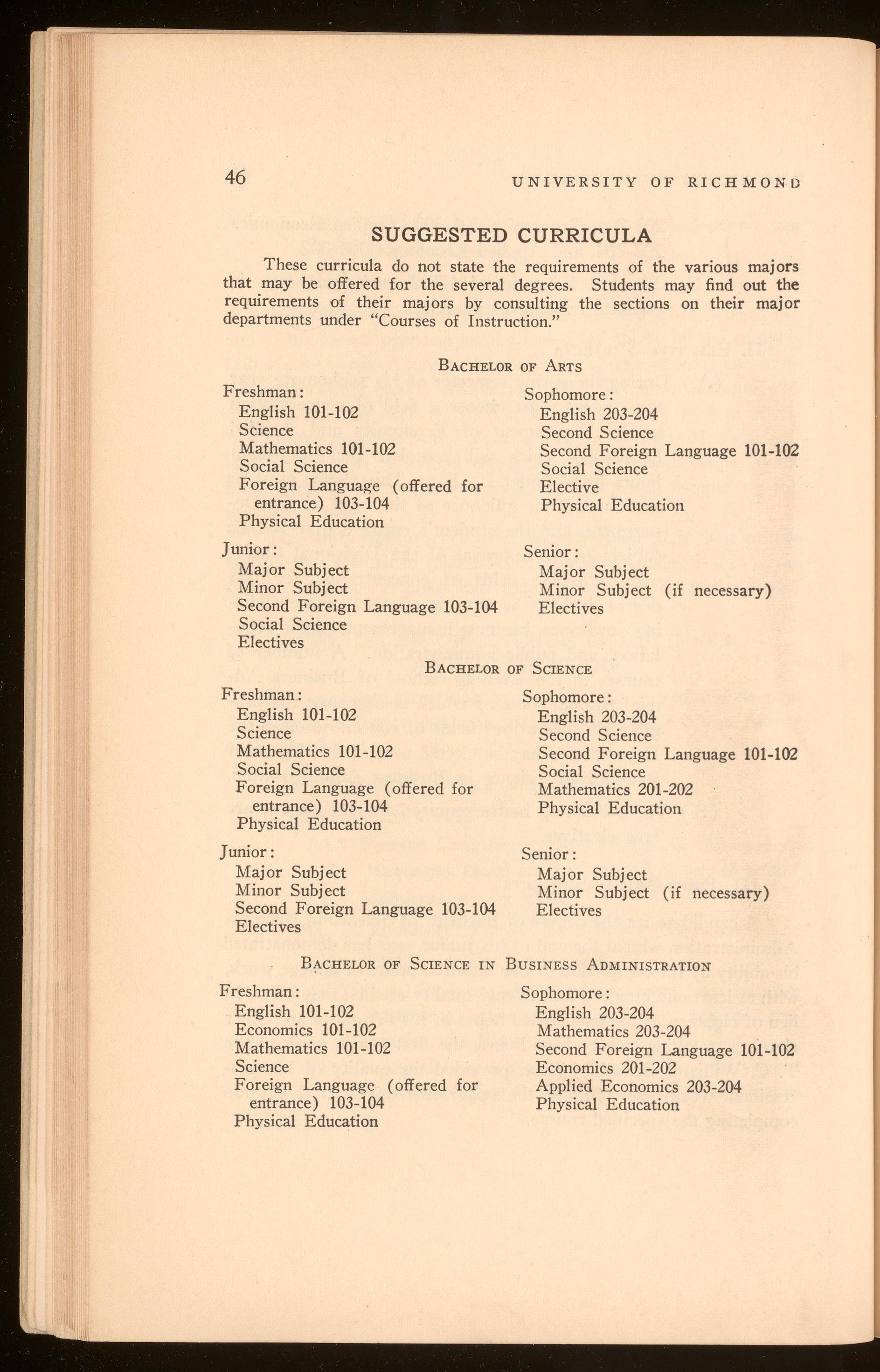
Freshman:
English 101-102
Science
Mathematics 101-102
Social Science
Foreign Language ( offered for entrance) 103-104
Physical Education
Junior:
Major Subject
Minor Subject
Second Foreign Language 103-104
Social Science Electives
Freshman:
English 101-102
Science
Mathematics 101-102
Social Science
Sophomore:
English 203-204
Second Science
Second Foreign Language 101-102
Social Science
Elective
Physical Education
Senior:
Major Subject
Minor Subject (if necessary) Electives
BACHELOR OF SCIENCE
Sophomore:
English 203-204
Second Science
Second Foreign Language 101-102
Social Science
Foreign Language ( offered for entrance) 103-104
Physical Education
Junior:
Major Subject
Minor Subject
Second Foreign Language 103-104 Electives
Freshman:
Mathematics 201-202
Physical Education
Senior:
Major Subject
Minor Subject (if necessary) Electives
BACHELOR OF SCIENCE IN BUSINESS ADMINISTRATION
English 101-102
Economics 101-102
Mathematics 101-102
Science
Foreign Language ( offered for entrance) 103-104
Physical Education
Sophomore:
English 203-204
Mathematics 203-204
Second Foreign Language 101-102
Economics 201-202
Applied Economics 203-204
Physical Education
Junior:
Applied Economics 301-302
Social Science
Social Science
Second Foreign Language 103-104
Major Subject
Freshman:
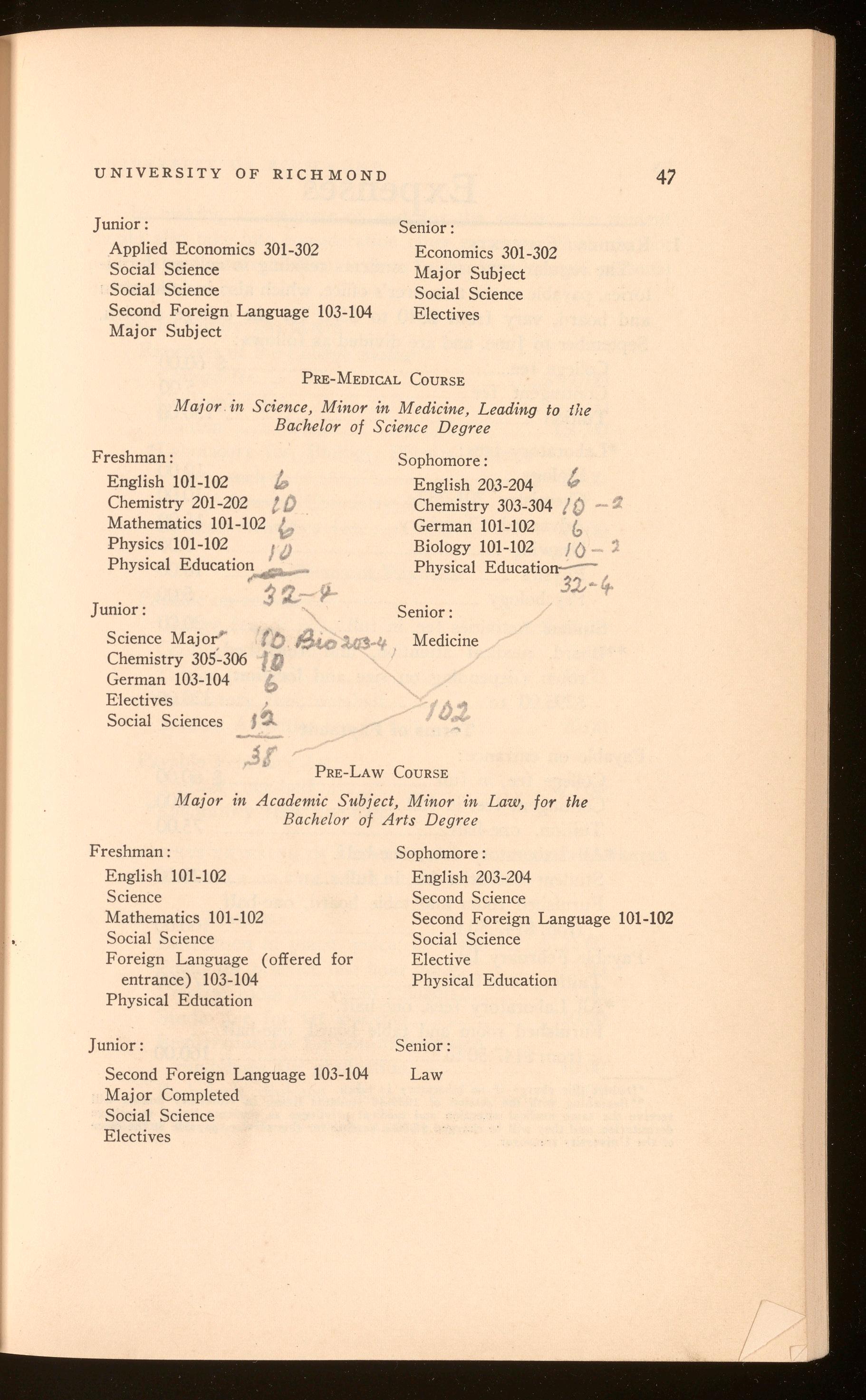
Senior:
Economics 301-302
Major Subject
Social Science Electives
PRE-MEDICAL COURSE
Major in Science, Minor in Medicine, Leading to the Bachelor of Science Degree
English 101-102 It, Chemistry 201-202 ! /)
Mathematics 101-102 {:, Physics 101-102 I 1
Physical Education
Junior:
Science Maj o Chemistry 305~306
German 103-104
Electives
Social Sciences f BioUll-' {J
Sophomore:
English 203-204 /, Chemistry 303-304 I()German 101-102 (, Biology 101-102 / :l
Physical Education32- +
Senior: Medicine /I)
PRE-LAW COURSE
Major in Academic S1,bject, Minor in Law, for the Bachelor of Arts Degree
Freshman:
English 101-102
Science
Mathematics 101-102
Social Science
Foreign Language ( offered for entrance) 103-104
Physical Education
Junior:
Second Foreign Language 103-104
Major Completed
Social Science
Electives
Sophomore:
English 203-204
Second Science
Second Foreign Language 101-102
Social Science
Elective Physical Education
Senior: Law
The regular expenses of students residing in college dormitories, payable at the treasurer's office, which also include room and board, vary from $540 to $570 for the college session, September to June, and are divided as follows:
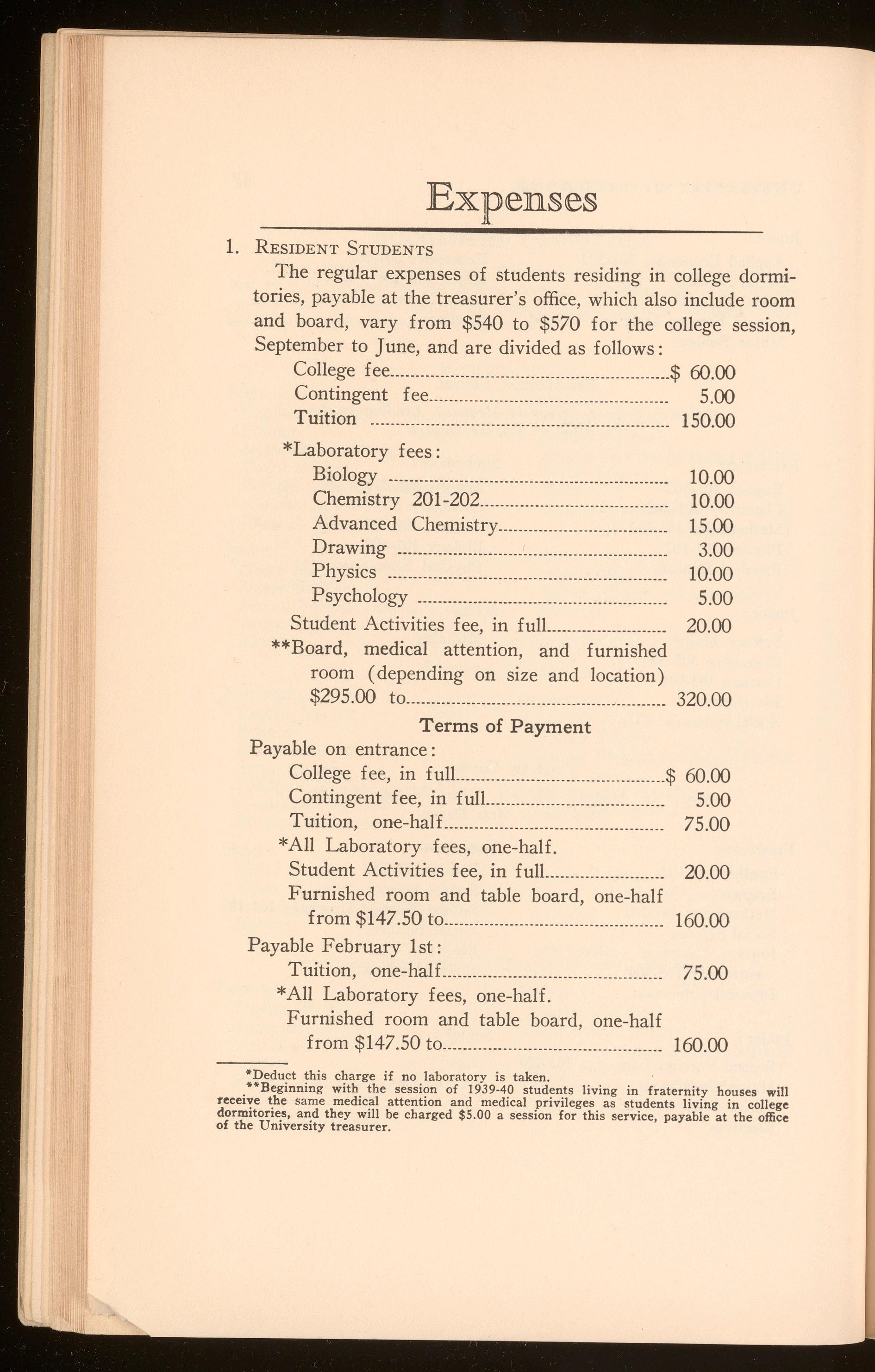
Terms of Payment Payable
*Deduct this charge if no laboratory is taken.
**Beginning with the session of 1939•40 students living in fraternity houses will receive the same medical attention and medical privileges as students living in college dormitories, and they will be charged $5.00 a session for this service, payable at the office of the University treasurer.
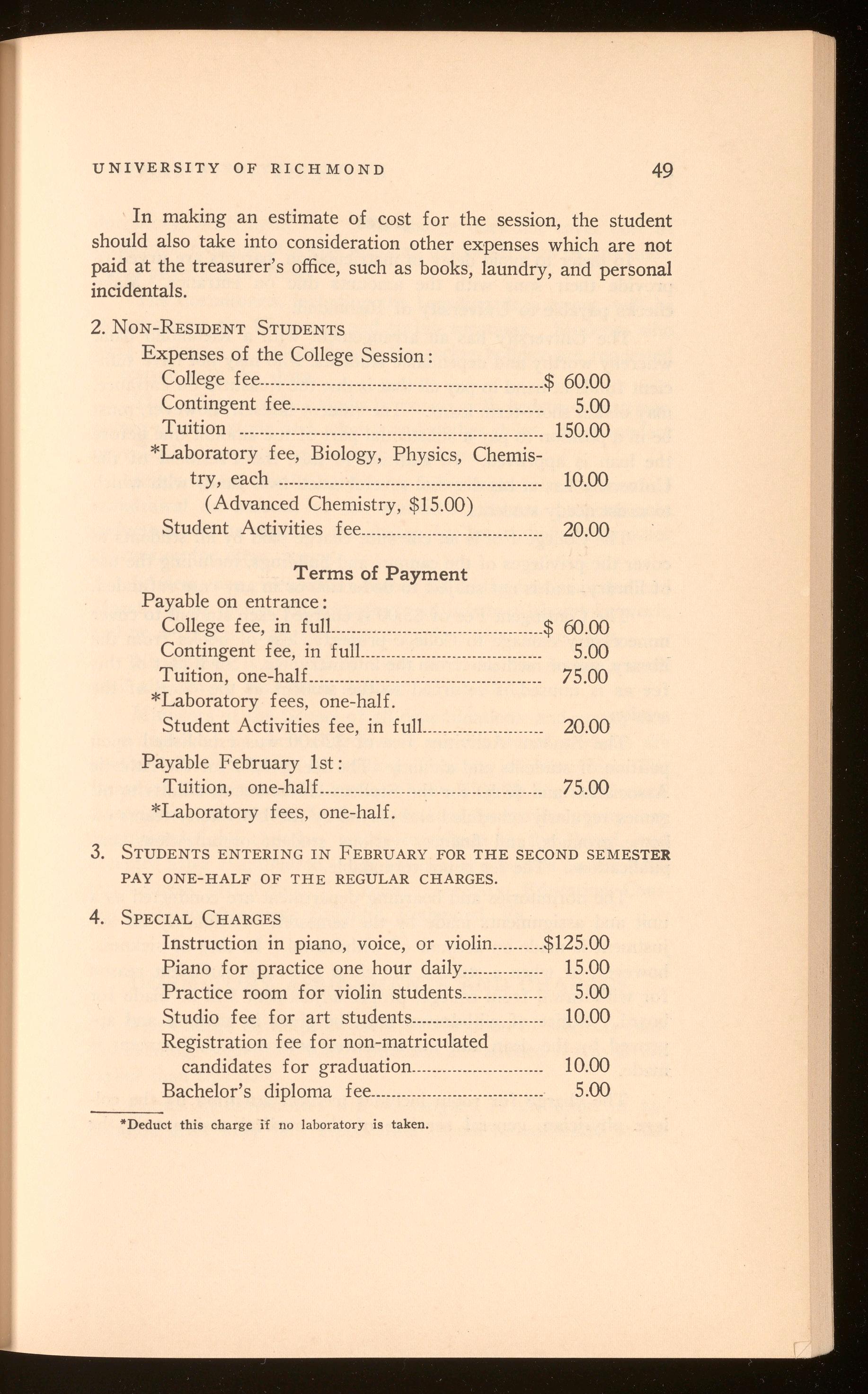
In making an estimate of cost for the session, the student should also take into consideration other expenses which are not paid at the treasurer's office, such as books, laundry, and personal incidentals.
2. NON-RESIDENT STUDENTS
Expenses of the College Session:
College fee ........................................................$ 60.00
Contingent fee.................................................. 5.00
Tuition ............................................................ 150.00
*Laboratory fee, Biology, Physics, Chemistry, each .................................................... 10.00
(Advanced Chemistry, $15.00)
Student Activities fee.................................... 20.00
Payable on entrance:
College fee, in full... .......................................$ 60.00
Contingent fee, in full.................................... 5.00
Tuition, one-half.............................................. 75.00
*Laboratory fees, one-half.
Student Activities fee, in full........................ 20.00
Payable February 1st: Tuition, one-half............... ............................. 75.00
*Laboratory fees, one-half.
3. STUDENTS ENTERING IN FEBRUARY FOR THE SECOND SEMESTER PAY ONE-HALF OF THE REGULAR CHARGES.
4. SPECIAL CHARGES
Instruction in piano, voice, or violin ..........$125.00
Piano for practice one hour daily................ 15.00
Practice room for violin students................ 5.00
Studio fee for art students.......................... 10.00
Registration fee for non-matriculated candidates for graduation ..........................
*Deduct this charge if no laboratory is taken. 10.00 5.00
Bachelor's diploma fee ..................................
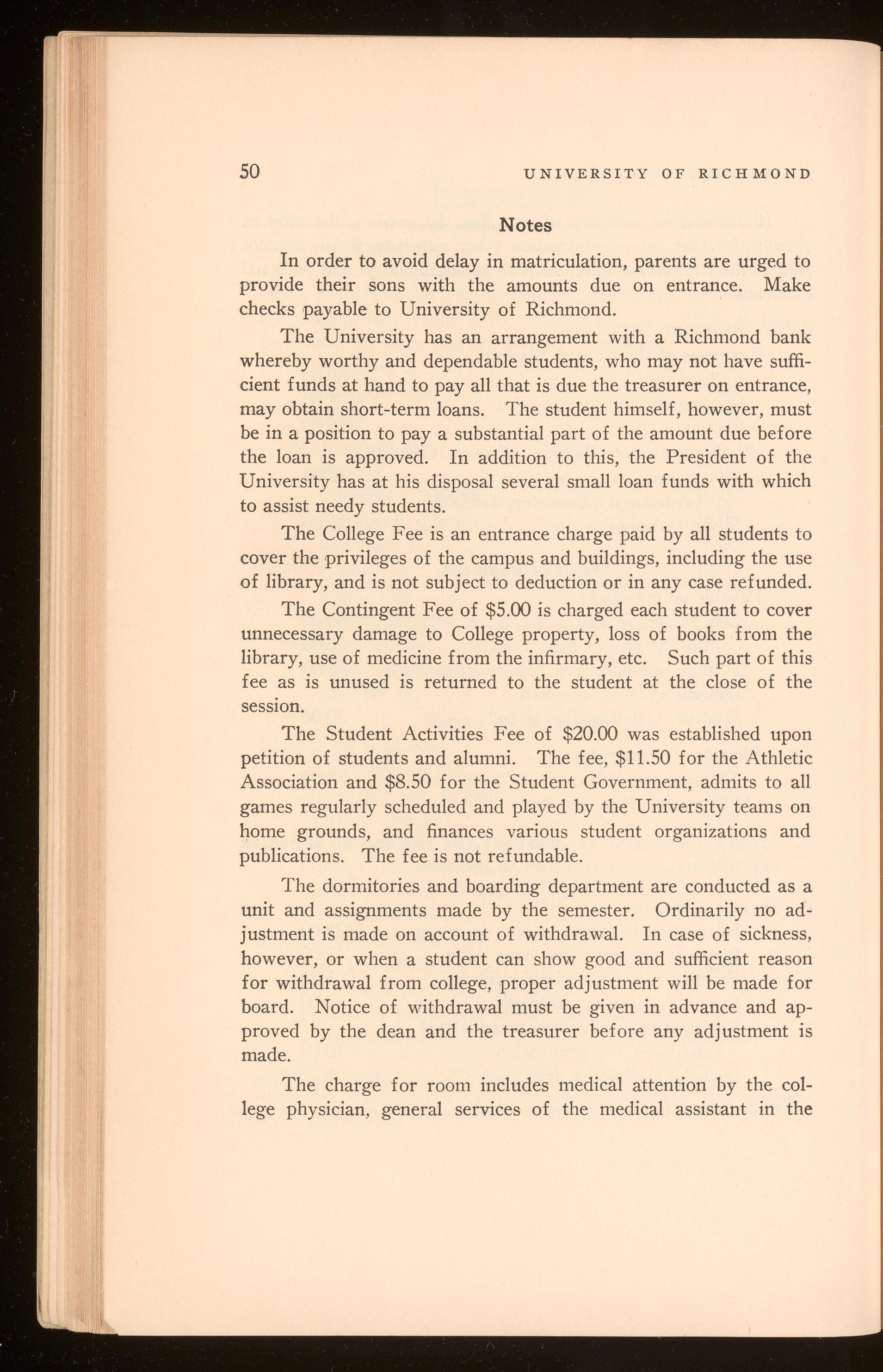
In order to avoid delay in matriculation, parents are urged to provide their sons with the amounts due on entrance. Make checks payable to University of Richmond.
The University has an arrangement with a Richmond bank whereby worthy and dependable students, who may not have sufficient funds at hand to pay all that is due the treasurer on entrance, may obtain short-term loans. The student himself, however, must be in a position to pay a substantial part of the amount due before the loan is approved. In addition to this, the President of the University has at his disposal several small loan funds with which to assist needy students.
The College Fee is an entrance charge paid by all students to cover the privileges of the campus and buildings, including the use of library, and is not subject to deduction or in any case refunded.
The Contingent Fee of $5.00 is charged each student to cover unnecessary damage to College property, loss of books from the library, use of medicine from the infirmary, etc. Such part of this fee as is unused is returned to the student at the close of the session.
The Student Activities Fee of $20.00 was established upon petition of students and alumni. The fee, $11.50 for the Athletic Association and $8.50 for the Student Government, admits to all games regularly scheduled and played by the University teams on home grounds, and finances various student organizations and publications. The fee is not refundable.
The dormitories and boarding department are conducted as a unit and assignments made by the semester. Ordinarily no adjustment is made on account of withdrawal. In case of sickness, however, or when a student can show good and sufficient reason for withdrawal from college, proper adjustment will be made for board. Notice of withdrawal must be given in advance and approved by the dean and the treasurer before any adjustment is made.
The charge for room includes medical attention by the college physician, general services of the medical assistant in the
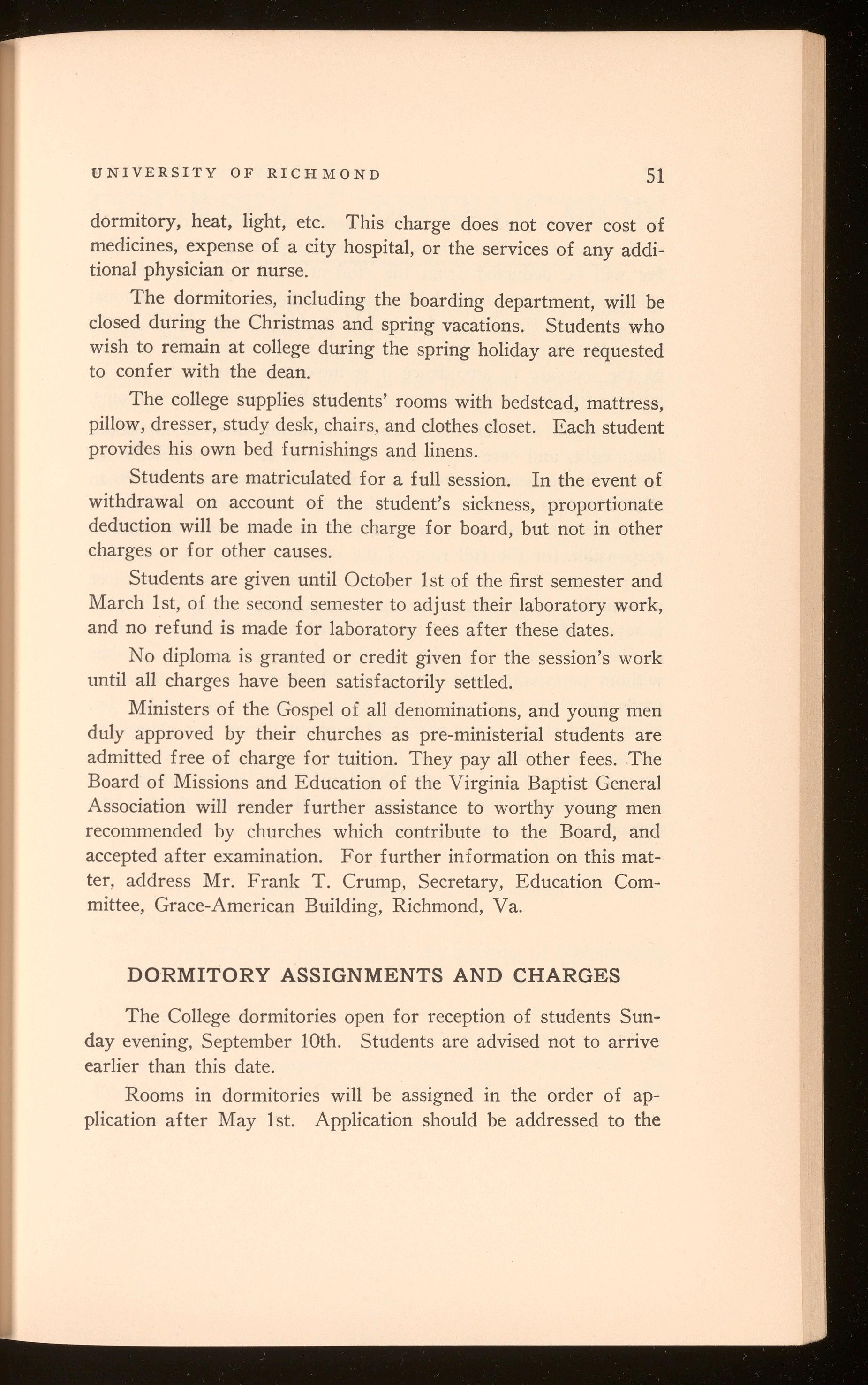
dormitory, heat, light, etc. This charge does not cover cost of medicines, expense of a city hospital, or the services of any additional physician or nurse.
The dormitories, including the boarding department, will be closed during the Christmas and spring vacations. Students who wish to remain at college during the spring holiday are requested to confer with the dean.
The college supplies students' rooms with bedstead, mattress, pillow, dresser, study desk, chairs, and clothes closet. Each student provides his own bed furnishings and linens.
Students are matriculated for a full session. In the event of withdrawal on account of the student's sickness, proportionate deduction will be made in the charge for board, but not in other charges or for other causes.
Students are given until October 1st of the first semester and March 1st, of the second semester to adjust their laboratory work, and no refund is made for laboratory fees after these dates.
No diploma is granted or credit given for the session's work until all charges have been satisfactorily settled.
Ministers of the Gospel of all denominations, and young men duly approved by their churches as pre-ministerial students are admitted free of charge for tuition. They pay all other fees. The Board of Missions and Education of the Virginia Baptist General Association will render further assistance to worthy young men recommended by churches which contribute to the Board, and accepted after examination. For further information on this matter, address Mr. Frank T. Crump, Secretary, Education Committee, Grace-American Building, Richmond, Va.
The College dormitories open for reception of students Sunday evening, September 10th. Students are advised not to arrive earlier than this date.
Rooms in dormitories will be assigned in the order of application after May 1st. Application should be addressed to the
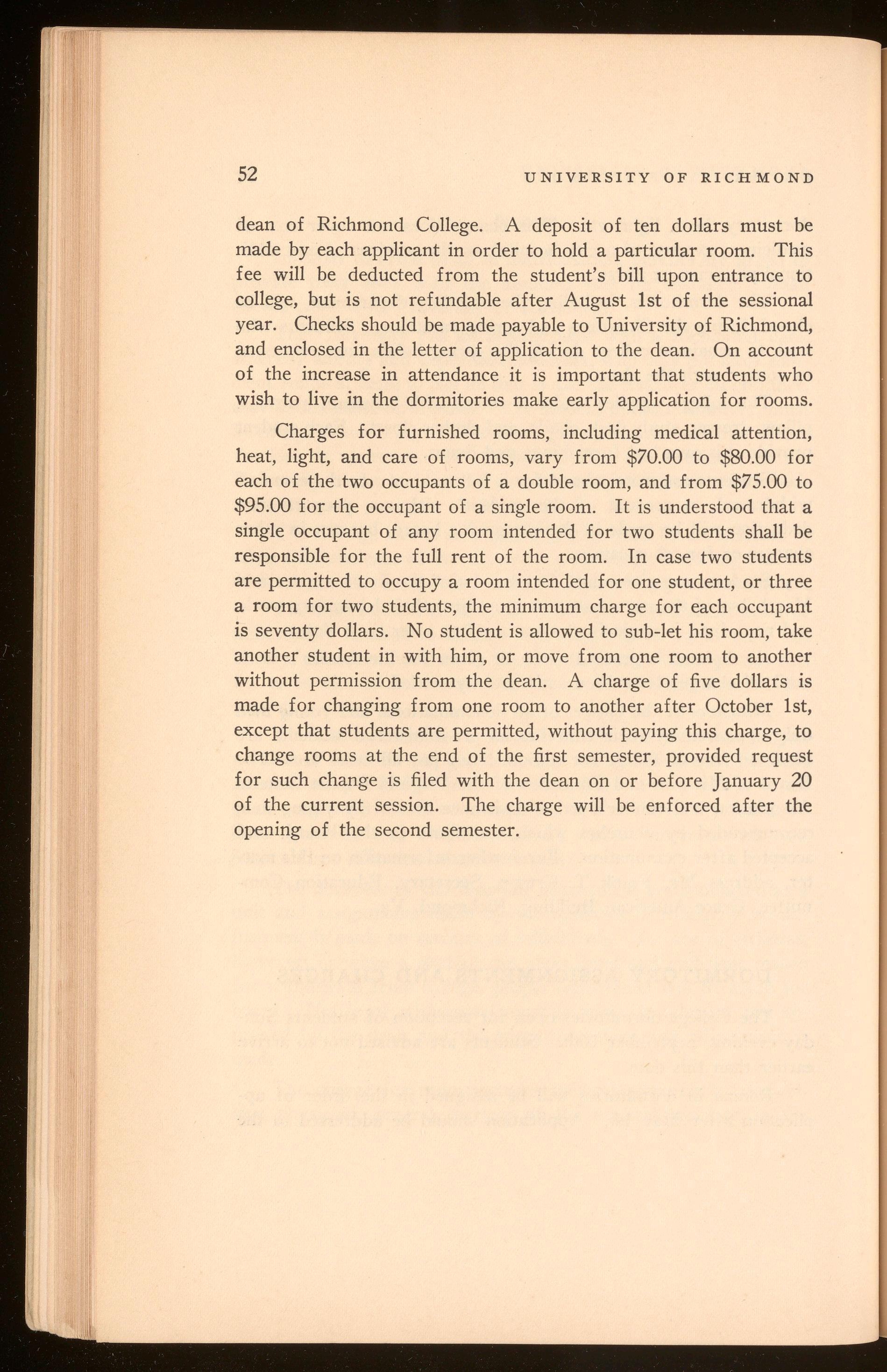
dean of Richmond College. A deposit of ten dollars must be made by each applicant in order to hold a particular room. This fee will be deducted from the student's bill upon entrance to college, but is not refundable after August 1st of the sessional year. Checks should be made payable to University of Richmond, and enclosed in the letter of application to the dean. On account of the increase in attendance it is important that students who wish to live in the dormitories make early application for rooms. Charges for furnished rooms, including medical attention, heat, light, and care of rooms, vary from $70.00 to $80.00 for each of the two occupants of a double room, and from $75.00 to $95.00 for the occupant of a single room. It is understood that a single occupant of any room intended for two students shall be responsible for the full rent of the room. In case two students are permitted to occupy a room intended for one student, or three a room for two students, the minimum charge for each occupant is seventy dollars. No student is allowed to sub-let his room, take another student in with him, or move from one room to another without permission from the dean. A charge of five dollars is made for changing from one room to another after October 1st, except that students are permitted, without paying this charge, to change rooms at the end of the first semester, provided request for such change is filed with the dean on or before January 20 of the current session. The charge will be enforced after the opening of the second semester.
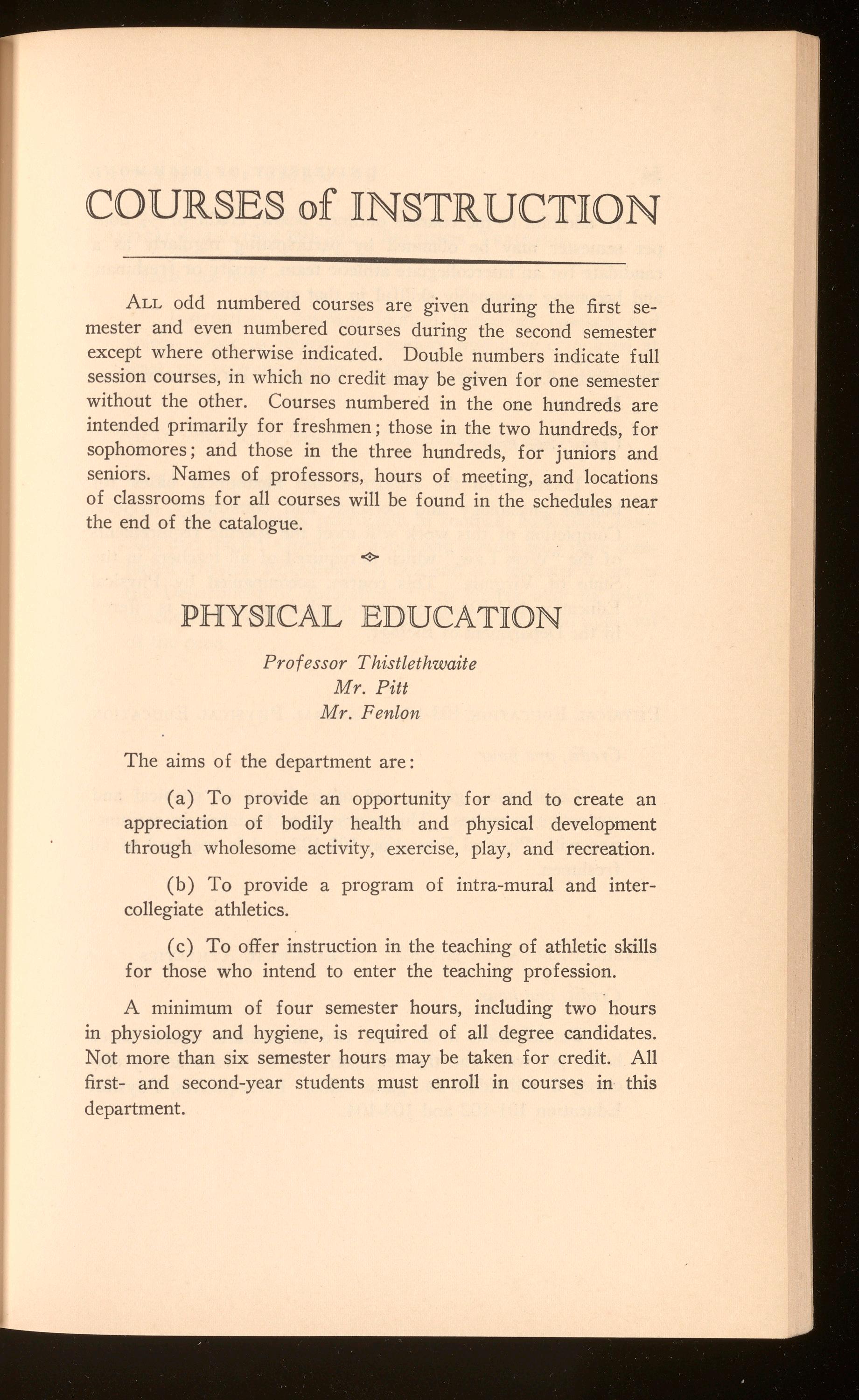
ALL odd numbered courses are given during the first semester and even numbered courses during the second semester except where otherwise indicated . Double numbers indicate full session courses, in which no credit may be given for one semester without the other. Courses numbered in the one hundreds are intended primarily for freshmen; those in the two hundreds, for sophomores; and those in the three hundreds, for juniors and seniors. Names of professors, hours of meeting, and locations of classrooms for all courses will be found in the schedules near the end of the catalogue.
Professor Thistlethwaite
Mr . P i tt
Mr. Fenlon
The aims of the department are:
(a) To provide an opportunity for and to create an appreciation of bodily health and physical development through wholesome activity, exercise , play, and recreation.
(b) To provide a program of intra-mural and intercollegiate athletics.
(
c) To offer instruction in the teaching of athletic skills for those who intend to enter the teaching profession.
A minimum of four semester hours, including two hours in physiology and hygiene, is required of all degree candidates. Not more than six semester hours may be taken for credit . All first-and second-year students must enroll in courses in this department.
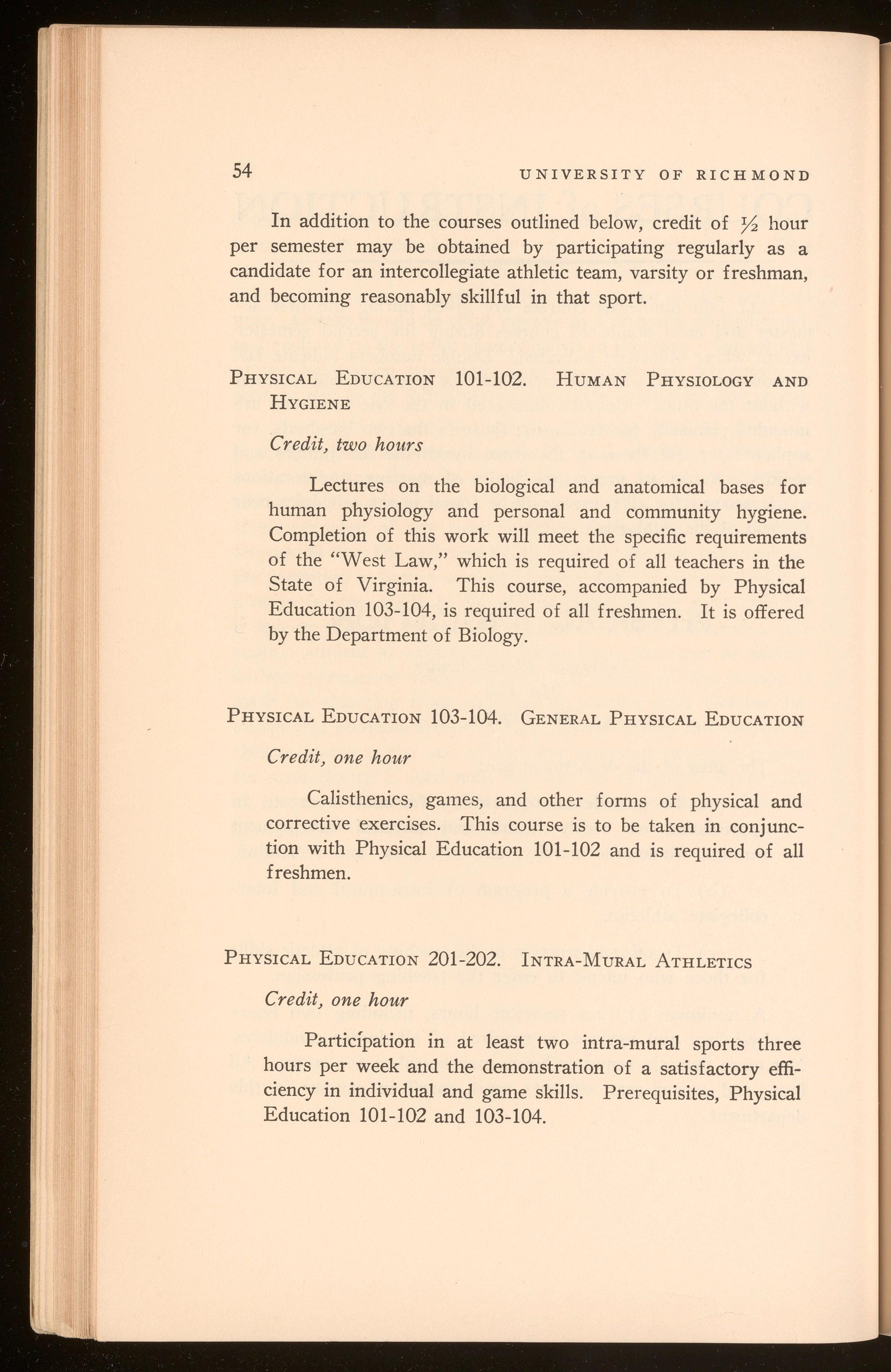
In addition to the courses outlined below, credit of ¼ hour per semester may be obtained by participating regularly as a candidate for an intercollegiate athletic team, varsity or freshman, and becoming reasonably skillful in that sport.
PHYSICAL EDUCATION 101-102. HUMAN PHYSIOLOGY AND HYGIENE
Credit, two hours
Lectures on the biological and anatomical bases for human physiology and personal and community hygiene. Completion of this work will meet the specific requirements of the "West Law," which is required of all teachers in the State of Virginia. This course, accompanied by Physical Education 103-104, is required of all freshmen. It is offered by the Department of Biology.
PHYSICAL EDUCATION 103-104. GENERAL PHYSICAL EDUCATION
Credit, one hour
Calisthenics, games, and other forms of physical and corrective exercises. This course is to be taken in conjunction with Physical Education 101-102 and is required of all freshmen.
PHYSICAL EDUCATION 201-202. INTRA-MURAL ATHLETICS
Credit, one hour
Participation in at least two intra-mural sports three hours per week and the demonstration of a satisfactory efficiency in individual and game skills. Prerequisites, Physical Education 101-102 and 103-104.
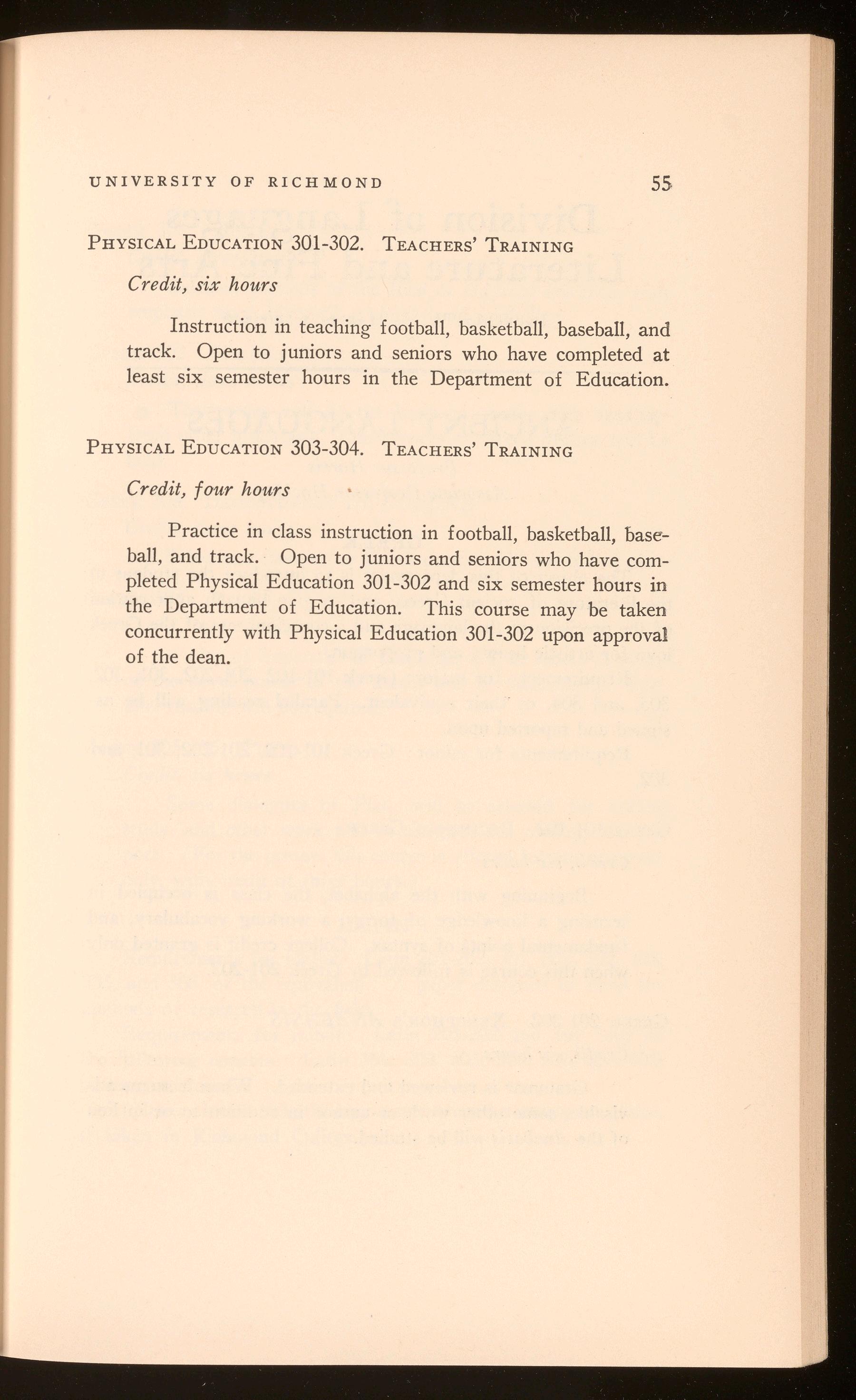
UNIVERSITY OF RICHMOND
PHYSICAL EDUCATION 301-302. TEACHERS' TRAINING
Credit, six hours
Instruction in teaching football, basketball, baseball, and track. Open to juniors and seniors who have completed at least six semester hours in the Department of Education.
PHYSICAL EDUCATION 303-304. TEACHERS' TRAINING
Credit, four hours
Practice in class instruction in football, basketball, baseball, and track. Open to juniors and seniors who have completed Physical Education 301-302 and six semester hours in the Department of Education. This course may be taken concurrently with Physical Education 301-302 upon approval of the dean.
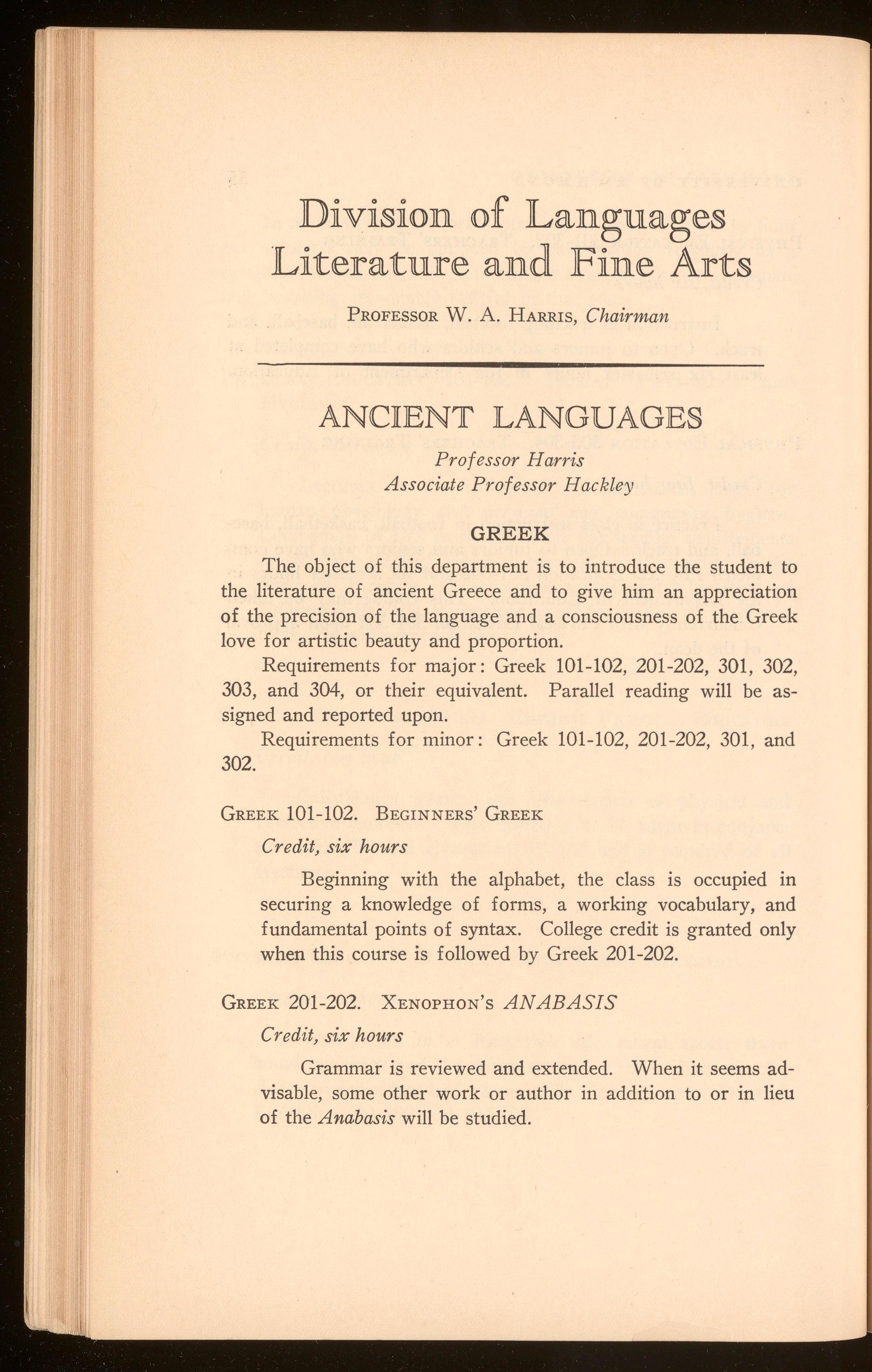
PROFESSOR W. A. HARRIS, Chairman
Professor Harris
Associate Professor Hackley
GREEK
The object of this department is to introduce the student to the literature of ancient Greece and to give him an appreciation of the precision of the language and a consciousness of the Greek love for artistic beauty and proportion.
Requirements for major: Greek 101-102, 201-202, 301, 302, 303, and 304, or their equivalent. Parallel reading will be assigned and reported upon.
Requirements for minor: Greek 101-102, 201-202, 301, and 302.
GREEK 101-102. BEGINNERS' GREEK
Credit, six hours
Beginning with the alphabet, the class is occupied in securing a knowledge of forms, a working vocabulary, and fundamental points of syntax. College credit is granted only when this course is followed by Greek 201-202.
GREEK 201-202. XENOPHON'S ANABASIS
Credit, six hours
Grammar is reviewed and extended. When it seems advisable, some other work or author in addition to or in lieu of the Anabasis will be studied.
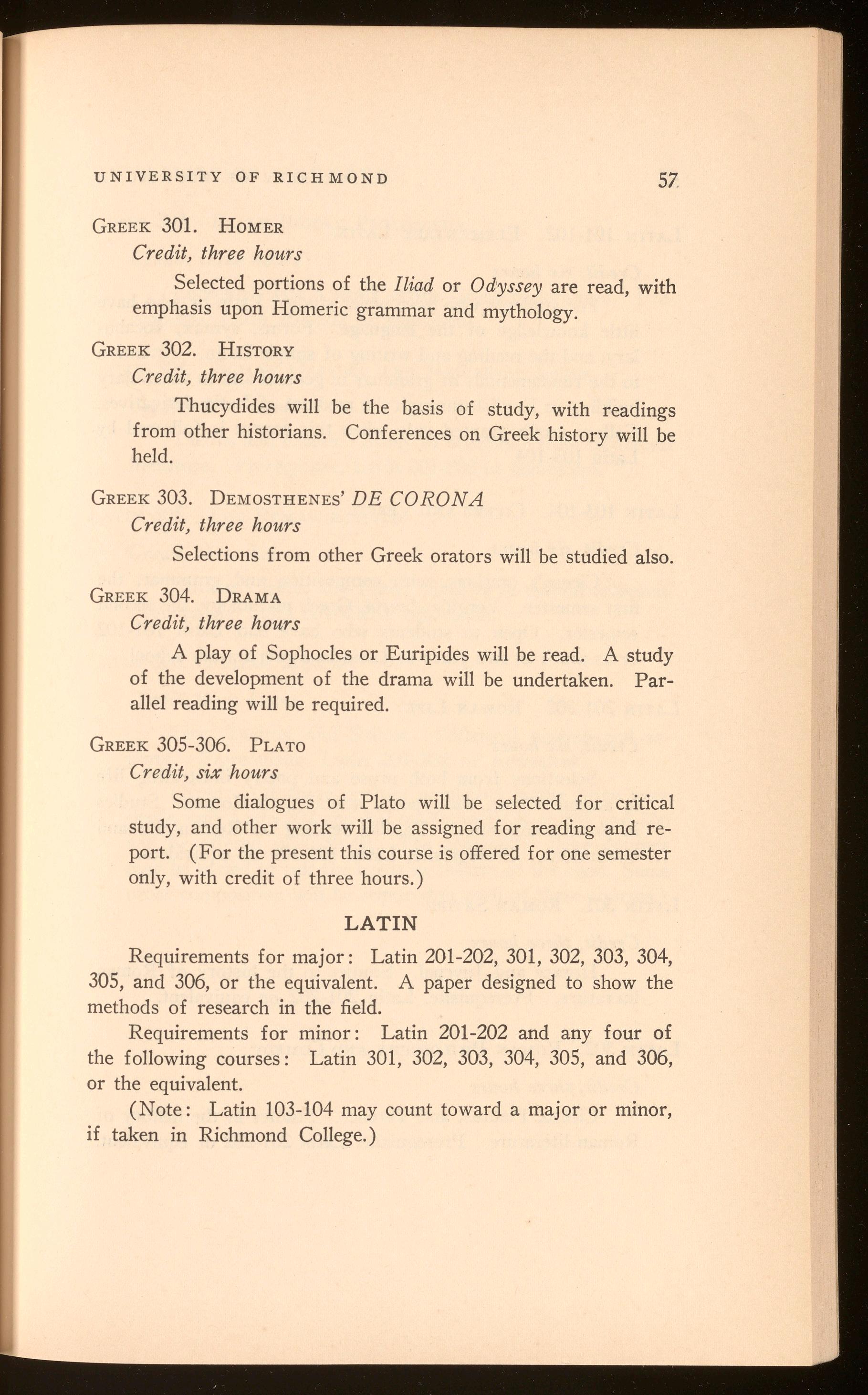
GREEK 301. HOMER
Credit, three hours 57
Selected portions of the Iliad or Odyssey are read, with emphasis upon Homeric grammar and mythology.
GREEK 302. HISTORY
Credit, three hours
Thucydides will be the basis of study, with readings from other historians. Conferences on Greek history will be held.
GREEK 303. DEMOSTHENES' DE CORONA
Credit, three hours
Selections from other Greek orators will be studied also.
GREEK 304. DRAMA
Credit, three hours
A play of Sophocles or Euripides will be read. A study of the development of the drama will be undertaken. Parallel reading will be required.
GREEK 305-306. PLATO
Credit, six hours
Some dialogues of Plato will be selected for critical study, and other work will be assigned for reading and report. (For the present this course is offered for one semester only, with credit of three hours.)
Requirements for major: Latin 201-202, 301, 302, 303, 304, 305, and 306, or the equivalent. A paper designed to show the methods of research in the field.
Requirements for minor: Latin 201-202 and any four of the following courses: Latin 301, 302, 303, 304, 305, and 306, or the equivalent.
(Note: Latin 103-104 may count toward a major or minor, if taken in Richmond College.)
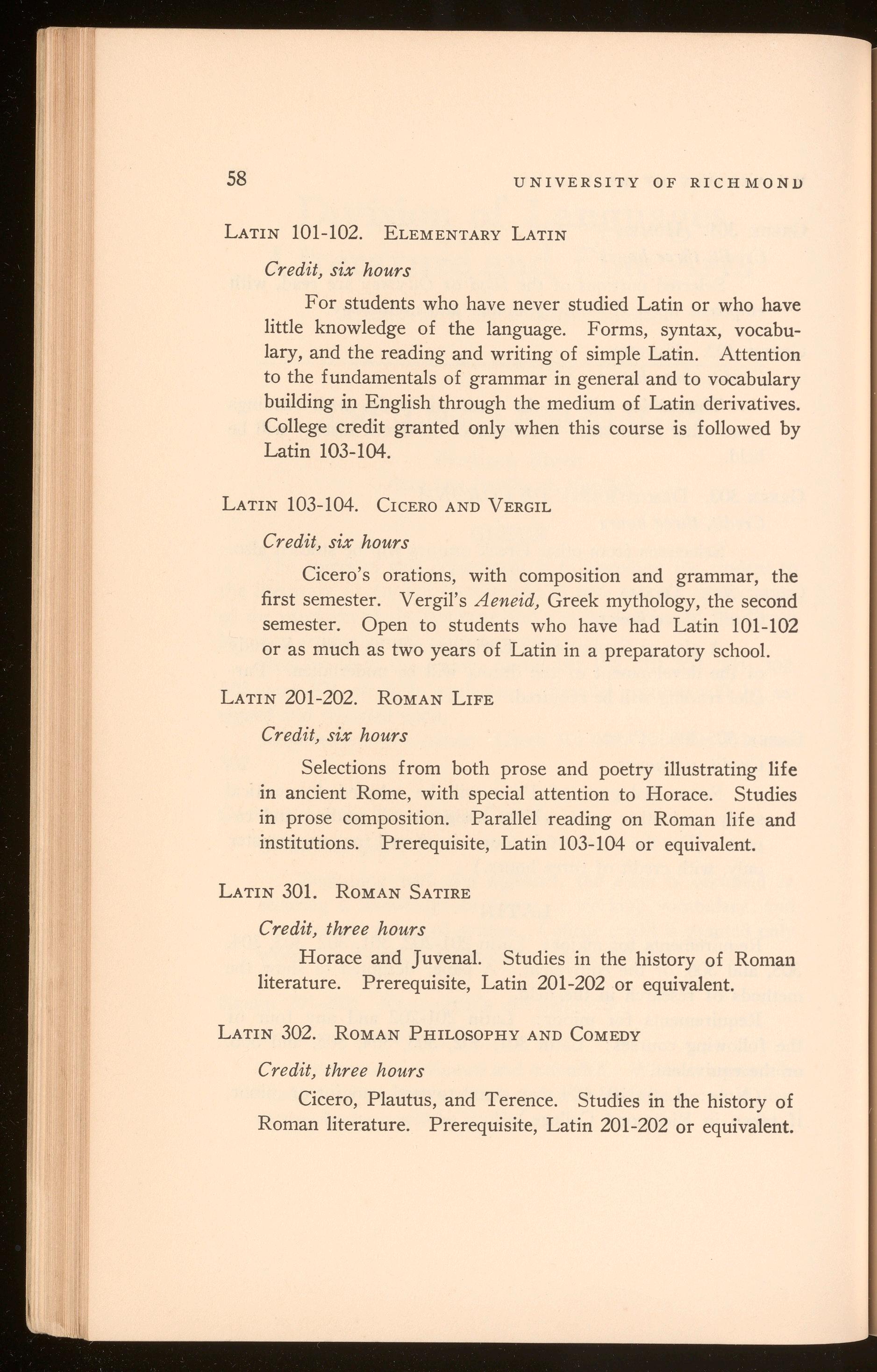
LATIN 101-102. ELEMENTARY LATIN
Credit, six hours
For students who have never studied Latin or who have little knowledge of the language. Forms, syntax, vocabulary, and the reading and writing of simple Latin. Attention to the fundamentals of grammar in general and to vocabulary building in English through the medium of Latin derivatives. College credit granted only when this course is followed by Latin 103-104.
LATIN 103-104. CICERO AND VERGIL
Credit, six hours
Cicero's orations, with composition and grammar, the first semester. Vergil's Aeneid, Greek mythology, the second semester. Open to students who have had Latin 101-102 or as much as two years of Latin in a preparatory school.
LATIN 201-202. ROMAN LIFE
Credit, six hours
Selections from both prose and poetry illustrating Ii£e in ancient Rome, with special attention to Horace. Studies in prose composition. Parallel reading on Roman life and institutions. Prerequisite, Latin 103-104 or equivalent.
LATIN 301. ROMAN SATIRE
Credit, three hours
Horace and Juvenal. Studies in the history of Roman literature. Prerequisite, Latin 201-202 or equivalent.
LATIN 302. ROMAN PHILOSOPHY AND COMEDY
Credit, three hours
Cicero, Plautus, and Terence. Studies in the history of Roman literature. Prerequisite, Latin 201-202 or equivalent.
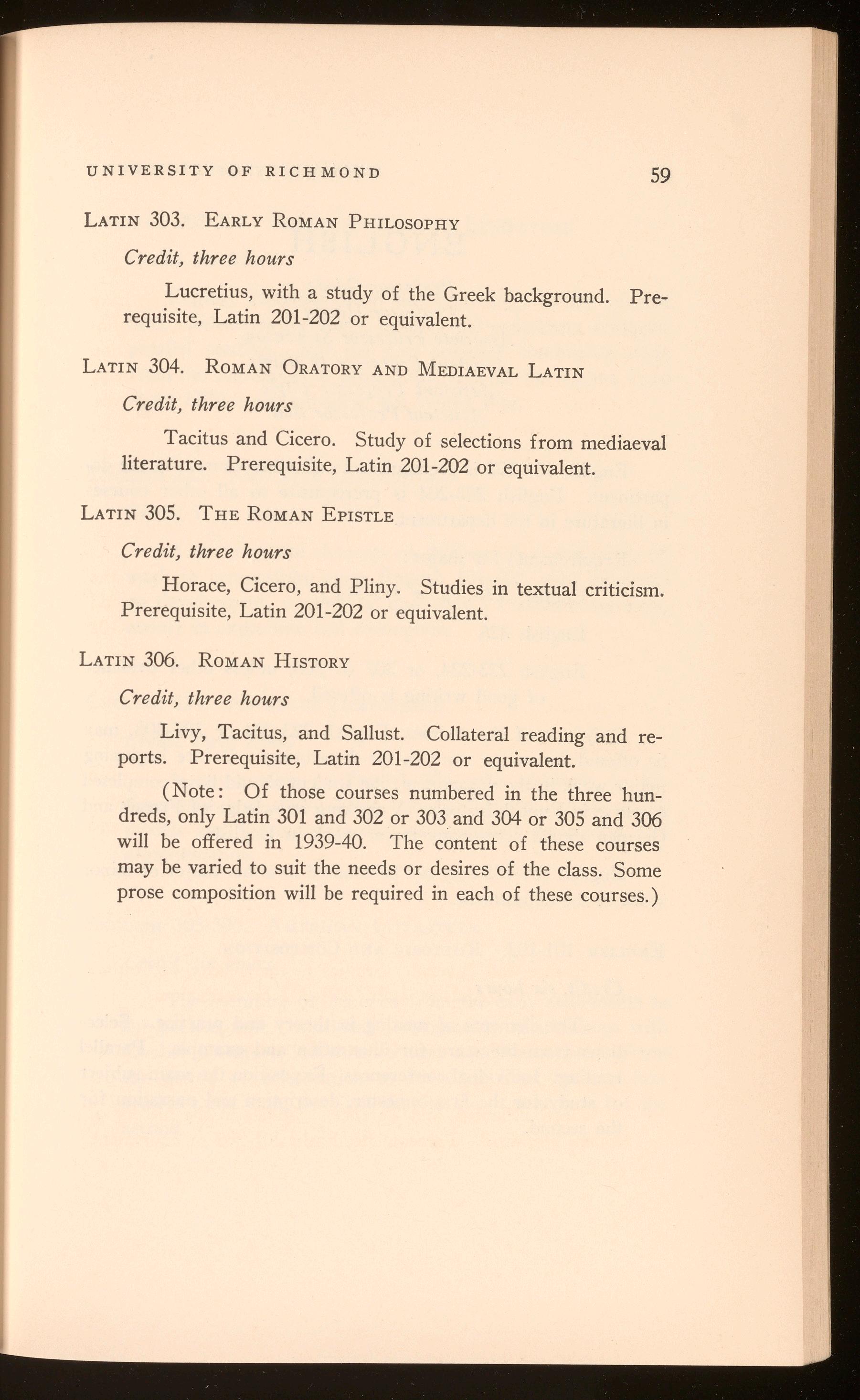
LATIN 303. EARLY ROMAN PHILOSOPHY
Credit, three hours
Lucretius, with a study of the Greek background. Prerequisite, Latin 201-202 or equivalent.
LATIN 304. ROMAN ORATORY AND MEDIAEVAL LATIN
Credit, three hours
Tacitus and Cicero. Study of selections from mediaeval literature. Prerequisite, Latin 201-202 or equivalent.
LATIN 305. THE ROMAN EPISTLE
Credit, three hours
Horace, Cicero, and Pliny. Studies in textual criticism. Prerequisite, Latin 201-202 or equivalent.
LATIN 306. ROMAN HISTORY
Credit, three hours
Livy, Tacitus, and Sallust. Collateral reading and reports. Prerequisite, Latin 201-202 or equivalent.
(Note: Of those courses numbered in the three hundreds, only Latin 301 and 302 or 303 and 304 or 305 and 306 will be offered in 1939-40. The content of these courses may be varied to suit the needs or desires of the class. Some prose composition will be required in each of these courses . )
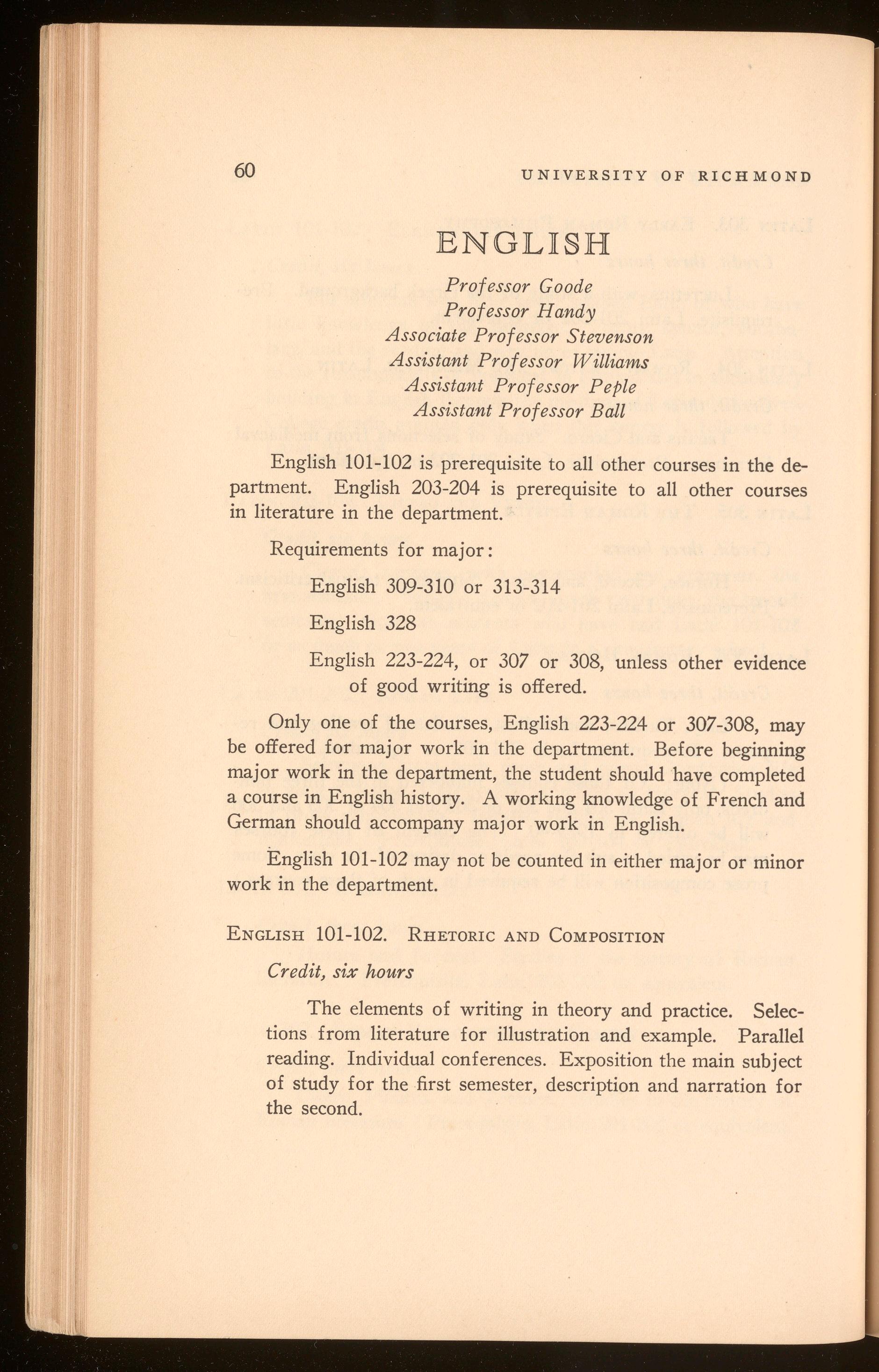
Professor Goode
Professor Handy
Associate Professor Stevenson
Assistant Professor Williams
Assistant Professor Peple
Assistant Professor Ball
English 101-102 is prerequisite to all other courses in the department. English 203-204 is prerequisite to all other courses in literature in the department.
Requirements for major:
English 309-310 or 313-314
English 328
English 223-224, or 307 or 308, unless other evidence of good writing is offered.
Only one of the courses, English 223-224 or 307-308, may be offered for major work in the department. Before beginning major work in the department, the student should have completed a course in English history. A working knowledge of French and German should accompany major work in English.
English 101-102 may not be counted in either major or minor work in the department.
ENGLISH 101-102. RHETORIC AND COMPOSITION
Credit, si.x hours
The elements of writing in theory and practice. Selections from literature for illustration and example. Parallel reading. Individual conferences. Exposition the main subject of study for the first semester, description and narration for the second.
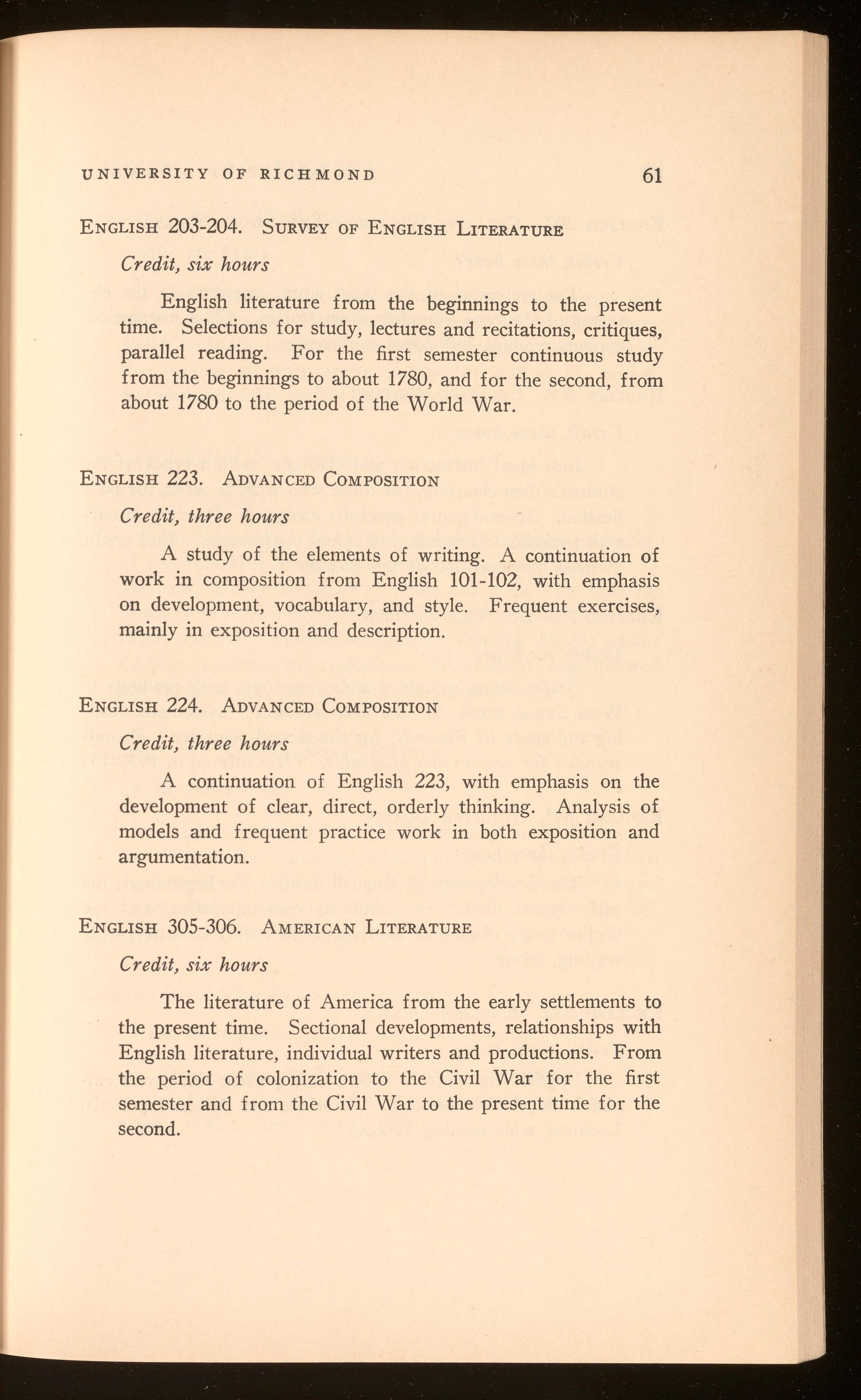
UNIVERSITY OF RICHMOND
ENGLISH 203-204. SURVEY OF ENGLISH LITERATURE
Credit, six hours 61
English literature from the beginnings to the present time. Selections for study, lectures and recitations, critiques, parallel reading. For the first semester continuous study from the beginnings to about 1780, and for the second, from about 1780 to the period of the World War.
ENGLISH 223. ADVANCED COMPOSITION
Credit, three hours
A study of the elements of wntmg. A continuation of work in composition from English 101-102, with emphasis on development, vocabulary, and style Frequent exercises, mainly in exposition and description.
ENGLISH 224. ADVANCED COMPOSITION
Credit, three hours
A continuation of English 223, with emphasis on the development of clear, direct, orderly thinking. Analysis of models and frequent practice work in both exposition and argumentation.
ENGLISH 305-306. AMERICAN LITERATURE
Credit, six hours
The literature of America from the early settlements to the present time. Sectional developments, relationships with English literature, individual writers and productions. From the period of colonization to the Civil War for the first semester and from the Civil War to the present time for the second.
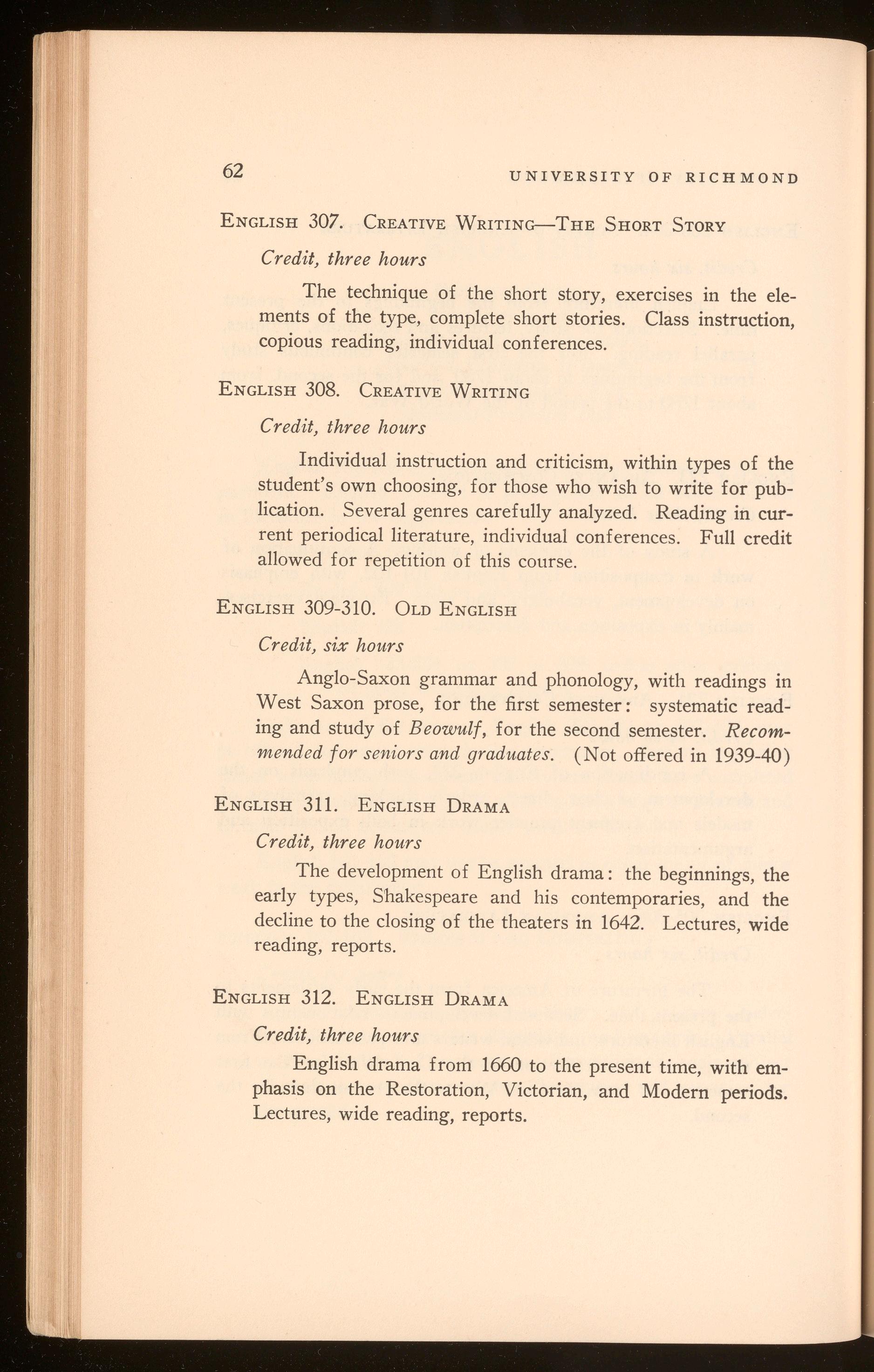
ENGLISH 307. CREATIVE WRITING-THE SHORT STORY
Credit, three hours
The technique of the short story, exercises m the elements of the type, complete short stories. Class instruction, copious reading, individual conferences.
ENGLISH 308. CREATIVE WRITING
Credit, three hours
Individual instruction and criticism, within types of the student's own choosing, for those who wish to write for publication Several genres carefully analyzed . Reading in current periodical literature, individual conferences. Full credit allowed for repetition of this course.
ENGLISH 309-310. OLD ENGLISH
Credit, six hours
Anglo-Saxon grammar and phonology, with readings in West Saxon prose, for the first semester: systematic reading and study of Beowulf, for the second semester. Recommend ed for s eni ors and graduates. (Not offered in 1939-40)
ENGLISH 311. ENGLISH DRAMA
Credit, three hours
The development of English drama: the beginnings, the early types, Shakespeare and his contemporaries, and the decline to the closing of the theaters in 1642. Lectures, wide reading, reports.
ENGLISH 312. ENGLISH DRAMA
Credit, three hours
English drama from 1660 to the present time, with emphasis on the Restoration, Victorian, and Modern periods. Lectures, wide reading, reports.
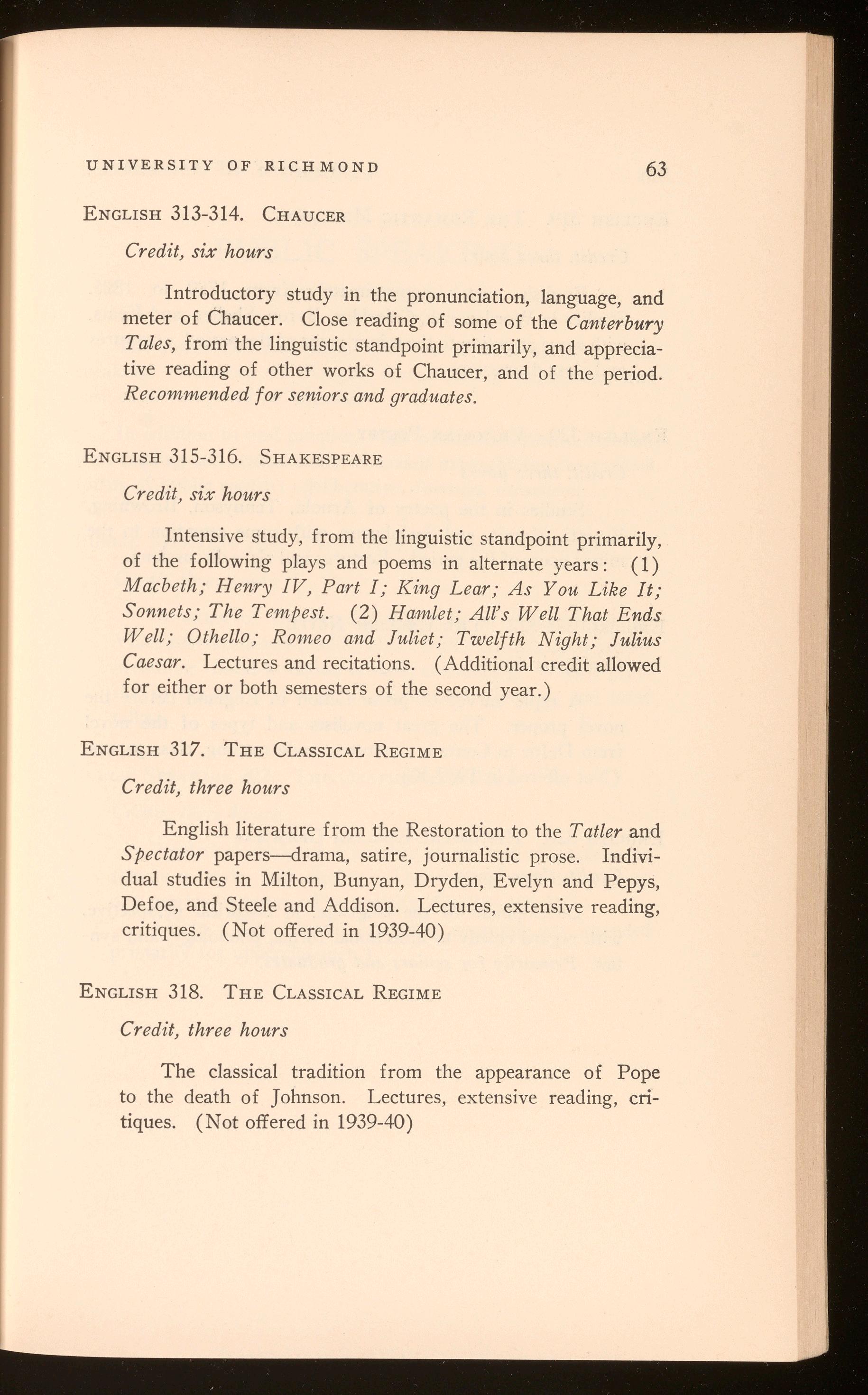
ENGLISH 313-314. CHAUCER
Credit, six hours
Introductory study in the pronunciation, language, and meter of Chaucer. Close reading of some of the Canterbury Tales, from the linguistic standpoint primarily, and appreciative reading of other works of Chaucer, and of the period. Recommended for seniors and graduates.
ENGLISH 315-316. SHAKESPEARE
Credit, six hours
Intensive study, from the linguistic standpoint primarily, of the following plays and poems in alternate years: ( 1) Macbeth; Henry IV, Part I; King Lear; As You Like It; Sonnets; The Tempest. (2) Hmnlet; All's Well That Ends Well; Othello; Romeo and Juliet; Twelfth Night; Julius Caesar. Lectures and recitations. (Additional credit allowed for either or both semesters of the second year.)
ENGLISH 317. THE CLASSICAL REGIME
Credit, three hours
English literature from the Restoration to the Tatler and Spectator papers---drama, satire, journalistic prose. Individual studies in Milton, Bunyan, Dryden, Evelyn and Pepys, Defoe, and Steele and Addison. Lectures, extensive reading, critiques. (Not offered in 1939-40)
ENGLISH 318. THE CLASSICAL REGIME
Credit, three hours
The classical tradition from the appearance of Pope to the death of Johnson. Lectures, extensive reading, critiques. (Not offered in 1939-40)
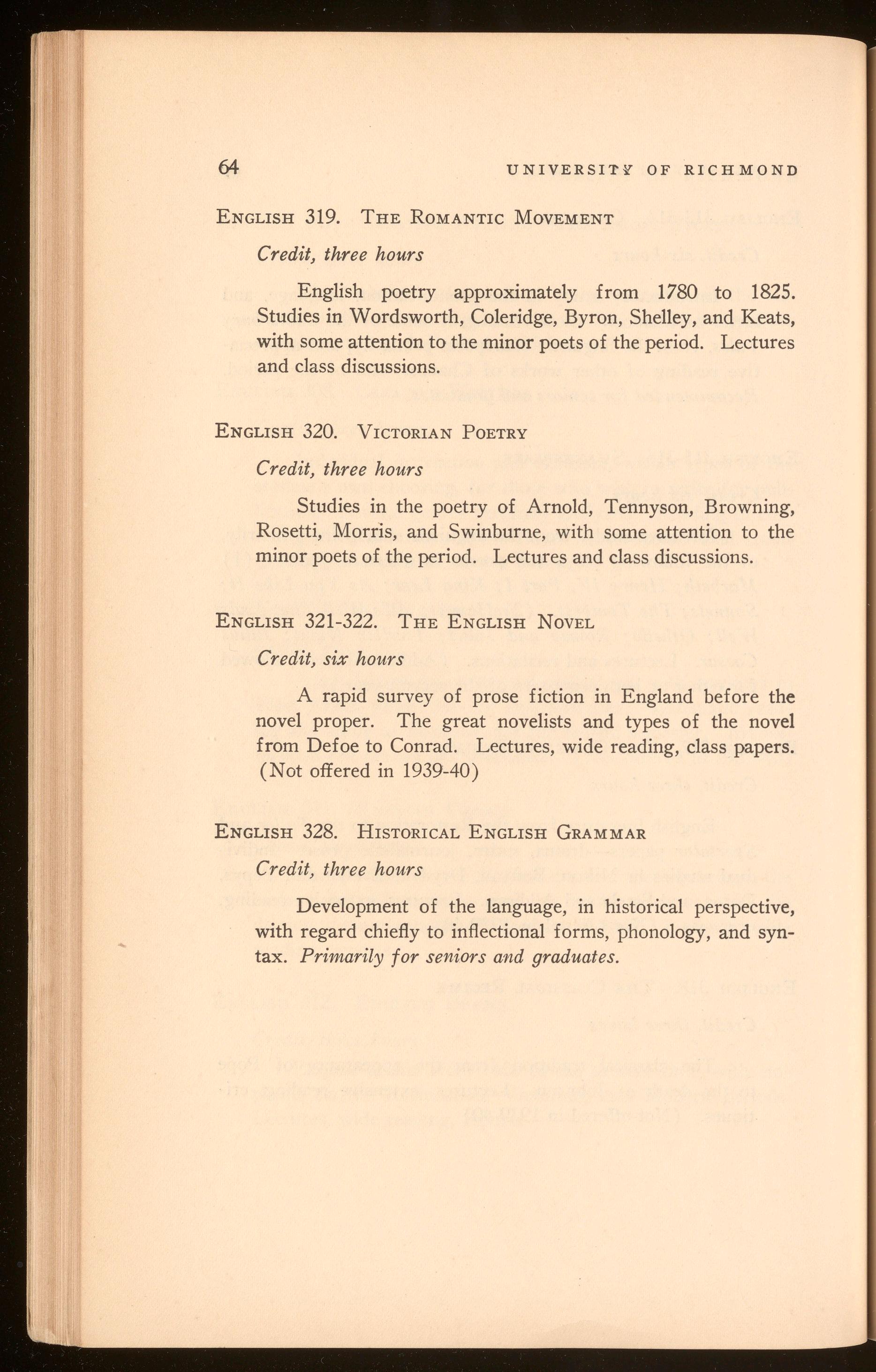
ENGLISH 319. THE ROMANTIC MOVEMENT
Credit, three hours
English poetry approximately from 1780 to 1825. Studies in Wordsworth, Coleridge, Byron, Shelley, and Keats, with some attention to the minor poets of the period. Lectures and class discussions.
ENGLISH 320. VICTORIAN POETRY
Credit, three hours
Studies in the poetry of Arnold, Tennyson, Browning, Rosetti, Morris, and Swinburne, with some attention to the minor poets of the period. Lectures and class discussions.
ENGLISH 321-322. THE ENGLISH NOVEL
Credit, si% hours
A rapid survey of prose fiction in England before the novel proper The great novelists and types of the novel from Defoe to Conrad. Lectures, wide reading, class papers. (Not offered in 1939-40)
ENGLISH 328. HISTORICAL ENGLISH GRAMMAR
Credit, three hours
Development of the language, in historical perspective, with regard chiefly to inflectional forms, phonology, and syntax. Primarily for seniors and graduates.
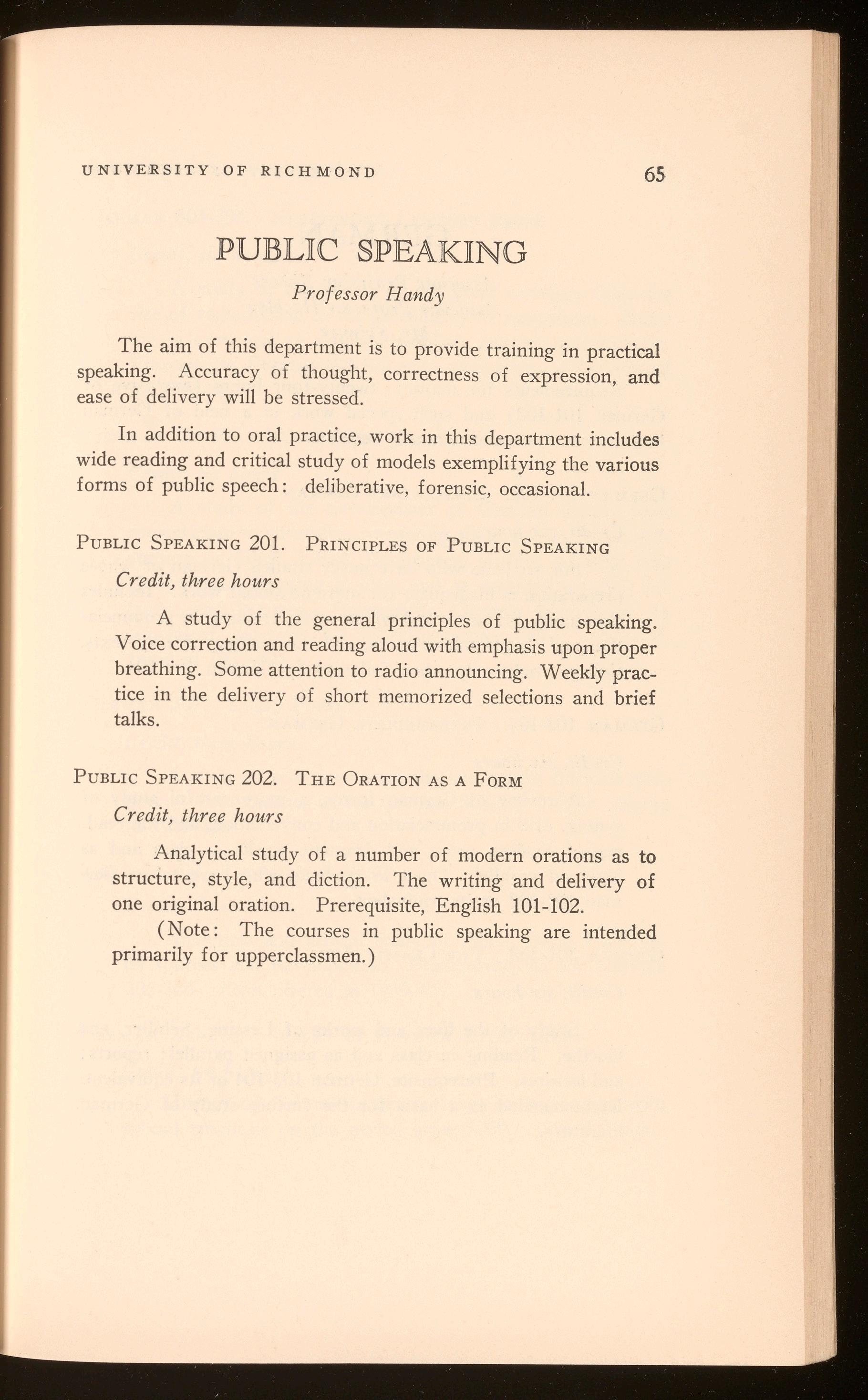
Professor Handy
The aim of this department is to provide training in practical speaking. Accuracy of thought, correctness of expression, and ease of delivery will be stressed.
In addition to oral practice, work in this department includes wide reading and critical study of models exemplifying the various forms of public speech: deliberative , forensic, occasional.
PUBLIC SPEAKING 201. PRINCIPLES OF PUBLIC SPEAKING
Credit, three hours
A study of the general principles of public speaking. Voice correction and reading aloud with emphasis upon proper breathing. Some attention to radio announcing. Weekly practice in the delivery of short memorized selections and brief talks.
PUBLIC SPEAKING 202 . THE ORATION AS A FORM
Credit, three hours
Analytical study of a number of modern orations as to structure, style, and diction. The writing and delivery of one original oration. Prerequisite, English 101-102.
(Note : The courses in public speaking are intended primarily for upperclassmen.)
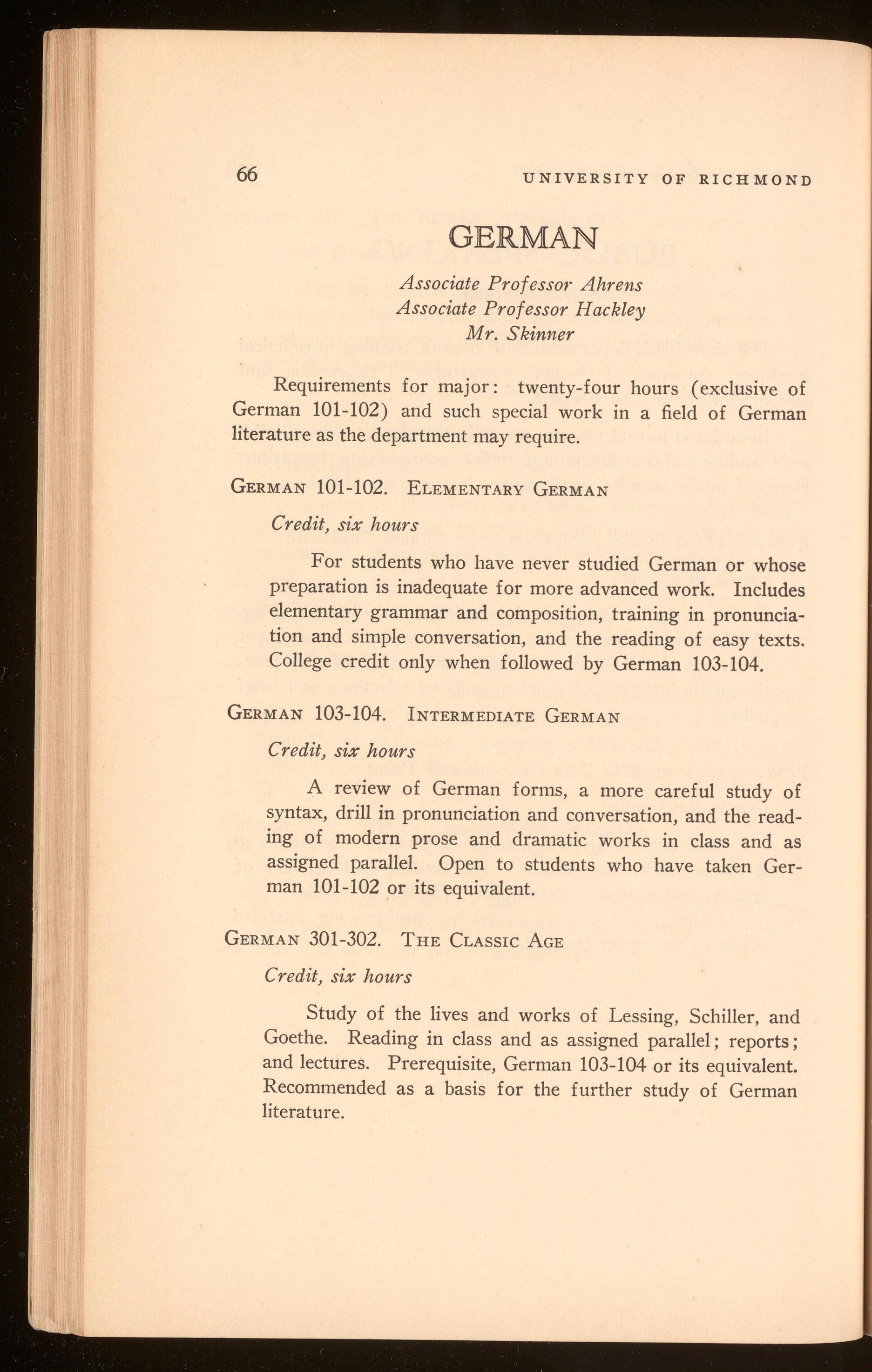
UNIVERSITY OF RICHMOND
Associate Professor Ahrens
Associate Professor Hackley
Mr. Skinner
Requirements for major: twenty-four hours ( exclusive of German 101-102) and such special work in a field of German literature as the department may require.
GERMAN 101-102. ELEMENTARY GERMAN
Credit, six hours
For students who have never studied German or whose preparation is inadequate for more advanced work. Includes elementary grammar and composition, training in pronunciation and simple conversation, and the reading of easy texts. College credit only when followed by German 103-104.
GERMAN 103-104. INTERMEDIATE GERMAN
Credit, six hours
A review of German forms, a more careful study of syntax, drill in pronunciation and conversation, and the reading of modern prose and dramatic works in class and as assigned parallel. Open to students who have taken German 101-102 or its equivalent.
GERMAN 301-302. THE CLASSIC AGE
Credit, six hours
Study of the lives and works of Lessing, Schiller, and Goethe. Reading in class and as assigned parallel ; reports ; and lectures. Prerequisite, German 103-104 or its equivalent. Recommended as a basis for the further study of German literature.
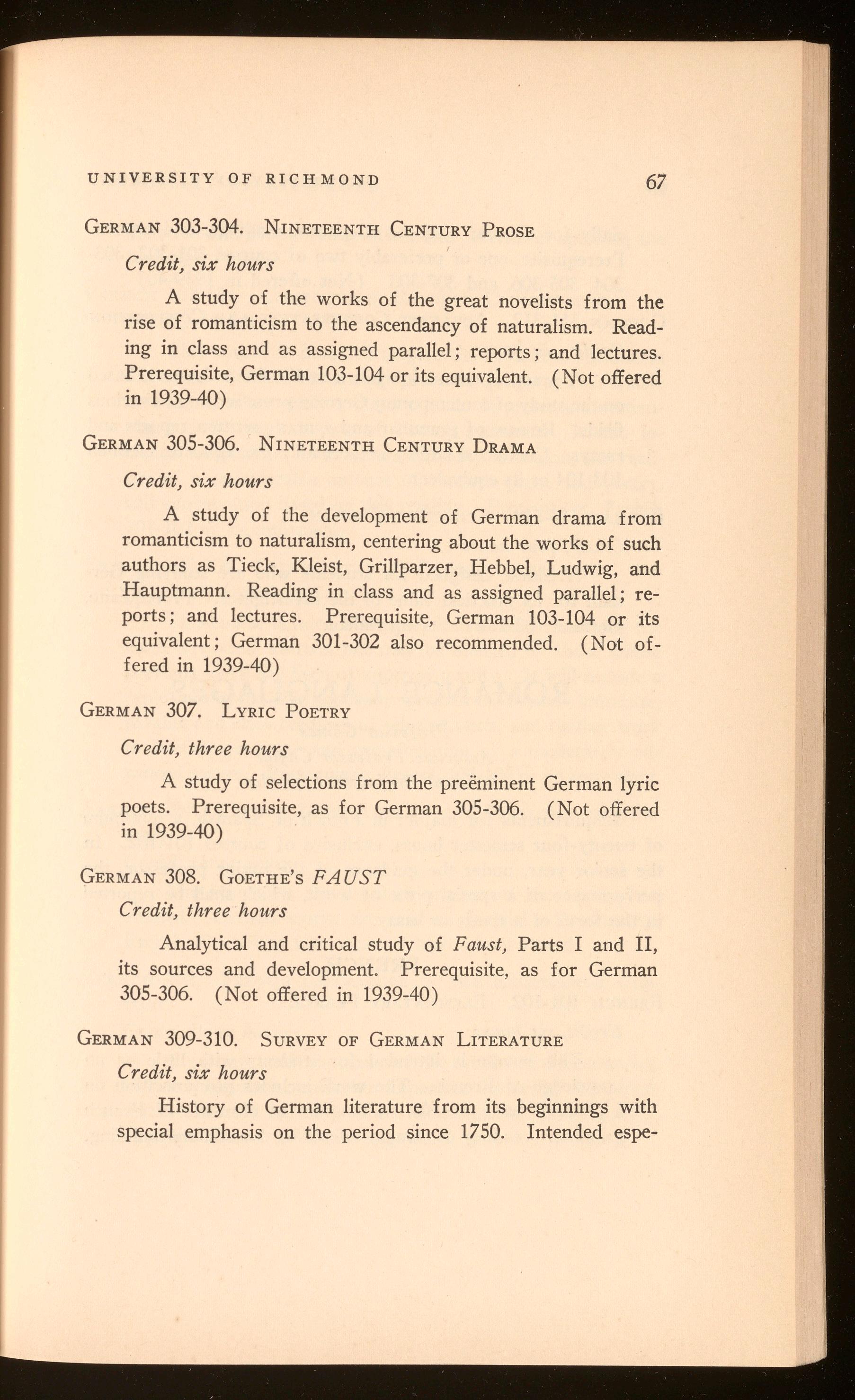
UNIVERSITY OF RICHMOND
GERMAN 303-304. NINETEENTH CENTURY PROSE
Credit, six hours 67
A study of the works of the great novelists from the rise of romanticism to the ascendancy of naturalism. Reading in class and as assigned parallel ; reports ; and lectures. Prerequisite, German 103-104 or its equivalent. (Not offered in 1939-40)
GERMAN 305-306. NINETEENTH CENTURY DRAMA
Credit, six hours
A study of the development of German drama from romanticism to naturalism, centering about the works of such authors as Tieck, Kleist, Grillparzer, Hebbel, Ludwig, and Hauptmann. Reading in class and as assigned parallel ; reports; and lectures. Prerequisite, German 103-104 or its equivalent; German 301-302 also recommended. (Not offered in 1939-40)
GERMAN 307. LYRIC POETRY
Credit, three hours
A study of selections from the preeminent German lyric poets. Prerequisite, as for German 305-306. (Not offered in 1939-40)
GERMAN 308. GOETHE'S FAUST
Credit, three hours
Analytical and critical study of Faust, Parts I and II, its sources and development . Prerequisite, as for German 305-306. (Not offered in 1939-40)
GERMAN 309-310. SURVEY OF GERMAN LITERATURE
Credit, six hours
History of German literature from its beginnings with special emphasis on the period since 1750. Intended espe-
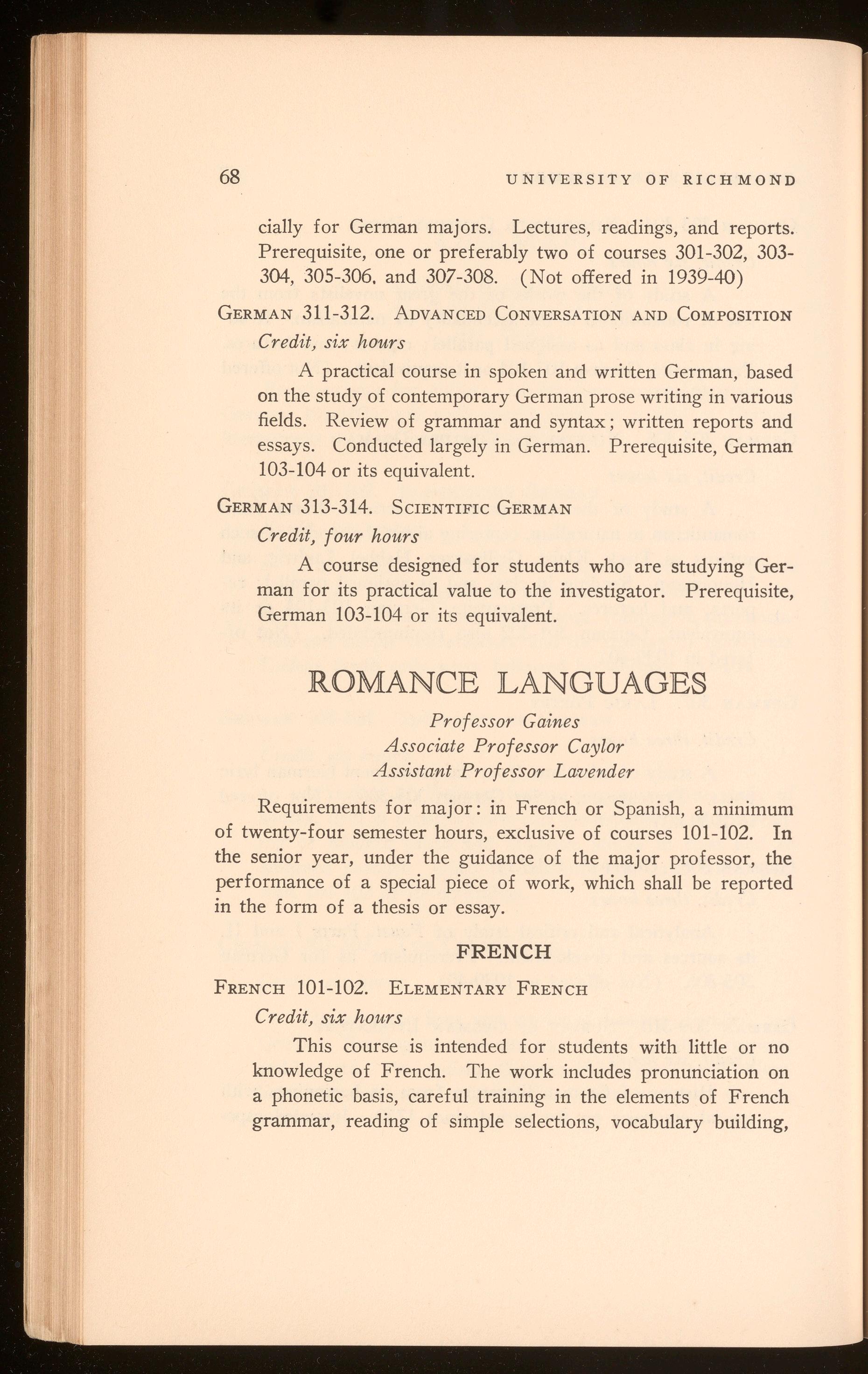
UNIVERSITY OF RICHMOND
cially for German majors. Lectures, readings, and reports. Prerequisite, one or preferably two of courses 301-302, 303304, 305-306. and 307-308. (Not offered in 1939-40)
GERMAN 311-312. ADVANCED CONVERSATION AND COMPOSITION
Credit , six hours
A practical course in spoken and written German, based on the study of contemporary German prose writing in various fields. Review of grammar and syntax; written reports and essays. Conducted largely in German. Prerequisite, German 103-104 or its equivalent.
GERMAN 313-314. SCIENTIFIC GERMAN
Credit, four hours
A course designed for students who are studying German for its practical value to the investigator. Prerequisite, German 103-104 or its equivalent.
Professor Gaines
Associate Professor Caylor
Assistant Professor Lavender
Requirements for major: in French or Spanish, a m1111mum of twenty-four semester hours, exclusive of courses 101-102. In the senior year, under the guidance of the major professor, the performance of a special piece of work, which shall be reported in the form of a thesis or essay.
FRENCH 101-102. ELEMENTARY FRENCH
Credit, six hours
This course is intended for students with little or no knowledge of French. The work includes pronunciation on a phonetic basis, careful training in the elements of French grammar, reading of simple selections, vocabulary building,
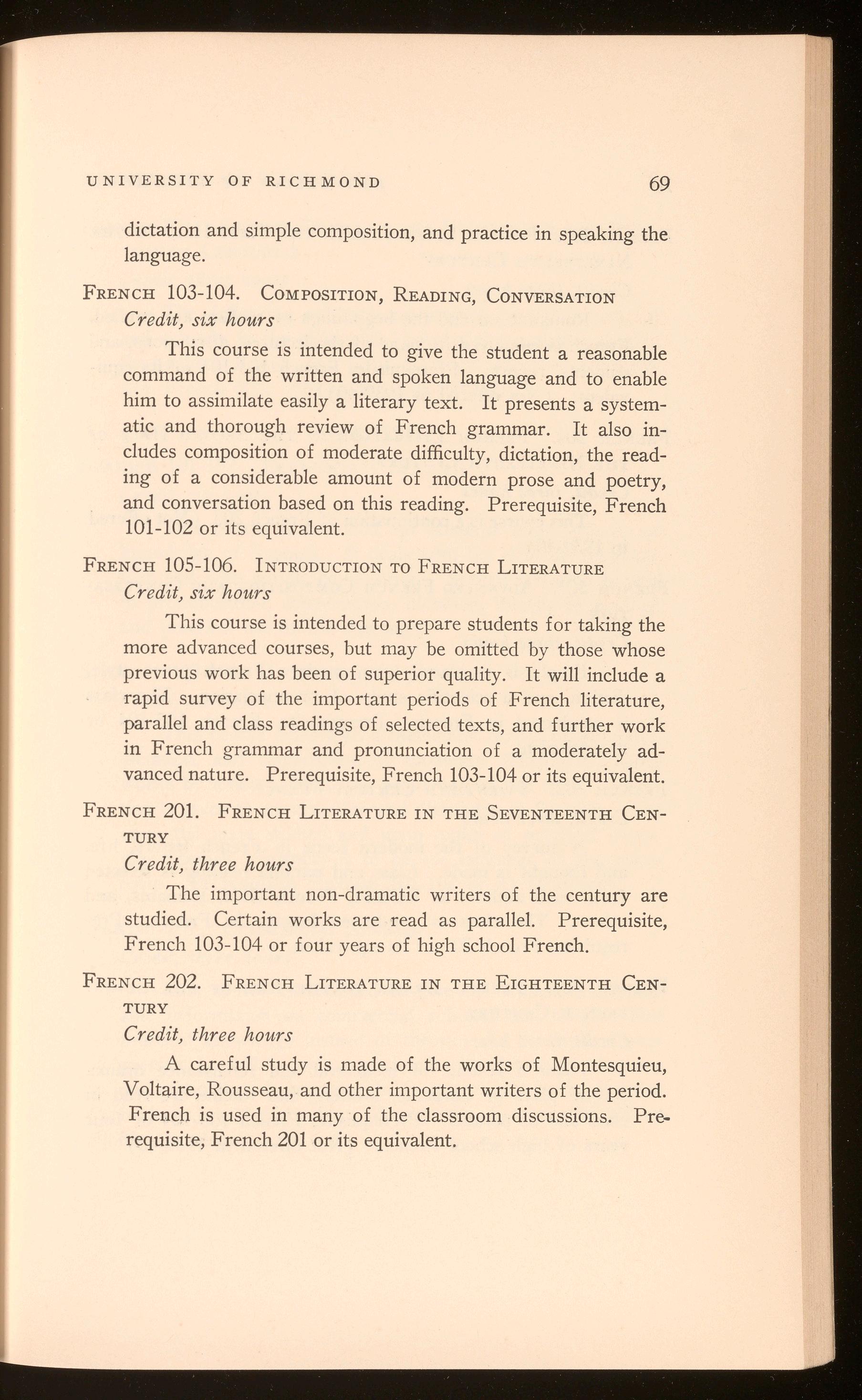
dictation and simple composition, and practice in speaking the language.
FRENCH 103-104. COMPOSITION, READING, CONVERSATION
Credit, six hours
This course is intended to give the student a reasonable command of the written and spoken language and to enable him to assimilate easily a literary text. It presents a systematic and thorough review of French grammar. It also includes composition of moderate difficulty, dictation, the reading of a considerable amount of modern prose and poetry, and conversation based on this reading. Prerequisite, French 101-102 or its equivalent.
FRENCH 105-106. INTRODUCTION TO FRENCH LITERATURE
Credit, six hours
This course is intended to prepare students for taking the more advanced courses, but may be omitted by those whose previous work has been of superior quality. It will include a rapid survey of the important periods of French literature, parallel and class readings of selected texts, and further work in French grammar and pronunciation of a moderately advanced nature. Prerequisite, French 103-104 or its equivalent.
FRENCH 201. FRENCH LITERATURE IN THE SEVENTEENTH CENTURY
Credi t, three hours
The important non-dramatic writers of the century are studied. Certain works are read as parallel. Prerequisite, French 103-104 or four years of high school French.
FRENCH 202. FRENCH LITERATURE IN THE EIGHTEENTH CENTURY
Credit, three hours
A careful study is made of the works of Montesquieu, Voltaire, Rousseau, and other important writers of the period. French is used in many of the classroom discussions. Pre. requisite, French 201 or its equivalent.
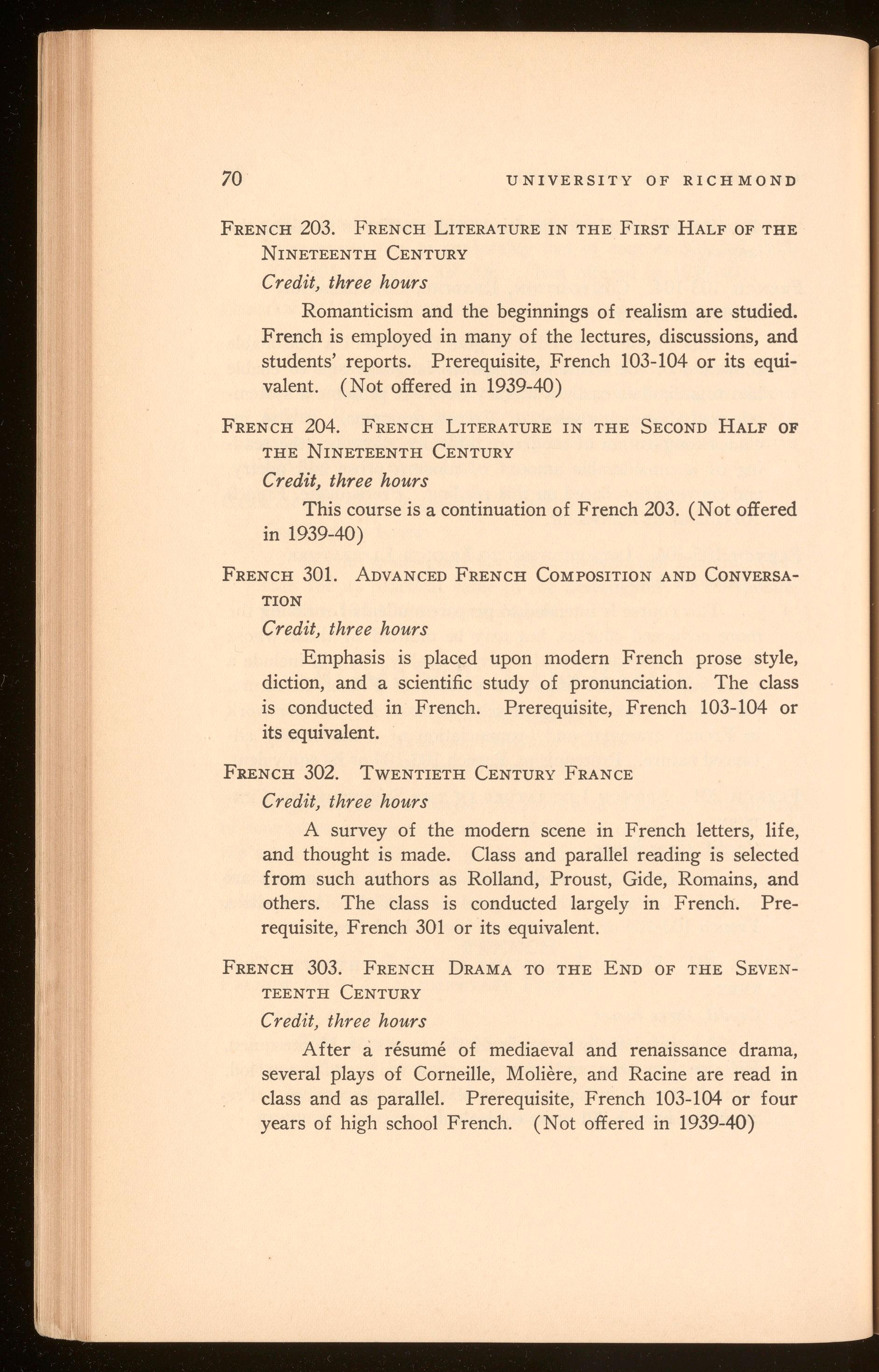
UNIVERSITY OF RICHMOND
FRENCH 203. FRENCH LITERATURE IN THE FIRST HALF OF THE NINETEENTH CENTURY
Credit, three hours
Romanticism and the beginnings of realism are studied. French is employed in many of the lectures, discussions, and students' reports. Prerequisite, French 103-104 or its equivalent. (Not offered in 1939-40)
FRENCH 204. FRENCH LITERATURE IN THE SECOND HALF OF THE NINETEENTH CENTURY
Credit, three hours
This course is a continuation of French 203. (Not offered in 1939-40)
FRENCH 301. ADVANCED FRENCH COMPOSITION AND CONVERSATION
Credit, three hours
Emphasis is placed upon modern French prose style, diction, and a scientific study of pronunciation. The class is conducted in French. Prerequisite, French 103-104 or its equivalent.
FRENCH 302. TWENTIETH CENTURY FRANCE
Credit, three hours
A survey of the modern scene in French letters, life, and thought is made. Class and parallel reading is selected from such authors as Rolland, Proust, Gide, Romains, and others. The class is conducted largely in French. Prerequisite, French 301 or its equivalent.
FRENCH 303. FRENCH DRAMA TO THE END OF THE SEVENTEENTH CENTURY
Credit, three hours
After a resume of mediaeval and renaissance drama, several plays of Corneille, Moliere, and Racine are read in class and as parallel. Prerequisite, French 103-104 or four years of high school French. (Not offered in 1939-40)
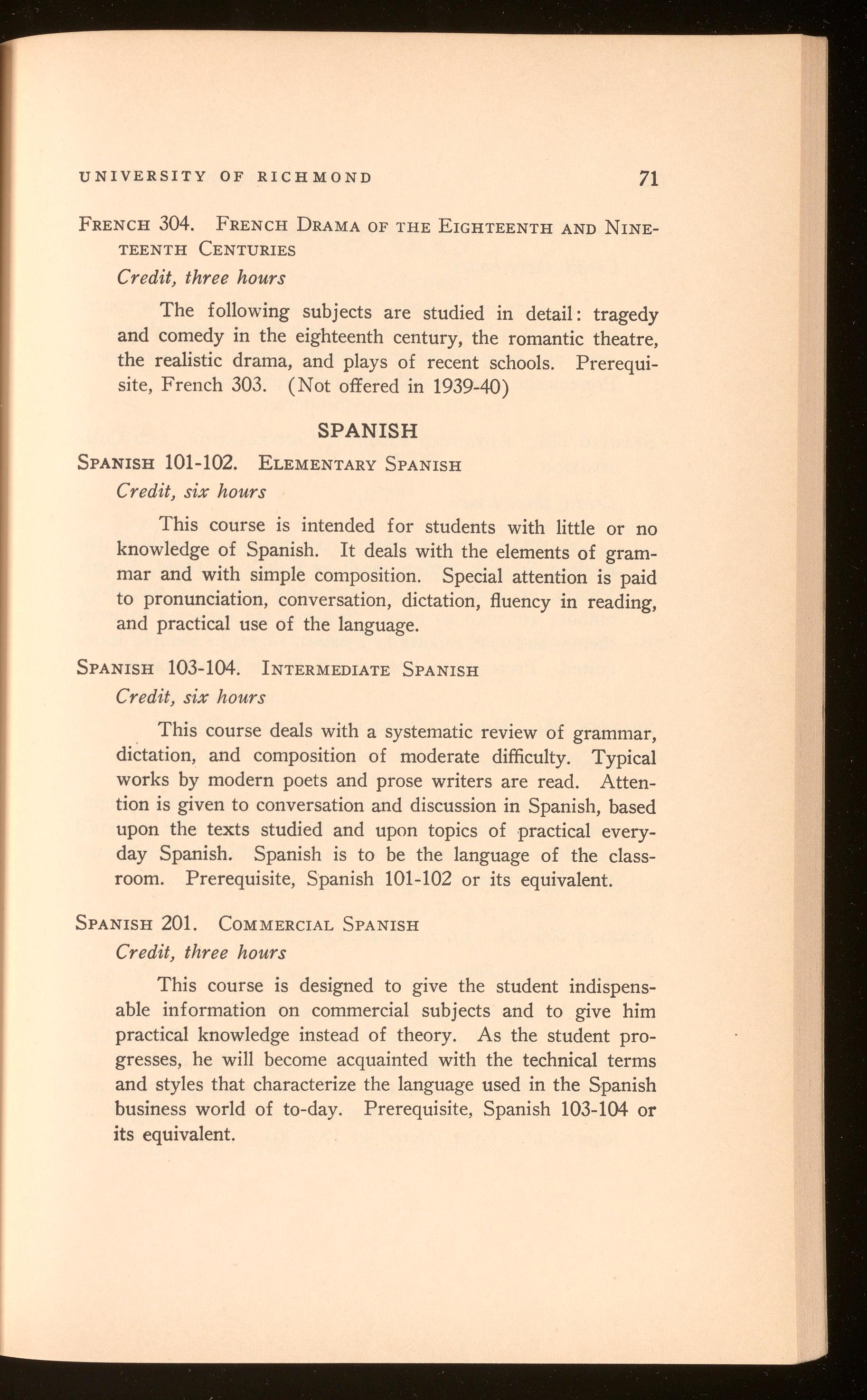
UNIVERSITY OF RICHMOND
FRENCH 304. FRENCH DRAMA OF THE EIGHTEENTH AND NINETEENTH CENTURIES
Credit, three hours
The following subjects are studied in detail: tragedy and comedy in the eighteenth century, the romantic theatre, the realistic drama, and plays of recent schools. Prerequisite, French 303. (Not offered in 1939-40)
SPANISH 101-102. ELEMENTARY SPANISH
Credit, six hours
This course is intended for students with little or no knowledge of Spanish. It deals with the elements of grammar and with simple composition. Special attention is paid to pronunciation, conversation, dictation, fluency in reading, and practical use of the language.
SPANISH 103-104. INTERMEDIATE SPANISH
Credit, six hours
This course deals with a systematic review of grammar, dictation, and composition of moderate difficulty. Typical works by modern poets and prose writers are read. Attention is given to conversation and discussion in Spanish, based upon the texts studied and upon topics of practical everyday Spanish. Spanish is to be the language of the classroom. Prerequisite, Spanish 101-102 or its equivalent.
SPANISH 201. COMMERCIAL SPANISH
Credit, three hours
This course is designed to give the student indispensable information on commercial subjects and to give him practical knowledge instead of theory. As the student progresses, he will become acquainted with the technical terms and styles that characterize the language used in the Spanish business world of to-day. Prerequisite, Spanish 103-104 or its equivalent.
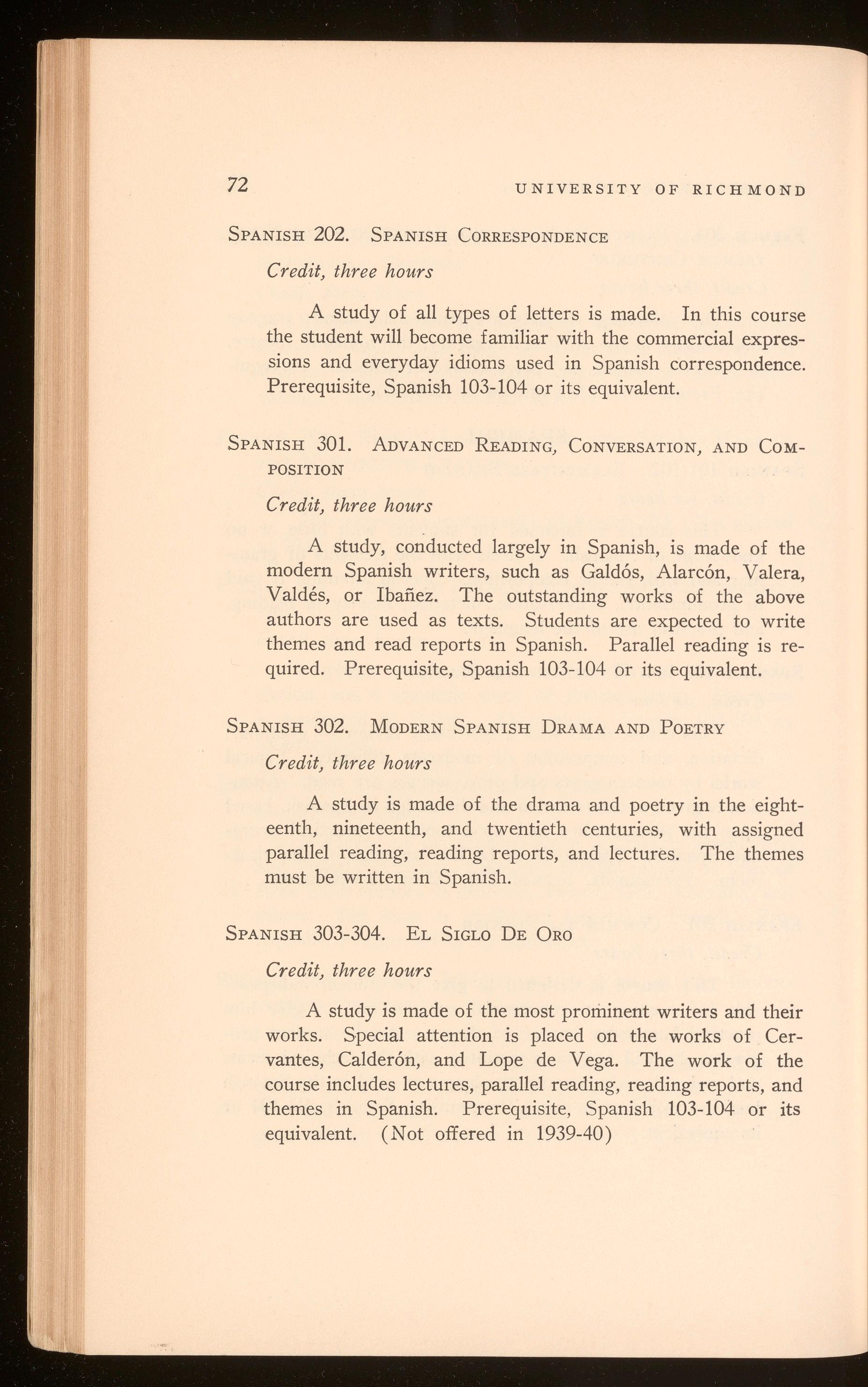
SPANISH 202. SPANISH CORRESPONDENCE
Credit, three hours
A study of all types of letters is made. In this course the student will become familiar with the commercial expressions and everyday idioms used in Spanish correspondence. Prerequisite, Spanish 103-104 or its equivalent.
SPANISH 301. ADVANCED READING, CONVERSATION, AND COMPOSITION
Credit, three hours
A study, conducted largely in Spanish, is made of the modern Spanish writers, such as Galdos, Alarcon, Valera, Valdes, or Ibafiez. The outstanding works of the above authors are used as texts. Students are expected to write themes and read reports in Spanish. Parallel reading is required. Prerequisite, Spanish 103-104 or its equivalent.
SPANISH 302. MODERN SPANISH DRAMA AND POETRY
Credit, three hours
A study is made of the drama and poetry in the eighteenth, nineteenth, and twentieth centuries, with assigned parallel reading, reading reports, and lectures. The themes must be written in Spanish.
SPANISH 303-304. EL SIGLO DE ORO
Credit, three hours
A study is made of the most prominent writers and their works. Special attention is placed on the works of Cervantes, Calderon, and Lope de Vega. The work of the course includes lectures, parallel reading, reading reports, and themes in Spanish. Prerequisite, Spanish 103-104 or its equivalent (Not offered in 1939-40)
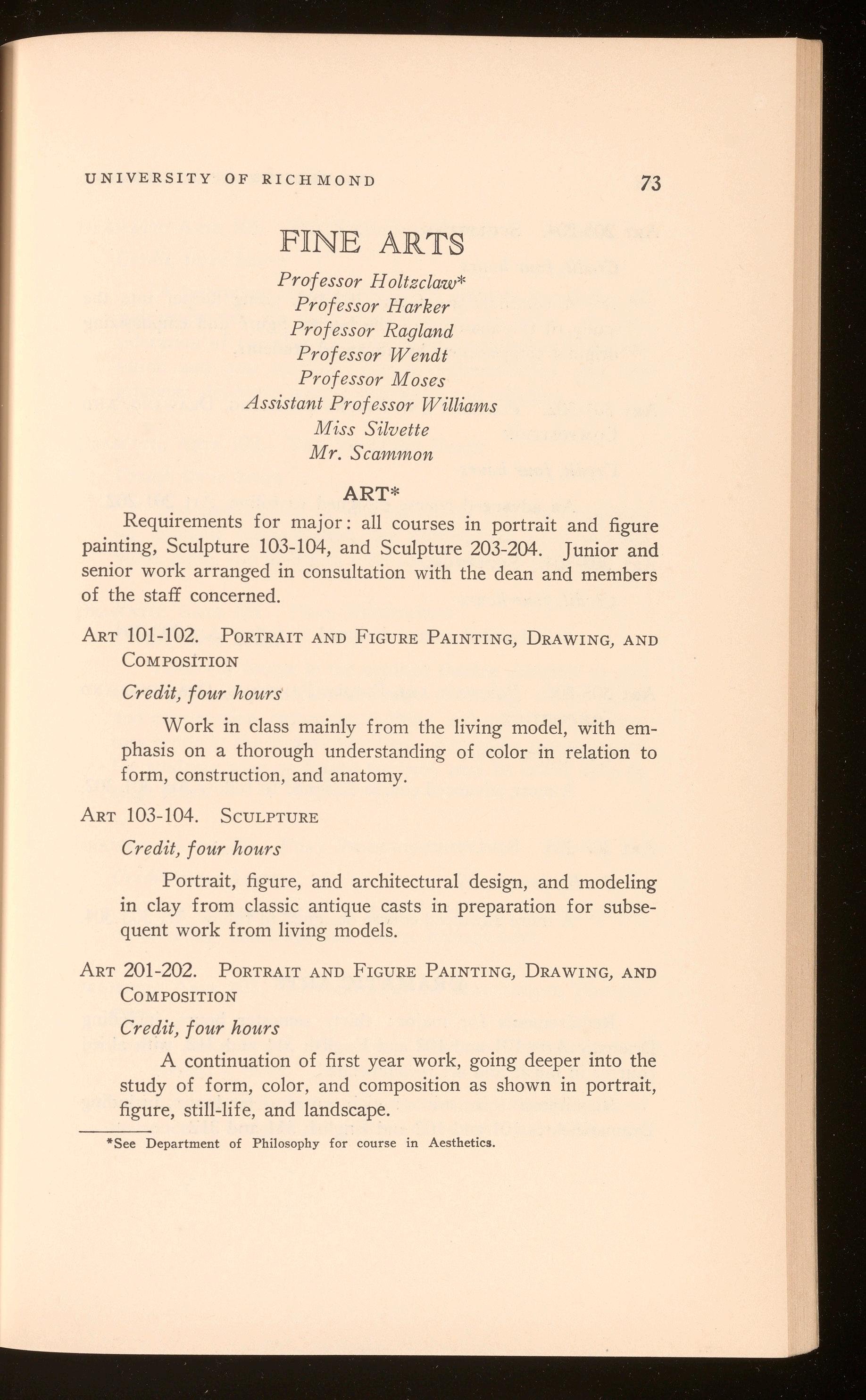
Professor Holtzclaw*
Professor Harker
Professor Ragland
Professor Wendt
Professor Moses
Assistant Professor Williams
Miss Silvette
Mr. Scammon
ART*
Requirements for major: all courses in portrait and figure painting, Sculpture 103-104, and Sculpture 203-204. Junior and senior work arranged in consultation with the dean and members of the staff concerned .
ART 101-102. PORTRAIT AND FIGURE PAINTING, DRAWING, AND COMPOSITION
Credit, four hours
Work in class mainly from the living model, with emphasis on a thorough understanding of color in relation to form, construction, and anatomy.
ART 103-104. SCULPTURE
Credit, four hours
Portrait, figure, and architectural design, and modeling in clay from classic antique casts in preparation for subsequent work from living models.
ART 201-202. PORTRAIT AND FIGURE PAINTING, DRAWING, AND COMPOSITION
Credit, four hours
A continuation of first year work, going deeper into the study of form, color, and composition as shown in portrait, figure, still-life, and landscape.
*See Department of Philosophy for course in Aesthetics.
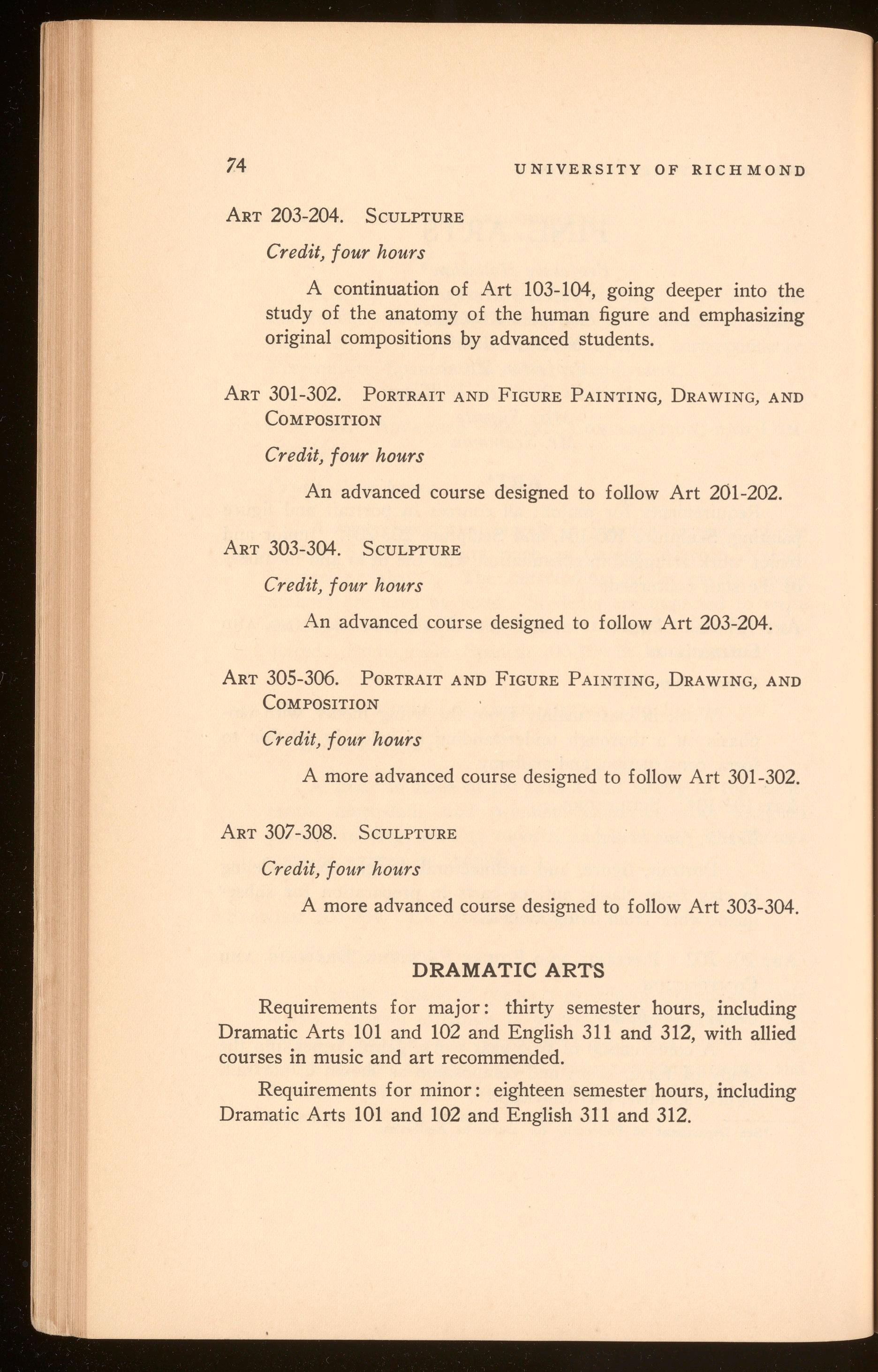
ART 203-204. SCULPTURE
Credit, four hours
A continuation of Art 103-104, going deeper into the study of the anatomy of the human figure and emphasizing original compositions by advanced students.
ART 301-302. PORTRAIT AND FIGURE PAINTING, DRAWING, AND COMPOSITION
Credit, four hours
An advanced course designed to follow Art 201-202.
ART 303-304. SCULPTURE
Credit, four hours
An advanced course designed to follow Art 203-204.
ART 305-306. PORTRAIT AND FIGURE PAINTING, DRAWING, AND COMPOSITION
Credit, four hours
A more advanced course designed to follow Art 301-302.
ART 307-308. SCULPTURE
Credit, four hours
A more advanced course designed to follow Art 303-304
Requirements for major: thirty semester hours, including Dramatic Arts 101 and 102 and English 311 and 312, with allied courses in music and art recommended.
Requirements for minor: eighteen semester hours, including Dramatic Arts 101 and 102 and English 311 and 312.
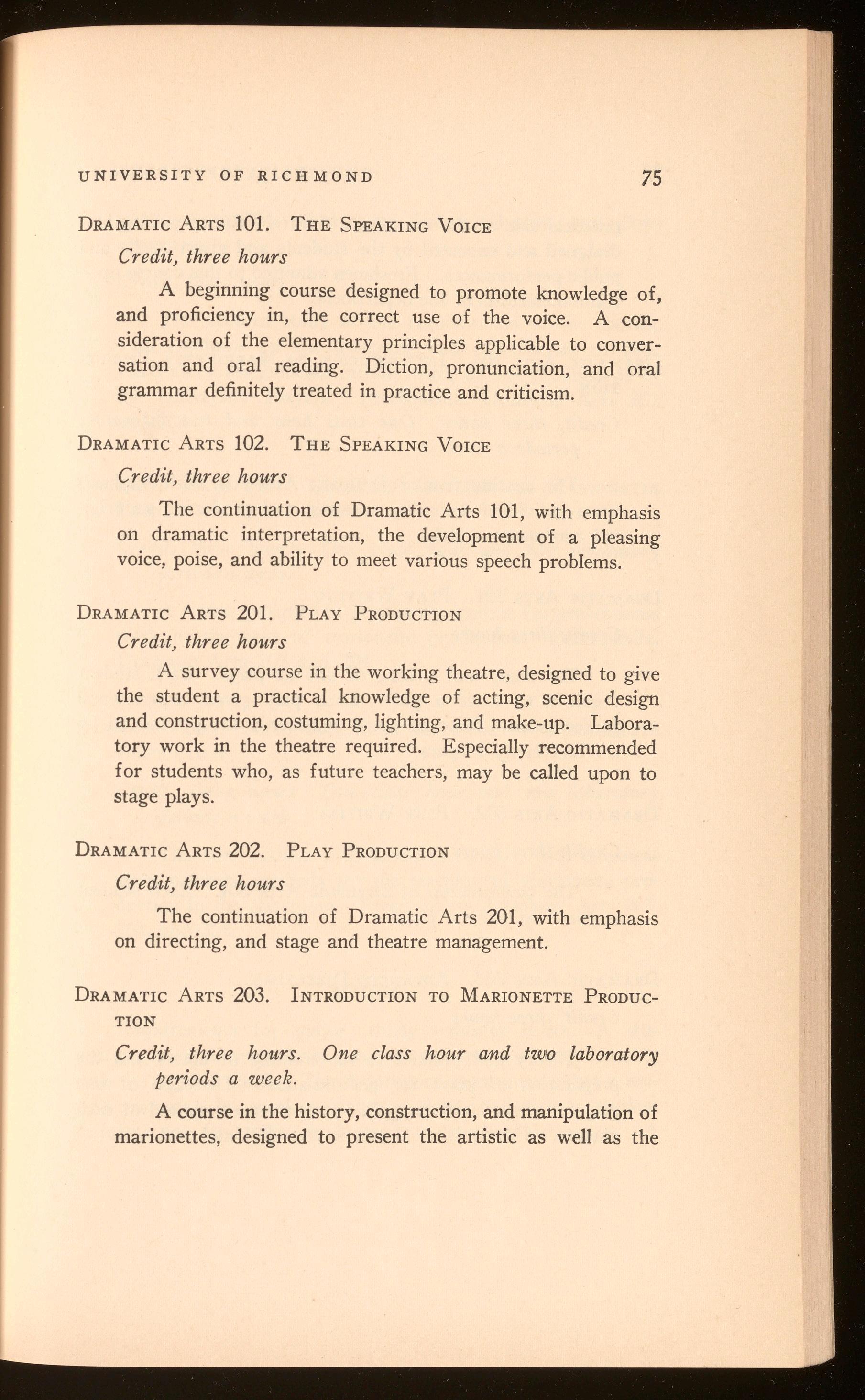
UNIVERSITY OF RICHMOND
DRAMATIC ARTS 101. THE SPEAKING VOICE
Credit, three hours
A beginning course designed to promote knowledge of, and proficiency in, the correct use of the voice. A consideration of the elementary principles applicable to conversation and oral reading. Diction, pronunciation, and oral grammar definitely treated in practice and criticism.
DRAMATIC ARTS 102. THE SPEAKING VOICE
Credit, three hours
The continuation of Dramatic Arts 101, with emphasis on dramatic interpretation, the development of a pleasing voice, poise, and ability to meet various speech problems.
DRAMATIC ARTS 201. PLAY PRODUCTION
Credit, three hours
A survey course in the working theatre, designed to give the student a practical knowledge of acting, scenic design and construction, costuming, lighting, and make-up. Laboratory work in the theatre required. Especially recommended for students who, as future teachers, may be called upon to stage plays.
DRAMATIC ARTS 202. PLAY PRODUCTION
Credit, three hours
The continuation of Dramatic Arts 201, with emphasis on directing, and stage and theatre management.
DRAMATIC ARTS 203. INTRODUCTION TO MARIONETTE PRODUCTION
Credit, three hours. One class hour and two laboratory periods a week.
A course in the history, construction, and manipulation of marionettes, designed to present the artistic as well as the
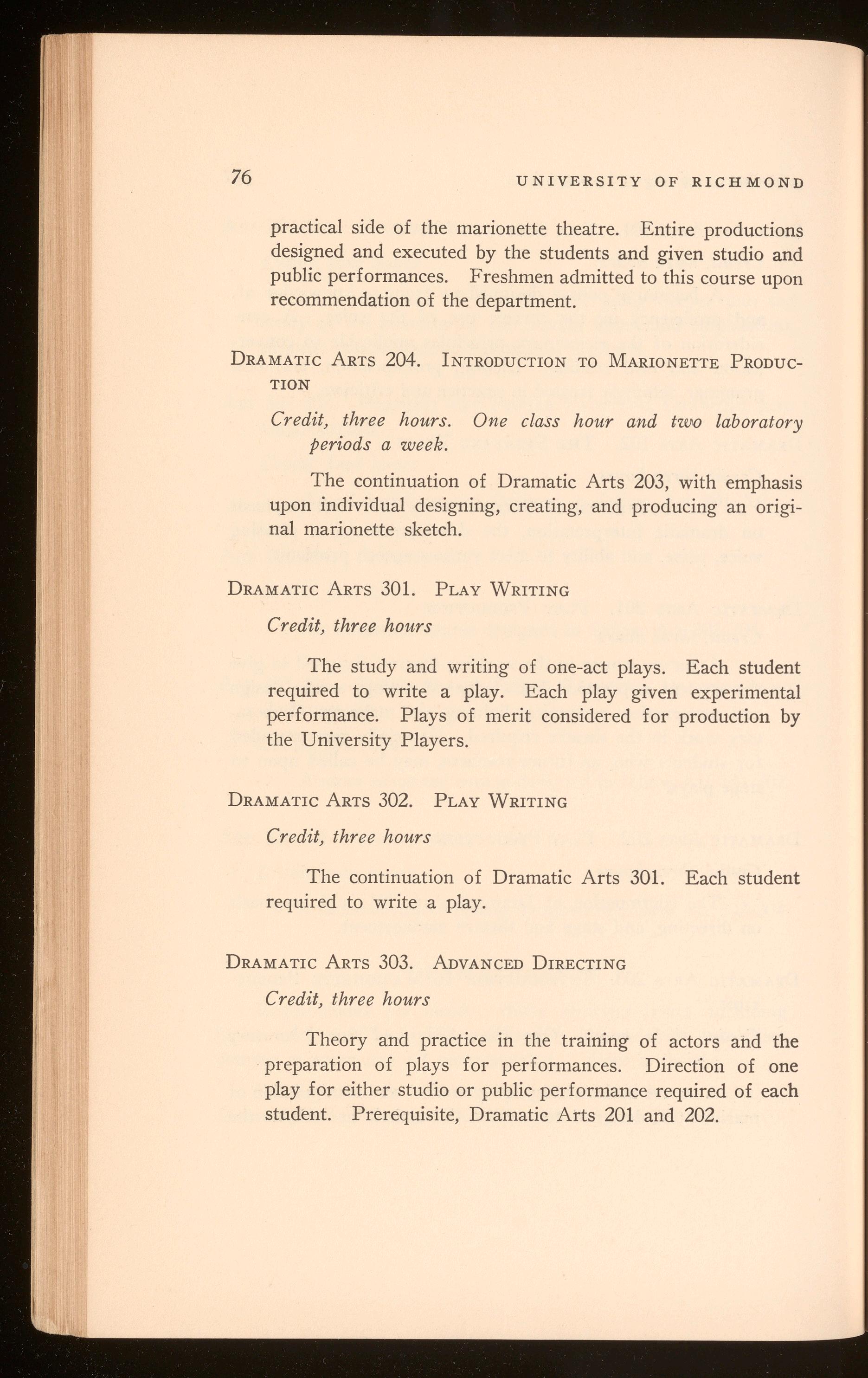
practical side of the marionette theatre. Entire productions designed and executed by the students and given studio and public performances. Freshmen admitted to this course upon recommendation of the department.
DRAMATIC ARTS 204. INTRODUCTION TO MARIONETTE PRODUCTION
Credit, three hours One class hour and tioo laboratory periods a week.
The continuation of Dramatic Arts 203, with emphasis upon individual designing, creating, and producing an original marionette sketch.
DRAMATIC ARTS 301. PLAY WRITING
Credit, three hours
The study and writing of one-act plays . Each student required to write a play. Each play given experimental performance. Plays of merit considered for production by the University Players.
DRAMATIC ARTS 302. PLAY WRITING
Credit, three hours
The continuation of Dramatic Arts 301. Each student required to write a play.
DRAMATIC ARTS 303. ADVANCED DIRECTING
Credit, three hours
Theory and practice in the training of actors and the preparation of plays for performances. Direction of one play for either studio or public performance required of each student. Prerequisite, Dramatic Arts 201 and 202.
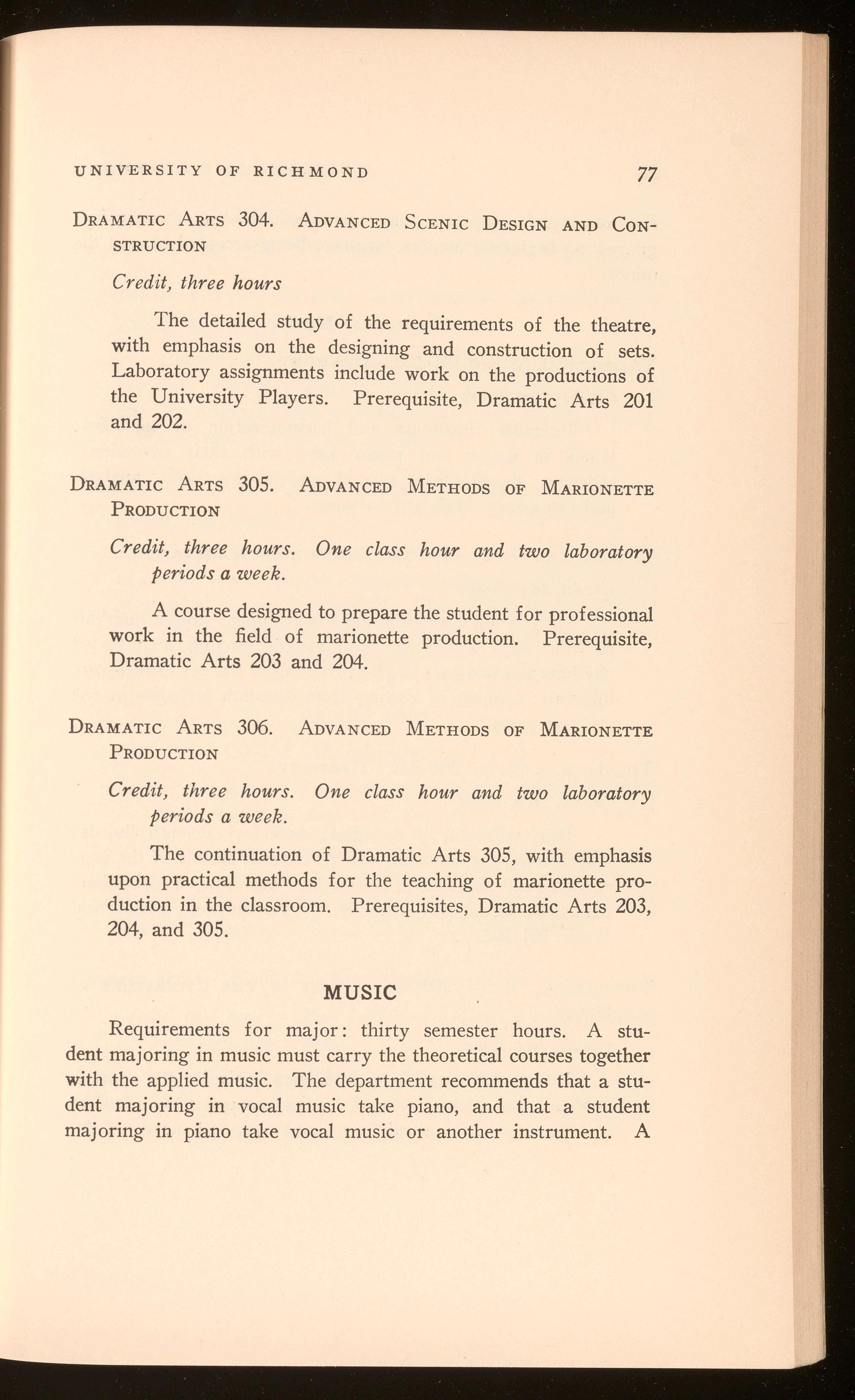
DRAMATIC ARTS 304. ADVANCED SCENIC DESIGN AND CONSTRUCTION
Credit, three hours
The detailed study of the requirements of the theatre, with emphasis on the designing and construction of sets. Laboratory assignments include work on the productions of the University Players. Prerequisite, Dramatic Arts 201 and 202.
DRAMATIC ARTS 305. ADVANCED METHODS OF MARIONETTE PRODUCTION
Credit, three hours. One class hour and two laboratory periods a week.
A course designed to prepare the student for professional work in the field of marionette production. Prerequisite, Dramatic Arts 203 and 204.
DRAMATIC ARTS 306. ADVANCED METHODS OF MARIONETTE PRODUCTION
Credit, three hours. One class hour and two laboratory periods a week.
The continuation of Dramatic Arts 305, with emphasis upon practical methods for the teaching of marionette production in the classroom. Prerequisites, Dramatic Arts 203, 204, and 305.
Requirements for major: thirty semester hours. A student majoring in music must carry the theoretical courses together with the applied music. The department recommends that a student majoring in vocal music take piano, and that a student majoring in piano take vocal music or another instrument. A
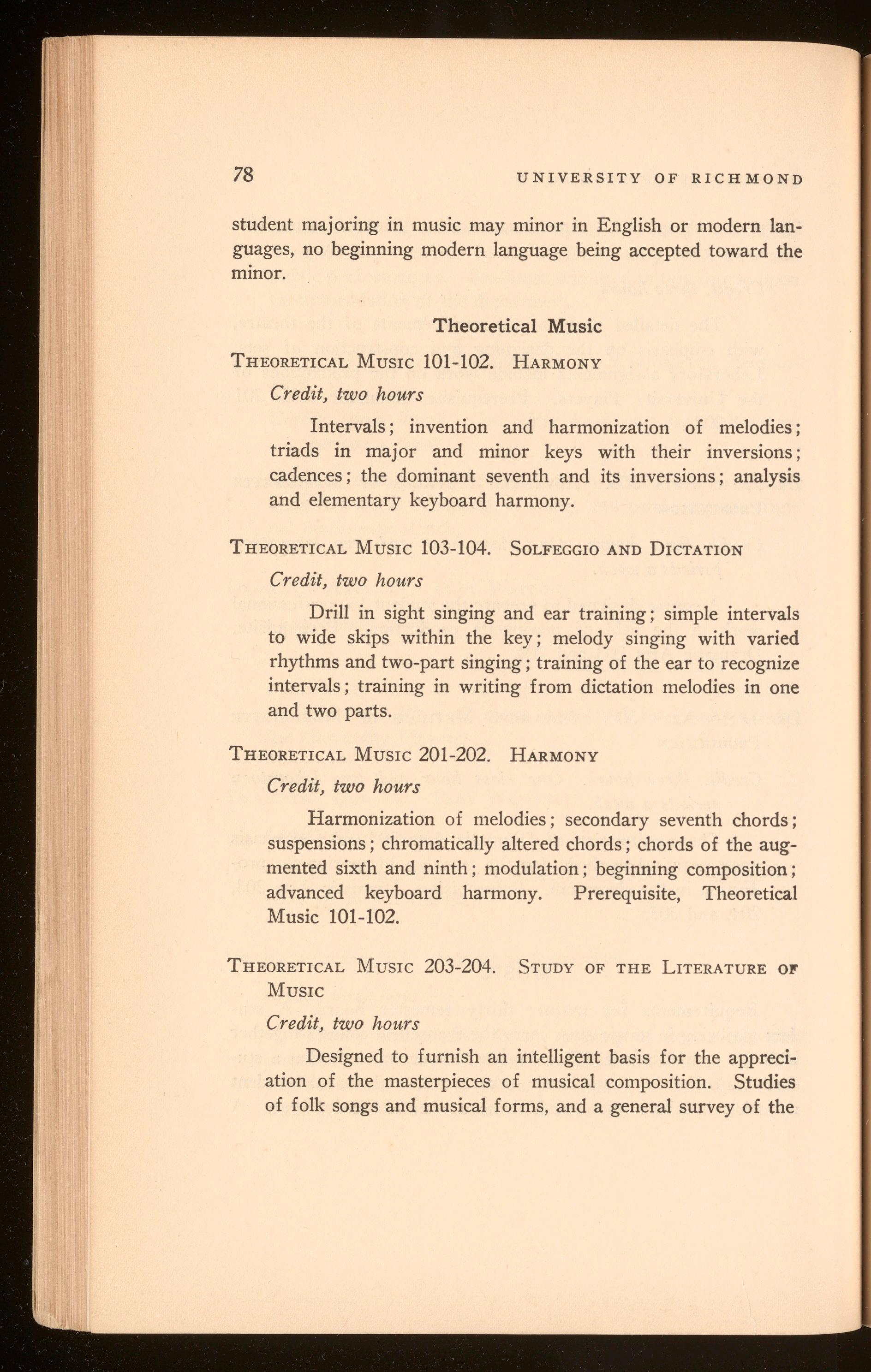
UNIVERSITY OF RICHMOND
student majoring in music may minor in English or modern languages, no beginning modern language being accepted toward the minor.
THEORETICAL Music 101-102. HARMONY
Credit, two hours
Intervals; invention and harmonization of melodies; triads in major and minor keys with their inversions; cadences; the dominant seventh and its inversions; analysis and elementary keyboard harmony.
THEORETICAL MUSIC 103-104. SOLFEGGIO AND DICTATION
Credit, two hours
Drill in sight singing and ear training ; simple intervals to wide skips within the key; melody singing with varied rhythms and two-part singing; training of the ear to recognize intervals ; training in writing from dictation melodies m one and two parts.
THEORETICAL Music 201-202. HARMONY
Credit, two hours
Harmonization of melodies ; secondary seventh chords; suspensions ; chromatically altered chords ; chords of the augmented sixth and ninth ; modulation ; beginning composition ; advanced keyboard harmony. Prerequisite, Theoretical Music 101-102.
THEORETICAL MUSIC 203-204. STUDY OF THE LITERATURE 01" MUSIC
Credit, two hours
Designed to furnish an intelligent basis for the appreciation of the masterpieces of musical composition. Studies of folk songs and musical forms, and a general survey of the
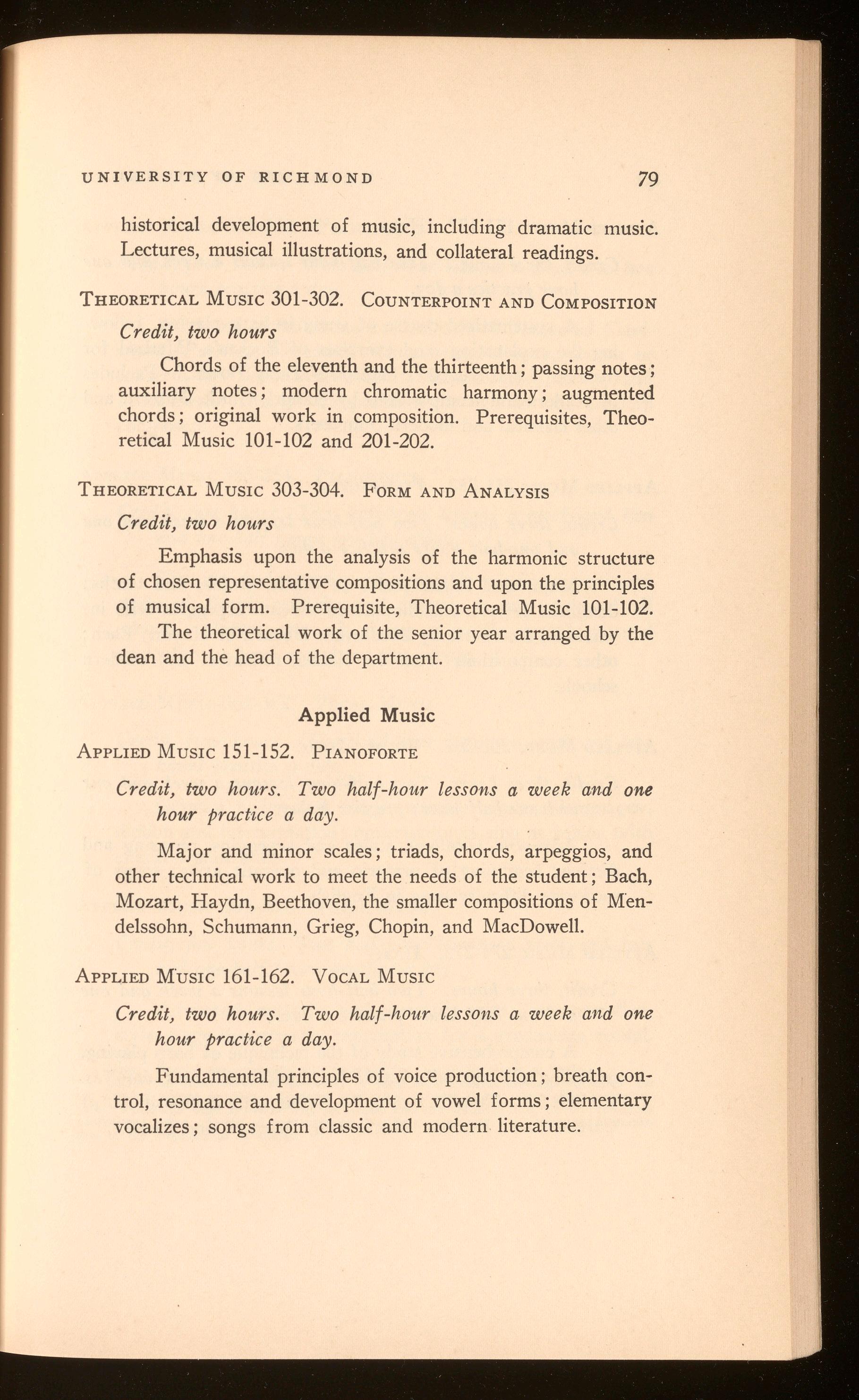
historical development of music, including dramatic music. Lectures, musical illustrations, and collateral readings.
THEORETICAL Music
Credit, two hours
301-302. CouNTERPOINT AND COMPOSITION
Chords of the eleventh and the thirteenth ; passing notes ; auxiliary notes; modern chromatic harmony; augmented chords ; original work in composition. Prerequisites, Theoretical Music 101-102 and 201-202.
THEORETICAL Music
Credit, two hours
303-304. FORM AND ANALYSIS
Emphasis upon the analysis of the harmonic structure of chosen representative compositions and upon the principles of musical form. Prerequisite, Theoretical Music 101-102. The theoretical work of the senior year arranged by the dean and the head of the department.
APPLIED Music 151-152. PIANOFORTE
Credit, two hours. Two half-hour lessons a week and one hour practice a day.
Major and minor scales; triads, chords, arpeggios, and other technical work to meet the needs of the student ; Bach, Mozart, Haydn, Beethoven, the smaller compositions of Mendelssohn, Schumann, Grieg, Chopin, and MacDowell.
APPLIED Music 161-162. VocAL Music
Credit, two hours. Two half-hour lessons a week and one hour practice a day.
Fundamental principles of voice production; breath control, resonance and development of vowel forms ; elementary vocalizes; songs from classic and modern literature.
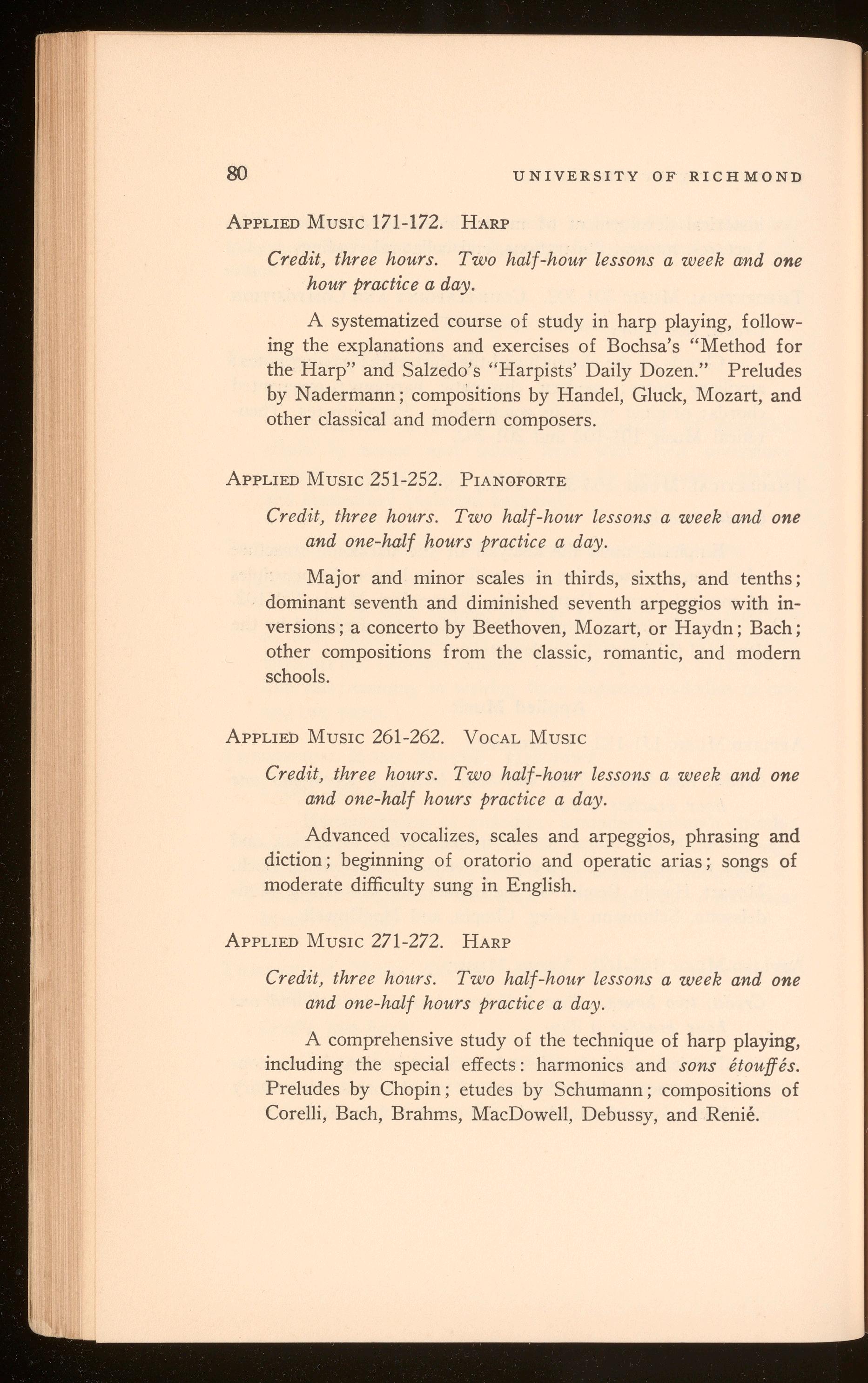
APPLIED Music 171-172. HARP
Credit, three hours. Two half-hour lessons a week and one hour practice a day.
A systematized course of study in harp playing, following the explanations and exercises of Bochsa's "Method for the Harp" and Salzedo's "Harpists' Daily Dozen." Preludes by Nadermann; compositions by Handel, Gluck, Mozart, and other classical and modern composers
APPLIED Music 251-252. PIANOFORTE
Credit, three hours. Two half-hour lessons a week and one and one-half hours practice a day.
Major and minor scales in thirds, sixths, and tenths; dominant seventh and diminished seventh arpeggios with inversions; a concerto by Beethoven, Mozart, or Haydn; Bach; other compositions from the classic, romantic, and modern schools.
APPLIED Music 261-262. VocAL Music
Credit, three hours. Two half-hour lessons a week and one and one-half hours practice a day.
Advanced vocalizes, scales and arpeggios, phrasing and diction; beginning of oratorio and operatic arias; songs of moderate difficulty sung in English.
APPLIED Music 271-272. HARP
Credit, three hours. Two half-hour lessons a week and one and one-half hours practice a day.
A comprehensive study of the technique of harp playing, including the special effects: harmonics and sons etouffes. Preludes by Chopin; etudes by Schumann; compositions of Corelli, Bach, Brahms, MacDowell, Debussy, and Renie.
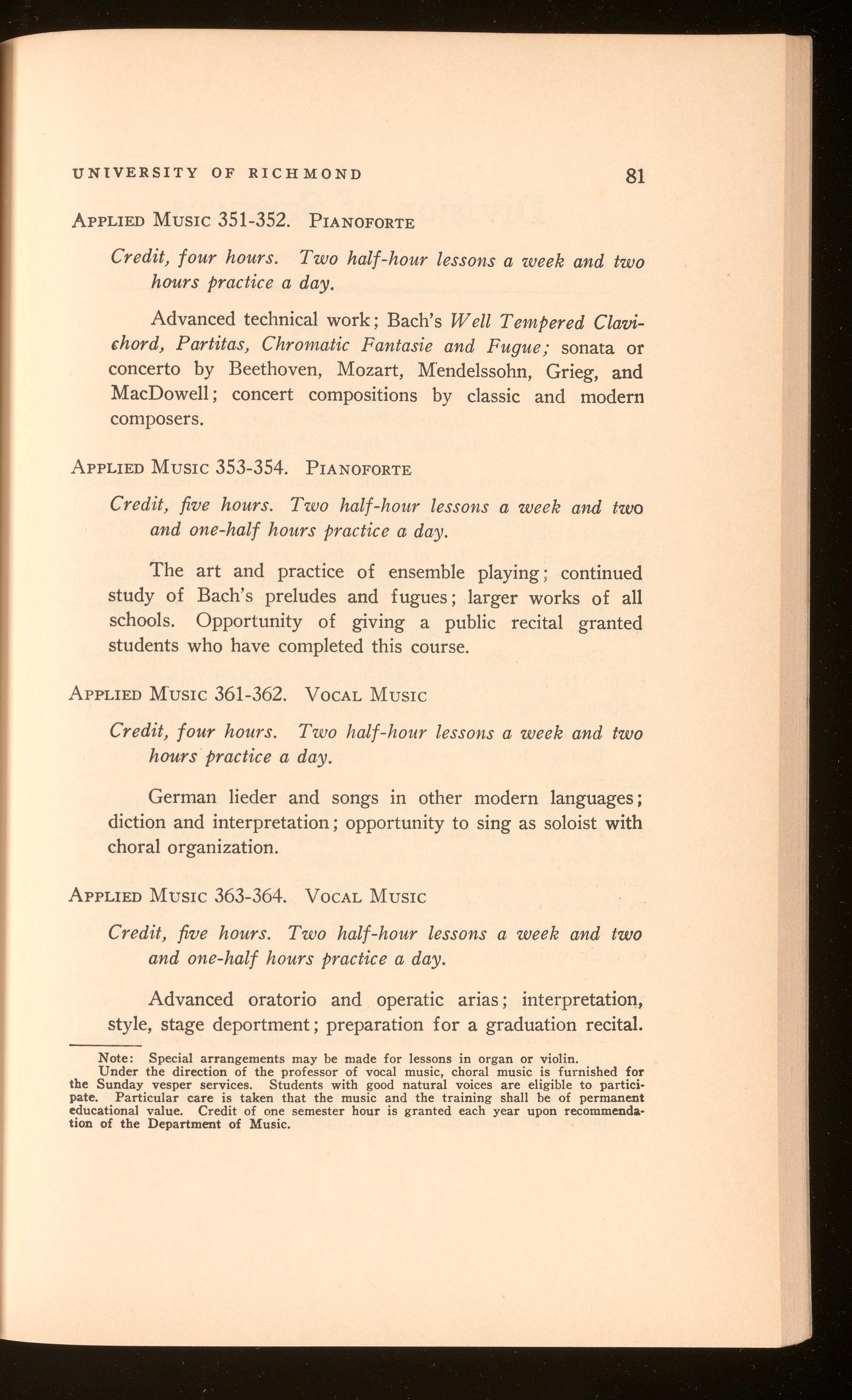
UNIVERSITY OF RICH MONO 81
APPLIED Music 351-352. PIANOFORTE
Credit, four hours. Two half-hour lessons a week and two hours practice a day.
Advanced technical work; Bach's Well Tempered Clavirhord, Partitas, Chromatic Fantasie and Fugue; sonata or concerto by Beethoven, Mozart, M·endelssohn, Grieg, and MacDowell ; concert compositions by classic and modern composers.
APPLIED MUSIC 353-354. PIANOFORTE
Credit, five hours. Two half-hour lessons a week and two and one-half hours practice a day.
The art and practice of ensemble playing ; continued study of Bach's preludes and fugues; larger works of all schools. Opportunity of giving a public recital granted students who have completed this course.
APPLIED Music 361-362. VocAL Music
Credit, four hours. Two half-hour lessons a week and two hours practice a day.
German lieder and songs in other modern languages ; diction and interpretation ; opportunity to sing as soloist with choral organization.
APPLIED MUSIC 363-364. VOCAL MUSIC
Credit, five hours. Two half-hour lessons a week and two and one-half hours practice a day.
Advanced oratorio and operatic arias ; interpretation, style, stage deportment; preparation for a graduation recital.
Note: Special arrangements may be made for lessons in organ or violin. Under the direction of the professor of vocal music, choral music is furnished for the Sunday vesper services. Students with good natural voices are eligible to participate. Particular care is taken that the music and the training shall be of permanent educational value. Credit of one semester hour is granted each year upon recommcnda• tion of the Department of Music.
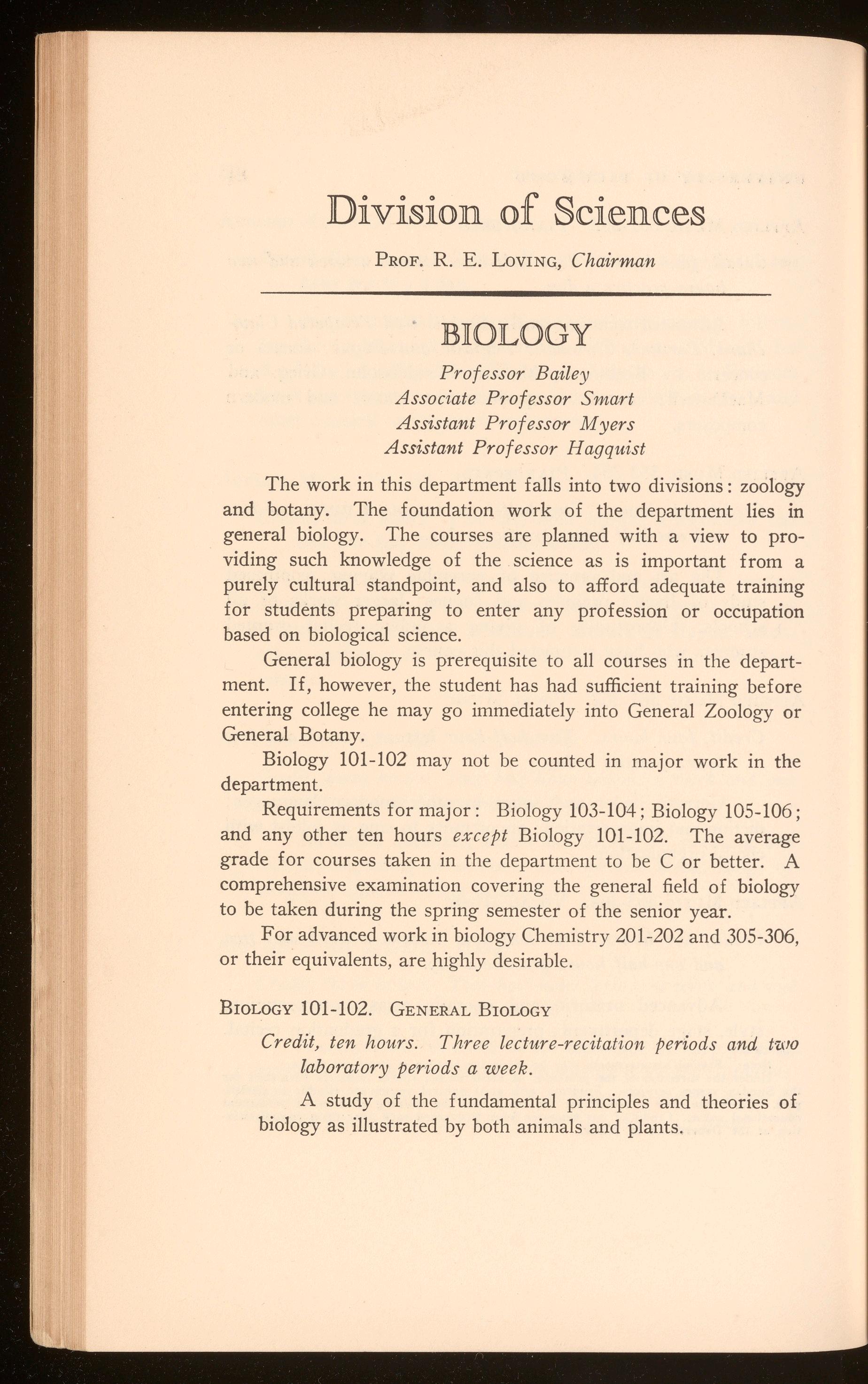
PROF. R. E. LOVING, Chairman
Professor Bailey
Associate Professor Smart
Assistant Professor Myers
Assistant Professor H agquist
The work in this department falls into two divisions : zoology and botany. The foundation work of the department lies in general biology. The courses are planned with a view to providing such knowledge of the science as is important from a purely cultural standpoint, and also to afford adequate training for students preparing to enter any profession or occupation based on biological science.
General biology is prerequisite to all courses in the department. If, however, the student has had sufficient training before entering college he may go immediately into General Zoology or General Botany.
Biology 101-102 may not be counted in major work in the department.
Requirements for major: Biology 103-104; Biology 105-106; and any other ten hours except Biology 101-102. The average grade for courses taken in the department to be C or better. A comprehensive examination covering the general field of biology to be taken during the spring semester of the senior year.
For advanced work in biology Chemistry 201-202 and 305-306, or their equivalents, are highly desirable.
BIOLOGY 101-102. GENERAL BIOLOGY
Credit, ten hours. Three lecture-recitation periods and t·,110 laboratory periods a week.
A study of the fundamental principles and theories of biology as illustrated by both animals and plants.
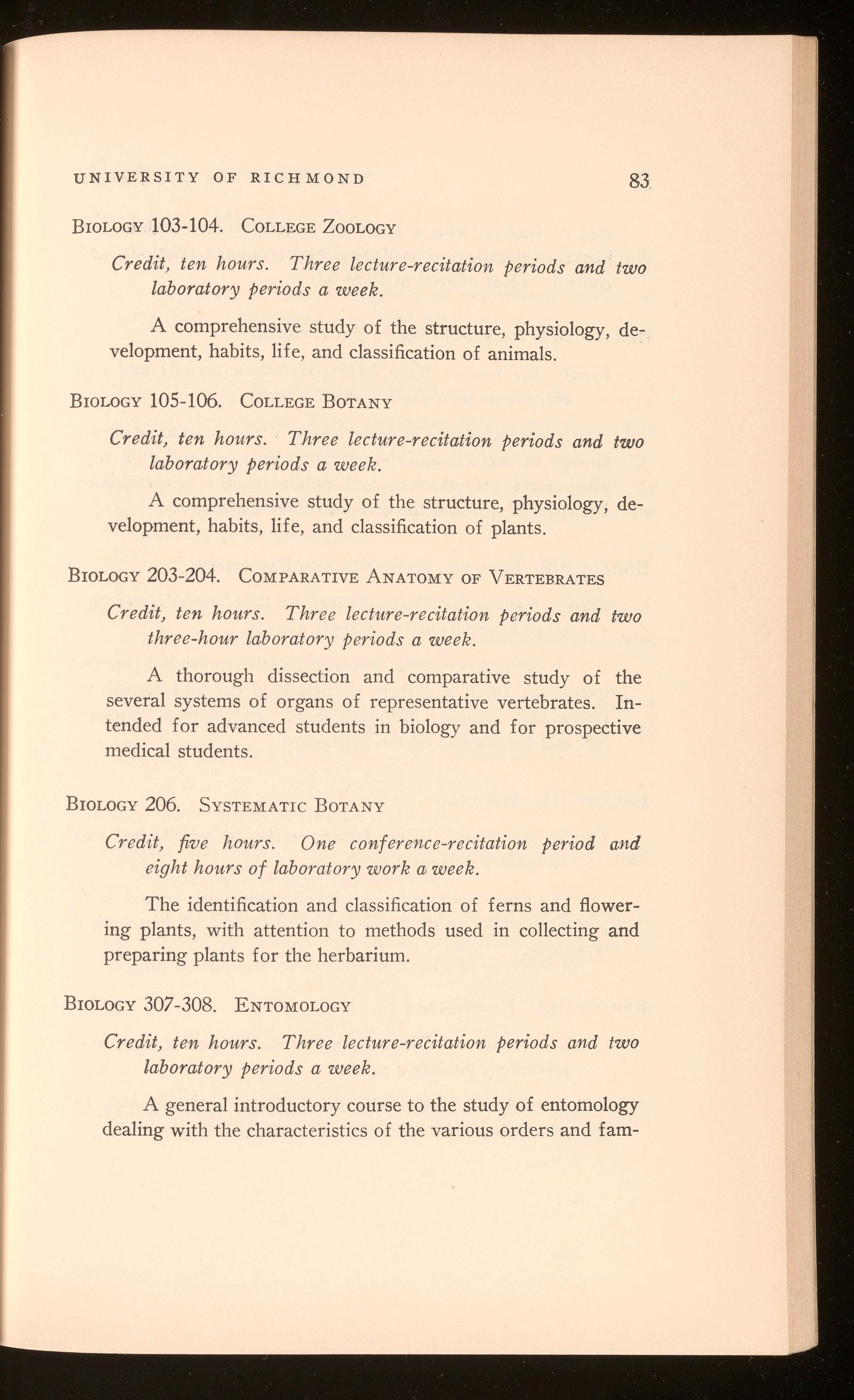
UNIVERSITY OF RICHMOND 83.
BIOLOGY l03-104. COLLEGE ZOOLOGY
Credit, ten hours. Three lecture-recitation periods and two laboratory periods a week.
A comprehensive study of the structure, physiology, development, habits, life, and classification of animals.
BIOLOGY 105-106. COLLEGE BOTANY
Credit, ten hours. Three lecture-recitation periods and two laboratory periods a week.
A comprehensive study of the structure, physiology, development, habits, life, and classification of plants.
BIOLOGY 203-204. COMPARATIVE ANATOMY OF VERTEBRATES
Credit, ten hours. Three lecture-recitation periods and two three-hour laboratory periods a week.
A thorough dissection and comparative study of the several systems of organs of representative vertebrates. Intended for advanced students in biology and for prospective medical students.
BIOLOGY 206. SYSTEMATIC BOTANY
Credit, five hours. One conference-recitation period and eight hours of laboratory work a week.
The identification and classification of ferns and flowering plants, with attention to methods used in collecting and preparing plants for the herbarium.
BIOLOGY 307-308. ENTOMOLOGY
Credit, ten hours. Three lecture-recitation periods and two laboratory periods a week.
A general introductory course to the study of entomology dealing with the characteristics of the various orders and fam-
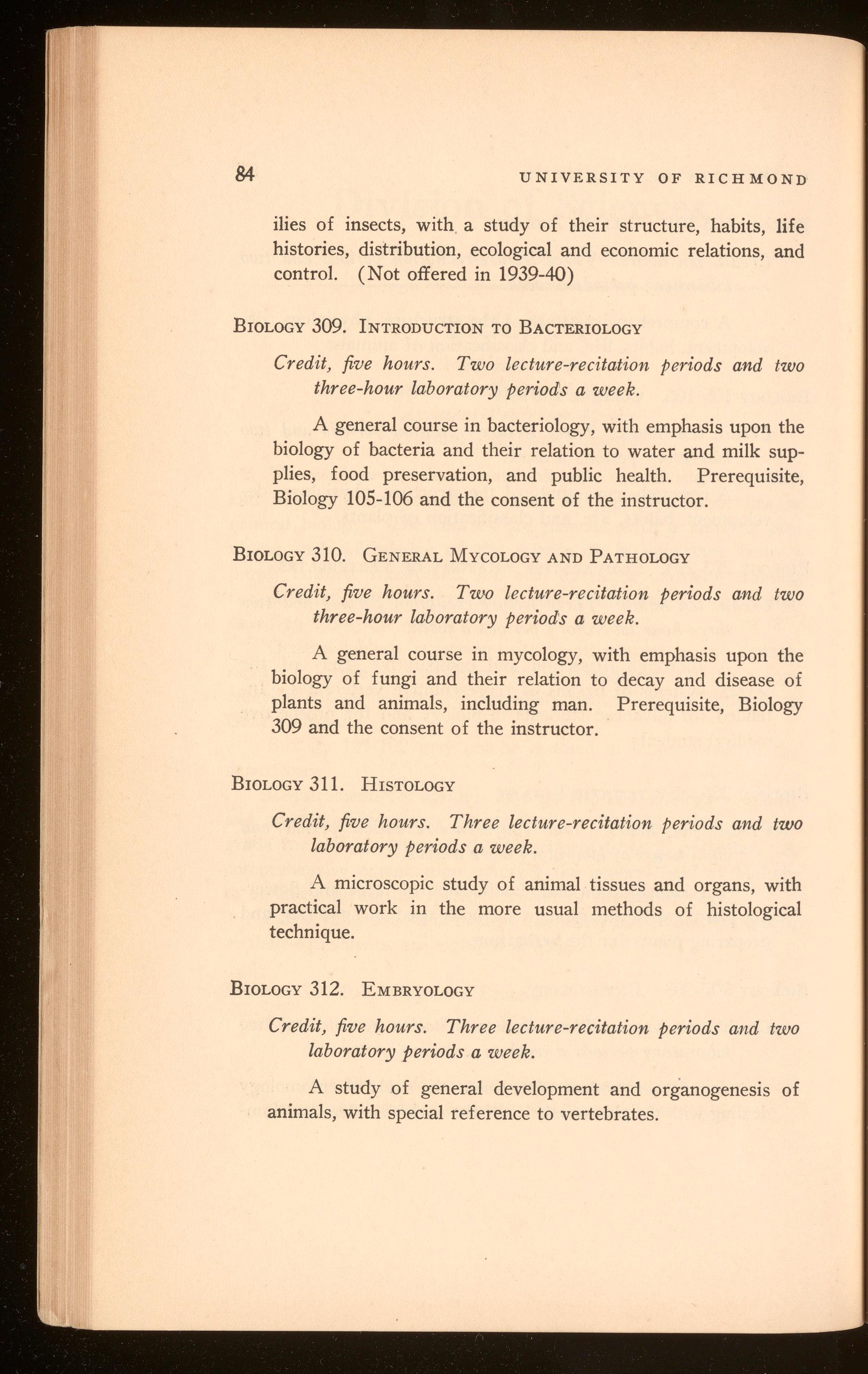
UNIVERSITY OF RICHMOND
ilies of insects, with . a study of their structure, habits, life histories, distribution, ecological and economic relations, and control. (Not offered in 1939-40)
BIOLOGY 309. INTRODUCTION TO BACTERIOLOGY
Credit, five hours. Two lecture-recitation periods and two three-hour laboratory periods a week.
A general course in bacteriology, with emphasis upon the biology of bacteria and their relation to water and milk supplies, food preservation, and public health. Prerequisite, Biology 105-106 and the consent of the instructor.
BIOLOGY 310. GENERAL MYCOLOGY AND PATHOLOGY
Credit, five hours. Two lecture-recitation periods and two three-hour laboratory periods a week.
A general course in mycology, with emphasis upon the biology of fungi and their relation to decay and disease of plants and animals, including man. Prerequisite, Biology 309 and the consent of the instructor.
BIOLOGY 311. HISTOLOGY
Credit, five hours. Three lecture-recitation periods and two laboratory periods a week.
A microscopic study of animal tissues and organs, with practical work in the more usual methods of histological technique.
BIOLOGY 312. EMBRYOLOGY
Credit, five hours. Three lecture-recitation periods and two laboratory periods a week.
A study of general development and organogenesis of animals, with special reference to vertebrates.
BIOLOGY 313. HISTORY OF BIOLOGY
Credit, three hours. Three lecture-recitation periods a week.
A survey of the development of the science and of its literature. (Not offered in 1939-40)
BIOLOGY 314. GENETICS AND EUGENICS
Credit, three hours. Three lecture-recitation periods a week.
A study of heredity in animals and plants, with emphasis upon the origin of new races and the applications of the principles of genetics to animal and plant breeding and the betterment of human society.
BIOLOGY 315. ANIMAL TAXONOMY AND ECOLOGY
Credit, five hours. One conference-recitation period and eight hours of laboratory work a w eek.
The identification and classification of animals, with a study of their habits, distribution, relative abundance, and the conservation of wild life. (Not offered in 1939-40)
BIOLOGY 316. AQUATIC BIOLOGY
Credit, five hours. One lecture-recitation period and eight hours of laboratory work a week.
A general study of aquatic life, including methods of collecting, preserving, and identifying micro-organisms of lakes, ponds, and streams. (Not offered in 1939-40)
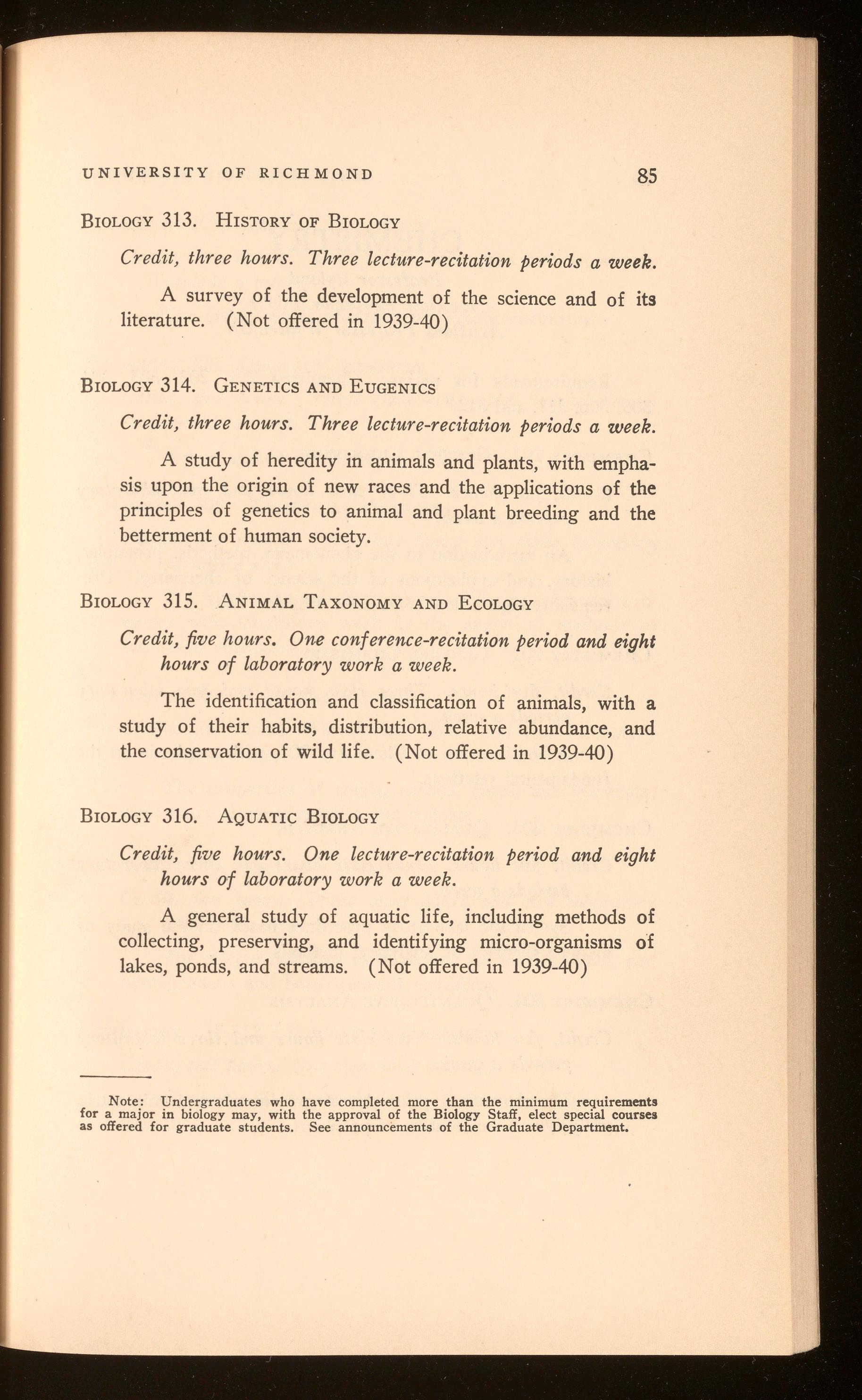
Note : Und er g raduates who have completed more than the minimum requirements for a major in biology may , with the approval of the Biology Staff, elect special courses as offered for graduate students See announ cements of the Graduate Department,
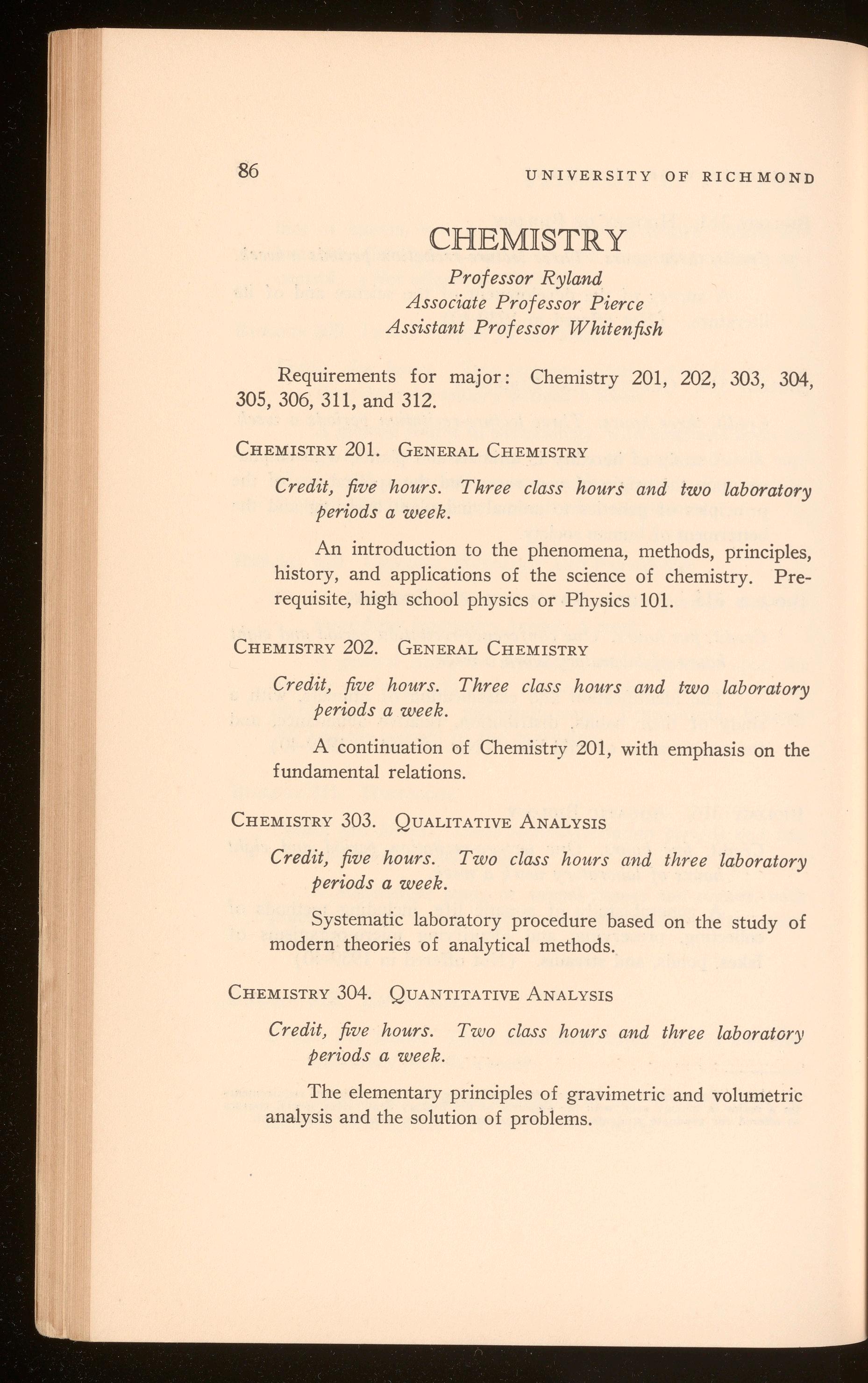
UNIVERSITY OF RICHMOND
Professor Ryland
Associate Professor Pierce
Assistant Professor Whitenfish
Requirements for major: Chemistry 201, 202, 303, 304, 305, 306, 311, and 312.
CHEMISTRY 201. GENERAL CHEMISTRY
Credit, five hours. Three class hours and two laboratory periods a week.
An introduction to the phenomena, methods, principles, history, and applications of the science of chemistry. Prerequisite, high school physics or Physics 101.
CHEMISTRY 202. GENERAL CHEMISTRY
Credit, five hours. Three class hours and two laboratory periods a week.
A continuation of Chemistry 201, with emphasis on the fundamental relations.
CHEMISTRY 303. QUALITATIVE ANALYSIS
Credit, five hours. Two class hours and three laboratory periods a week.
Systematic laboratory procedure based on the study of modern theories of analytical methods.
CHEMISTRY 304. QUANTITATIVE ANALYSIS
Credit, five hours. Two class hours and three laboratory periods a week.
The elementary principles of gravimetric and volumetric analysis and the solution of problems.
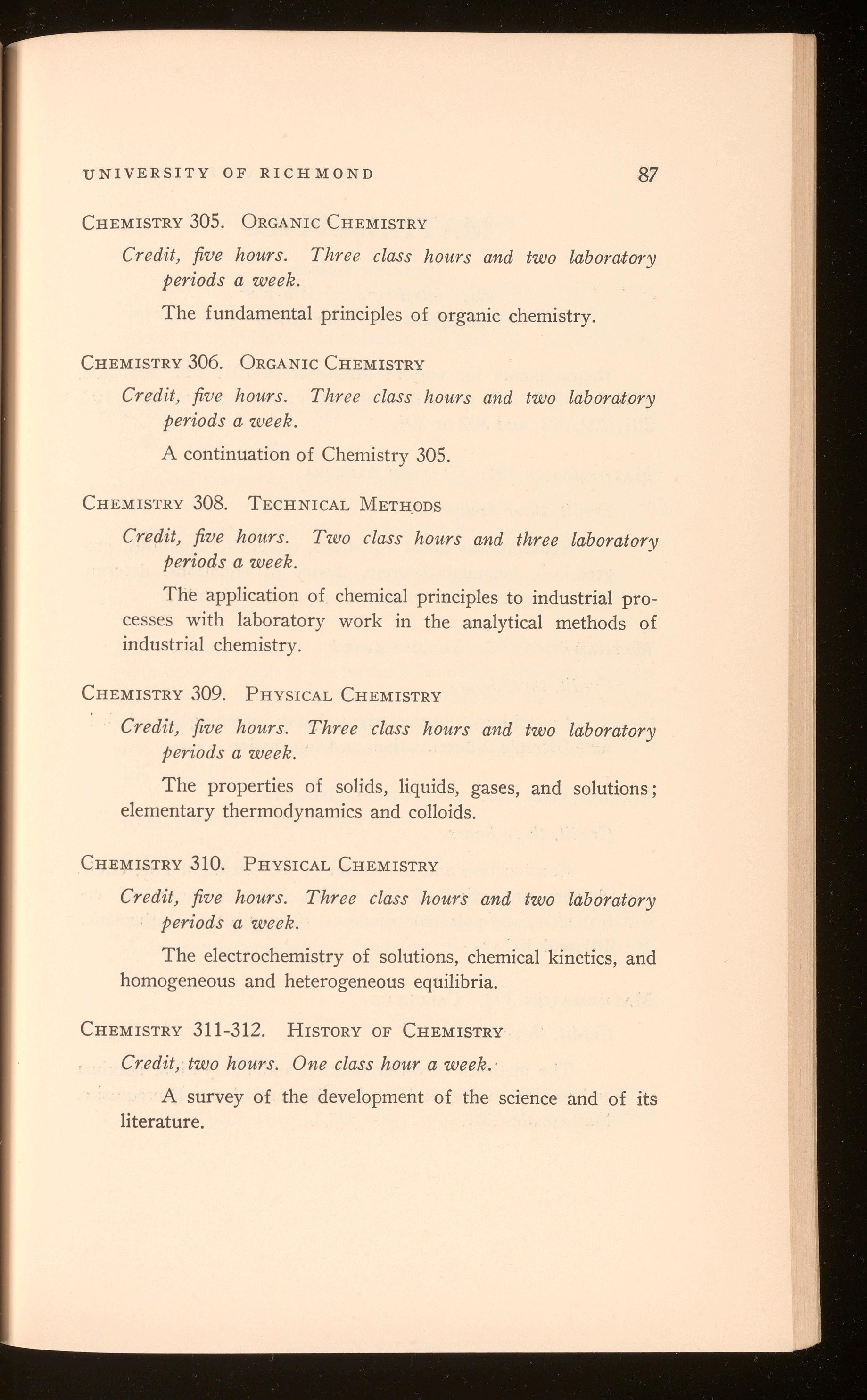
CHEMISTRY 305. ORGANIC CHEMISTRY
Credit, five hours. Three class hours and two laboratory periods a week.
The fundamental principles of organic chemistry.
CHEMISTRY 306 ORGANIC CHEMISTRY
Credit, five hours. Three class hours and two laboratory periods a week.
A continuation of Chemistry 305.
CHEMISTRY 308. TECHNICAL METH ODS
Credit, five hours. Two class hours and three laboratory periods a week.
The application of chemical principles to industrial processes with laboratory work in the analytical methods of industrial chemistry.
CHEMISTRY 309. PHYSICAL CHEMISTRY
Credit, five hours. Three class hours and two laboratory periods a week.
The properties of solids, liquids, gases, and solutions; elementary thermodynamics and colloids.
CHEMISTRY 310. PHYSICAL CHEMISTRY
Credit, five hours. Three class hours and two laboratory periods a week.
The electrochemistry of solutions, chemical kinetics, and homogeneous and heterogeneous equilibria.
CHEMISTRY 311-312. HISTORY OF CHEMISTRY
Credit, two hours. One class hour a week. ·
A survey of the development of the science and of its literature.
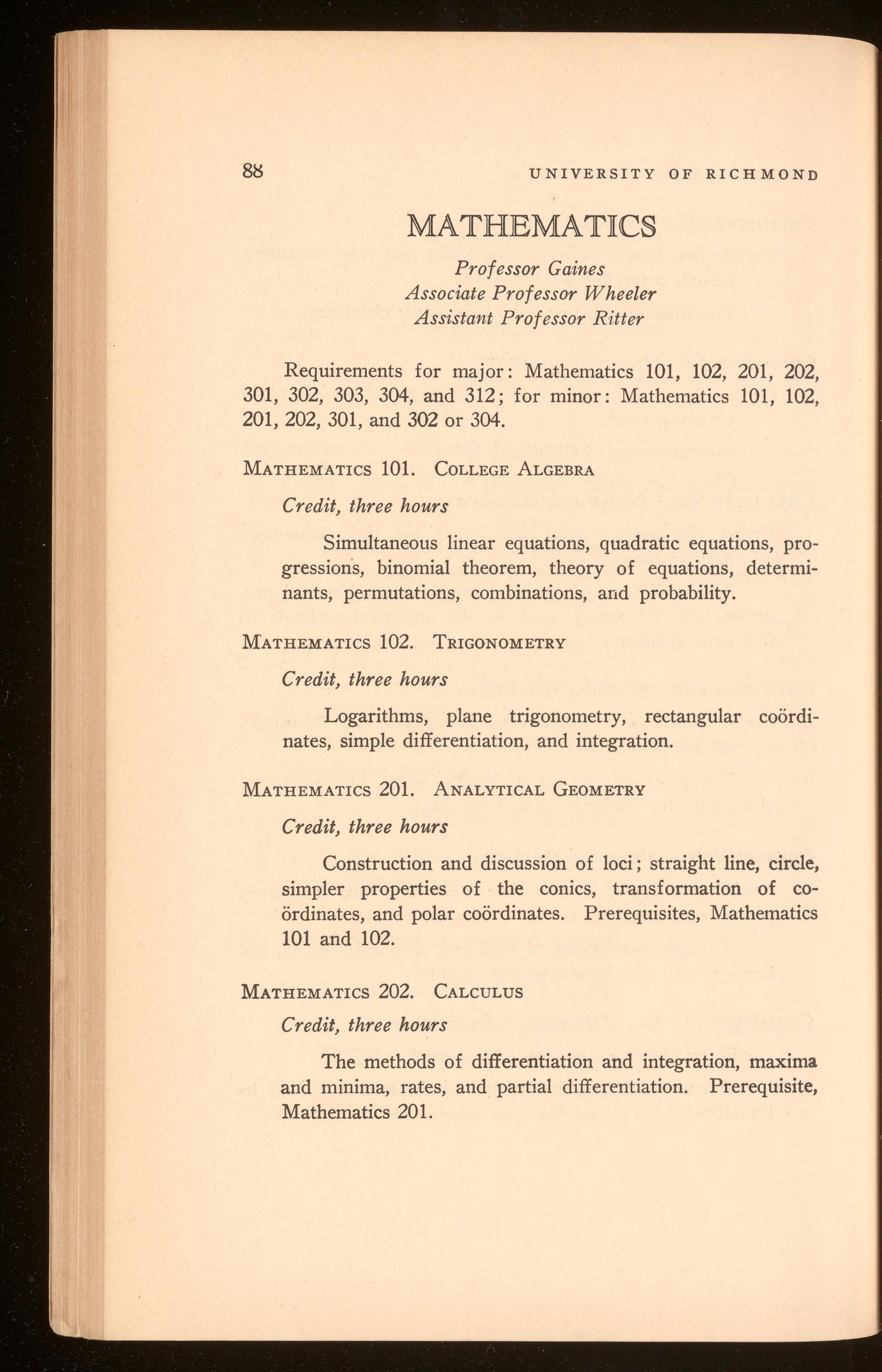
UNIVERSITY OF RICHMOND
Professor Gaines
Associate Professor Wheeler
Assistant Professor Ritter
Requirements for major: Mathematics 101, 102, 201, 202, 301, 302, 303, 304, and 312; for minor: Mathematics 101, 102, 201, 202, 301, and 302 or 304.
MATHEMATICS 101. COLLEGE ALGEBRA
Credit, three hours
Simultaneous linear equations, quadratic equations, progression ·s, binomial theorem, theory of equations, determinants, permutations, combinations, and probability.
MATHEMATICS 102. TRIGONOMETRY
Credit, three hours
Logarithms, plane trigonometry, rectangular coordinates, simple differentiation, and integration.
MATHEMATICS 201. ANALYTICAL GEOMETRY
Credit, three hours
Construction and discussion of loci; straight line, circle, simpler properties of the conics, transformation of coordinates, and polar coordinates. Prerequisites, Mathematics 101 and 102.
MATHEMATICS 202. CALCULUS
Credit, three hours
The methods of differentiation and integration, maxima and minima, rates, and partial differentiation. Prerequisite, Mathematics 201.
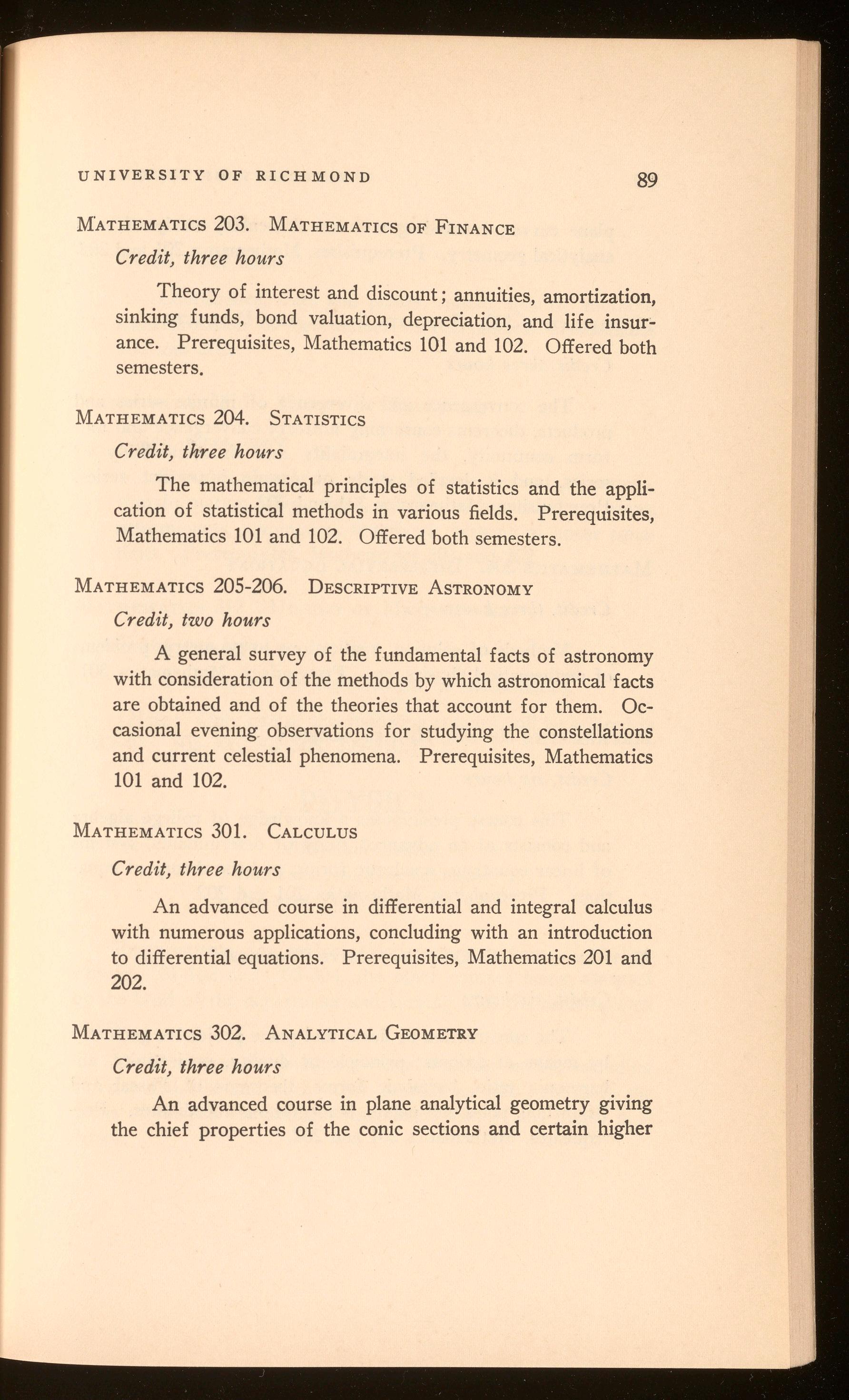
UNIVERSITY OF RICHMOND
MATHEMATICS 203. MATHEMATICS OF FINANCE
Credit, three hours
Theory of interest and discount; annuities, amortization, sinking funds, bond valuation, depreciation, and life insurance. Prerequisites, Mathematics 101 and 102. Offered both semesters.
MATHEMATICS 204. STATISTICS
Credit, three hours
The mathematical principles of statistics and the application of statistical methods in various fields. Prerequisites, Mathematics 101 and 102. Offered both semesters.
MATHEMATICS 205-206. DESCRIPTIVE ASTRONOMY
Credit, two hours
A general survey of the fundamental facts of astronomy with consideration of the methods by which astronomical facts are obtained and of the theories that account for them. Occasional evening observations for studying the constellations and current celestial phenomena. Prerequisites, Mathematics 101 and 102.
MATHEMATICS 301. CALCULUS
Credit, three hours
An advanced course in differential and integral calculus with numerous applications, concluding with an introduction to differential equations. Prerequisites, Mathematics 201 and 202.
MATHEMATICS 302. ANALYTICAL GEOMETRY
Credit, three hours
An advanced course in plane analytical geometry giving the chief properties of the conic sections and certain higher
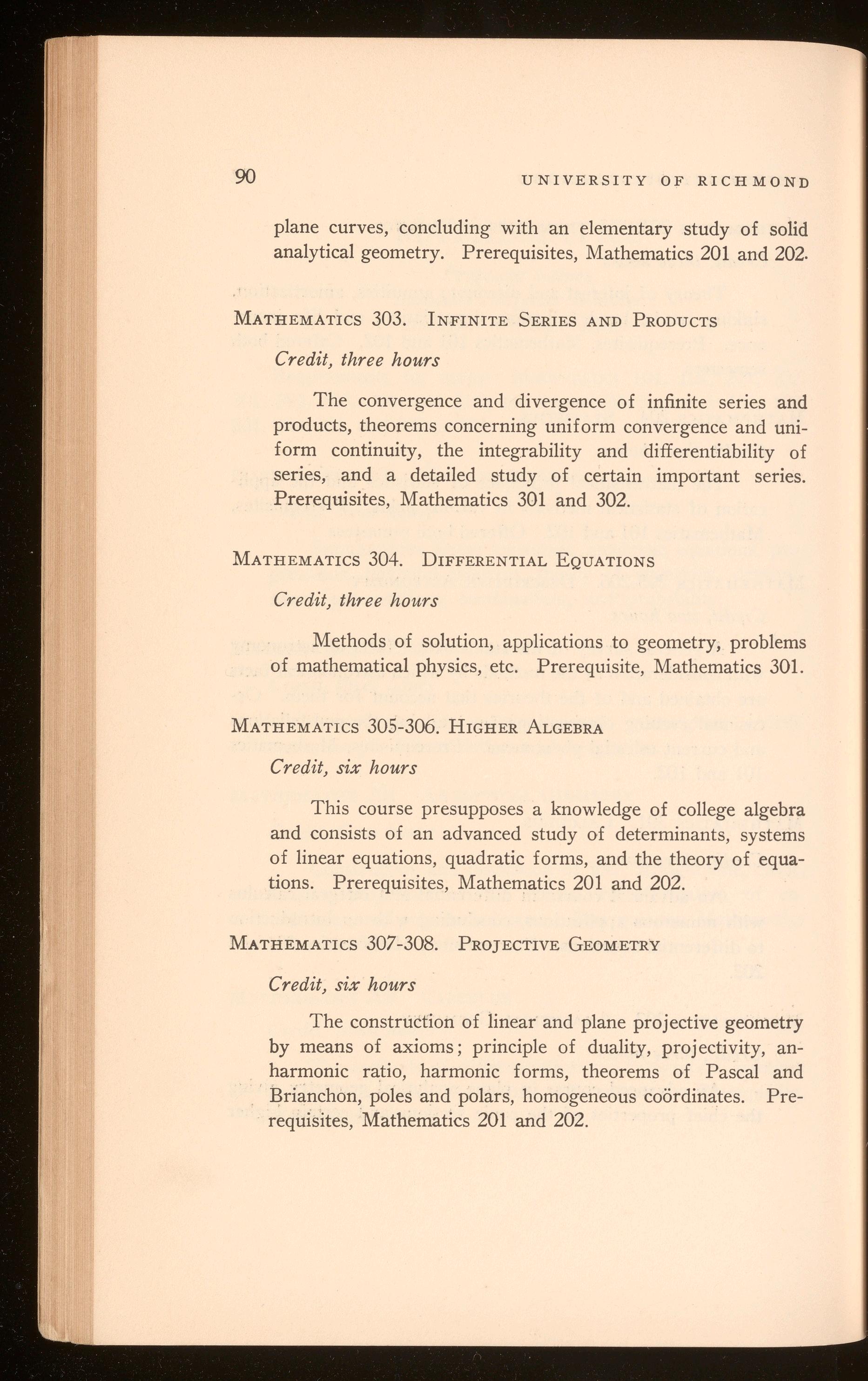
UNIVERSITY OF RICHMOND
plane curves, concluding with an elementary study of solid analytical geometry. Prerequisites, Mathematics 201 and 202.
MATHEMATICS 303. INFINITE SERIES AND PRODUCTS
Credit, three hours
The convergence and divergence of infinite series and products, theorems concerning uniform convergence and uniform continuity, the integrability and differentiability of series, and a detailed study of certain important series. Prerequisites, Mathematics 301 and 302.
MATHEMATICS 304. DIFFERENTIAL EQUATIONS
Credit, three hours
Methods of solution, applications to geometry, problems of mathematical physics, etc. Prerequisite, Mathematics 301.
MATHEMATICS 305-306. HIGHER ALGEBRA
Credit, six hours
This course presupposes a knowledge of college algebra and consists of an advanced study of determinants, systems of linear equations, quadratic forms, and the theory of equations. Prerequisites, Mathematics 201 and 202.
MATHEMATICS 307-308. PROJECTIVE GEOMETRY
Credit, six hours
The construction of linear and plane projective geometry by means of axioms; principle of duality, projectivity, anharmonic ratio, harmonic forms, theorems of Pascal and Brianchon, poles and polars, homogeneous coordinates. Prerequisites, Mathematics 201 and 202.
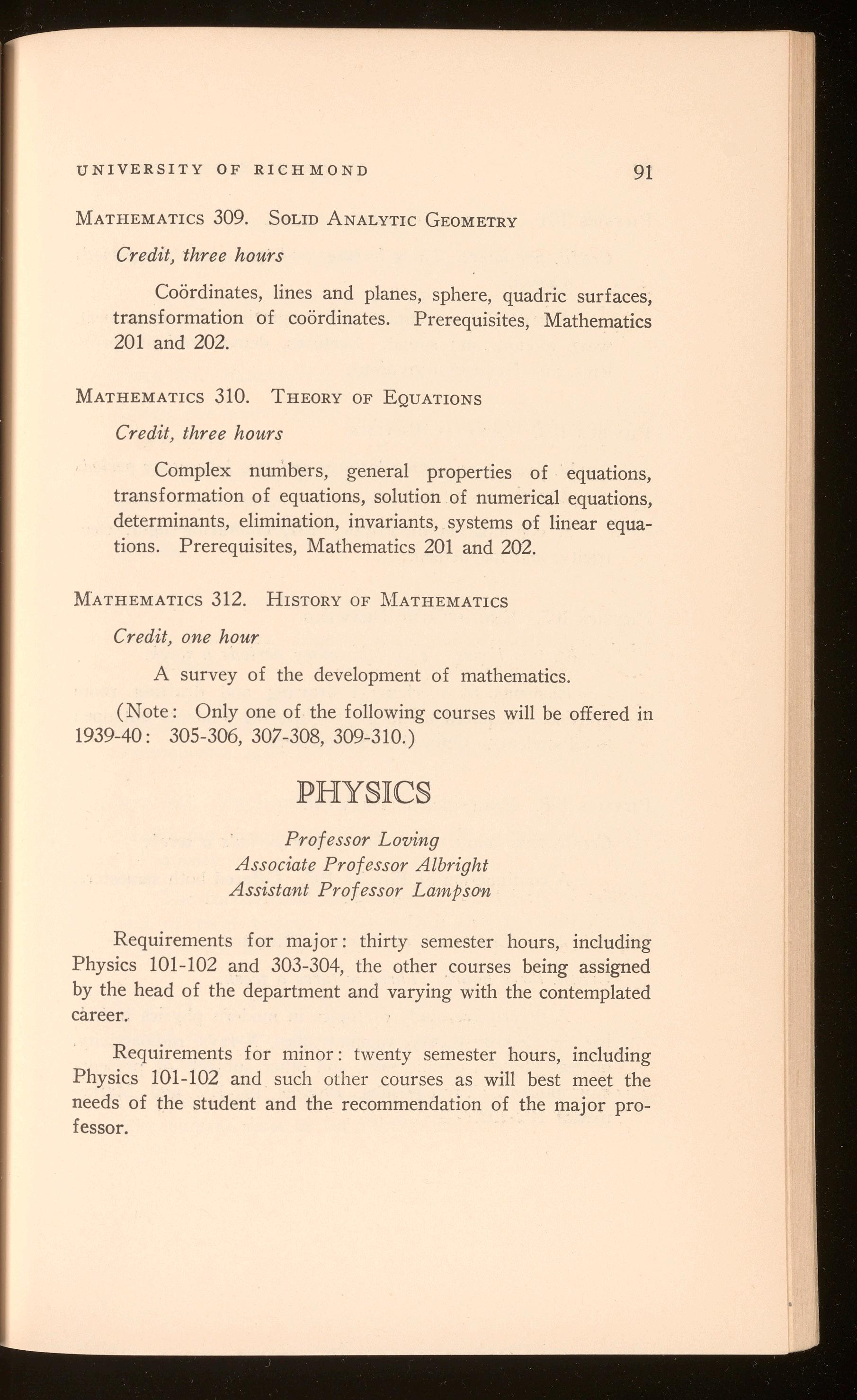
UNIVERSITY OF RICHMOND
MATHEMATICS 309. SOLID ANALYTIC GEOMETRY
Credit, three hours
Coordinates, lines and planes, sphere, quadric surfaces, transformation of coordinates. Prerequisites, Mathematics 201 and 202.
MATHEMATICS 310. THEORY OF EQUATIONS
Credit, three hours
Complex numbers, general properties of equations, transformation of equations, solution of numerical equations, determinants, elimination, invariants, systems of linear equations. Prerequisites, Mathematics 201 and 202
MATHEMATICS 312. HISTORY OF MATHEMATICS
Credit, one hour
A survey of the development of mathematics. (Note: Only one of the following courses will be offered in 1939-40: 305-306, 307-308, 309-310.)
Professor Loving Associate Professor Albright Assistant Professor Lampson
Requirements for major : thirty semester hours, including Physics 101-102 and 303-304, the other courses being assigned by the head of the department and varying with the contemplated career.
Reguirements for minor : twenty semester hours, including Physics 101-102 and such oth er courses as will best meet the needs of the student and the recommendation of the major professor.
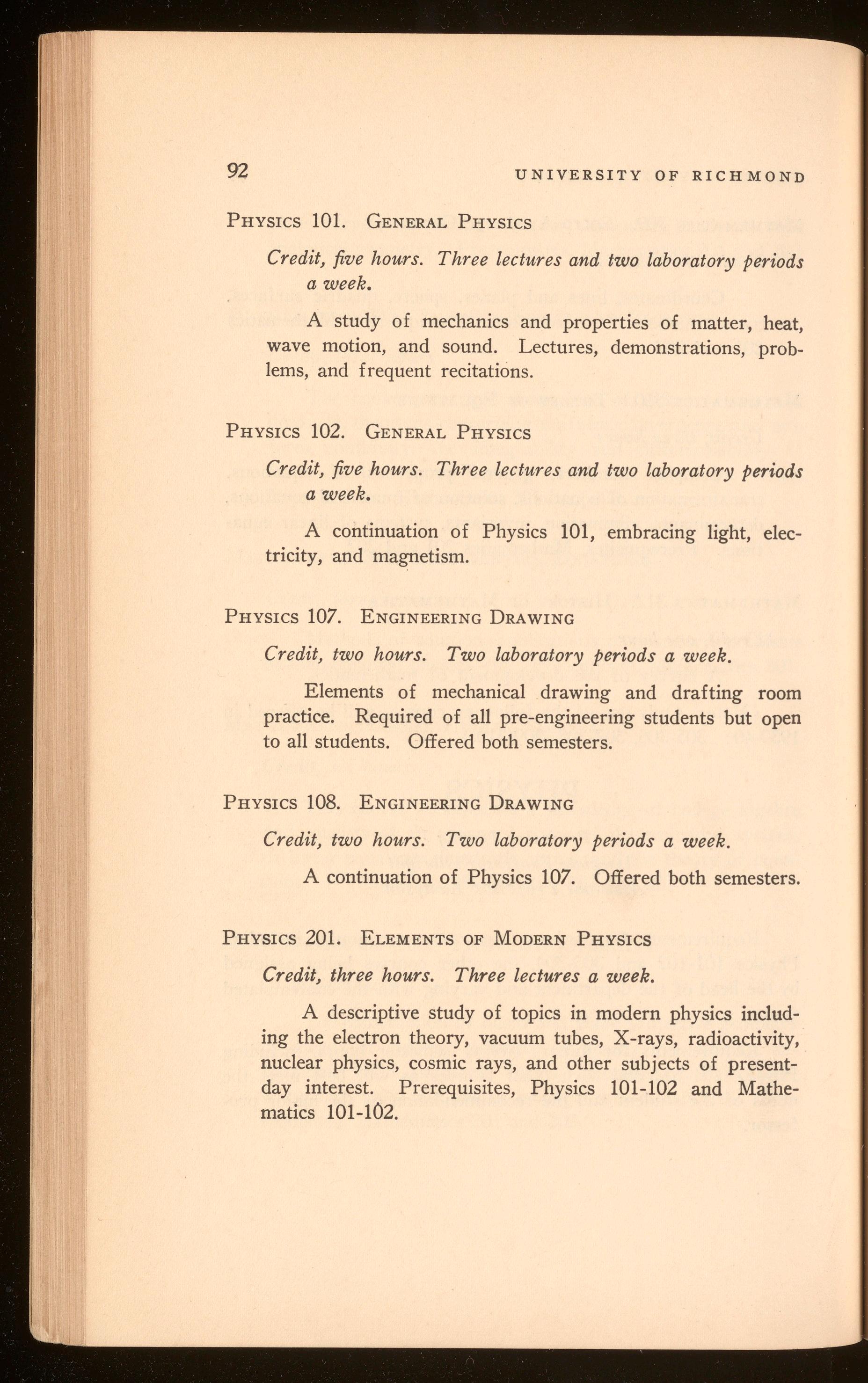
UNIVERSITY OF RICHMOND
PHYSICS 101. GENERAL PHYSICS
Credit, five hours. Three lectures and two laboratory periods a week.
A study of mechanics and properties of matter, heat, wave motion, and sound. Lectures, demonstrations, problems, and frequent recitations.
PHYSICS 102. GENERAL PHYSICS
Credit, five hours. Three lectures and two laboratory periods a week.
A continuation of Physics 101, embracing light, electricity, and magnetism.
PHYSICS 107. ENGINEERING DRAWING
Credit, two hours. Two laboratory periods a week. Elements of mechanical drawing and drafting room practice. Required of all pre-engineering students but open to all students. Offered both semesters.
PHYSICS 108. ENGINEERING DRAWING
Credit, two hours. Two laboratory periods a week. A continuation of Physics 107. Offered both semesters.
PHYSICS 201. ELEMENTS OF MODERN PHYSICS
Credit, three hours. Three lectures a week.
A descriptive study of topics in modern physics including the electron theory, vacuum tubes, X-rays, radioactivity, nuclear physics, cosmic rays, and other subjects of presentday interest. Prerequisites, Physics 101-102 and Mathematics 101-102.
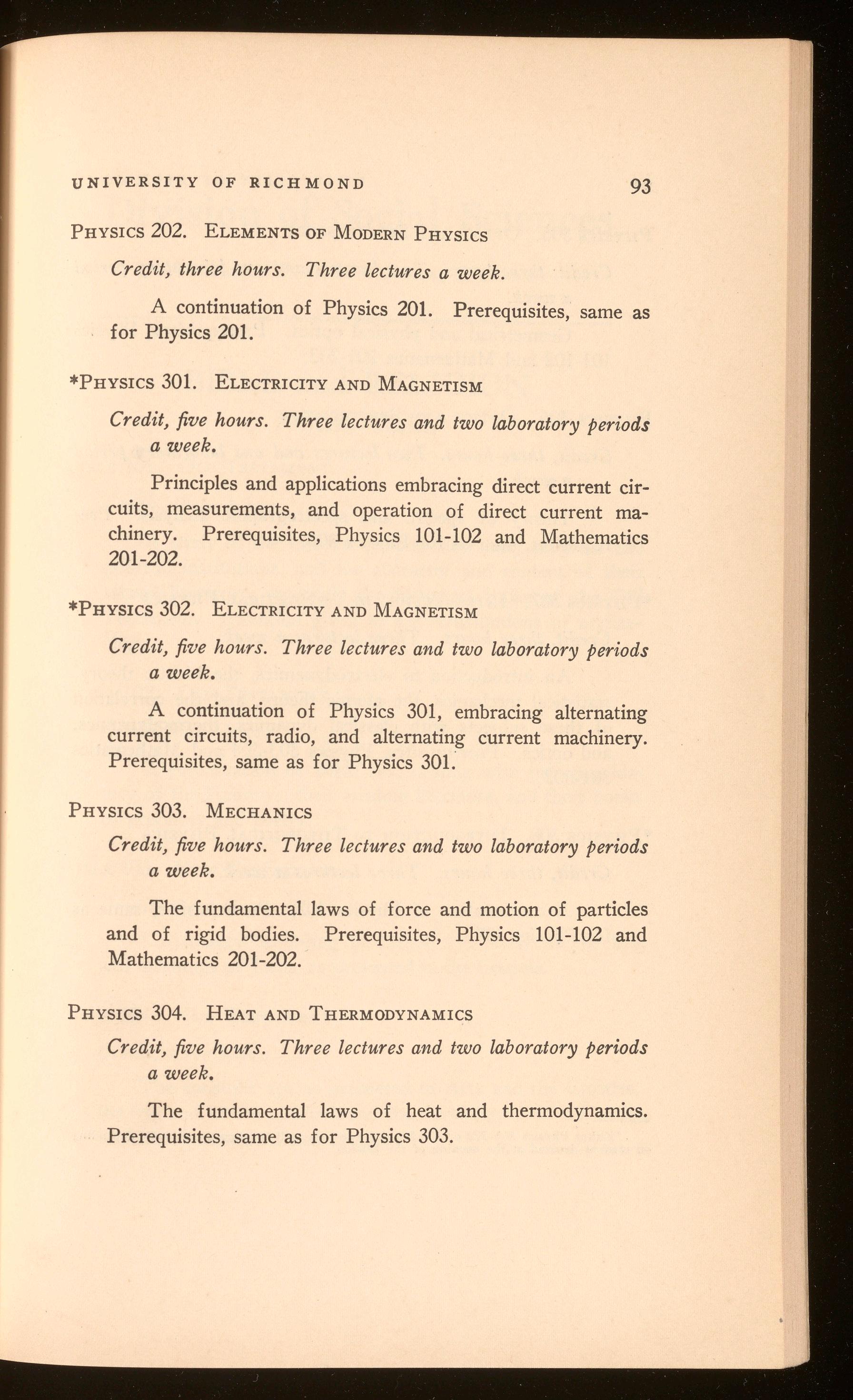
UNIVERSITY OF RICHMOND
PHYSICS 202. ELEMENTS OF MODERN PHYSICS
Credit, three hours. Three lectures a week.
A continuation of Physics 201. Prerequisites, same as for Physics 201.
*PHYSICS 301. ELECTRICITY AND MAGNETISM
Credit, five hours. Three lectures and two laboratory periods a week.
Principles and applications embracing direct current circuits, measurements, and operation of direct current machinery. Prerequisites, Physics 101-102 and Mathematics 201-202.
*PHYSICS 302. ELECTRICITY AND MAGNETISM
Credit, five hours. Three lectures and two laboratory periods a week.
A continuation of Physics 301, embracing alternating current circuits, radio, and alternating current machinery. Prerequisites, same as for Physics 301.
PHYSICS 303. MECHANICS
Credit, five hours. Three lectures and two laboratory periods a week.
The fundamental laws of force and motion of particles and of rigid bodies. Prerequisites, Physics 101-102 and Mathematics 201-202.
PHYSICS 304. HEAT AND THERMODYNAMICS
Credit, five hours. Three lectures and two laboratory periods a week.
The fundamental laws of heat and thermodynamics. Prerequisites, same as for Physics 303.
UNIVERSITY OF RICHMOJl,D
PHYSICS 305. OPTICS AND SPECTROSCOPY
Credit, three hours. Two lectures and one laboratory period a week.
Geometrical and physical optics. Prerequisites, Physics 101-102 and Mathematics 201-202.
PHYSICS 306. OPTICS AND SPECTROSCOPY
Credit, three hours. Two lectures and one laboratory period a week.
Theory of spectra and spectrographic analysis. Prerequisites, same as for Physics 305.
*PHYSICS 307. INTRODUCTION TO THEORETICAL PHYSICS
Credit, three hours. Three lectures a week.
An introduction to electrodynamics, the kinetic theory, statistical mechanics, the atomic theory, and the correlation of these subjects with classical dynamics, thermodynamics, and optics. Prerequisites, Physics 303-304 and Mathematics 301-302.
*PHYSICS 308. INTRODUCTION TO THEORETICAL PHYSICS
Credit, three hours. Three lectures a week.
A continuation of Physics 307. Prerequisites, same as for Physics 307.
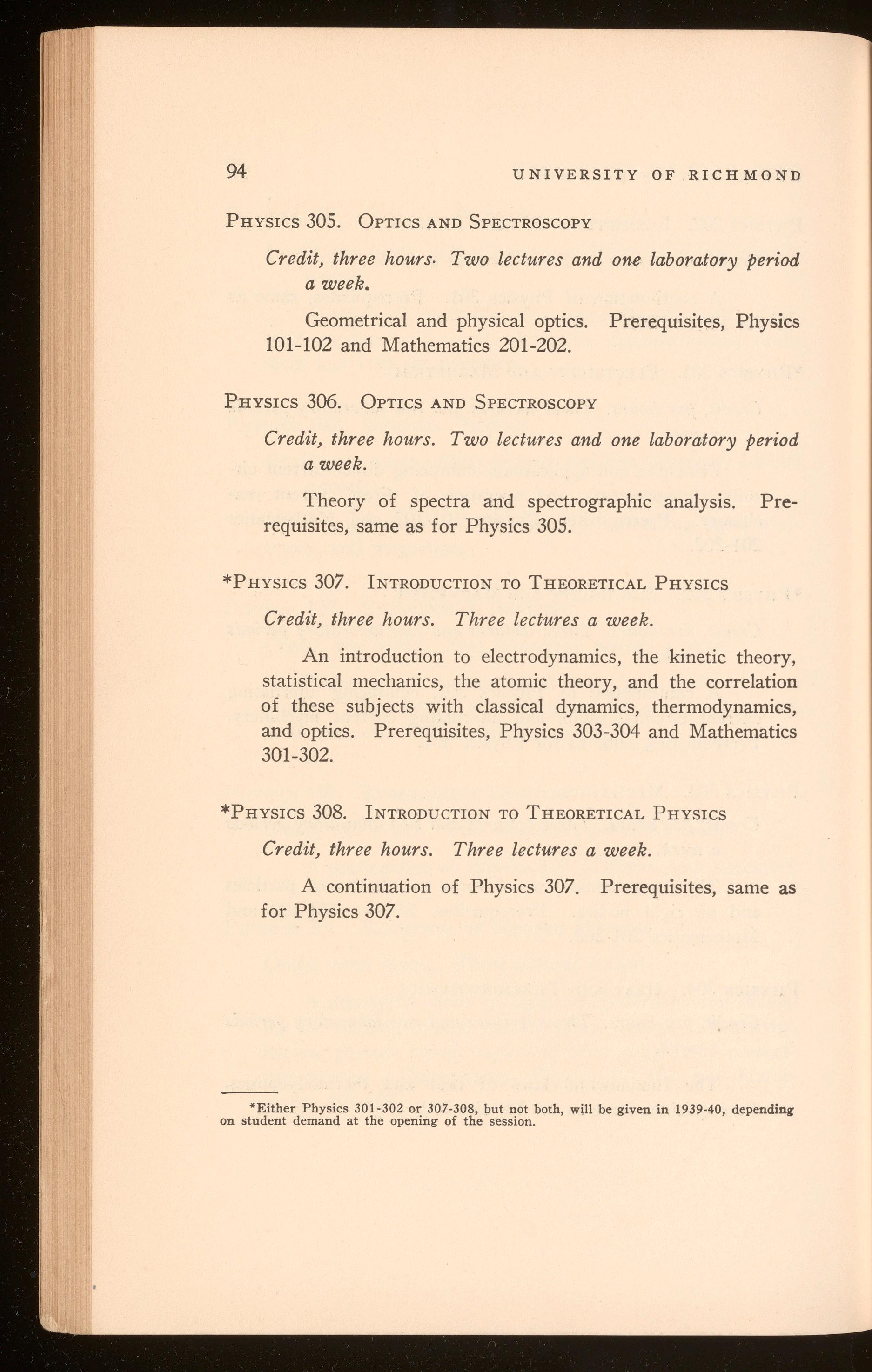
*Either Physics 301-302 or 307-308, but not both, will be given in 1939-40, depending on student demand at the opening of the session.
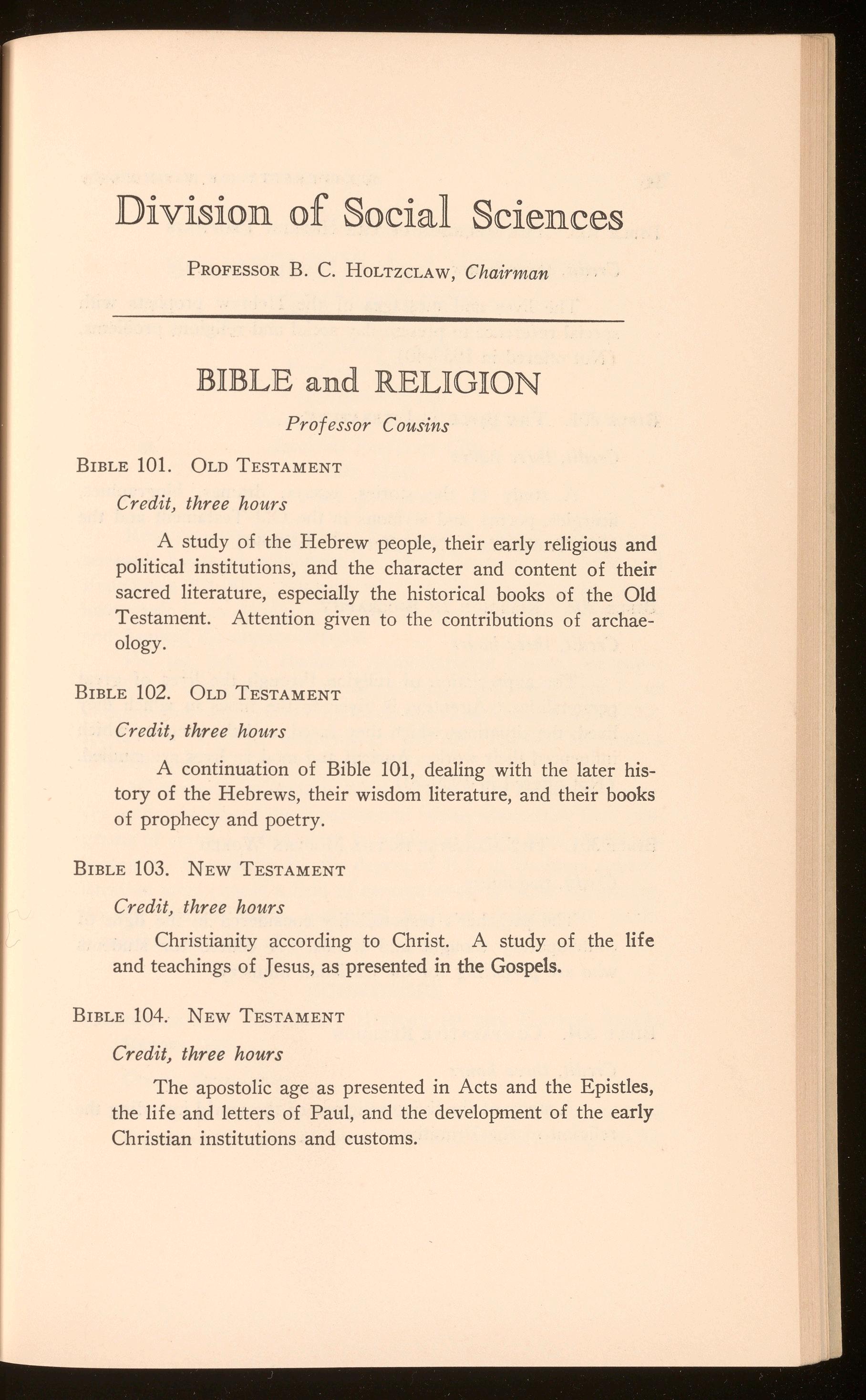
PROFESSOR B. C. HOLTZCLAW, Chairman
Professor Cousins
BIBLE 101. OLD TESTAMENT
Credit, three hours
A study of the Hebrew people, their early religious and political institutions, and the character and content of their sacred literature, especially the historical books of the Old Testament. Attention given to the contributions of archaeology.
BIBLE 102. OLD TESTAMENT
Credit, three hours
A continuation of Bible 101, dealing with the later history of the Hebrews, their wisdom literature, and their books of prophecy and poetry.
BIBLE 103. NEW TESTAMENT
Credit, three hours
Christianity according to Christ. A study of the life and teachings of Jesus, as. presented in the Gospels.
BIBLE 104. NEW TESTAMENT
Credit, three hours
The apostolic age as presented in Acts and the Epistles, the life and letters of Paul, and the development of the early Christian institutions and customs.
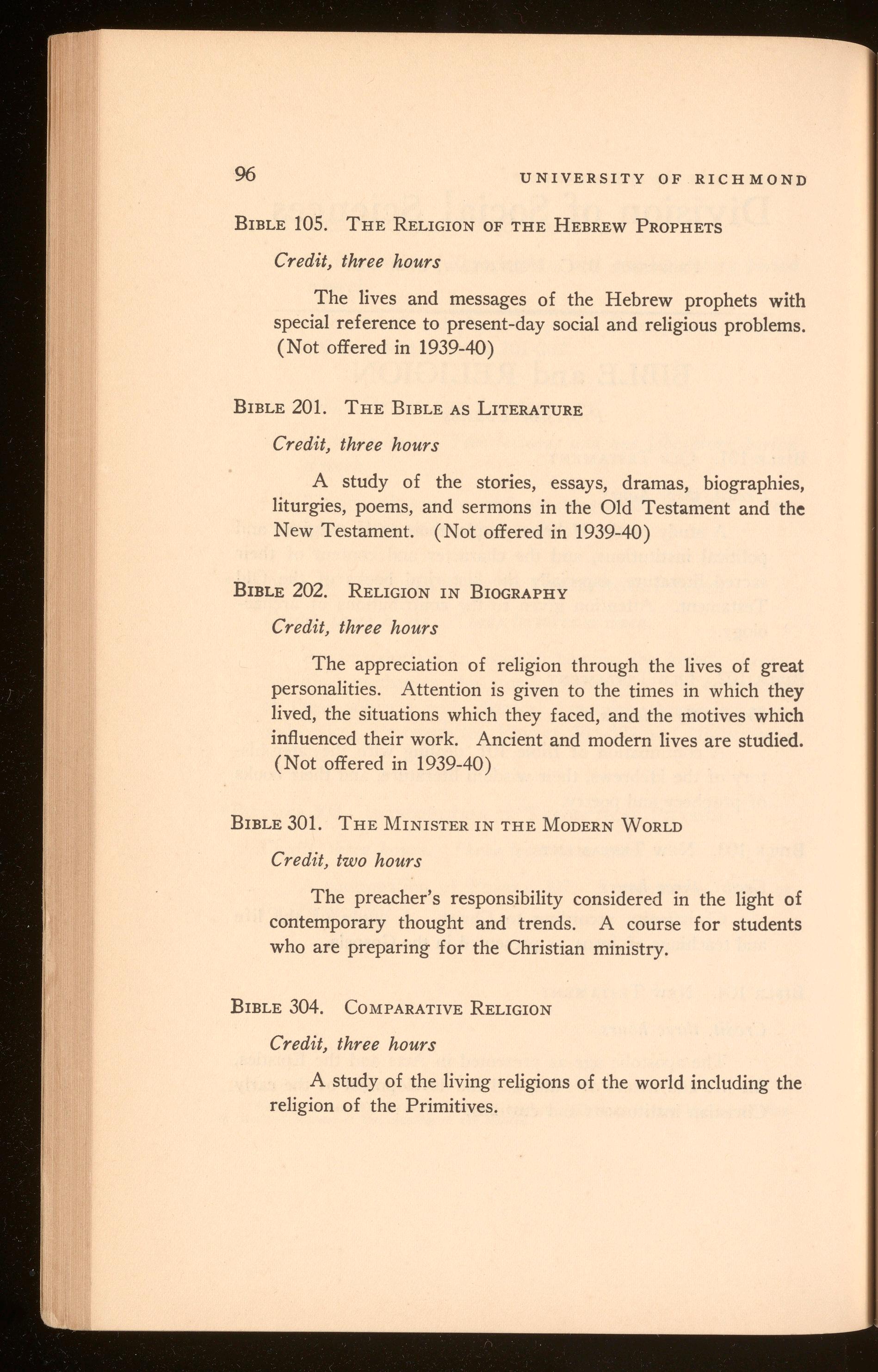
UNIVERSITY OF RICHMOND
BIBLE 105. THE RELIGION OF THE HEBREW PROPHETS
Credit, three hours
The lives and messages of the Hebrew prophets with special reference to present-day social and religious problems. (Not offered in 1939-40)
BIBLE 201. THE BIBLE AS LITERATURE
Credit, three hours
A study of the stories, essays, dramas, biographies, liturgies, poems, and sermons in the Old Testament and the New Testament. (Not offered in 1939-40)
BIBLE 202. RELIGION rn BIOGRAPHY
Credit, three hours
The appreciation of religion through the lives of great personalities. Attention is given to the times in which they lived, the situations which they faced, and the motives which influenced their work. Ancient and modern lives are studied. (Not offered in 1939-40)
BIBLE 301. THE MINISTER IN THE MODERN WORLD
Credit, two hours
The preacher's responsibility considered in the light of contemporary thought and trends. A course for students who are preparing for the Christian ministry.
BIBLE 304. COMPARATIVE RELIGION
Credit, three hours
A study of the living religions of the world including the religion of the Primitives.
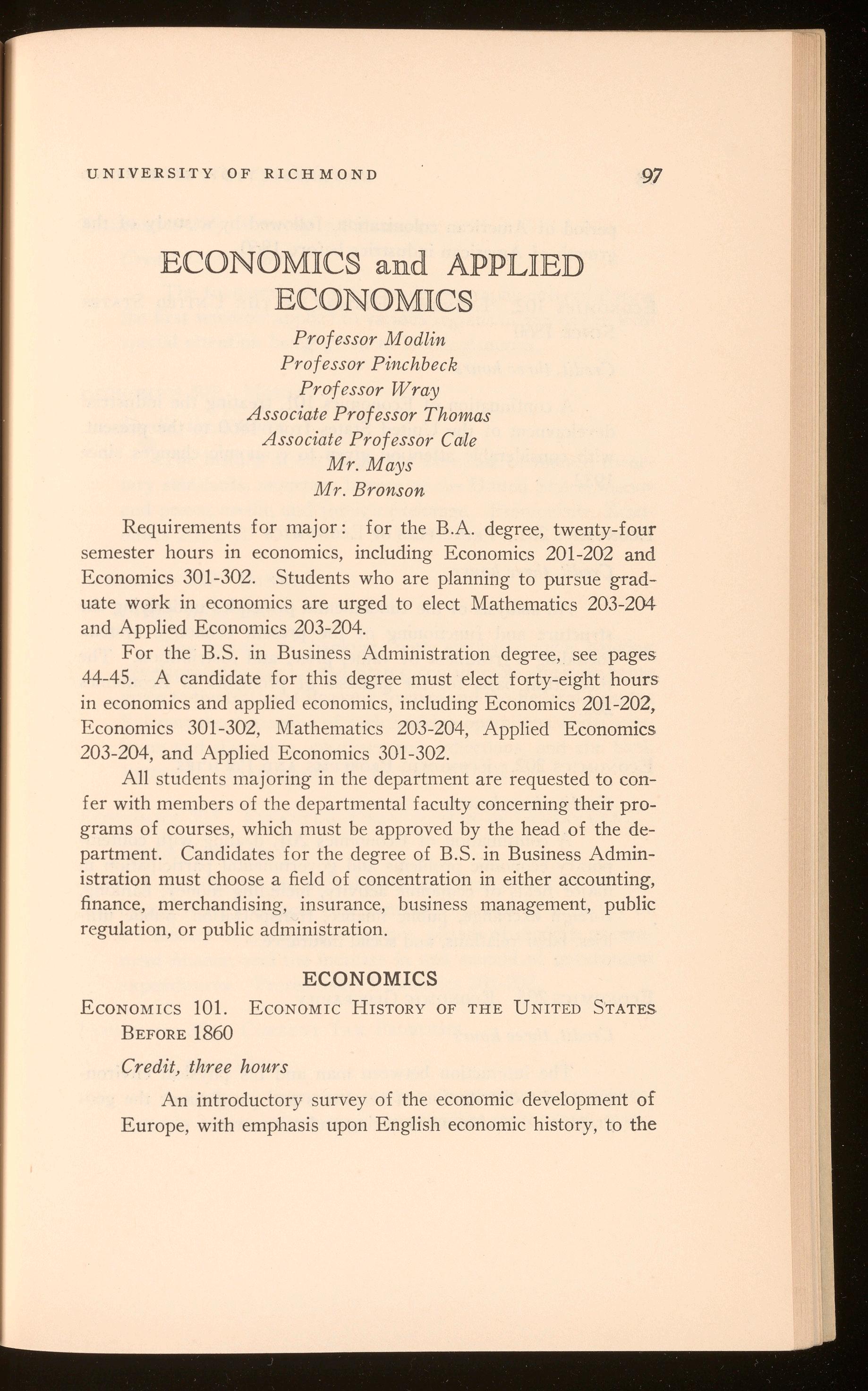
Professor Modlin
Professor Pinchbeck
Professor Wray
Associate Professor Thomas
Associate Professor Cale
Mr. Mays
Mr. Bronson
Requirements for major: for the B.A. degree, twenty-four semester hours in economics, including Economics 201-202 and Economics 301-302. Students who are planning to pursue graduate work in economics are urged to elect Mathematics 203-204and Applied Economics 203-204.
For the B.S. in Business Administration degree, see pages 44-45. A candidate for this degree must elect forty-eight hours in economics and applied economics, including Economics 201-202, Economics 301-302, Mathematics 203-204, Applied Economics 203-204, and Applied Economics 301-302.
All students majoring in the department are requested to confer with members of the departmental faculty concerning their programs of courses, which must be approved by the head of the department. Candidates for the degree of B.S. in Business Administration must choose a field of concentration in either accounting, finance, merchandising, insurance, business management, public regulation, or public administration.
ECONOMICS 101. ECONOMIC HISTORY OF THE UNITED STATES BEFORE 1860
Credit, three hours
An introductory survey of the economic development of Europe, with emphasis upon English economic history, to the
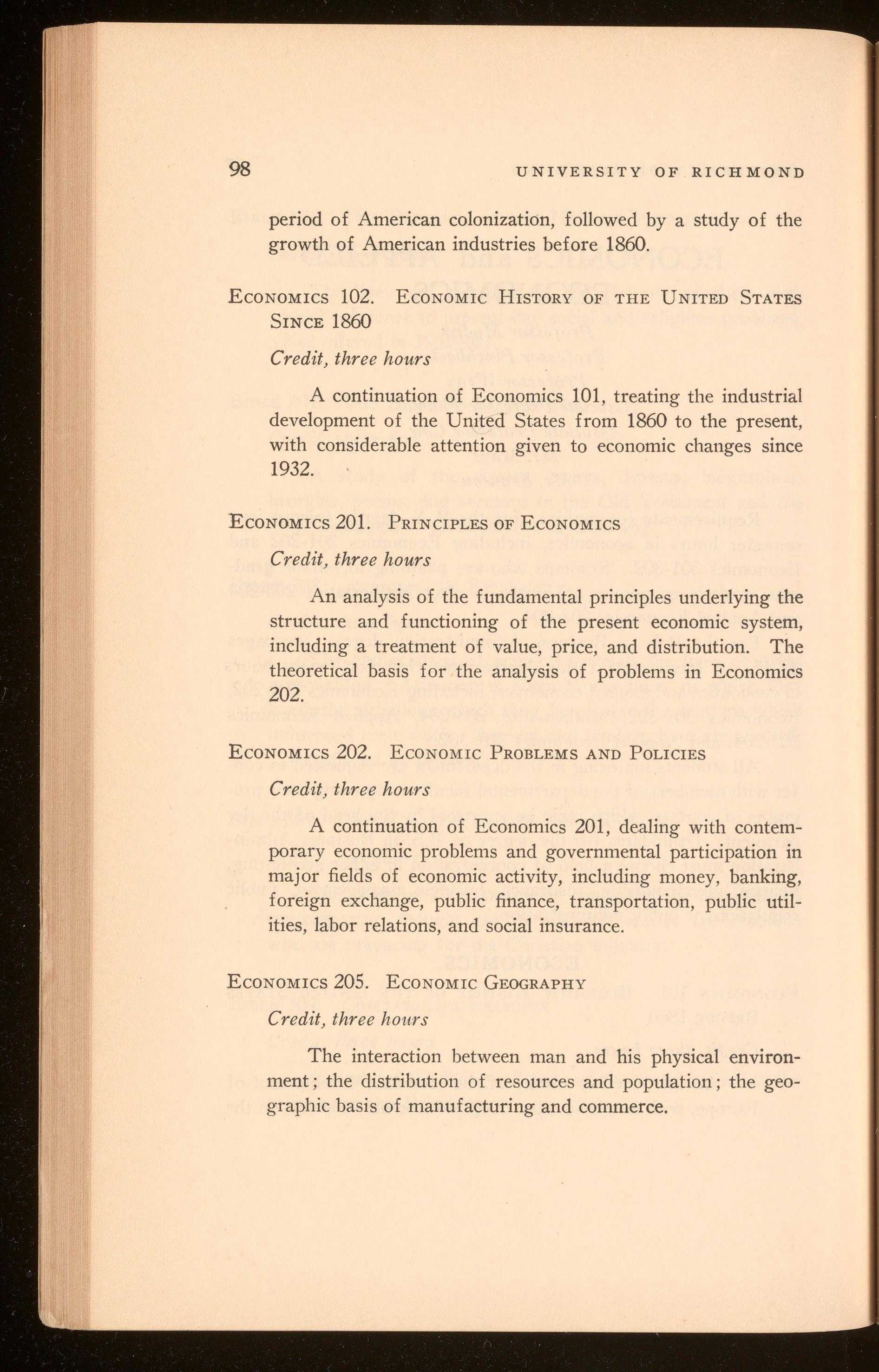
period of American colonization, followed by a study of the growth of American industries before 1860.
ECONOMICS102. ECONOMIC HISTORY OF THE UNITED STATES SINCE 1860
Credit, three hours
A continuation of Economics 101, treating the industrial development of the United States from 1860 to the present, with considerable attention given to economic changes since 1932.
Credit , three hours
An analysis of the fundamental principles underlying the structure and functioning of the present economic system, including a treatment of value, price, and distribution. The theoretical basis for the analysis of problems in Economics 202.
EcoNOMics 202. EcoNOMIC PROBLEMSAND POLICIES
Credit, three hours
A continuation of Economics 201, dealing with contemporary economic problems and governmental participation in major fields of economic activity, including money, banking, foreign exchange, public finance, transportation, public utilities, labor relations, and social insurance.
ECONOMICS205. ECONOMICGEOGRAPHY
Credit, three hours
The interaction between man and his physical environment; the distribution of resources and population; the geographic basis of manufacturing and commerce.
UNIVERSITY OF RICHMOND
ECONOMICS 206. ECONOMIC GEOGRAPHY
Credit, three hours
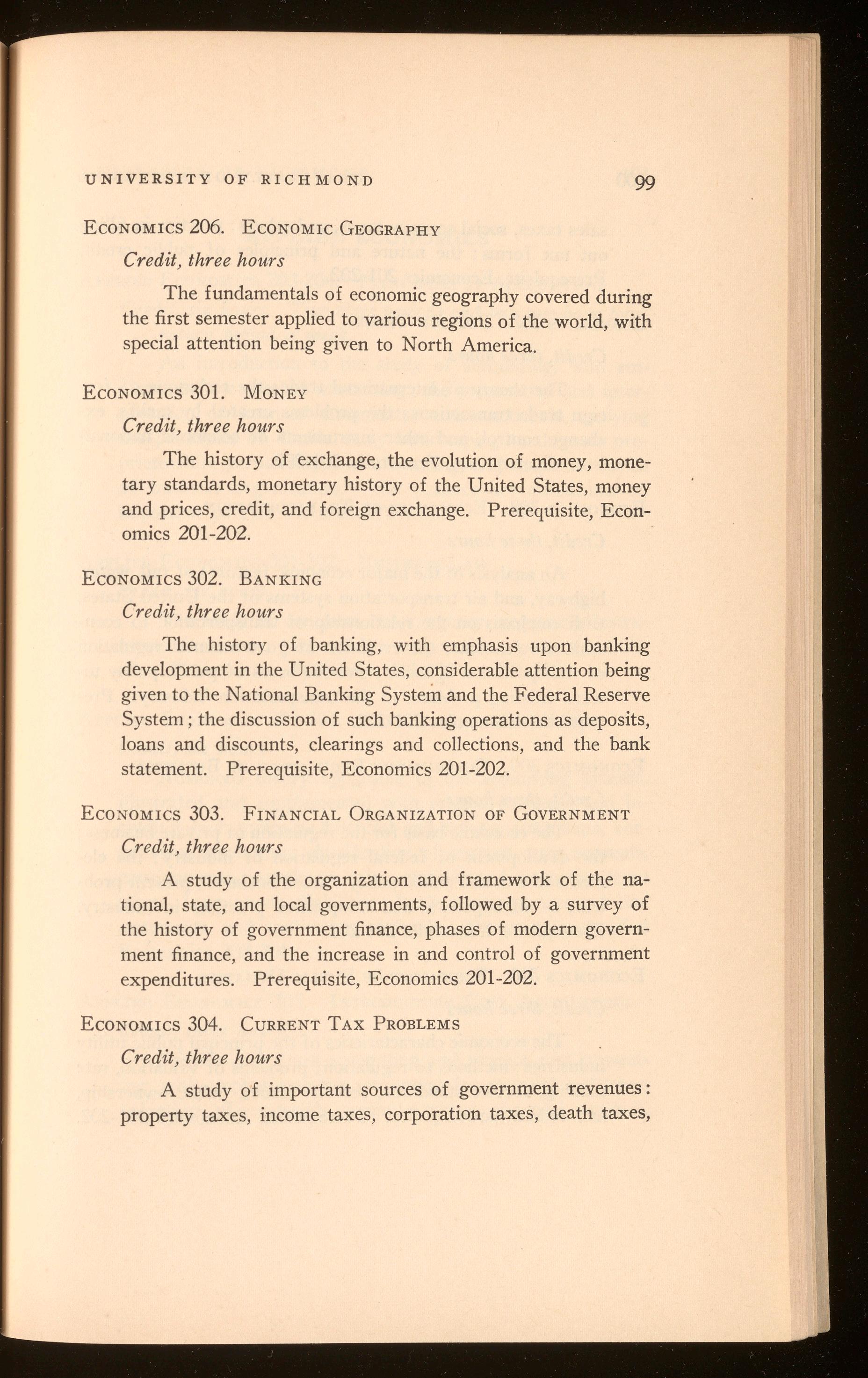
99
The fundamentals of economic geography covered during the first semester applied to various regions of the world, with special attention being given to North America.
EcoNoM1cs 301. MONEY
Credit, three hours
The history of exchange, the evolution of money, monetary standards, monetary history of the United States, money and prices, credit, and foreign exchange. Prerequisite, Economics 201-202.
EcoNoM1cs 302. BANKING
Credit, three hours
The history of banking, with emphasis upon banking development in the United States, considerable attention being given to the National Banking System and the Federal Reserve System; the discussion of such banking operations as deposits, loans and discounts, clearings and collections, and the bank statement. Prerequisite, Economics 201-202.
ECONOMICS 303. FINANCIAL ORGANIZATION OF GOVERNMENT
Credit, three hours
A study of the organization and framework of the national, state, and local governments, followed by a survey of the history of government finance, phases of modern government finance, and the increase in and control of government expenditures. Prerequisite, Economics 201-202.
ECONOMICS 304. CURRENT TAX PROBLEMS
Credit, three hours
A study of important sources of government revenues : property taxes, income taxes, corporation taxes, death taxes,
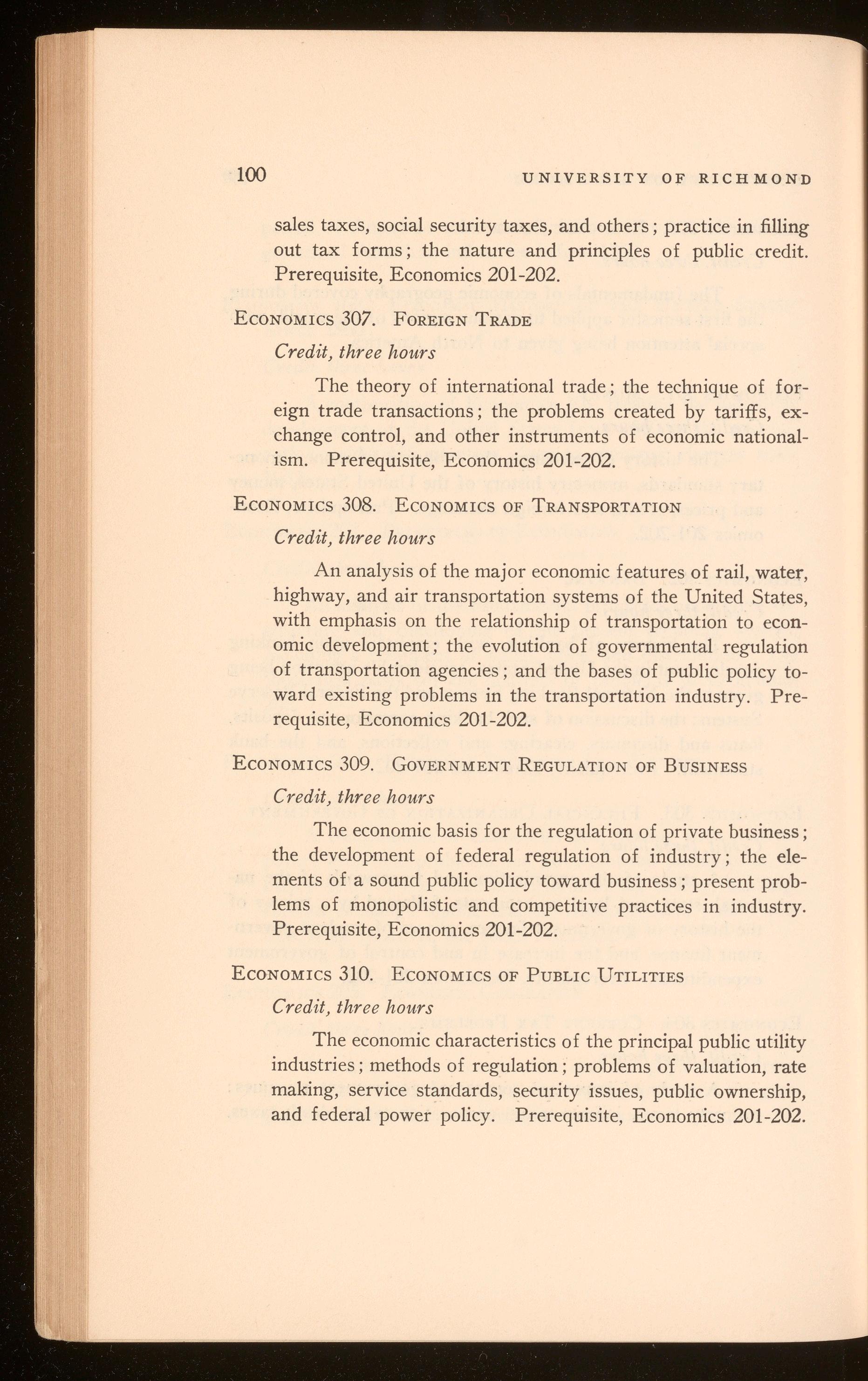
UNIVERSITY OF RICHMOND
sales taxes, social security taxes, and others; practice in filling out tax forms; the nature and principles of public credit. Prerequisite, Economics 201-202.
ECONOMICS 307. FOREIGN TRADE
Credit, three hours
The theory of international trade; the technique of foreign trade transactions; the problems created by tariffs, exchange control, and other instruments of economic nationalism. Prerequisite, Economics 201-202.
ECONOMICS 308. ECONOMICS OF TRANSPORTATION
Credit, three hours
An analysis of the major economic features of rail, water , highway, and air transportation systems of the United States, with emphasis on the relationship of transportation to economic development; the evolution of governmental regulation of transportation agencies; and the bases of public policy toward existing problems in the transportation industry. Prerequisite, Economics 201-202 .
ECONOMICS 309. GOVERNMENT REGULATION OF BUSINESS
Credit, three hours
The economic basis for the regulation of private business; the development of federal regulation of industry; the elements of a sound public policy toward business; present problems of monopolistic and competitive practices in industry. Prerequisite, Economics 201-202.
ECONOMICS 310. ECONOMICS OF PUBLIC UTILITIES
Credit, three hours
The economic characteristics of the principal public utility industries; methods of regulation; problems of valuation, rate making, service standards, security issues, public ownership, and federal power policy. Prerequisite, Economics 201-202.
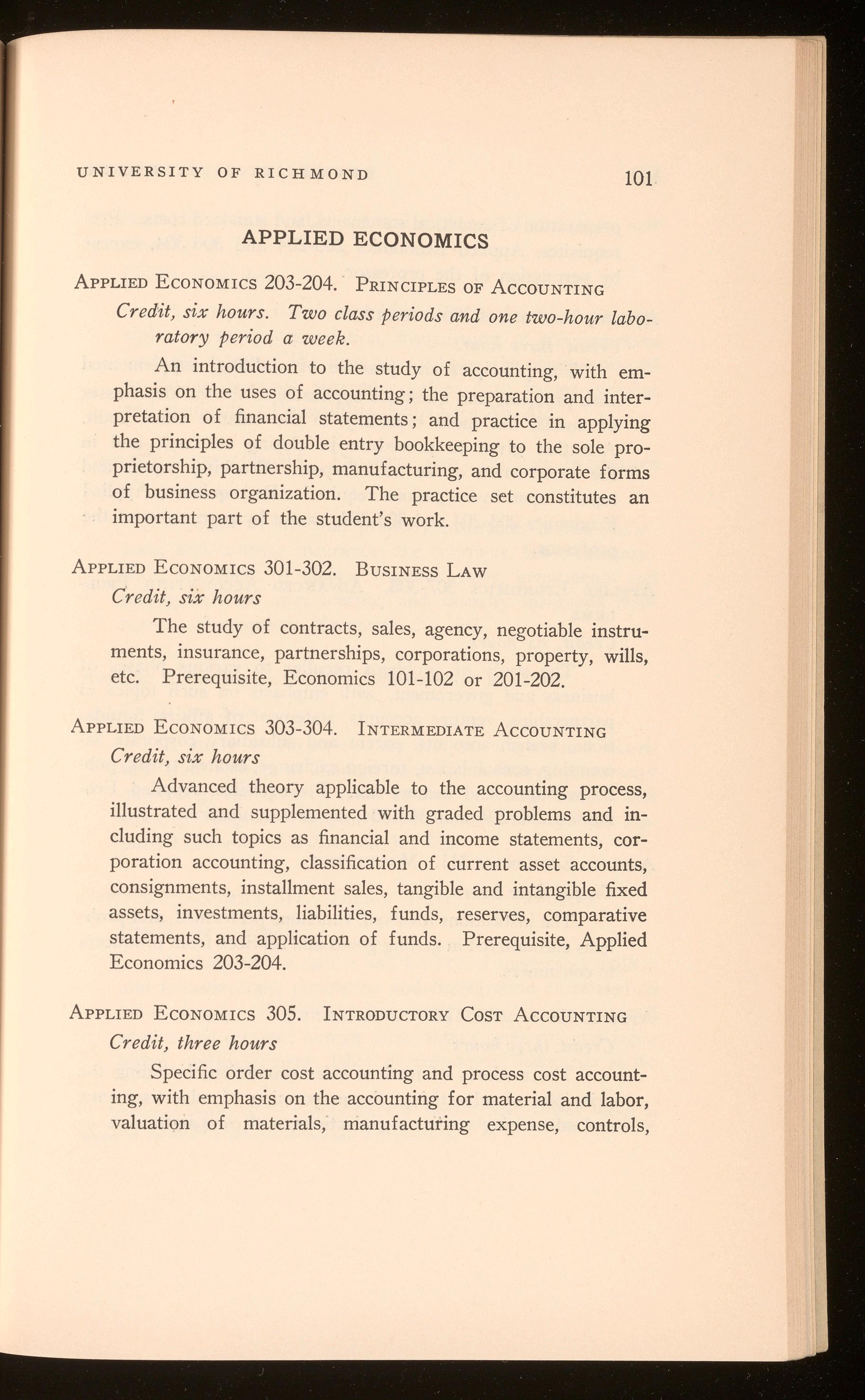
APPLIED ECONOMICS 203-204. PRINCIPLES OF ACCOUNTING
Credit, six hours. Two class periods and one two-hour laboratory period a week.
An introduction to the study of accounting, with emphasis on the uses of accounting; the preparation and interpretation of financial statements; and practice in applying the principles of double entry bookkeeping to the sole proprietorship, partnership, manufacturing, and corporate forms of business organization. The practice set constitutes an important part of the student's work.
APPLIED ECONOMICS 301-302. BUSINESS LAW
Credit, six hours
The study of contracts, sales, agency, negotiable instruments, insurance, partnerships, corporations, property, wills, etc. Prerequisite, Economics 101-102 or 201-202.
APPLIED ECONOMICS 303-304. INTERMEDIATE ACCOUNTING
Credit, six hours
Advanced theory applicable to the accounting process, illustrated and supplemented with graded problems and including such topics as financial and income statements, corporation accounting, classification of current asset accounts, consignments, installment sales, tangible and intangible fixed assets, investments, liabilities, funds, reserves, comparative statements, and application of funds. Prerequisite, Applied Economics 203-204.
APPLIED ECONOMICS 305. INTRODUCTORY COST ACCOUNTING
Credit, three hours
Specific order cost accounting and process cost accounting, with emphasis on the accounting for material and labor, valuation of materials, manufacturing expense, controls,
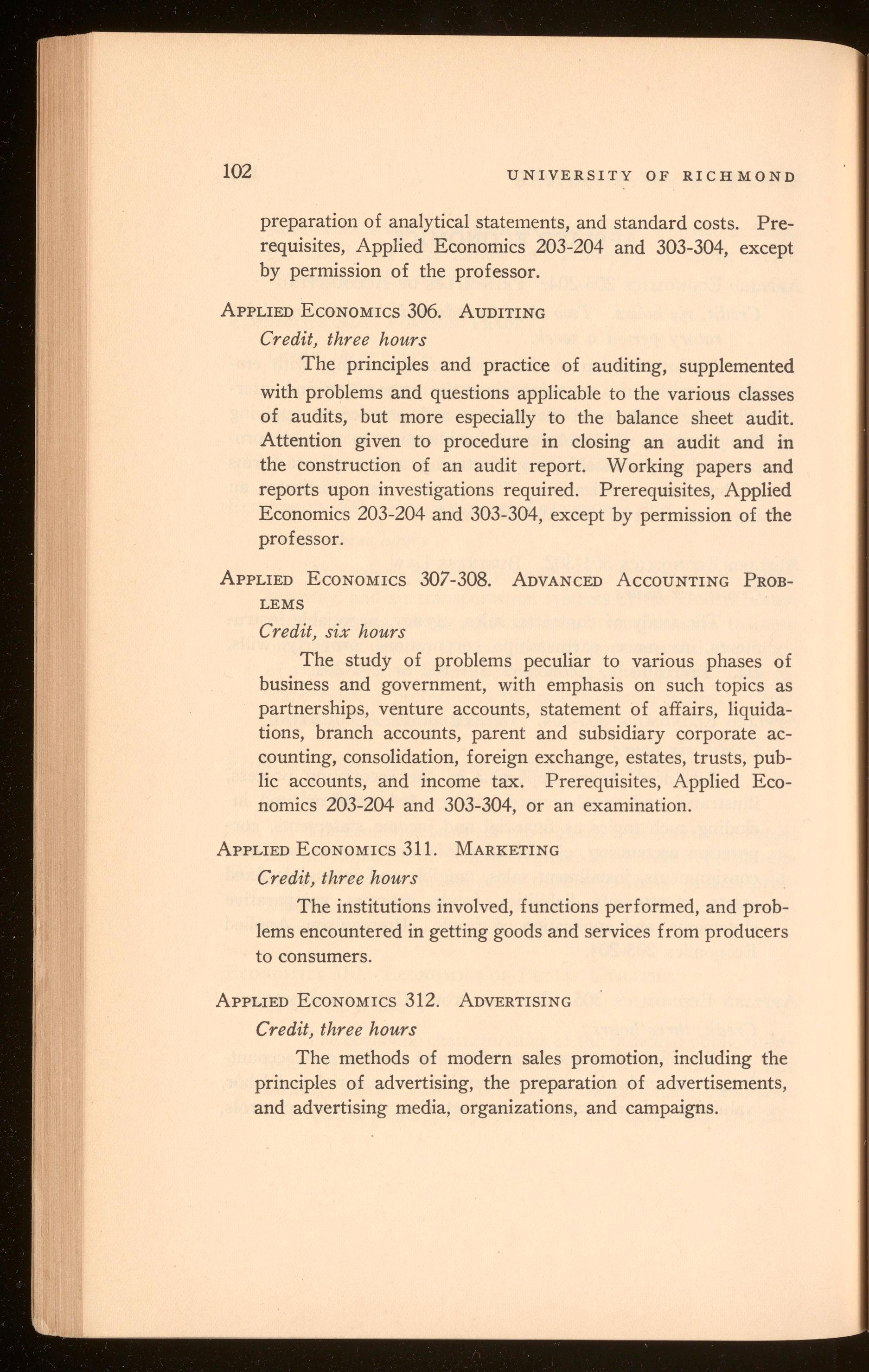
preparation of analytical statements, and standard costs. Prerequisites, Applied Economics 203-204 and 303-304, except by permission of the professor.
APPLIED ECONOMICS 306. AUDITING
Credit, three hours
The principles and practice of auditing, supplemented with problems and questions applicable to the various classes of audits, but more especially to the balance sheet audit. Attention given to procedure in closing an audit and in the construction of an audit report. Working papers and reports upon investigations required. Prerequisites, Applied Economics 203-204 and 303-304, except by permission of the professor.
APPLIED ECONOMICS 307-308. ADVANCED ACCOUNTING PROBLEMS
Credit, six hours
The study of problems peculiar to various phases of business and government, with emphasis on such topics as partnerships, venture accounts, statement of affairs, liquidations, branch accounts, parent and subsidiary corporate accounting, consolidation, foreign exchange, estates, trusts, public accounts, and income tax. Prerequisites, Applied Economics 203-204 and 303-304, or an examination.
APPLIED ECONOMICS 311. MARKETING
Credit, three hours
The institutions involved, functions performed, and problems encountered in getting goods and services from producers to consumers.
APPLIED ECONOMICS 312. ADVERTISING
Credit, three hours
The methods of modern sales promotion, including the principles of advertising, the preparation of advertisements, and advertising media, organizations, and campaigns.
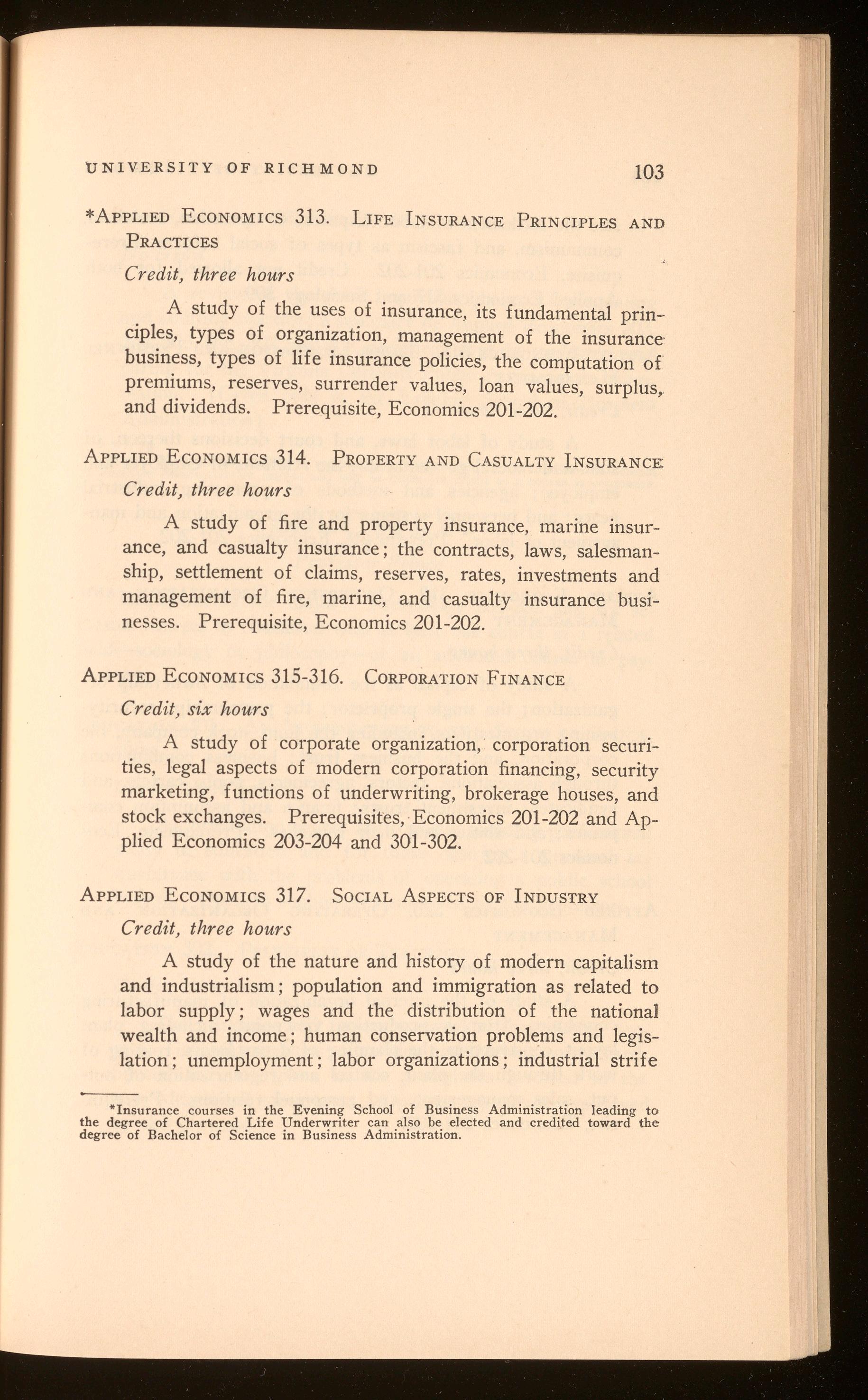
*APPLIED ECONOMICS 313. LIFE INSURANCE PRINCIPLES AND PRACTICES
Credit, three hours
A study of the uses of insurance, its fundamental principles, types of organization, management of the insurance· business, types of life insurance policies, the computation of premiums, reserves, surrender values, loan values, surplus, and dividends. Prerequisite, Economics 201-202.
APPLIED ECONOMICS 314. PROPERTY AND CASUALTY INSURANCE
Credit, three hours
A study of fire and property insurance, marine insurance, and casualty insurance; the contracts, laws, salesmanship, settlement of claims, reserves, rates, investments and management of fire, marine, and casualty insurance businesses. Prerequisite, Economics 201-202.
APPLIED ECONOMICS 315-316. CORPORATION FINANCE
Credit, six hours
A study of corporate organization, · corporation securities, legal aspects of modern corporation financing, security marketing, functions of underwriting, brokerage houses, and stock exchanges. Prerequisites, Economics 201-202 and Applied Economics 203-204 and 301-302.
APPLIED ECONOMICS 317. SOCIAL ASPECTS OF INDUSTRY
Credit, three hours
A study of the nature and history of modern capitalism and industrialism; population and immigration as related to labor supply; wages and the distribution of the national wealth and income; human conservation problems and legislation; unemployment; labor organizations; industrial strife
*Insurance courses in the Evening School of Business Administra_tion leading to the degree of Chartered Life Underwriter can also he elected and credited toward the degree of Bachelor of Science in Business Administration.
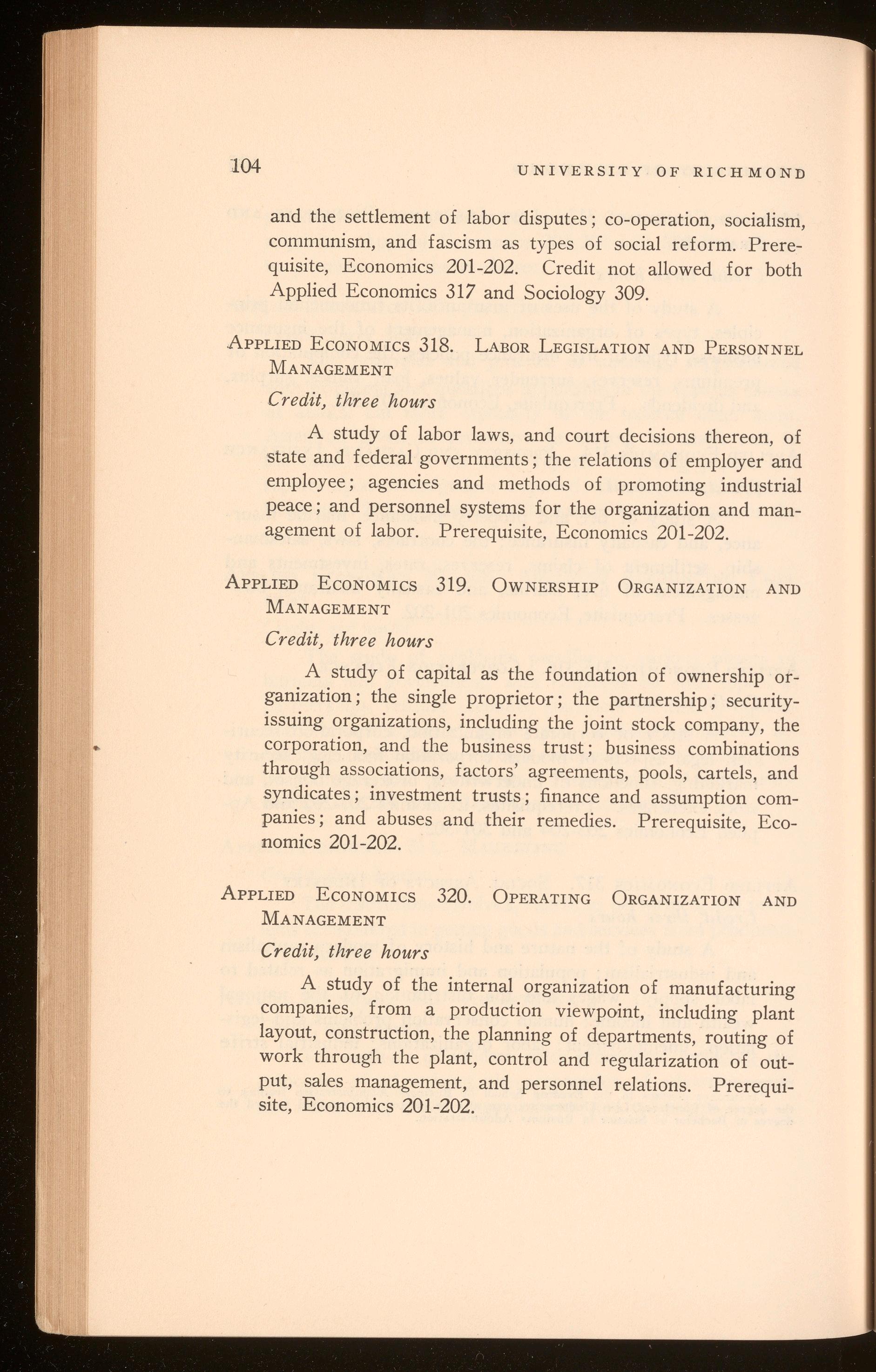
UNIVERSITY OF RICHMOND
and the settlement of labor disputes; co-operation, socialism, communism, and fascism as types of social reform. Prerequisite, Economics 201-202. Credit not allowed for both Applied Economics 317 and Sociology 309.
APPLIED ECONOMICS 318. LABOR LEGISLATION AND PERSONNEL MANAGEMENT
Credit, three hours
A study of labor laws, and court decisions thereon, of state and federal governments; the relations of employer and employee; agencies and methods of promoting industrial peace; and personnel systems for the organization and management of labor. Prerequisite, Economics 201-202.
APPLIED ECONOMICS 319. OWNERSHIP ORGANIZATION AND MANAGEMENT
Credit, three hours
A study of capital as the foundation of ownership organization; the single proprietor; the partnership; securityissuing organizations, including the joint stock company, the corporation, and the business trust; business combinations through associations, factors' agreements, pools, cartels, and syndicates; investment trusts; finance and assumption companies; and abuses and their remedies. Prerequisite, Economics 201-202.
APPLIED ECONOMICS 320. OPERATING ORGANIZATION AND MANAGEMENT
Credit, three hours
A study of the internal organization of manufacturing companies, from a production viewpoint, including plant layout, construction, the planning of departments, routing of work through the plant, control and regularization of output, sales management, and personnel relations. Prerequisite, Economics 201-202.
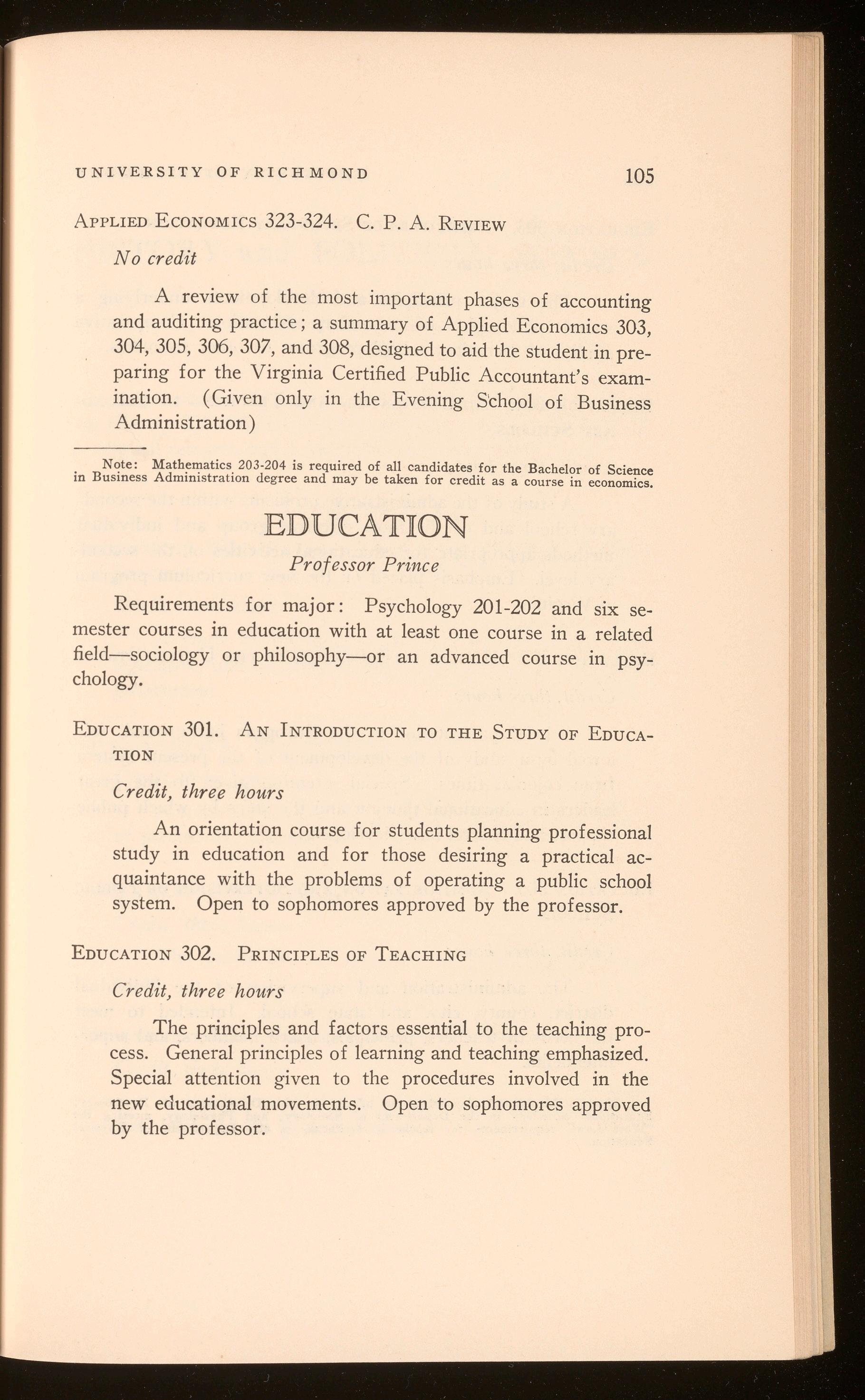
UNIVERSITY OF RICHMOND
APPLIED ECONOMICS 323-324. C. P.A. REVIEW
No credit
A review of the most important phases of accounting and auditing practice; a summary of Applied Economics 303, 304, 305, 306, 307, and 308, designed to aid the student in preparing for the Virginia Certified Public Accountant's examination. (Given only in the Evening School of Business Administration)
Note: Mathematics 203-204 is required of all candidates for the Bachelor of Science in Business Administration degree and may be taken for credit as a course in economics.
Professor Prince
Requirements for major: Psychology 201-202 and six semester courses in education with at least one course in a related field-sociology or philosophy-or an advanced course in psychology.
EDUCATION 301. AN INTRODUCTION TO THE STUDY OF EDUCATION
Credit, three hours
An orientation course for students planning professional study in education and for those desiring a practical acquaintance with the problems of operating a public school system. Open to sophomores approved by the professor.
EDUCATION 302. PRINCIPLES OF TEACHING
Credit, three hours
The principles and factors essential to the teaching process. General principles of learning and teaching emphasized. Special attention given to the procedures involved in the new educational movements. Open to sophomores approved by the professor.
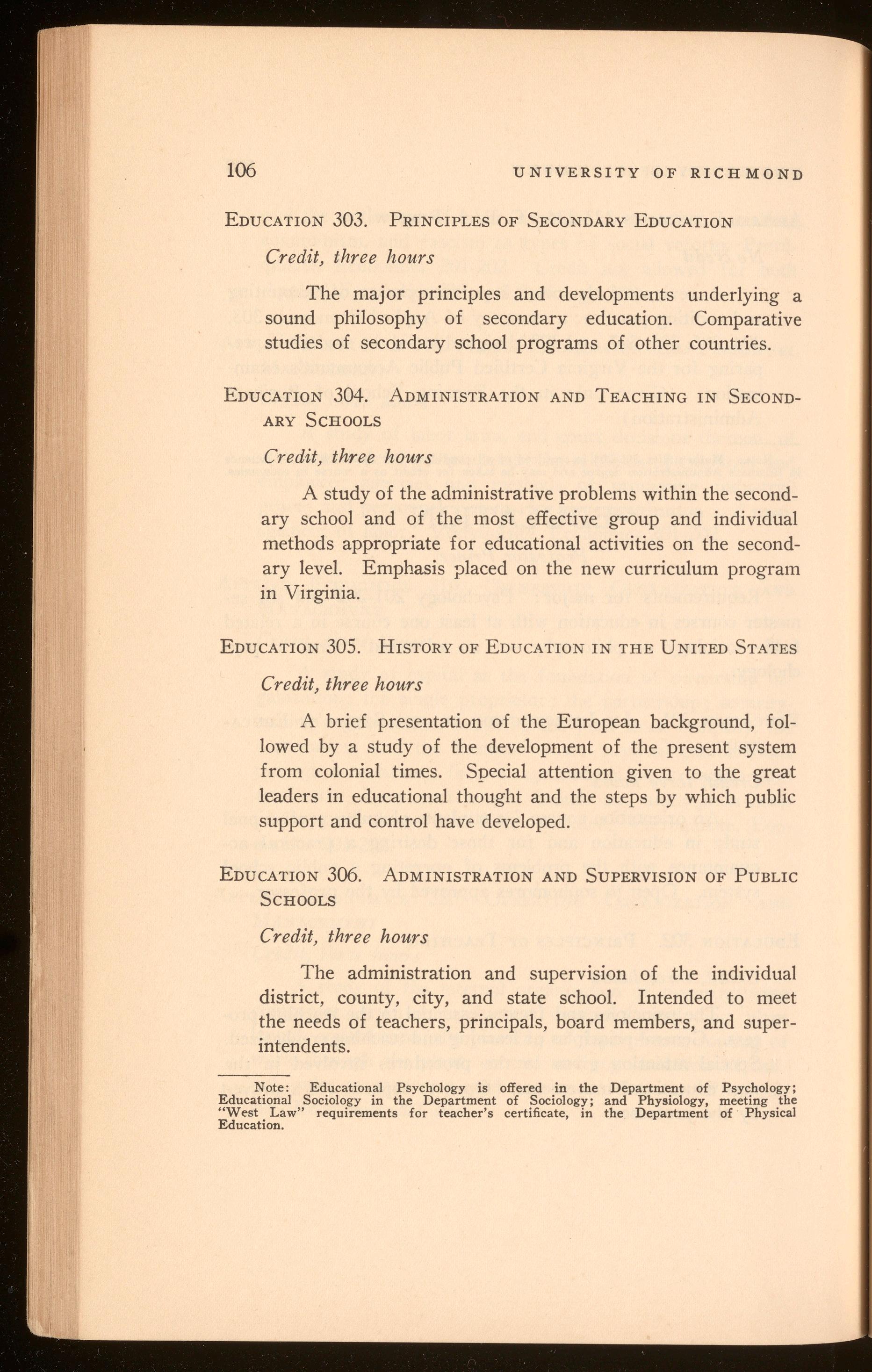
UNIVERSITY OF RICHMOND
EDUCATION 303. PRINCIPLES OF SECONDARY EDUCATION
Credit, three hours
The major principles and developments underlying a sound philosophy of secondary education. Comparative studies of secondary school programs of other countries.
EDUCATION 304. ADMINISTRATION AND TEACHING IN SECONDARY SCHOOLS
Credit, three hours
A study of the administrative problems within the secondary school and of the most effective group and individual methods appropriate for educational activities on the secondary level. Emphasis placed on the new curriculum program in Virginia.
EDUCATION 305. HISTORY OF EDUCATION IN THE UNITED STATES
Credit, three hours
A brief presentation of the European background, followed by a study of the development of the present system from colonial times. Special attention given to the great leaders in educational thought and the steps by which public support and control have developed.
EDUCATION 306. ADMINISTRATION AND SUPERVISION OF PUBLIC SCHOOLS
Credit, three hours
The administration and supervision of the individual district, county, city, and state school. Intended to meet the needs of teachers, principals, board members, and superintendents.
Note: Educational Psychology is offered in the Department of Psychology; Educational Sociology in the Department of Sociology; and Physiology, meeting the "West Law" requirements for teacher's certificate, in the Department of Physical Education.
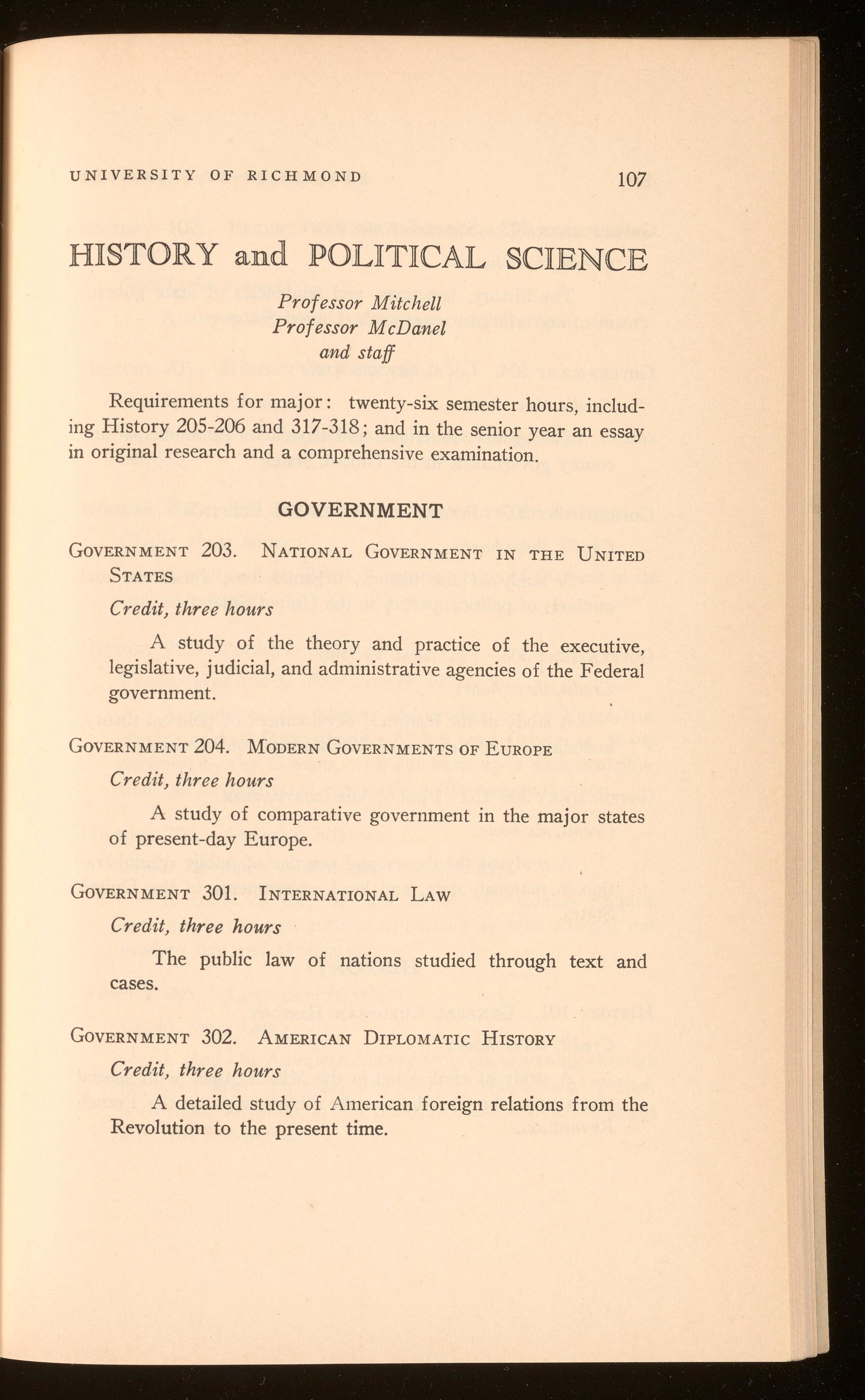
Professor Mitchell
Professor McDanel and staff
Requirements for major: twenty-six semester hours, including History 205-206 and 317-318; and in the senior year an essay in original research and a comprehensive examination.
GOVERNMENT 203. NATIONAL GOVERNMENT IN THE UNITED STATES
Credit, three hours
A study of the theory and practice of the executive, legislative, judicial, and administrative agencies of the Federal government.
GovERNMENT 204. M 'oDERN GovERNMENTs OF EUROPE
Credit, three hours
A study of comparative government in the major states of present-day Europe.
GOVERNMENT 301. INTERNATIONAL LAW
Credit, three hours
The public law of nations studied through text and cases.
GOVERNMENT 302. AMERICAN DIPLOMATIC HISTORY
Credit, three hours
A detailed study of American foreign relations from the Revolution to the present time.
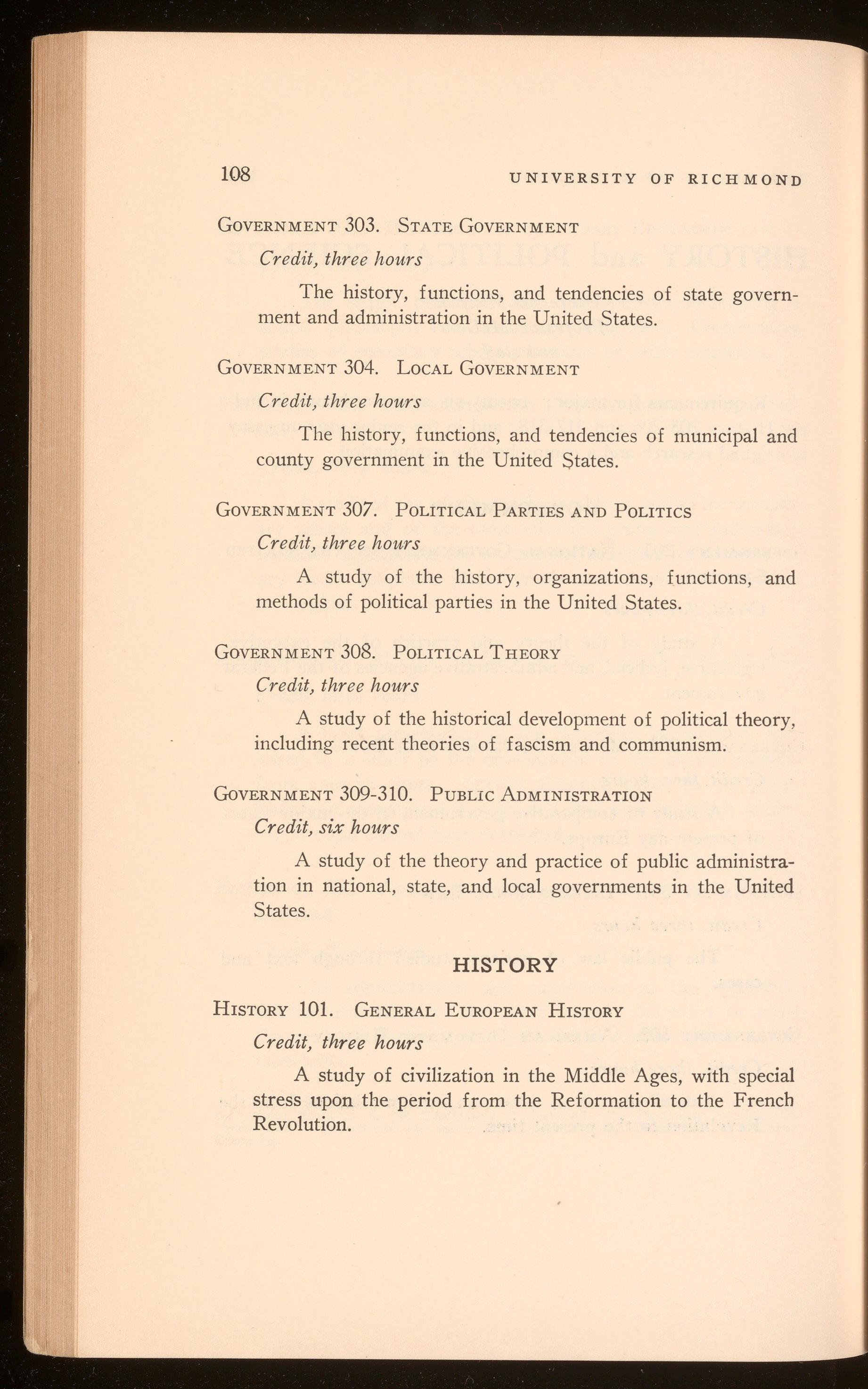
UNIVERSITY OF RICHMOND
GOVERNMENT 303. STATE GOVERNMENT
Credit, thr ee hours
The history, functions, and tendencies of state government and administration in the United States.
GOVERNMENT 304. LOCAL GOVERNMENT
Credit, three hours
The history, functions, and tendencies of municipal and county government in the United States.
GOVERNMENT 307. POLITICAL PARTIES AND POLITICS
Credit, thre e hours
A study of the history, organizations , functions , and methods of political parties in the United States.
GOVERNMENT 308. POLITICAL THEORY
Credit, thr ee hours
A study of the historical development of political theory, including recent theories of fascism and communism.
GoVERNMENT 309-310. PUBLIC ADMINISTRATION
Credit, six hours
A study of the theory and practice of public administration in national, state, and local governments in the United States.
HISTORY 101. GENERAL EUROPEAN HISTORY
Credit, three hours
A study of civilization in the Middle Ages, with special stress upon the period from the Reformation to the French Revolution.
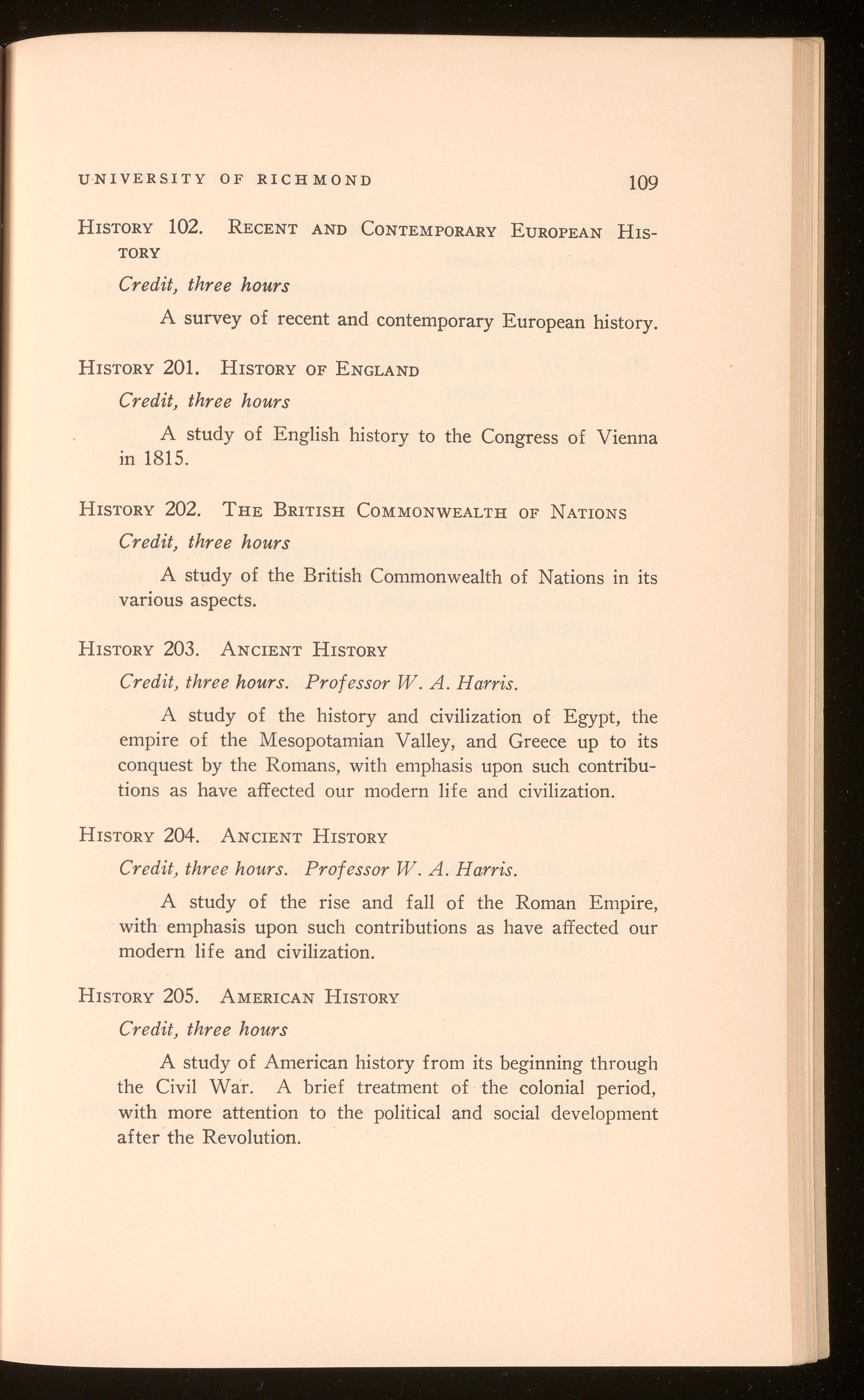
HISTORY 102. RECENT AND CONTEMPORARY EUROPEAN HISTORY
Credit, three hours
A survey of recent and contemporary European history.
HISTORY 201. HISTORY OF ENGLAND
Credit, three hours
A study of English history to the Congress of Vienna in 1815.
HISTORY 202. THE BRITISH COMMONWEALTH OF NATIONS
Credit, three hours
A study of the British Commonwealth of Nations in its various aspects.
HISTORY 203. ANCIENT HISTORY
Credit, three hours. Professor W. A. Harris.
A study of the history and civilization of Egypt, the empire of the Mesopotamian Valley, and Greece up to its conquest by the Romans, with emphasis upon such contributions as have affected our modern life and civilization.
HISTORY 204. ANCIENT HISTORY
Credit, three hours. Professor W. A. Harris.
A study of the rise and fall of the Roman Empire, with emphasis upon such contributions as have affected our modern life and civilization.
HISTORY 205. AMERICAN HISTORY
Credit, three hours
A study of American history from its beginning through the Civil War. A brief treatment of the colonial period, with more attention to the political and social development after the Revolution.
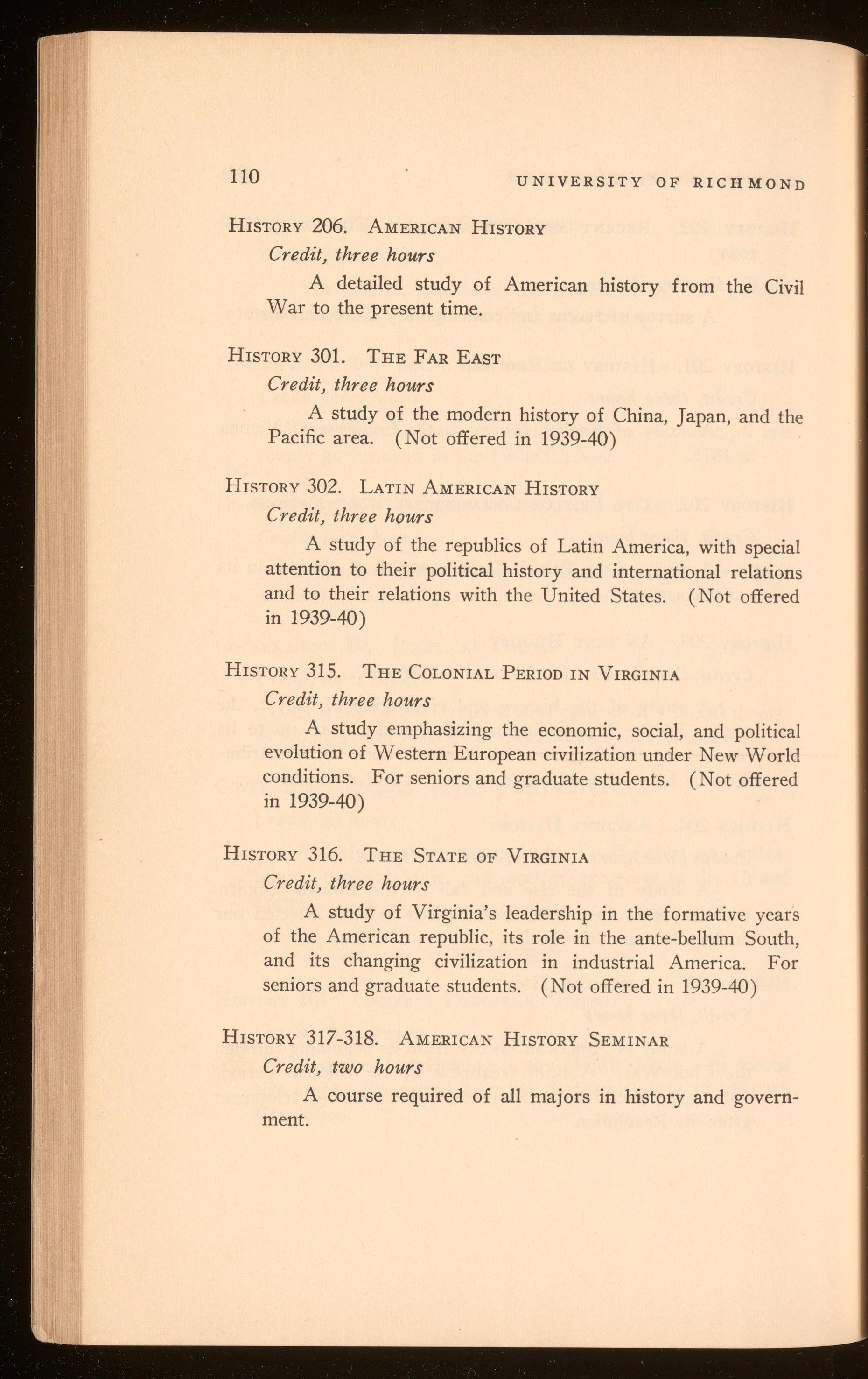
UNIVERSITY OF RICHMOND
HISTORY 206. AMERICAN HISTORY
Credit, three hours
A detailed study of American history from the Civil War to the present time.
HISTORY 301. THE FAR EAST
Credit, three hours
A study of the modern history of China, Japan, and the Pacific area. (Not offered in 1939-40)
HISTORY 302. LATIN AMERICAN HISTORY
Credit, three hours
A study of the republics of Latin America, with special attention to their political history and international relations and to their relations with the United States. (Not offered in 1939-40)
HISTORY 315. THE COLONIAL PERIOD IN VIRGINIA
Credit, three hours
A study emphasizing the economic, social, and political evolution of Western European civilization under New World conditions. For seniors and graduate students. (Not offered in 1939-40)
HISTORY 316. THE STATE OF VIRGINIA
Credit, three hours
A study of Virginia's leadership in the formative years of the American republic, its role in the ante-bellum South, and its changing civilization in industrial America. For seniors and graduate students. (Not offered in 1939-40)
HISTORY 317-318. AMERICAN HISTORY SEMINAR
Credit, two hours
A course required of all majors in history and government.
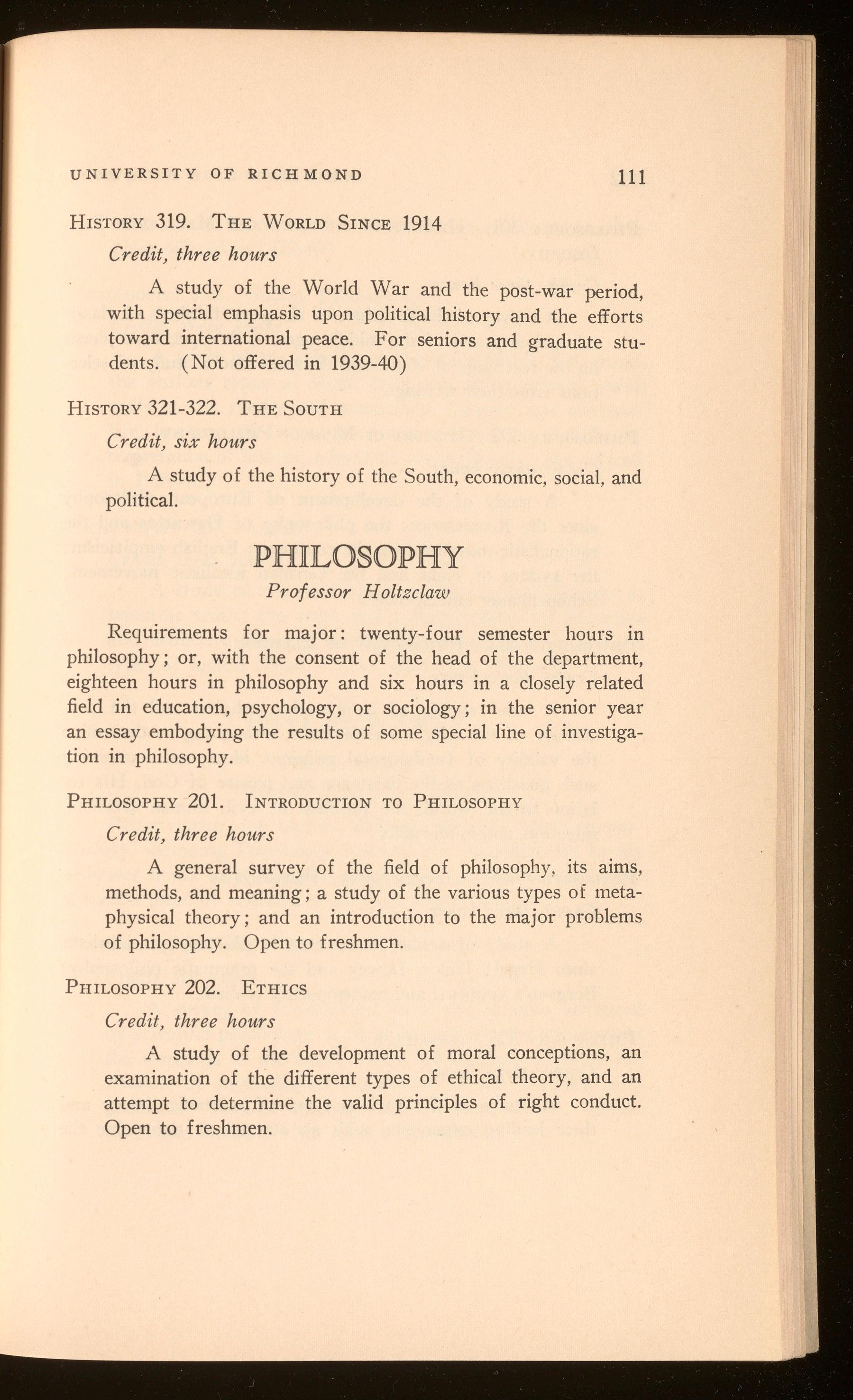
UNIVERSITY OF RICHMOND
HISTORY 319. THE WORLD SINCE 1914
Credit, three hours
A study of the World War and the post-war period, with special emphasis upon political history and the efforts toward international peace. For seniors and graduate students. (Not offered in 1939-40)
HISTORY 321-322. THE SOUTH
Credit, six hours
A study of the history of the South, economic, social, and political.
Professor Holtzclaw
Requirements for major: twenty-four semester hours in philosophy; or, with the consent of the head of the department, eighteen hours in philosophy and six hours in a closely related field in education, psychology, or sociology; in the senior year an essay embodying the results of some special line of investigation in philosophy.
PHILOSOPHY 201. INTRODUCTION TO PHILOSOPHY
Credit, three hours
A general survey of the field of philosophy, its aims, methods, and meaning; a study of the various types of metaphysical theory; and an introduction to the major problems of philosophy. Open to freshmen.
PHILOSOPHY 202. ETHICS
Credit, three hours
A study of the development of moral conceptions, an examination of the different types of ethical theory, and an attempt to determine the valid principles of right conduct. Open to freshmen.
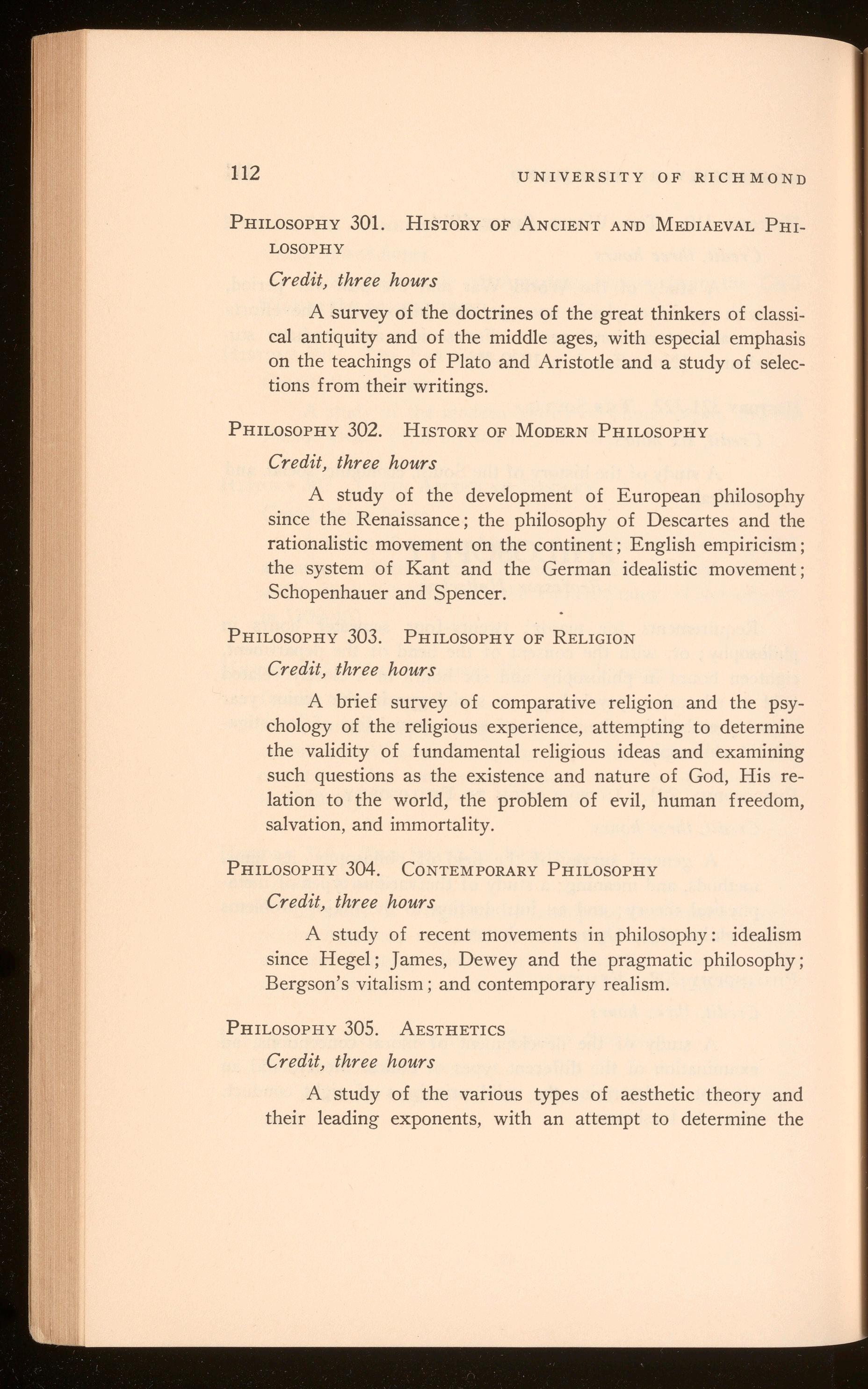
PHILOSOPHY 301. HISTORY OF ANCIENT AND MEDIAEVAL PHILOSOPHY
Credit, three hours
A survey of the doctrines of the great thinkers of classical antiquity and of the middle ages, with especial emphasis on the teachings of Plato and Aristotle and a study of selections from their writings.
PHILOSOPHY 302. HISTORY OF MODERN PHILOSOPHY
Credit, three hours
A study of the development of European philosophy since the Renaissance ; the philosophy of Descartes and the rationalistic movement on the continent; English empiricism; the system of Kant and the German idealistic movement; Schopenhauer and Spencer.
PHILOSOPHY 303. PHILOSOPHY OF RELIGION
Credit, three hours
A brief survey of comparative religion and the psychology of the religious experience, attempting to determine the validity of fundamental religious ideas and examining such questions as the existence and nature of God, His relation to the world, the problem of evil, human freedom, salvation, and immortality.
PHILOSOPHY 304. CONTEMPORARY PHILOSOPHY
Credit, three hours
A study of recent movements in philosophy: idealism since Hegel; James, Dewey and the pragmatic philosophy; Bergson's vitalism; and contemporary realism.
PHILOSOPHY 305. AESTHETICS
Credit, three hours
A study of the various types of aesthetic theory and their leading exponents, with an attempt to determine the
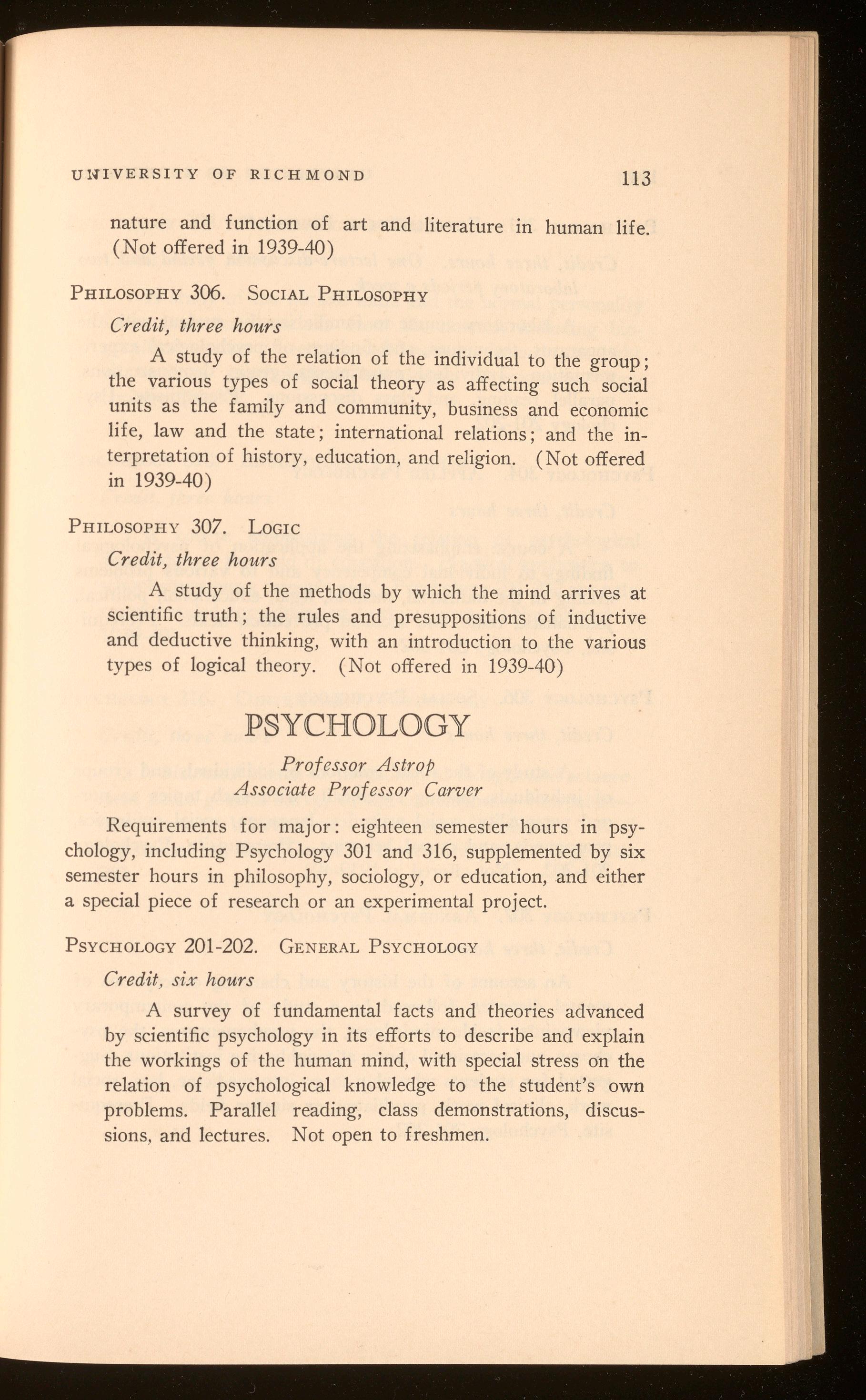
nature and function of art and literature m human life. (Not offered in 1939-40)
PHILOSOPHY 306. SOCIAL PHILOSOPHY
Credit, three hours
A study of the relation of the individual to the group; the various types of social theory as affecting such social units as the family and community, business and economic life, law and the state; international relations; and the interpretation of history, education, and religion. (Not offered in 1939-40)
PHILOSOPHY 307. LOGIC
Credit, three hours
A study of the methods by which the mind arrives at scientific truth; the rules and presuppositions of inductive and deductive thinking, with an introduction to the various types of logical theory. (Not offered in 1939-40)
Requirements for major: eighteen semester hours in psychology, including Psychology 301 and 316, supplemented by six semester hours in philosophy, sociology, or education, and either a special piece of research or an experimental project.
PSYCHOLOGY 201-202. GENERAL PSYCHOLOGY
Credit , six hours
A survey of fundamental facts and theories advanced by scientific psychology in its efforts to describe and explain the workings of the human mind, with special stress on the relation of psychological knowledge to the student's own problems. Parallel reading, class demonstrations, discussions, and lectures. Not open to freshmen.
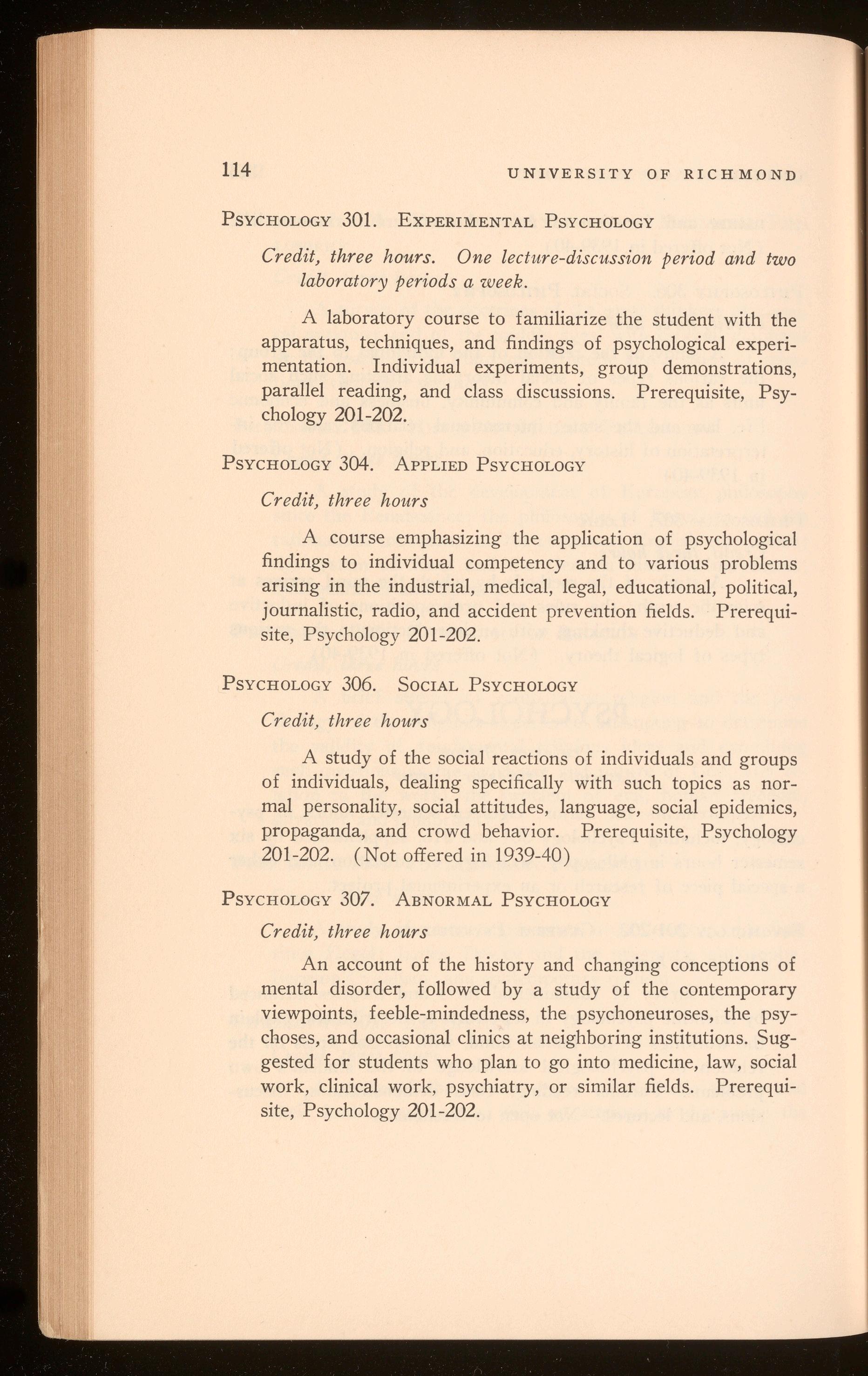
PSYCHOLOGY 301. EXPERIMENTAL PSYCHOLOGY
Credit, three hours. One lecture-discussion period and two laboratory periods a week.
A laboratory course to familiarize the student with the apparatus, techniques, and findings of psychological experimentation. Individual experiments, group demonstrations, parallel reading, and class discussions. Prerequisite, Psychology 201-202.
PSYCHOLOGY 304. APPLIED PSYCHOLOGY
Credit, three hours
A course emphasizing the application of psychological findings to individual competency and to various problems arising in the industrial, medical, legal, educational, political, journalistic, radio, and accident prevention fields. Prerequisite, Psychology 201-202.
PSYCHOLOGY 306. SOCIAL PSYCHOLOGY
Credit, three hours
A study of the social reactions of individuals and groups of individuals, dealing specifically with such topics as normal personality, social attitudes, language, social epidemics, propaganda, and crowd behavior. Prerequisite, Psychology 201-202. (Not offered in 1939-40)
PSYCHOLOGY 307. ABNORMAL PSYCHOLOGY
Credit, three hours
An account of the history and changing conceptions of mental disorder, followed by a study of the contemporary viewpoints, feeble-mindedness, the psychoneuroses, the psychoses, and occasional clinics at neighboring institutions. Suggested for students who plan to go into medicine, law, social work, clinical work , psychiatry, or similar fields. Prerequisite, Psychology 201-202.
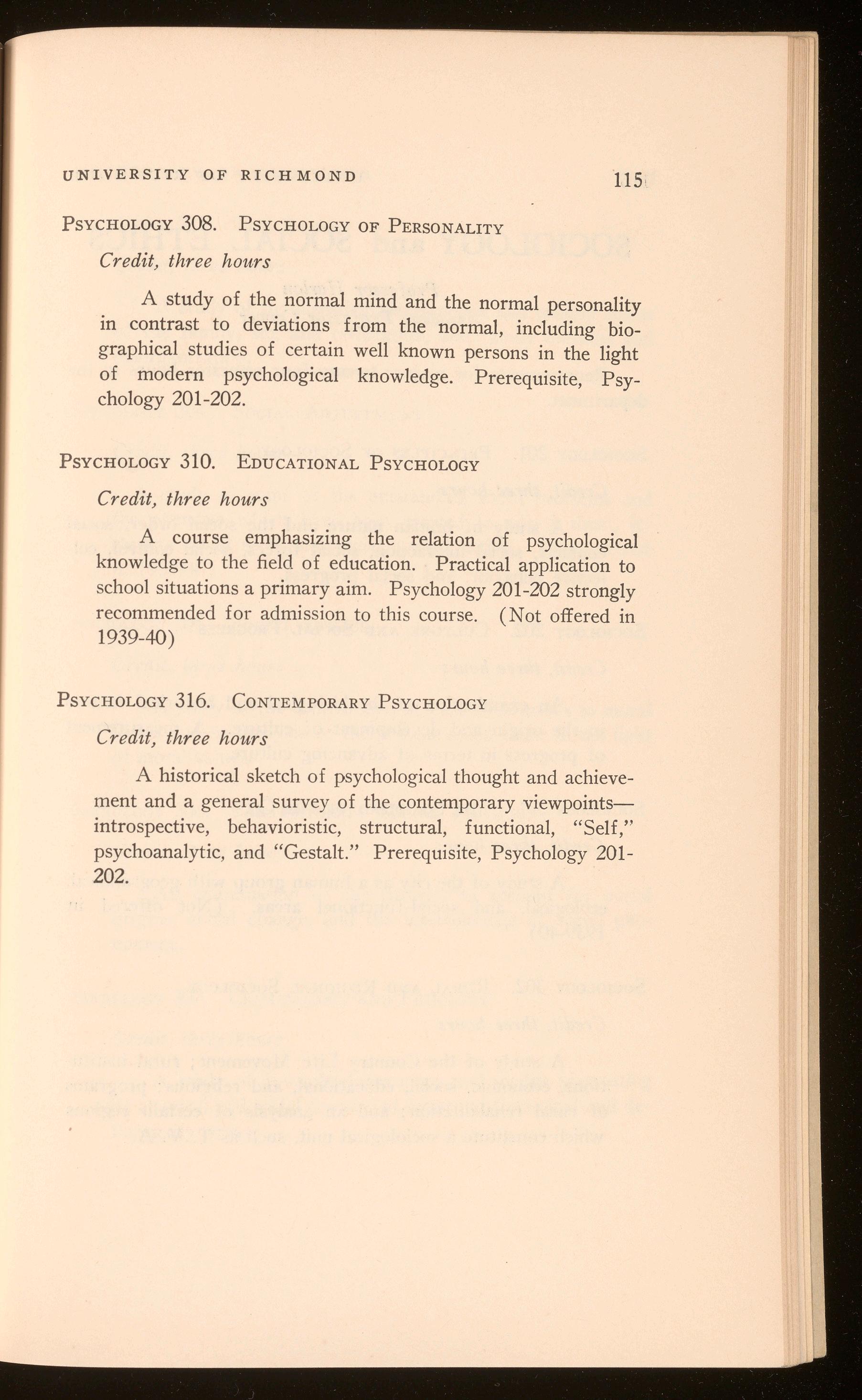
UNIVERSITY OF RICHMOND
PSYCHOLOGY 308. PSYCHOLOGY OF PERSONALITY
Credit, three hoitrs
A study of the normal mind and the normal personality in contrast to deviations from the normal, including biographical studies of certain well known persons in the light of modern psychological knowledge. Prerequisite, Psychology 201-202.
PSYCHOLOGY 310. EDUCATIONAL PSYCHOLOGY
Credit, three hours
A course emphasizing the relation of psychological knowledge to the field of education. Practical application to school situations a primary aim. Psychology 201-202 strongly recommended for admission to this course. (Not offered in 1939-40)
PSYCHOLOGY 316. CONTEMPORARY PSYCHOLOGY
Credit, three hours
A historical sketch of psychological thought and achievement and a general survey of the contemporary viewpointsintrospective, behavioristic, structural, functional, "Self," psychoanalytic , and "Gestalt ." Prerequisite, Psychology 201202.
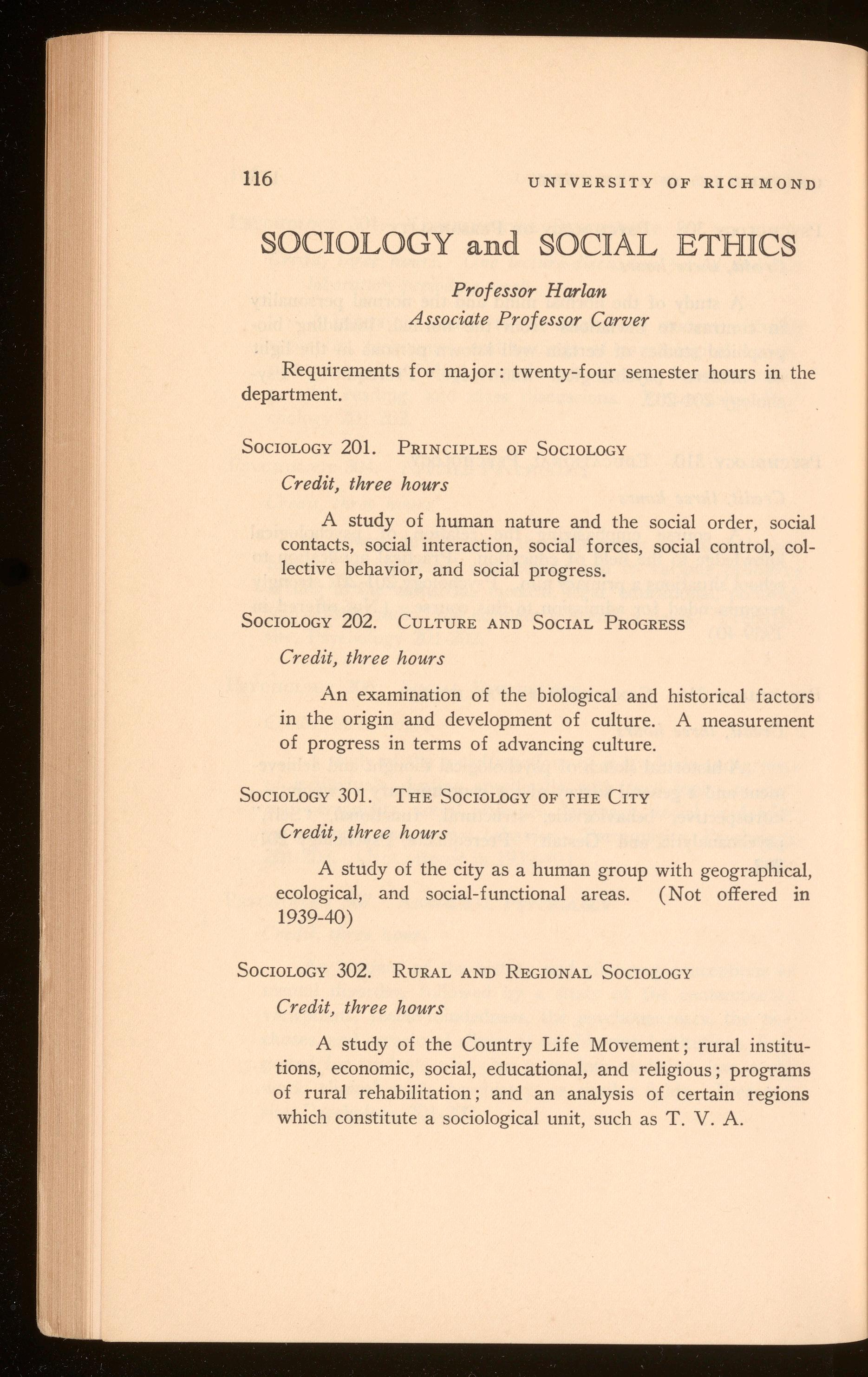
UNIVERSITY OF RICHMOND
Professor Harlan
Associate Professor Carver
Requirements for major: twenty-four semester hours in the department.
SocIOLOGY 201. PRINCIPLES OF SocIOLOGY
Credit, three hours
A study of human nature and the social order, social contacts, social interaction, social forces, social control, collective behavior, and social progress.
SOCIOLOGY 202. CULTURE AND SOCIAL PROGRESS
Credit, three hours
An examination of the biological and historical factors in the origin and development of culture. A measurement of progress in terms of advancing culture.
SOCIOLOGY 301. THE SOCIOLOGY OF THE CITY
Credit, three hours
A study of the city as a human group with geographical, ecological, and social-functional areas (Not offered in 1939-40)
SOCIOLOGY 302. RURAL AND REGIONAL SOCIOLOGY
Credit, three hours
A study of the Country Life Movement; rural institutions, economic, social, educational, and religious; programs of rural rehabilitation; and an analysis of certain regions which constitute a sociological unit, such as T. V. A.
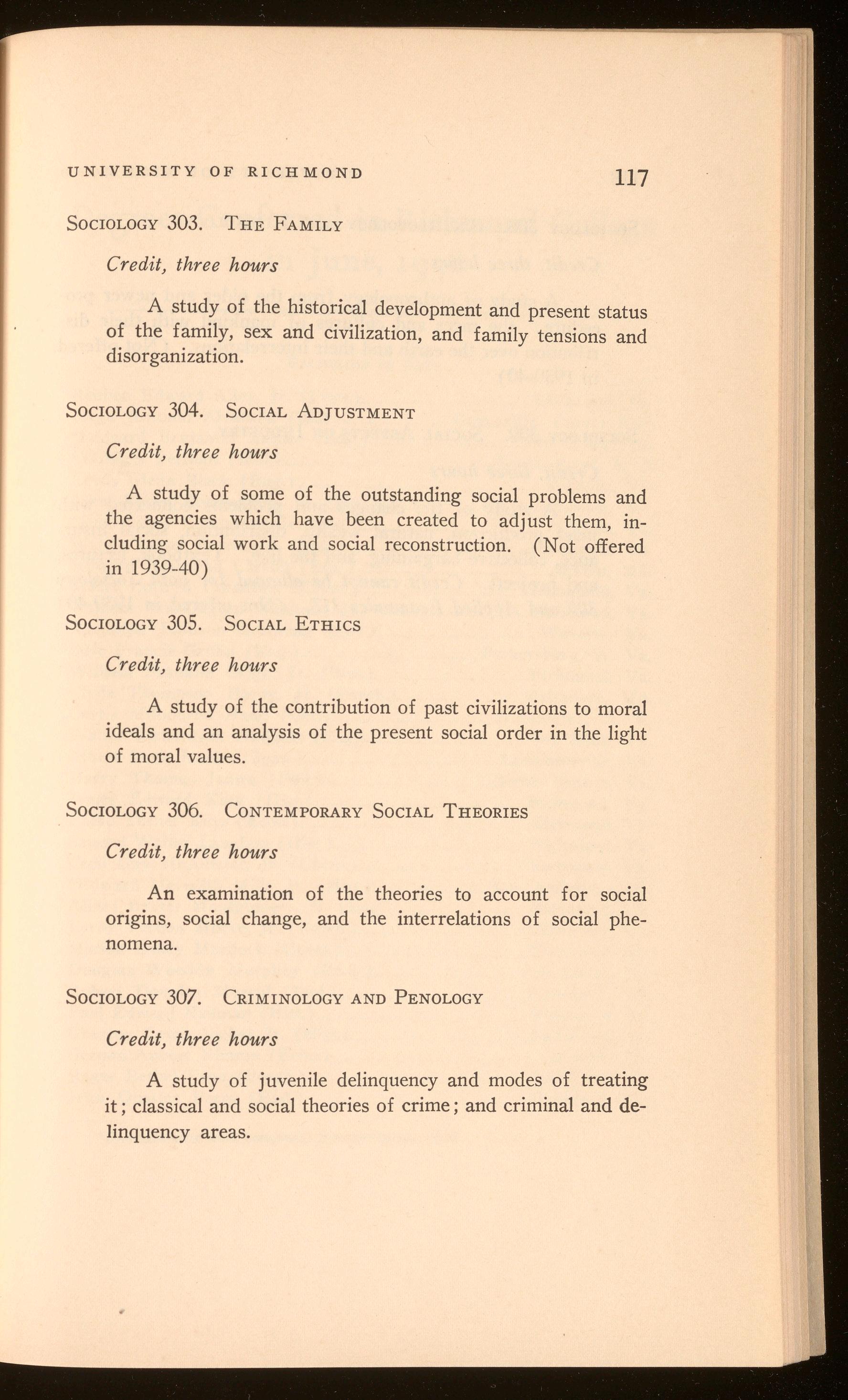
UNIVERSITY OF RICHMOND
SOCIOLOGY 303. THE FAMILY
Credit, three hours
A study of the historical development and present status of the family, sex and civilization, and family tensions and disorganization.
SocIOLOGY 304. SocrAL ADJUSTMENT
Credit, three hours
A study of some of the outstanding social problems and the agencies which have been created to adjust them, including social work and social reconstruction. (Not offered in 1939-40)
SocIOLOGY 305. SocIAL ETHICS
Credit, three hours
A study of the contribution of past civilizations to moral ideals and an analysis of the present social order in the light of moral values.
SOCIOLOGY 306. CONTEMPORARY SOCIAL THEORIES
Credit, three hours
An examination of the theories to account for social origins, social change, and the interrelations of social phenomena.
SOCIOLOGY 307. CRIMINOLOGY AND PENOLOGY
Credit, three hours
A study of juvenile delinquency and modes of treating it; classical and social theories of crime; and criminal and delinquency areas.
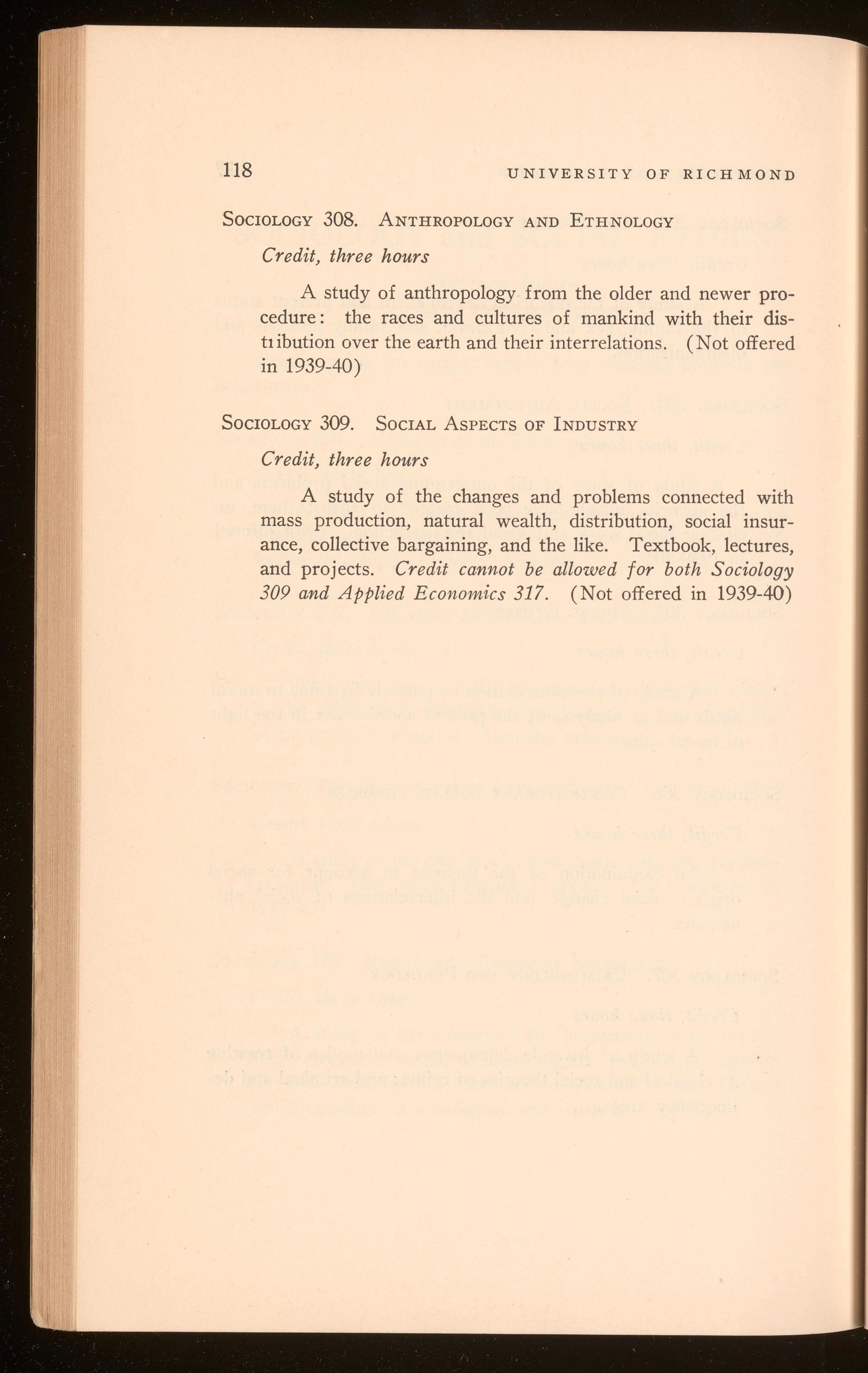
SOCIOLOGY 308. ANTHROPOLOGY AND ETHNOLOGY
Credit, three hours
A study of anthropology from the older and newer procedure: the races and cultures of mankind with their disti ibution over the earth and their interrelations. (Not offered in 1939-40)
SOCIOLOGY 309. SOCIAL ASPECTS OF INDUSTRY
Credit, three hours
A study of the changes and problems connected with mass production, natural wealth, distribution, social insurance, collective bargaining, and the like. Textbook, lectures, and projects. Credit cannot be allowed for both Sociology 309 and Applied Economics 317. (Not offered in 1939-40)
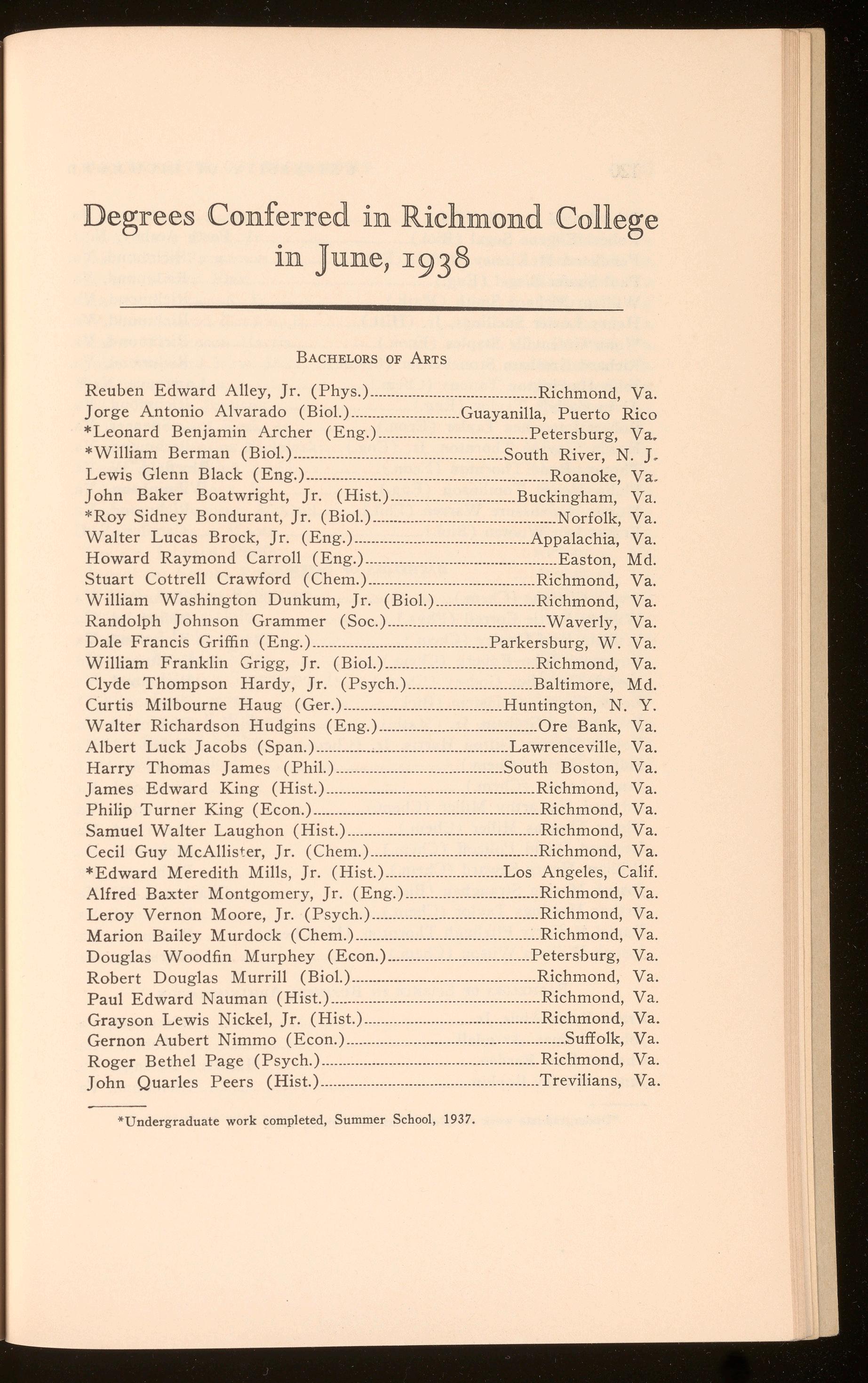
Reuben Edward Alley, Jr. (Phys.) Richmond, Va.
Jorge Antonio Alvarado (Biol.) Guayanilla, Puerto Rico
*Leonard Benjamin Archer (Eng.) Petersburg, Va.
*William Berman (Biol.) South River, N. J
Lewis Glenn Black (Eng.) ..........................................................Roanoke, Va .
John Baker Boatwright, Jr. (Hist.) ..............................Buckingham, Va.
*Roy Sidney Bondurant, Jr. (Biol.) ............................................Norfolk, Va.
Walter Lucas Brock, Jr (Eng.) ..........................................Appalachia, Va.
Howard Raymond Carroll (Eng.) ..............................................Easton, Md.
Stuart Cottrell Crawford (Chem.) Richmond, Va.
William Washington Dunkum, Jr. (Biol.) ........................Richmond, Va.
Randolph Johnson Grammer (Soc.) ......................................Waverly, Va.
Dale Francis Griffin (Eng.) ..........................................Parkersburg, W. Va.
William Franklin Grigg, Jr. (Biol.) ....................................Richmond, Va.
Clyde Thompson Hardy, Jr. (Psych.) ..............................Baltimore, Md.
Curtis Milbourne Haug (Ger.) ......................................Huntington, N. Y.
Walter Richardson Hudgins (Eng.) ......................................Ore Bank, Va.
Albert Luck Jacobs (Span ) Lawrenceville, Va.
Harry Thomas James (Phil.) ............................... ......South Boston, Va.
James Edward King (Hist.) Richmond, Va.
Philip Turner King (Econ.) ......................................................Richmond, Va.
Samuel Walter Laughon (Hist.) ..............................................Richmond, Va.
Cecil Guy McAllister, Jr. (Chem.) ........................................Richmond, Va.
*Edward Meredith Mills, Jr. (Hist.) Los Angeles, Calif.
Alfred Baxter Montgomery, Jr. (Eng.) Richmond, Va.
Leroy Vernon Moore, Jr (Psych.) ........................................Richmond, Va.
Marion Bailey Murdock (Chem ) Richmond, Va.
Douglas Woodfin Murphey (Econ.) ..................................Petersburg, Va.
Robert Douglas Murrill (Biol.) ............................................Richmond, Va.
Paul Edward Nauman (Hist.) ..... ...........................................Richmond, Va.
Grayson Lewis Nickel, Jr. (Hist ) ..........................................Richmond, Va.
Gernon Aubert Nimmo (Econ.) ....................................................Suffolk, Va.
Roger Bethel Page (Psych.) ....................................................Richmond, Va.
John Quarles Peers (Hist.) ....................................................Trevilians, Va.
*Undergraduate work completed, Summer School, 1937.
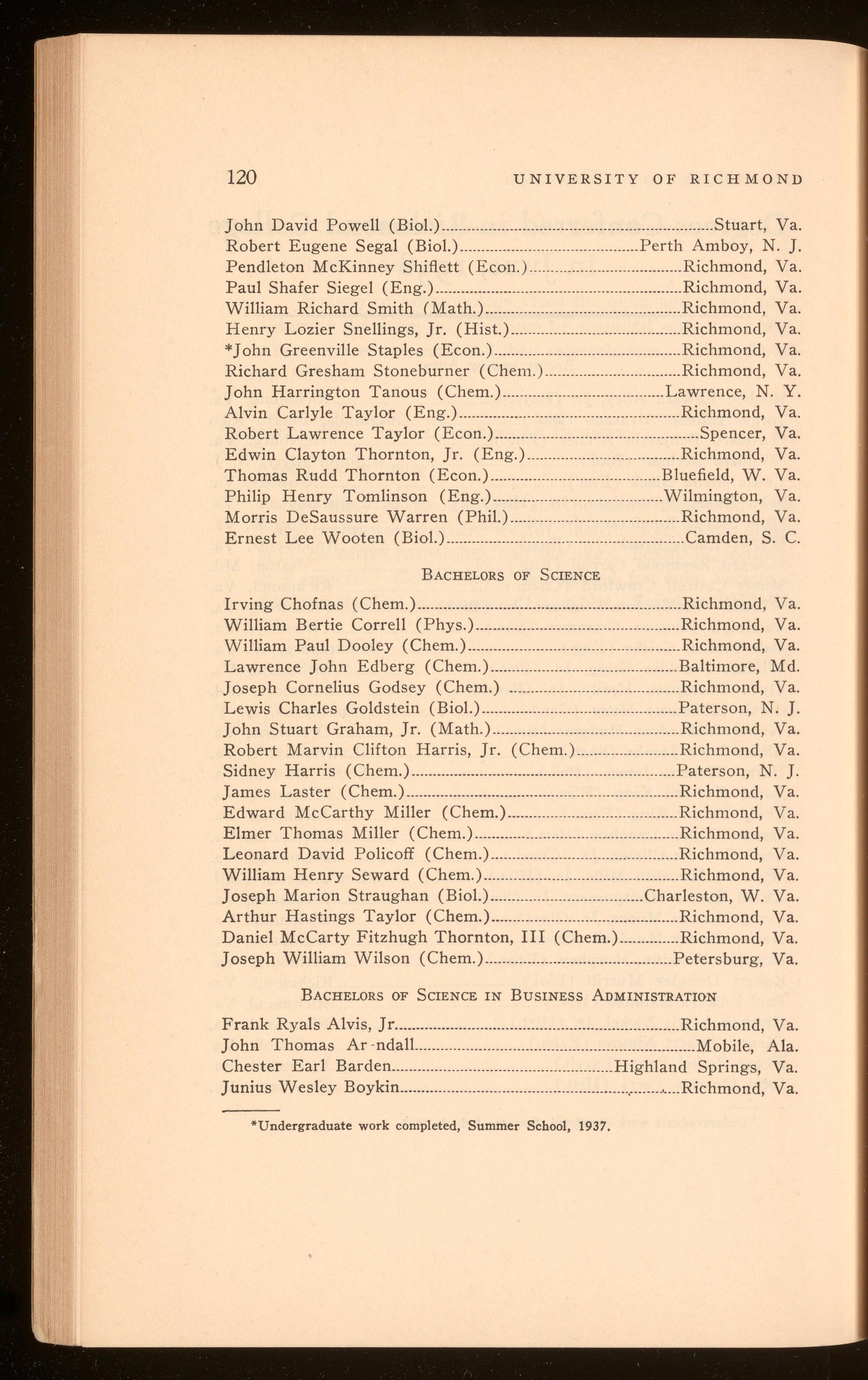
UNIVERSITY OF RICHMOND
John David Powell (Biol.) Stuart , Va.
Robert Eugene Segal (Biol.) .... Perth Amboy, N. J.
Pendleton McKinney Shiflett (Econ.) Richmond, Va.
Paul Shafer Siegel (Eng.) Richmond, Va.
William Richard Smith (Math.) . . Richmond, Va
Henry Lozier Snellings, Jr. (Hist.) .Richmond, Va
*John Greenville Staples (Econ.) ............................................ Richmond, Va.
Richard Gresham Stoneburner (Chern .) .... ....Richrnond, Va
John Harrington Tanous (Chem .) ......................................Lawrence, N . Y.
Alvin Carlyle Taylor (Eng.) .......Richmond, Va
Robert Lawrence Taylor (Econ.) ........ ...... Spencer, Va.
Edwin Clayton Thornton, Jr. (Eng.) Richmond, Va.
Thomas Rudd Thornton (Econ.) Bluefield, W Va.
Philip Henry Tomlinson (Eng.) ........................................Wilrnington, Va .
Morris DeSau s sure Warren (Phil.) ........................................Richmond, Va.
Ernest Lee Wooten (Biol.) ............................ ................. ...........Camden, S. C.
BACHELORS OF SCIENCE
Irving Chofnas (Chem .) ............................................ ..................Richmond, Va .
William Bertie Correll (Phys.) . Richmond, Va.
William Paul Dooley (Chem.) .................................................. Richmond, Va.
Lawrence John Edb erg (Chem ) Baltimore, Md.
Joseph Cornelius Godsey (Chem ) .. .Richmond, Va.
Lewis Charles Goldstein (Biol.) Paterson , N. J.
John Stuart Graham, Jr. (Math.) Richmond, Va.
Robert Marvin Clifton Harris, Jr. (Chem ) ..... Richmond, Va
Sidney Harris (Chem .) ..............................................................Paterson, N . J.
James Laster (Chem.) ................................................................Richmond, Va .
Edward McCarthy Miller (Chem ) . .... Richmond, Va
Elmer Thomas Miller (Chem.) ......... .......................................Richmond, Va .
Leonard David Policoff (Chem.) . .Richmond, Va
William Henry Seward (Chem ) . Richmond, Va.
Joseph Marion Straughan (Biol.) ..... Charleston, W. Va
Arthur Hastings Taylor (Chem.) .. Richmond, Va.
Daniel McCarty Fitzhugh Thornton, III (Chem ) ... .Richmond, Va.
Joseph William Wilson (Chem .) ............................................Petersburg , Va.
BACHELORS OF SCIENCE IN BUSINESS ADMINISTRATION
Frank Ryals Alvis, Jr ...................................................................Richmond, Va .
John Thomas Ar ndall... ............................................................... Mobile, Ala .
Chester Earl Barden ... Highland Springs, Va
Junius Wesley Boykin .... .•. Richmond, Va.
*Undergraduate work completed, Summer School, 1937
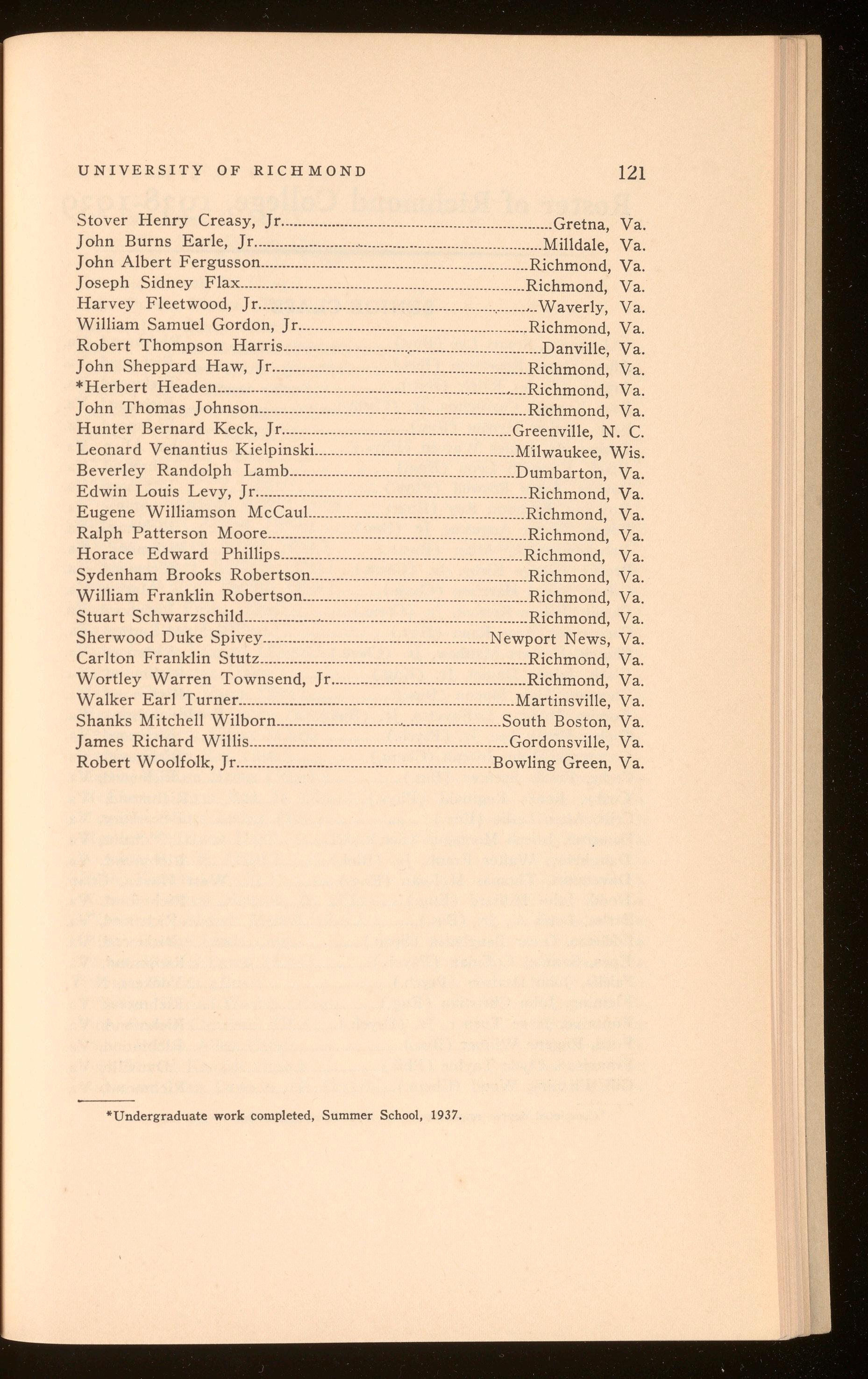
Stover Henry Creasy, Jr ................. .....Gretna, Va.
John Burns Earle, Jr Milldale, Va.
John Albert Fergusson Richmond, Va.
Joseph Sidney Flax ....................................................................Richmond, Va.
Harvey Fleetwood, Jr ....................................................................Waverly, Va.
William Samuel Gordon, Jr .......................................................Richmond, Va.
Robert Thompson Harris ...............................................................Danville, Va.
John Sheppard Haw, Jr. ............................................................Richmond, Va.
*Herbert Headen ..........................................................................Richmond, Va.
John Thomas Johnson ................................................................Richmond, Va.
Hunter Bernard Keck, Jr .......................................................Greenville, N. C.
Leonard Venantius Kielpinski Milwaukee, Wis.
Beverley Randolph Lamb Dumbarton, Va.
Edwin Louis Levy, Jr Richmond, Va.
Eugene Williamson McCaul... .................................................Richmond, Va.
Ralph Patterson Moore ..............................................................Richmond, Va.
Horace Edward Phillips ..........................................................Richmond, Va.
Sydenham Brooks Robertson ....................................................Richmond, Va.
William Franklin Robertson ......................................................Richmond, Va.
Stuart Schwarzschild .................,..................................................Richmond, Va.
Sherwood Duke Spivey ......................................................Newport News, Va.
Carlton Franklin Stutz ................................................................Richmond, Va.
Wortley Warren Townsend, Jr Richmond, Va.
Walker Earl Turner ..................................................................Martinsville, Va.
Shanks Mitchell Wilborn South Boston, Va.
James Richard Willis Gordonsville, Va.
Robert Woolfolk, Jr Bowling Green, Va.
*Undergraduate work completed, Summer School, 1937.
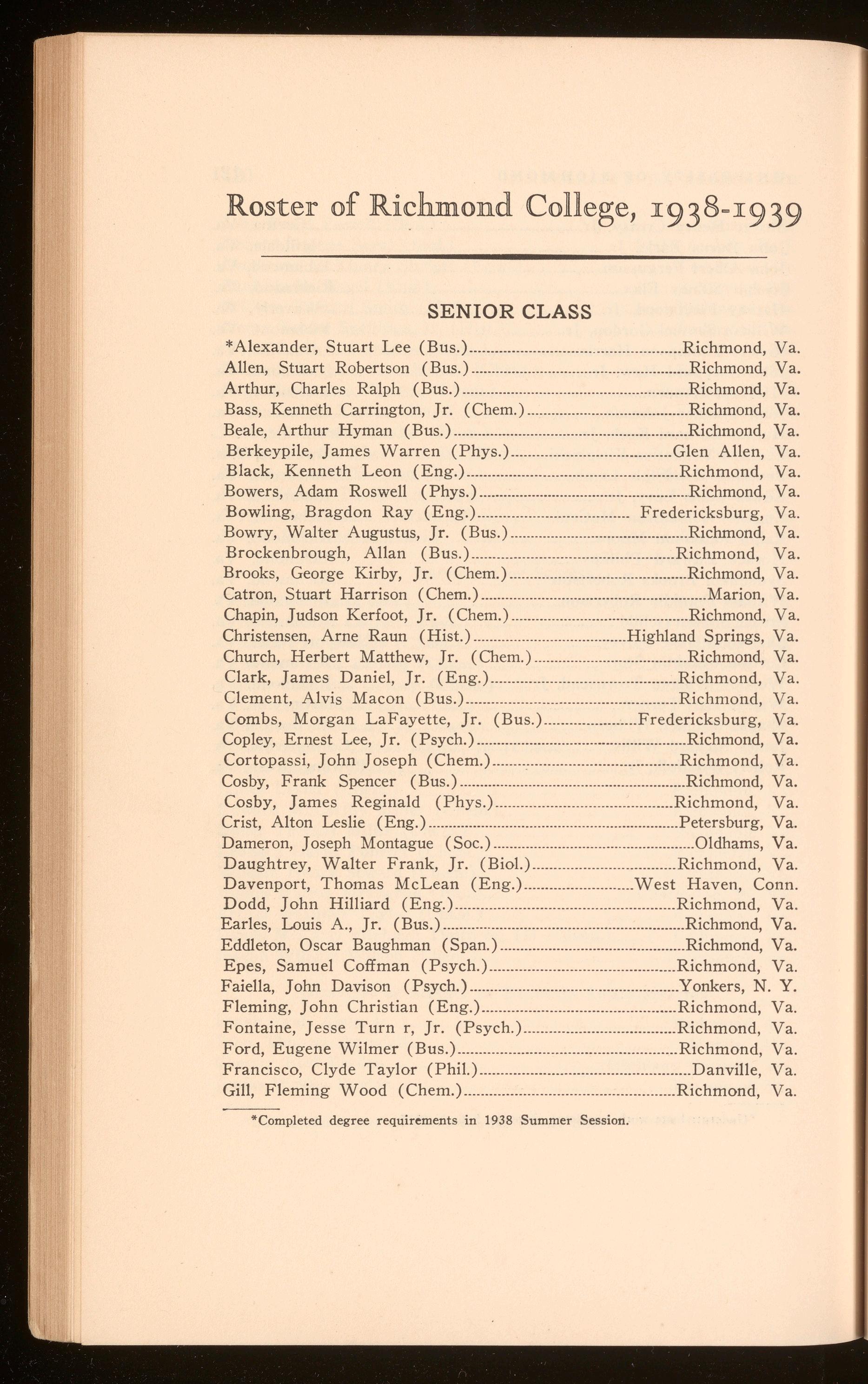
*Alexander, Stuart Lee (Bus.) Richmond, Va. Allen, Stuart Robertson (Bus.) ......................................................Richmond, Va.
Arthur, Charles Ralph (Bus.) ........................................................Richmond, Va.
Bass, Kenneth Carrington, Jr. (Chem.) ........................................Richmond, Va.
Beale, Arthur Hyman (Bus.) Richmond, Va. Berkeypile, James Warren (Phys.) Glen Allen, Va. Black, Kenneth Leon (Eng.) Richmond, Va.
Bowers, Adam Roswell (Phys.) Richmond, Va.
Bowling, Bragdon Ray (Eng.) Fredericksburg, Va. Bowry, Walter Augustus, Jr. (Bus.) ............................................Richmond, Va.
Brockenbrough, Allan (Bus.) ................................................ Richmond, Va. Brooks, George Kirby, Jr. (Chem.) Richmond, Va.
Catron, Stuart Harrison (Chem.) Marion, Va. Chapin, Judson Kerfoot, Jr. (Chem.) ............................................Richmond, Va. Christensen, Arne Raun (Hist.) ......................................Highland Springs, Va.
Church, Herbert Matthew, Jr. (Chem.) Richmond, Va. Clark, James Daniel, Jr. (Eng.) ............................................ Richmond, Va. Clement, Alvis Macon (Bus.) .................................................. Richmond, Va. Combs, Morgan LaFayette, Jr. (Bus.) ...................... Fredericksburg, Va. Copley, Ernest Lee, Jr. (Psych.) Richmond, Va. Cortopassi, John Joseph (Chem.) _. Richmond, Va. Cosby, Frank Spencer (Bus.) ........................................................Richmond, Va. Cosby, James Reginald (Phys.) .......................................... Richmond, Va. Crist, Alton Leslie (Eng.) Petersburg, Va. Dameron, Joseph Montague (Soc.) Oldhams, Va. Daughtrey, Walter Frank, Jr. (Biol.) Richmond, Va. Davenport, Thomas McLean (Eng.) ..........................West Haven, Conn. Dodd, John Hilliard (Eng.) .................................................... Richmond, Va. Earles, Louis A., Jr. (Bus.) ............................................................Richmond, Va. Eddleton, Oscar Baughman (Span.) ..............................................Richmond, Va. Epes, Samuel Coffman (Psych.) Richmond, Va. Faiella, John Davison (Psych.) ....................................................Yonkers, N. Y. Fleming, John Christian (Eng.) .............................................. Richmond, Va. Fontaine, Jesse Turn r, Jr. (Psych.) .................................... Richmond, Va. Ford, Eugene Wilmer (Bus.) .................................................... Richmond, Va. Francisco, Clyde Taylor (Phil.) Danville, Va. Gill, Fleming Wood (Chem.) .................................................. Richmond, Va.
*Completed degree requirements in 1938 Summer Session.
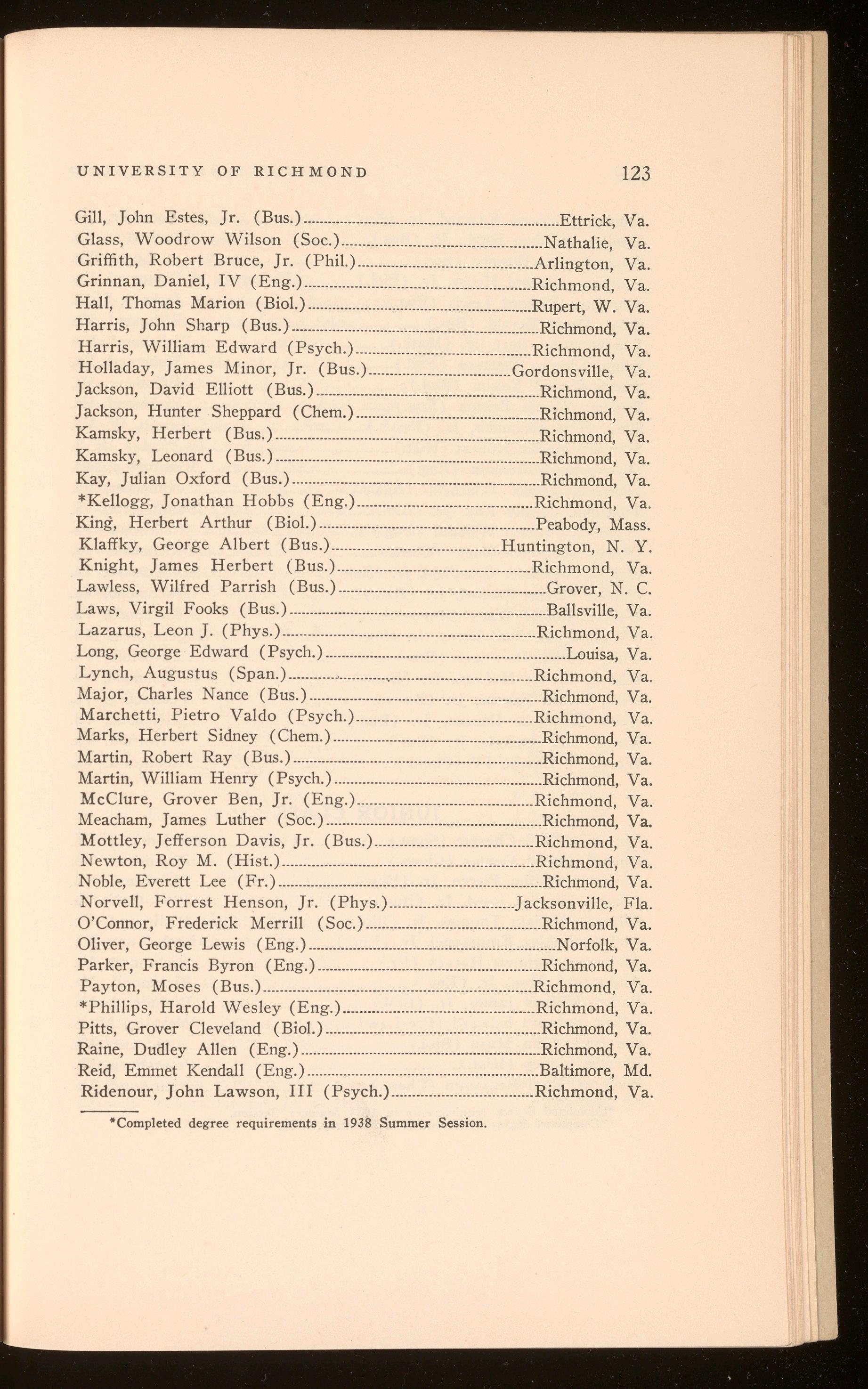
Gill, John Estes, Jr. (Bus.) ...
Glass, Woodrow Wilson (Soc.) ............. .................................Nathalie, Va.
Griffith, Robert Bruce, Jr. (Phil.) Arlington, Va. Grinnan, Daniel, IV (Eng.) Richmond, Va.
Hall, Thomas Marion (Biol.) Rupert, W. Va. Harris, John Sharp (Bus.) ..............................................................Richmond, Va. Harris, William Edward (Psych.) ......... .............Richmond, Va. Holladay, James Minor, Jr. (Bus.) ..................................Gordonsville, Va. Jackson, David Elliott (Bus.) ........................................................Richmond, Va.
Jackson, Hunter Sheppard (Chem.) ..............................................Richmond, Va. Kamsky, Herbert (Bus.) ..... ..........................................................Richmond, Va. Kamsky, Leonard (Bus.) ..................................................................Richmond, Va. Kay, Julian Oxford (Bus.) ..............................................................Richmond, Va.
*Kellogg, Jonathan Hobbs (Eng.) ...................... Richmond, Va. King, Herbert Arthur (Biol.) ....... ..............................Peabody, Mass. Klaffky, George Albert (Bus.) ......Huntington, N. Y.
Knight, James Herbert (Bus.) ................Richmond, Va .
Lawless, Wilfred Parrish (Bus.) .. .........................................Grover, N. C.
Laws, Virgil Fooks (Bus.) Ballsville, Va.
Lazarus, Leon J. (Phys.) ..Richmond, Va. Long, George Edward (Psych.) Louisa, Va.
Lynch, Augustus (Span.) ........................, ....Richmond, Va
Major, Charles Nance (Bus.) .....................................Richmond, Va.
Marchetti, Pietro Valdo (Psych.) ..... ...................................Richmond, Va. Marks, Herbert Sidney (Chem.) ........................ ........................Richmond, Va.
Martin, Robert Ray (Bus.) ..............................................................Richmond, Va. Martin, William Henry (Psych.) .....Richmond, Va.
McClure, Grover Ben, Jr. (Eng .) .......... .......................Richmond, Va. Meacham, James Luther (Soc.) ..........................Richmond, Va. Mottley, Jefferson Davis, Jr. (Bus.) .. ...Richmond, Va. Newton, Roy M. (Hist.) ............................................................Richmond, Va. Noble, Everett Lee (Fr.) Richmond, Va.
Norvell, Forrest Henson, Jr. (Phys.) . ............Jacksonville, Fla. O'Connor, Frederick Merrill (Soc.) Richmond, Va. Oliver, George Lewis (Eng.) .. ......................................Norfolk, Va. Parker, Francis Byron (Eng.) ......................Richmond, Va. Payton, Moses (Bus.) ................................................................Richmond, Va.
*Phi llip s, Harold Wesley (Eng.) ... ...........................Richmond, Va. Pitts, Grover Cleveland (Biol.) ......................................................Richmond, Va. Raine, Dudley Allen (Eng.) ............................................................Richmond, Va.
Reid, Emmet Kendall (Eng.) Baltimore, Md. Ridenour, John Lawson, III (Psych.) Richmond, Va.
*Completed degree requirements in 1938 Summer Session.
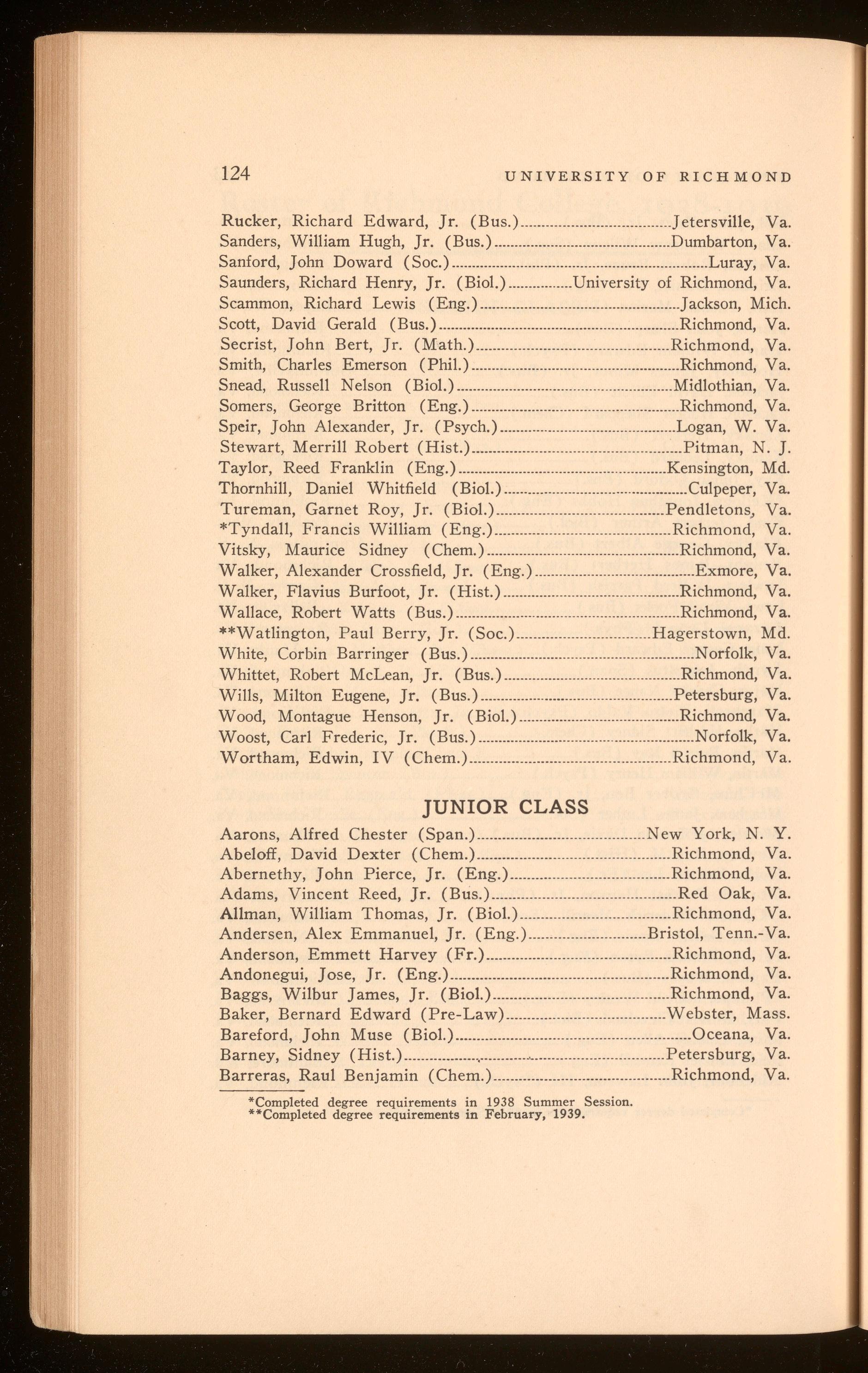
Rucker, Richard Edward, Jr. (Bus.) ....................................Jetersville, Va .
Sanders, William Hugh, Jr. (Bus.) .. .Dumbarton, Va
Sanford, John Doward (Soc ) .. Luray, Va.
Saunders, Richard Henry, Jr. (Biol.) .... University of Richmond, Va.
Scammon , Richard Lewis (Eng.) .. ...Jackson, Mich.
Scott, David Gerald (Bus.) Richmond, Va
Secrist , John Bert, Jr (Math.) Richmond , Va
Smith, Charles Emerson (Phil.) .... Richmond, Va.
Snead, Russell Nelson (Biol.) ..... Midlothian, Va.
Somers, George Britton (Eng.) Richmond, Va.
Speir, John Alexander, Jr. (Psych.) . Logan , W. Va
Stewart , Merrill Robert (Hist.) ... Pitman, N J.
Taylor , Reed Franklin (Eng ) Ken s ington, Md.
Thornhill, Daniel Whitfield (Biol.) . Culpeper, Va.
Tureman, Garnet Roy, Jr (Biol.) ...... ...... Pendletons , Va
*Tyndall, Franci s William (En g. ) Richmond, Va
Vitsky, Maurice Sidney (Chem.) ................................................Richmond, Va .
Walker, Alexander Crossfield, Jr. (Eng ) .Exmore, Va.
Walker , Flavius Burfoot, Jr (Hist ) ... ....Richmond, Va
Wallace, Robert Watts (Bus.) . Richmond, Va
**Watlington, Paul Berry, Jr . (Soc .) ................................Ha g erstown, Md .
White, Corbin Barringer (Bus.) Norfolk, Va
Whittet, Robert McLean, Jr . (Bus.) ............................................Richmond , Va.
Wills, Milton Eugene, Jr. (Bus.) ................................................Petersburg, Va.
Wood, Montague Henson, Jr. (Biol.) ........................................Richmond, Va .
Woost, Carl Frederic, Jr. (Bus.) Norfolk , Va
Wortham, Edwin, IV (Chem ) .. ..... Richmond, Va
Aarons, Alfred Chester (Span.) ........................................ New York, N . Y. Abeloff, David Dexter (Chem ) .. .Richmond, Va.
Abernethy, John Pierce , Jr. (Eng .) ......................................Richmond, Va.
Adams, Vincent Reed, Jr. (Bus ) Red Oak, Va. Allman, William Thomas, Jr . (Biol.) .................................... Richmond, Va . Andersen, Alex Emmanuel, Jr (Eng ) Bristol, T e nn.-Va Anderson, Emmett Harvey (Fr.) ... .. Richmond, Va. Andonegui, Jose, Jr. (Eng .) .................................................... Richmond, Va.
Baggs, Wilbur James, Jr. (Biol.) ..... .Richmond, Va
Baker, Bernard Edward (Pre-Law) ......................................Webster, Mass. Bareford, John Muse (Biol.) ........................................................Oceana, Va.
Barney, Sidney (Hist.) ... ..,. Petersburg, Va
Barreras, Raul Benjamin (Chem.) .. Richmond, Va
*Completed degree requirements in 1938 Summer Sessi on **Completed degree requirements in February, 1939.
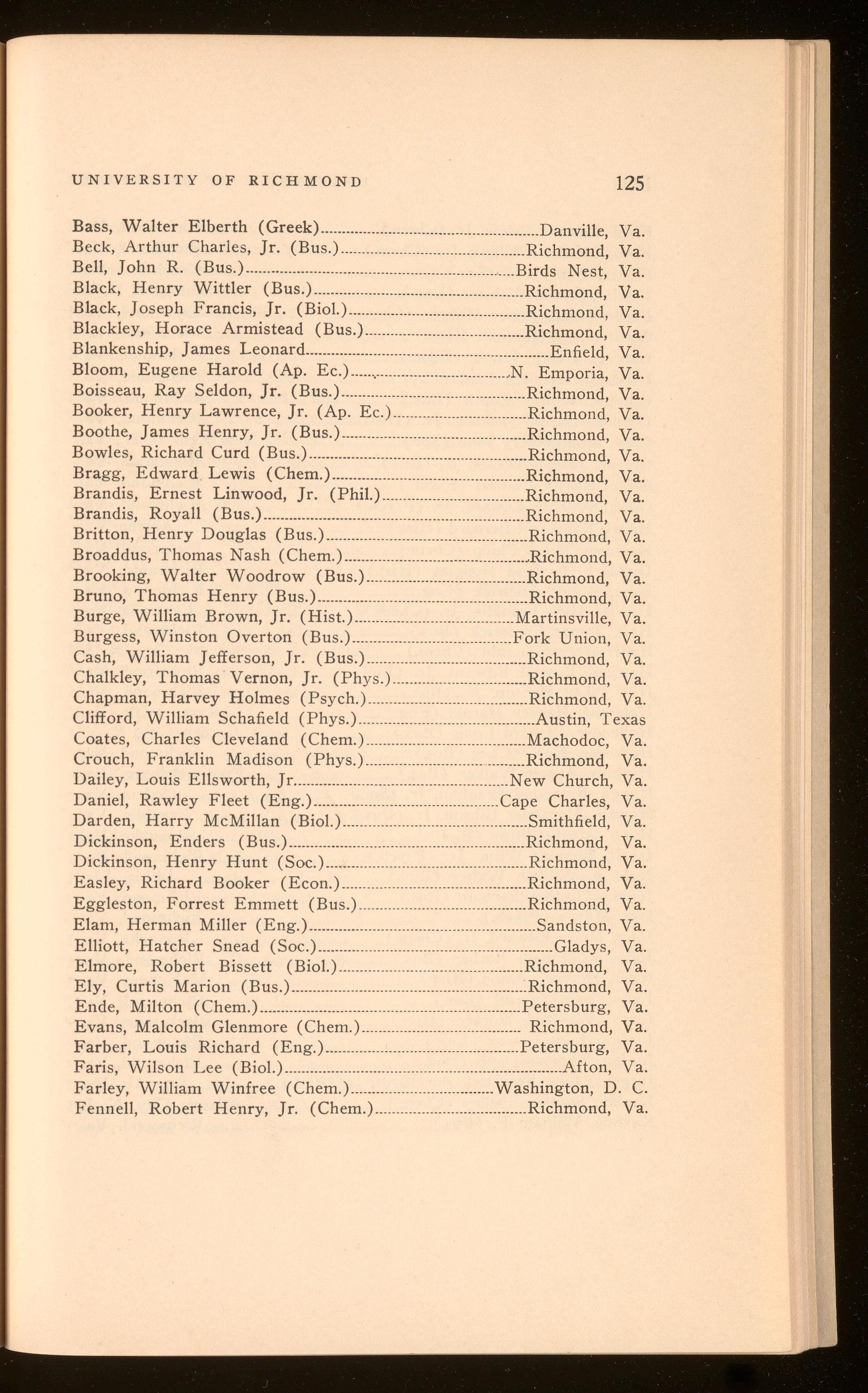
Bass, Walter Elberth (Greek) ....................................................Danville, Va.
Beck, Arthur Charles, Jr. (Bus.) ............................................Richmond, Va.
Bell, John R. (Bus.) ........................................................... a •••• Birds Nest, Va.
Black, Henry Wittler (Bus.) ..................................................Richmond, Va.
Black, Joseph Francis, Jr. (Biol.) ..........................................Richmond, Va.
Blackley, Horace Armistead (Bus.) ......................... ............Richmond, Va. Blankenship, James Leonard ..........................................................Enfield, Va.
Bloom, Eugene Harold (Ap. Ec.) .......················-···············•N. Emporia, Va. Boisseau, Ray Seldon, Jr. (Bus.) ............................................Richmond, Va.
Booker, Henry Lawrence, Jr. (Ap. Ec.) Richmond, Va. Boothe, James Henry, Jr. (Bus.) Richmond, Va. Bowles, Richard Curd (Bus.) Richmond, Va. Bragg, Edward Lewis (Chem.) ..............................................Richmond, Va.
Brandis, Ernest Linwood, Jr. (Phil.) Richmond, Va. Brandis, Royall (Bus.) ..............................................................Richmond, Va.
Britton, Henry Douglas (Bus.) ................................................Richmond, Va.
Broaddus, Thomas Nash (Chem.) ...........................................•Richmond, Va.
Brooking, Walter Woodrow (Bus.) Richmond, Va.
Bruno, Thomas Henry (Bus.) ..................................................Richmond, Va.
Burge, William Brown, Jr. (Hist.) ......................................Martinsville, Va. Burgess, Winston Overton (Bus.) ......................................Fork Union, Va. Cash, William Jefferson, Jr. (Bus.) ......................................Richmond, Va.
Chalkley, Thomas Vernon, Jr. (Phys.) ...........Richmond, Va.
Chapman, Harvey Holmes (Psych.) Richmond, Va.
Clifford, William Schafield (Phys.) Austin, Texas Coates, Charles Cleveland (Chem.) Machodoc, Va.
Crouch, Franklin Madison (Phys.) ......................................Richmond, Va.
Dailey, Louis Ellsworth, Jr ...................................................New Church, Va.
Daniel, Rawley Fleet (Eng.) Cape Charles, Va.
Darden, Harry McMillan (Biol.) ............................................Smithfield, Va. Dickinson, Enders (Bus.) ........................................................Richmond, Va.
Dickinson, Henry Hunt (Soc.) Richmond, Va.
Easley, Richard Booker (Econ.) ............................................Richmond, Va.
Eggleston, Forrest Emmett (Bus.) Richmond, Va.
Elam, Herman Miller (Eng.) Sandston, Va. Elliott, Hatcher Snead (Soc.) ........................................................Gladys, Va.
Elmore, Robert Bissett (Biol.) ............................................Richmond, Va. Ely, Curtis Marion (Bus.) .......................................................:Richmond, Va.
Ende, Milton (Chem.) Petersburg, Va. Evans, Malcolm Glenmore (Chem.) Richmond, Va.
Farber, Louis Richard (Eng.) ..............................................Petersburg, Va.
Faris, Wilson Lee (Biol.) ..................................................................Afton, Va.
Farley, William Winfree (Chem.) ..................................Washington, D. C.
Fennell, Robert Henry, Jr. (Chem.) ....................................Richmond, Va.
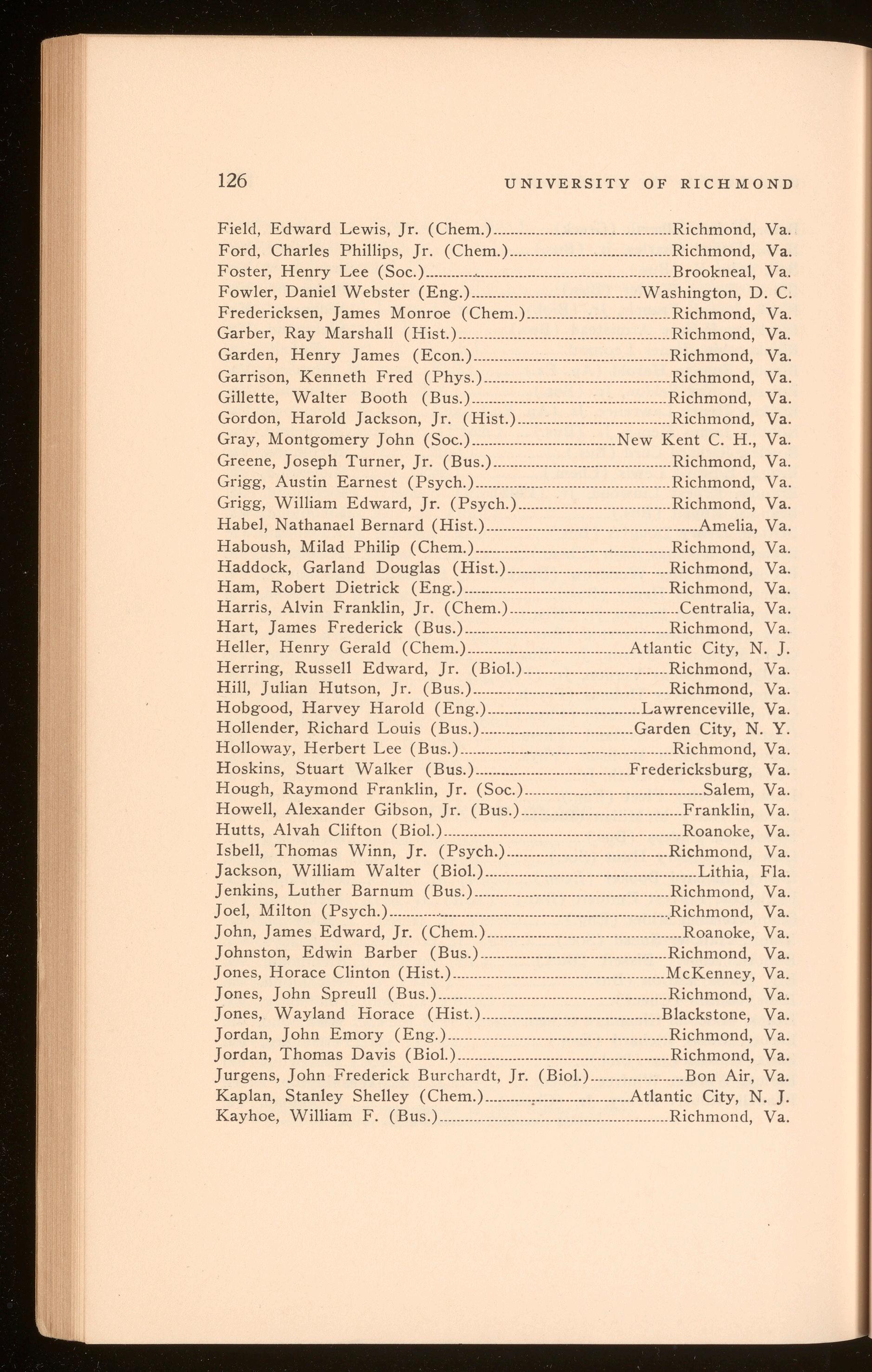
UNIVERSITY OF RICHMOND
Field, Edward L ewi s , Jr (Chem.) Richmond, Va
Ford , Charles Phillip s , Jr. (Chem.) ...................................... Richmond, Va
Foster, Henry Lee (Soc . ) ...........,................................. Brookneal, Va
Fowler, Daniel Web s t e r (Eng.) .Wa s hington, D. C.
Fredericksen, James Monro e ( Chem ) Richmond, Va.
Garb e r , Ray Mar s hall (Hist.) .. Richmond , Va .
Garden , Henry Jam e s (Econ ) . Richmond, Va
Garrison , Kenneth Fred (Phys.) . Richmond, Va
Gillette, Walter Booth (Bu s .) ............................... Richmond , Va.
Gordon , Harold Jack s on, Jr. (Hist ) ... Richmond, Va .
Gray , Montgomery John (Soc ) .... New Kent C. H., Va .
Greene, Joseph Turner, Jr. (Bus.) .. Richmond, Va .
Grigg, Austin Earnest (Psych.) .... ................. Richmond, Va .
Grigg, William Edward, Jr. (Psych ) ..... Richmond, Va.
Habel, Nathanael Bernard (Hist.) ...... ....Amelia, Va
Haboush, Milad Philip (Chem .) ............................... , Richmond, Va
Haddock, Garland Douglas (Hist.) ......................................Richmond, Va
Ham, Robert Dietrick (En g .) Richmond, Va.
Harris, Alvin Franklin, Jr. (Chem ) . Centralia, Va.
Hart, James Frederick (Bus .) ................................................ Richmond , Va.
Heller, Henry G e rald ( C h em.) . Atlantic City, N. J.
Herring, Russell Edward , Jr. (Biol.) Richmond, Va
Hill, Julian Hut s on, Jr. (Bu s. ) .............................................. Richmond, Va.
Hobgood, Harvey Harold (Eng.) .. Lawrenceville, Va .
Hollender, Richard Loui s (Bus.) ....................................Garden City, N . Y .
Hollow a y , Herbert L ee (Bus.) • .Richmond, Va .
Hoskins, Stuart Walker (Bus ) ....................Fr e dericksburg, Va.
Hough , Raymond Franklin, Jr. (Soc .) .... Salem , Va
Howell , Alexand er Gib s on , Jr (Bu s. ) . .Franklin, Va .
Hutts, Alvah Clifton (Biol. ) ............................ Roan ok e , Va. Isbell, Thomas Winn, Jr. (Psych ) ......Richmond, Va . Jackson, William Walter (Biol.) .. Lithia , Fla
Jenkins, Luth er Barnum (Bus ) .................. Richm o nd, Va .
Joel, Milton (P s ych.) .......... Ri c hmond, Va
John, James Edward, Jr. (Chem ) .Roanoke, Va.
Johnston, Edwin Barber (Bus.) ................ Richmond, Va. Jone s , Horace Clinton (Hist .) McKenney, Va
Jones, J o hn Spr e ull (Bu s .) Richmond , Va.
Jones, Wayl a nd Horace (Hist .) ................................ Blackstone , Va.
Jordan, John Emory (En g. ) ........... ..Richmond, Va
Jordan, Thomas Davi s (Biol.) ............................. Richmond, Va.
Jurgens, John Fr e derick Burchardt , Jr . (Biol.) .......... Bon Air, Va
Kaplan , Stanley Shell ey (Chem.) . , Atlantic City, N J. Kayhoe, William F. (Bu s .) ................................ Richmond , Va.
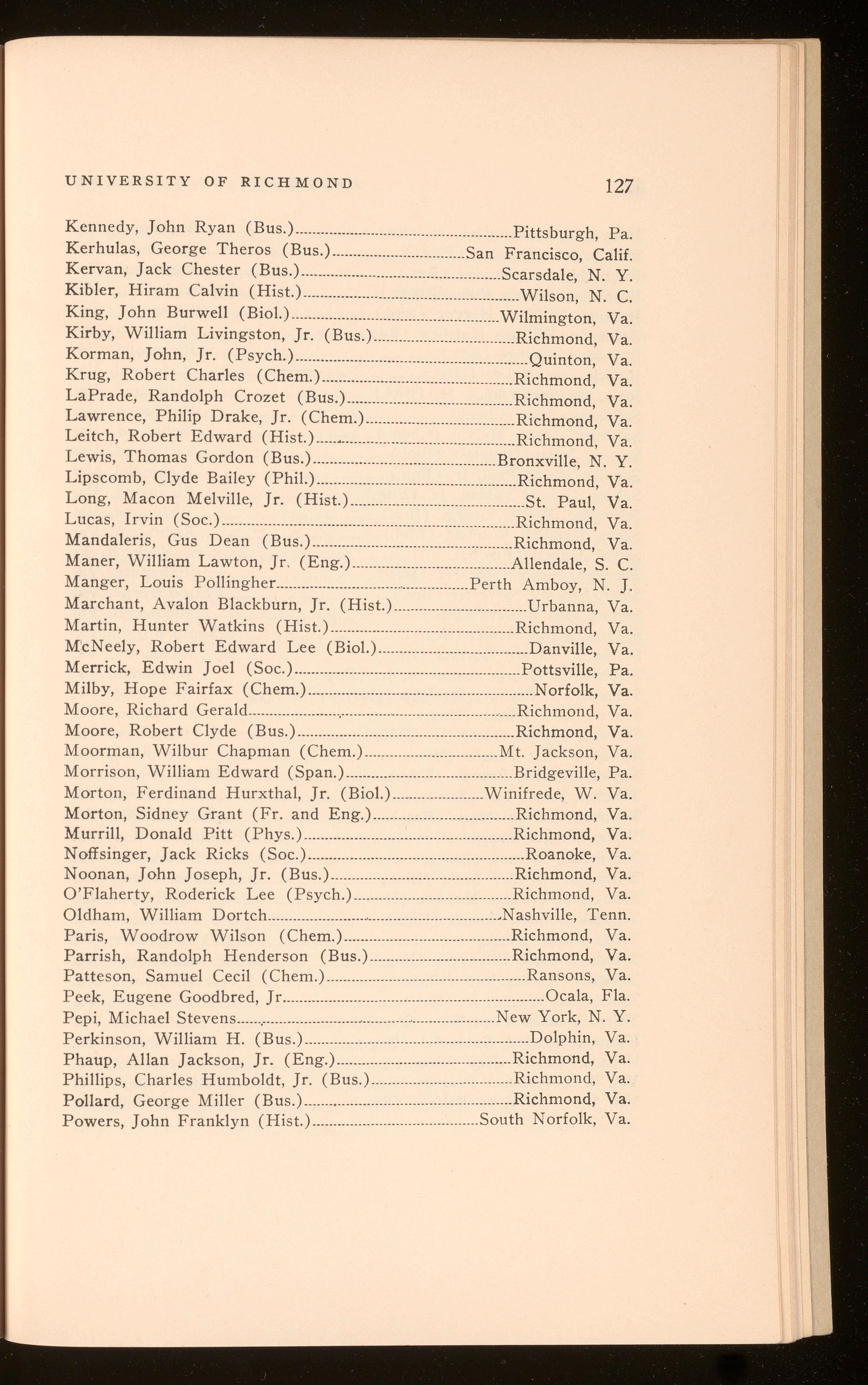
UNIVERSITY OF RICHMOND
Kennedy, John Ryan (Bus.) ....................................................Pittsburgh, Pa. Kerhulas, George Theros (Bus.) ................................San Francisco, Calif. Kervan, Jack Chester (Bus.) ................................................Scarsdale, N. Y. Kibler, Hiram Calvin (Hist.) Wilson, N. C. King, John Burwell (Biol.) Wilmington, Va. Kirby, William Livingston, Jr. (Bus.) Richmond, Va. Korman, John, Jr. (Psych.) ........................................................Quinton, Va. Krug, Robert Charles (Chem.) Richmond, Va. LaPrade, Randolph Crozet (Bus.) ....................... Richmond, Va. Lawrence, Philip Drake, Jr. (Chem.) ....................................Richmond, Va. Leitch, Robert Edward (Hist.) .....•..........................................Richmond, Va. Lewis, Thomas Gordon (Bus.) Bronxville, N. Y. Lipscomb, Clyde Bailey (Phil.) ................................................Richmond, Va.
Long, Macon Melville, Jr. (Hist.) ......................................... St. Paul, Va. Lucas, Irvin (Soc.) ...................................................................... Richmond, Va. Mandaleris, Gus Dean (Bus.) ................................................Richmond, Va. Maner, William Lawton, Jr , (Eng.) ......................................Allendale, S. C. Manger, Louis Pollingher ............................................... Perth Amboy, N. J. Marchant, Avalon Blackburn, Jr. (Hist.) ................................Urbanna, Va. Martin, Hunter Watkins (Hist.) ............................................ Richmond, Va. M'cNeely, Robert Edward Lee (Biol.) ....................................Danville, Va. Merrick, Edwin Joel (Soc.) ......................................................Pottsville, Pa. Milby, Hope Fairfax (Chem.) ......................................................Norfolk, Va. Moore, Richard Gerald ...................................................................Richmond, Va. Moore, Robert Clyde (Bus.) .................................................... Richmond, Va. Moorman, Wilbur Chapman (Chem.) ................................Mt. Jackson, Va. Morrison, William Edward (Span.) ........................................ Bridgeville, Pa. Morton, Ferdinand Hurxthal, Jr. (Biol.) ........ Winifrede, W. Va. Morton, Sidney Grant (Fr. and Eng.) ..................................Richmond, Va. Murrill, Donald Pitt (Phys.) ..................................................Richmond, Va. Noffsinger, Jack Ricks (Soc.) ....................................................Roanoke, Va. Noonan, John Joseph, Jr. (Bus.) ............................................Richmond, Va. O'Flaherty, Roderick Lee (Psych.) ......................................Richmond, Va. Oldham, William Dortch ,N ash ville, Tenn. Paris, Woodrow Wilson (Chem.) ........................................Richmond, Va. Parrish, Randolph Henderson (Bus.) ..................................Richmond, Va. Patteson, Samuel Cecil (Chem.) ................................................Ransons, Va. Peek, Eugene Goodbred, Jr. ..............................................................Ocala, Fla. Pepi, Michael Stevens .............................. , ....................New York, N. Y. Perkinson, William H. (Bus.) ..............Dolphin, Va. Phaup, Allan Jackson, Jr. (Eng.) ..........................................Richmond, Va. Phillips, Charles Humboldt, Jr. (Bus.) ..................................Richmond, Va. Pollard, George Miller (Bus.) ..................................................Richmond, Va. Powers, John Franklyn (Hist.) ........................................South Norfolk, Va.
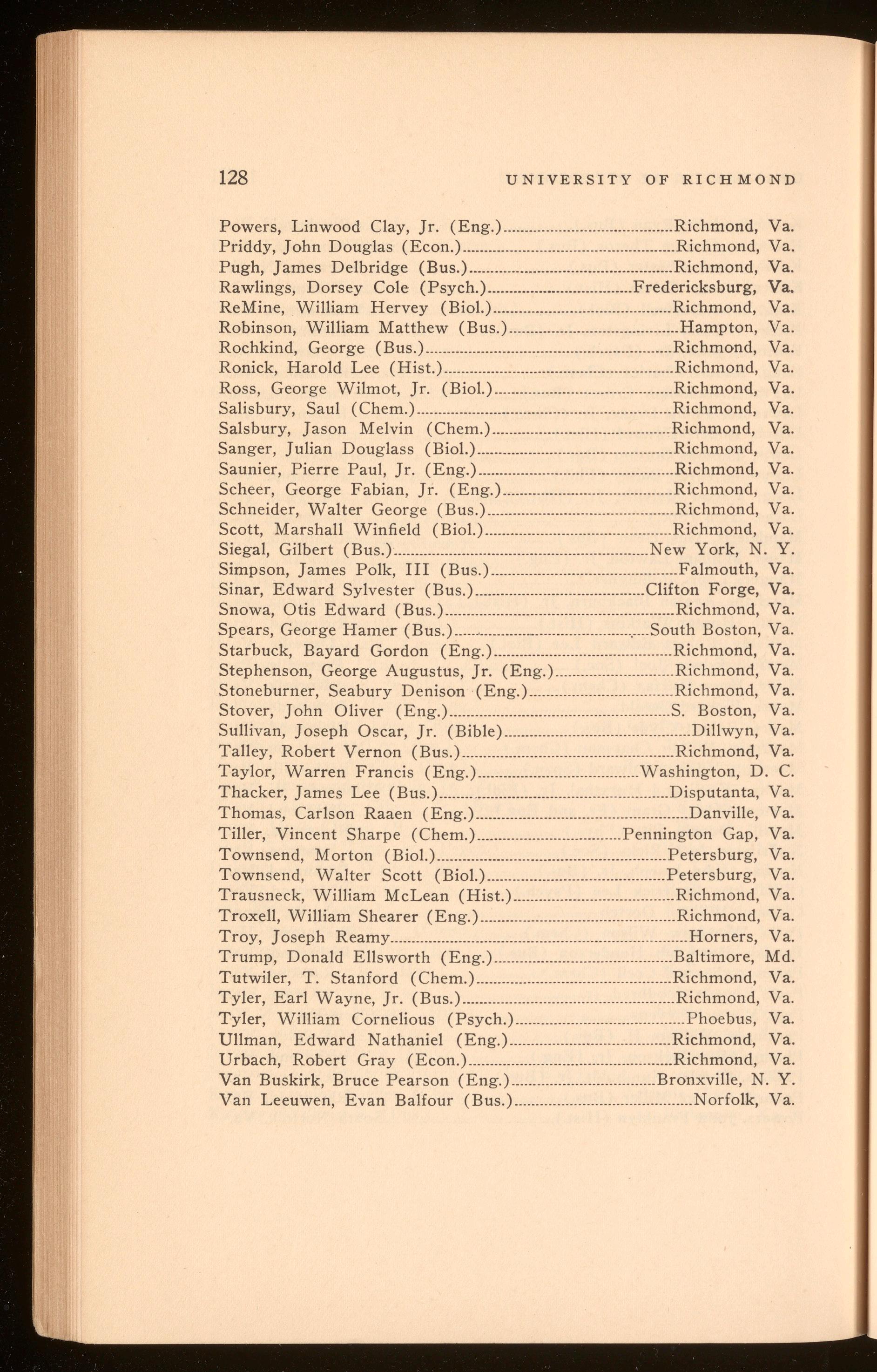
UNIVERSITY OF RICHMOND
Powers, Linwood Clay , Jr. (Eng ) Richmond, Va.
Priddy, John Douglas (Econ ) ..... Richmond , Va.
Pugh, James Delbridge (Bus ) . Richmond, Va.
Rawlings, Dorsey Cole (Psych.) ..................................Fredericksburg, Va.
ReMine, WiJJiam Hervey (Biol.) .... .Richmond, Va.
Robinson, William Matthew (Bus ) .. Hampton, Va.
Rochkind, George (Bus.) .......................................................... Richmond, Va.
Ronick, Harold Lee (Hist.) .................. ...... Richmond, Va
Ross, George Wilmot, Jr. (Biol.) .................. Richmond, Va.
Salisbury, Saul (Chem.) ........Richmond, Va.
Salsbury , Jason Melvin (Chem.) ..........................................Richmond, Va .
Sanger , Julian Douglass (Biol.) ....... .... Richmond, Va.
Saunier, Pierre Paul, Jr. (Eng.) ............ Richmond, Va
Scheer, George Fabian, Jr (Eng.) ...... .Richmond , Va
Schneider, Walter Geor g e (Bus.) ............................................Richmond, Va.
Scott, Marsha11 Winfield (Biol.) Richmond, Va
Siegal, Gilbert (Bus.) New York, N. Y
Simpson, James Polk, III (Bu s .) ............ Falmouth , Va
Sinar, Edward Sylvester (Bus ) .. Clifton Forge, Va.
Snowa, Otis Edward (Bus .) ..................... ................................. Richmond, Va.
Spear s , George Hamer (Bus .) .....,.............................. ........... South Bo s ton, Va.
Starbuck, Bayard Gordon (Eng.) .......................................... Richmond, Va .
Stephenson, George Augustus, Jr. (En g. ) Ri c hmond , Va
Stoneburner, Seabury Denison (Eng.) ........ .......................... Ri c hmond , Va .
Stover , John Oliver (Eng.) S Boston, Va.
SulJivan, Joseph Oscar, Jr (Bible) Dillwyn, Va.
Talley, Robert Vernon (Bus.) .. .Richmond, Va
Taylor, Warren Francis (Eng .) ......................................Washington, D . C.
Thacker, James Lee (Bus.) ........ Di sputant a, Va
Thomas, Carlson Raaen (Eng.) Danvill e, Va.
Tiller, Vincent Sharpe (Chem.) .. Pennin g ton Gap , Va
Townsend , Morton (Biol.) ...................................................... P etersbur g, Va.
Townsend , Walter Scott (Biol.) ...... ..Peter s burg, Va.
Trausneck , William McLean (Hist.) ..Richmond, Va
Troxell, William Shearer (En g. ) ..Richmond , Va. Troy, Joseph Reamy .. Horners, Va
Trump, Donald Ellsworth (Eng ) .......... ...Baltimore, Md
Tutwiler, T. Stanford (Chem.) Richmond, Va
Tyler, Earl Wayne, Jr. (Bus.) ......................................... .........Richmond , Va .
Tyler , WiJJiam Cornelious (Psych.) Pho e bu s, Va
Ullman, Edward Nathaniel (Eng.) .... Richmond, Va.
Urbach, Robert Gray (Econ ) ........ ......Richmond, Va
Van Buskirk, Bruce Pearson (Eng ) Bron x ville, N Y
Van Leeuwen, Evan Balfour (Bus.) .. Norfolk, Va
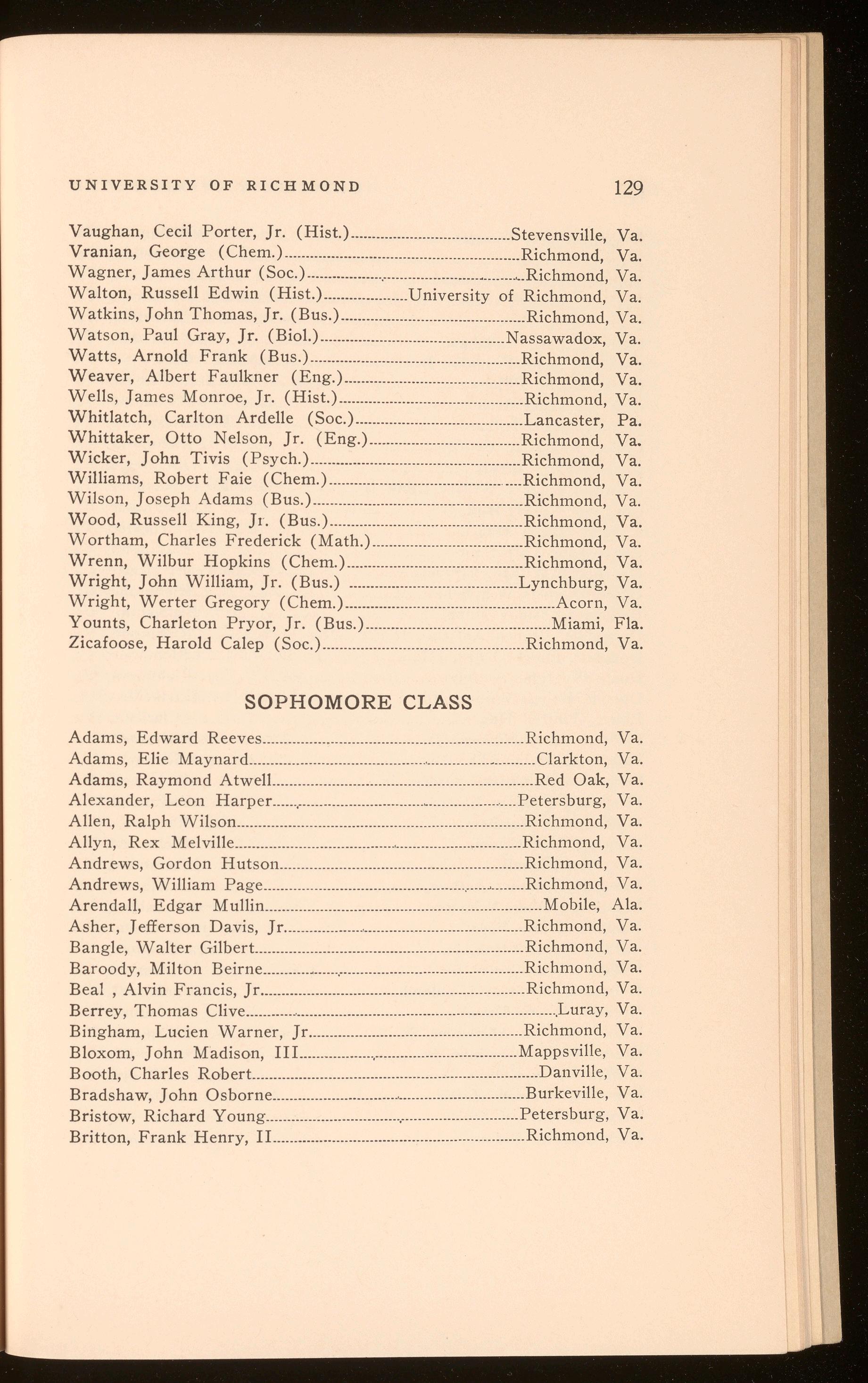
Vaughan, Cecil Porter, Jr. (Hist.) ......................................Stevensville, Va. Vranian, George (Chem.) ........................................................Richmond, Va.
Wagner, James Arthur (Soc.) .....................................................Richmond, Va.
Walton, Russell Edwin (Hist.) ....................University of Richmond, Va.
Watkins, John Thomas, Jr. (Bus.) ............................................Richmond, Va. Watson, Paul Gray, Jr. (Biol.) ............................................Nassawadox, Va. Watts, Arnold Frank (Bus.) ......................................Richmond, Va.
Weaver, Albert Faulkner (Eng.) ..........................................Richmond, Va.
Wells, James Monroe, Jr. (Hist.) ............................................Richmond, Va.
Whitlatch, Carlton Ardelle (Soc.) ........................................Lancaster, Pa. Whittaker, Otto Nelson, Jr. (Eng.) Richmond, Va. Wicker, John Tivis (Psych.) ..................................................Richmond, Va.
Williams, Robert Faie (Chem.) Richmond, Va. Wilson, Joseph Adams (Bus.) Richmond, Va. Wood, Russell King, Jr. (Bus.) ..............................................Richmond, Va. Wortham, Charles Frederick (Math.) ....................................Richmond, Va. Wrenn, Wilbur Hopkins (Chem.) Richmond, Va. Wright, John William, Jr. (Bus.) ........................................Lynchburg, Va.
Wright, Werter Gregory (Chem.) Acorn, Va. Younts, Charleton Pryor, Jr. (Bus.) Miami, Fla. Zicafoose, Harold Calep (Soc.) Richmond, Va.
Adams, Edward Reeves ..............................................................Richmond, Va.
Adams, Elie Maynard .....................................................................Clarkton, Va.
Adams, Raymond Atwell... ...........................................................Red Oak, Va.
Alexander, Leon Harper Petersburg, Va. Allen, Ralph Wilson ....................................................................Richmond, Va. Allyn, Rex Melville ...................... ..............................Richmond, Va.
Andrews, Gordon Hutson ..........................................................Richmond, Va. Andrews, William Page ...............................................................Richmond, Va.
Arendall, Edgar Mullin ..................................................................Mobile, A la Asher, Jefferson Davis, Jr ..........................................................Richmond, Va. Bangle, Walter Gilbert ................................................................Richmond, Va. Baroody, Milton Beirne ...............................................................Richmond, Va.
Beal , Alvin Francis, Jr. ......................Richmond, Va. Berrey, Thomas Clive ............ ..............................................Luray, Va. Bingham, Lucien Warner, Jr. Richmond, Va. Bloxom, John Madison, III.. ...................................................Mappsville, Va. Booth, Charles Robert ....................................................................Danville, Va.
Bradshaw, John Osborne .............................................................Burkeville, Va.
Bristow, Richard Young Petersburg, Va. Britton, Frank Henry, 11............................................................Richmond, Va.
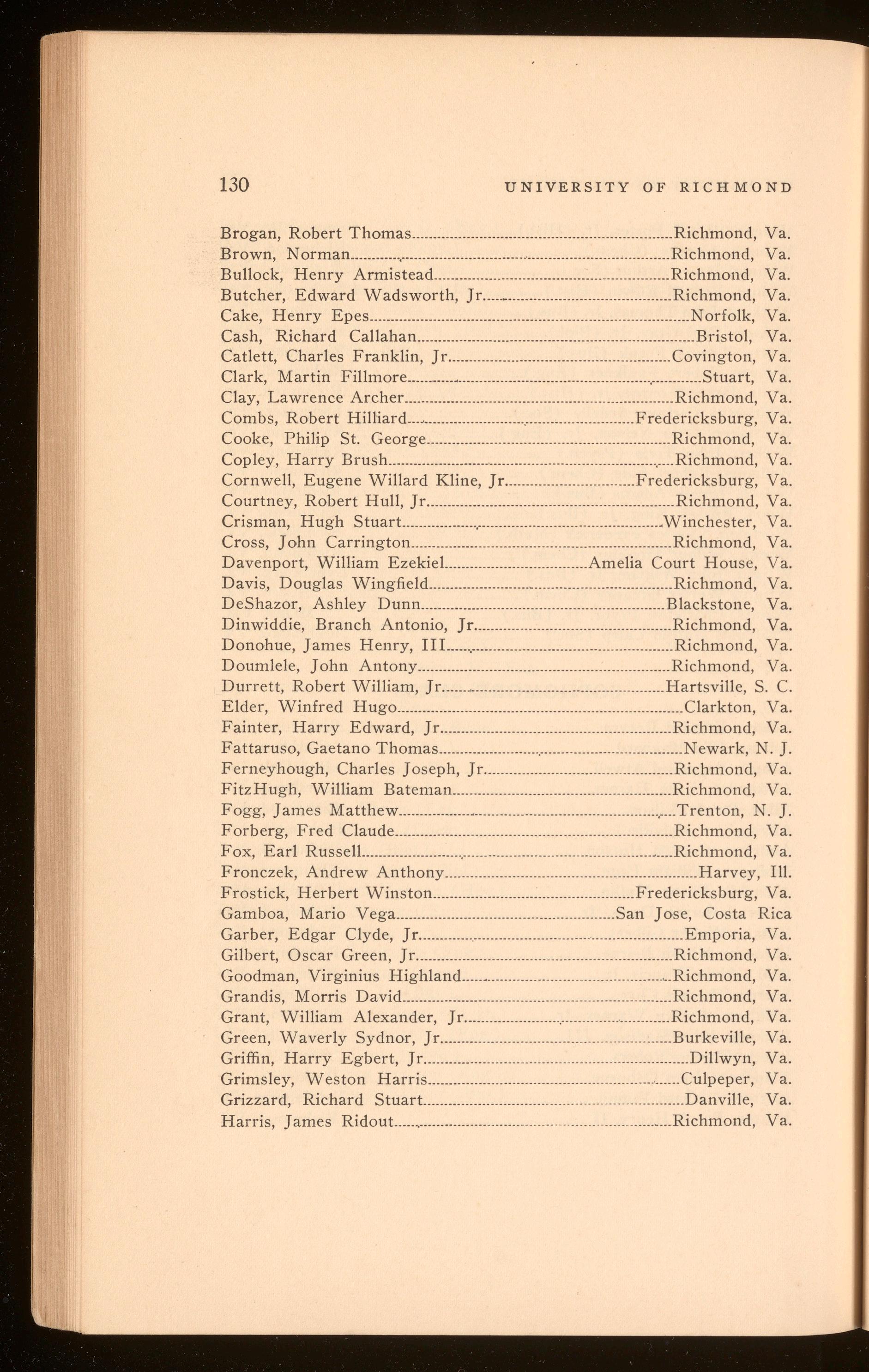
UNIVERSITY OF RICHMOND
Brogan, Robert Thomas .............................................. ............... Richmond, Va. Brown, N orman ............, .................................. Richmond, Va. Bullock, Henry Armistead . .... Richmond, Va. Butcher, Edward Wadsworth, Jr Richmond, Va. Cake, Henry Epes ............................................................................ Norfolk, Va. Cash, Richard Callahan .................................................................. Bristol, Va. Catlett, Charles Franklin, Jr. Covington, Va. Clark, Martin Fillmore ....................................................................... Stuart, Va. Clay, Lawrence Archer Richmond, Va. Combs, Robert Hilliard Fredericksburg, Va. Cooke, Philip St. George Richmond, Va Copley, Harry Brush ......................................................................Richmond, Va. Cornwell, Eugene Willard Kline, Jr ...................... ..Fredericksburg, Va. Courtney, Robert Hull, Jr ........................................................... Richmond, Va. Crisman, Hugh Stuart.. .............................................................Winchester, Va. Cross, John Carrington ............................... ........................... Richmond, Va. Davenport, William EzekieL. ............................... Amelia Court House, Va. Davis, Douglas Wingfield ........................... ............................... Richmond, Va. DeShazor, Ashley Dunn .......................................................... Blackstone, Va. Dinwiddie, Branch Antonio, Jr ................. ................ .............. Richmond, Va. Donohue, James Henry, IIL Richmond, Va.
Doumlele, John Antony ............................................................ Richmond, Va.
Durrett, Robert William, J r.. ·-·····
.............Hartsville, S. C. Elder, Winfred Hugo .............................................. .................. ....Clarkton, Va.
Fainter, Harry Edward, Jr.. ..................................................... Richmond, Va.
Fattaruso, Gaetano Thomas Newark, N. J. Ferneyhough, Charles Joseph, Jr. ............................................ Richmond, Va. FitzHugh, William Bateman ...................................... ..Richmond, Va. Fogg, James Matthew ...................................................................Trenton, N. J. Forberg, Fred Claude Richmond, Va. Fox, Earl RusselL. Richmond, Va. Fronczek, Andrew Anthony ..... Harvey, Ill. Frostick, Herbert Winston .................................... ...Fredericksburg, Va. Gamboa, Mario Vega .................................................... San Jose, Costa Rica Garber, Edgar Clyde, J r ...... ............... Emporia, Va. Gilbert, Oscar Green, Jr ............................... Richmond, Va. Goodman, Virginius Highland ................. ................................ .Richmond, Va. Grandis, Morris David ..................................... ................. ..........Richmond, Va. Grant, William Alexander, Jr. ...... ..Richmond, Va. Green, Waverly Sydnor, Jr ................................. ................ ......Burkeville, Va. Griffin, Harry Egbert, Jr ....................... ...Dillwyn, Va. Grimsley, Weston Harris .............................. ..................... .......... Culpeper, Va. Grizzard, Richard Stuart ............................ .................. ................Danville, Va. Harris, James Ridout ....., Richmond, Va.
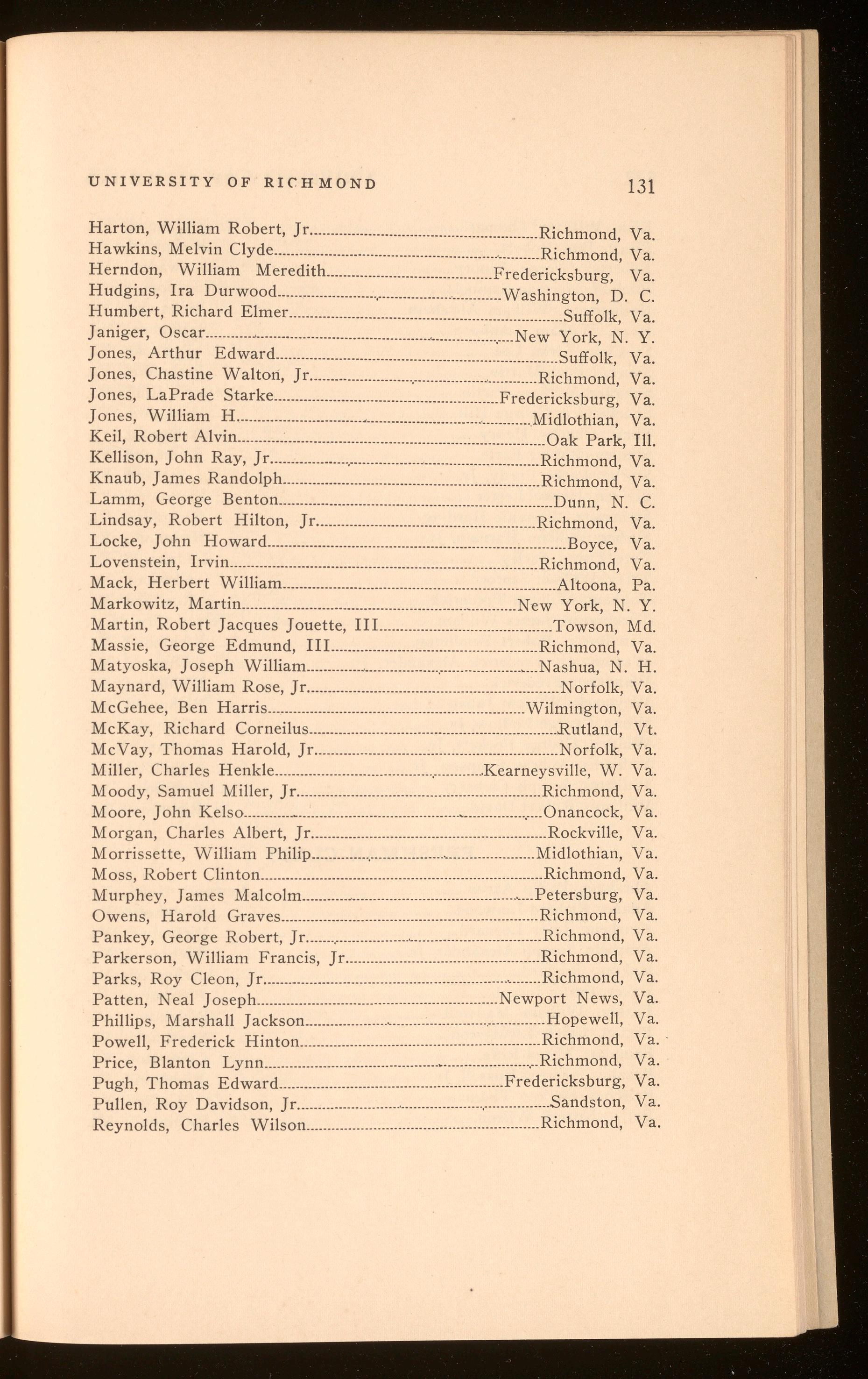
Harton, William Robert, Jr Richmond, Va.
Hawkins, Melvin Clyde .............................................................. Richmond, Va.
Herndon, William Meredith ........................................Fredericksburg, Va.
Hudgins, Ira Durwood ............Washington, D. C.
Humbert, Richard Elmer ..................................................................Suffolk Va
Janiger, Oscar.. .....................................................•....................New York, N.Y:
Jones, Arthur Edward ....................................................................Suffolk, Va.
Jones, Chastine Walton, Jr Richmond, Va.
Jones, LaPrade Starke Fredericksburg, Va.
Jones, William H ..............................•..........................................Midlothian, Va.
Keil, Robert Alvin ..........................................................................Oak Park, Ill.
Kellison, John Ray, J r.. ................................................................ Richmond, Va.
Knaub, James Randolph ..............................................................Richmond, Va.
Lamm, George Benton Dunn, N. C.
Lindsay, Robert Hilton, Jr .....................................................Richmond, Va.
Locke, John Howard Boyce, Va.
Lovenstein, Irvin Richmond, Va.
Mack, Herbert William ..................................................................Altoona, Pa.
Markowitz, Martin ..................................................................New York, N. Y.
Martin, Robert Jacques Jouette, III.. ........................................Towson, Md.
Massie, George Edmund, III.. Richmond, Va.
Matyoska, Joseph William .........................................................Nashua, N. H.
Maynard, William Rose, Jr .............................................................Norfolk, Va.
McGehee, Ben Harris Wilmington, Va.
McKay, Richard Corneilus ............................................................Rutland, Vt.
McVay, Thomas Harold, Jr. Norfolk, Va.
Miller, Charles Henkle ..................................................,Kearneysville, W. Va.
Moody, Samuel Miller, Jr ...........................................................Richmond, Va.
Moore, John Kelso .........................................................................Onancock, Va.
Morgan, Charles Albert, Jr .........................................................Rockville, Va.
Morrissette, William Philip ........................................................Midlothian, Va.
Moss, Robert Clinton ....................................................................Richmond, Va.
Murphey, James Malcolm ....................................................•....Petersburg, Va.
Owens, Harold Graves ..............................................................Richmond, Va.
Pankey, George Robert, Jr. ..........................................................Richmond, Va.
Parkerson, William Francis, Jr Richmond, Va.
Parks, Roy Cleon, Jr. ..........................................................•.......Richmond, Va.
Patten, Neal Joseph ..........................................................Newport News, Va.
Phillips, Marshall J ackson ...........................................................Hopewell, Va.
Powell, Frederick Hinton Richmond, Va.·
Price, Blanton Lynn ...................................................................Richmond, Va.
Pugh, Thomas Edward ......................................................Fredericksburg, Va.
Pullen, Roy Davidson, Jr ...............................................................Sandston, Va.
Reynolds, Charles Wilson ........................................................Richmond, Va.
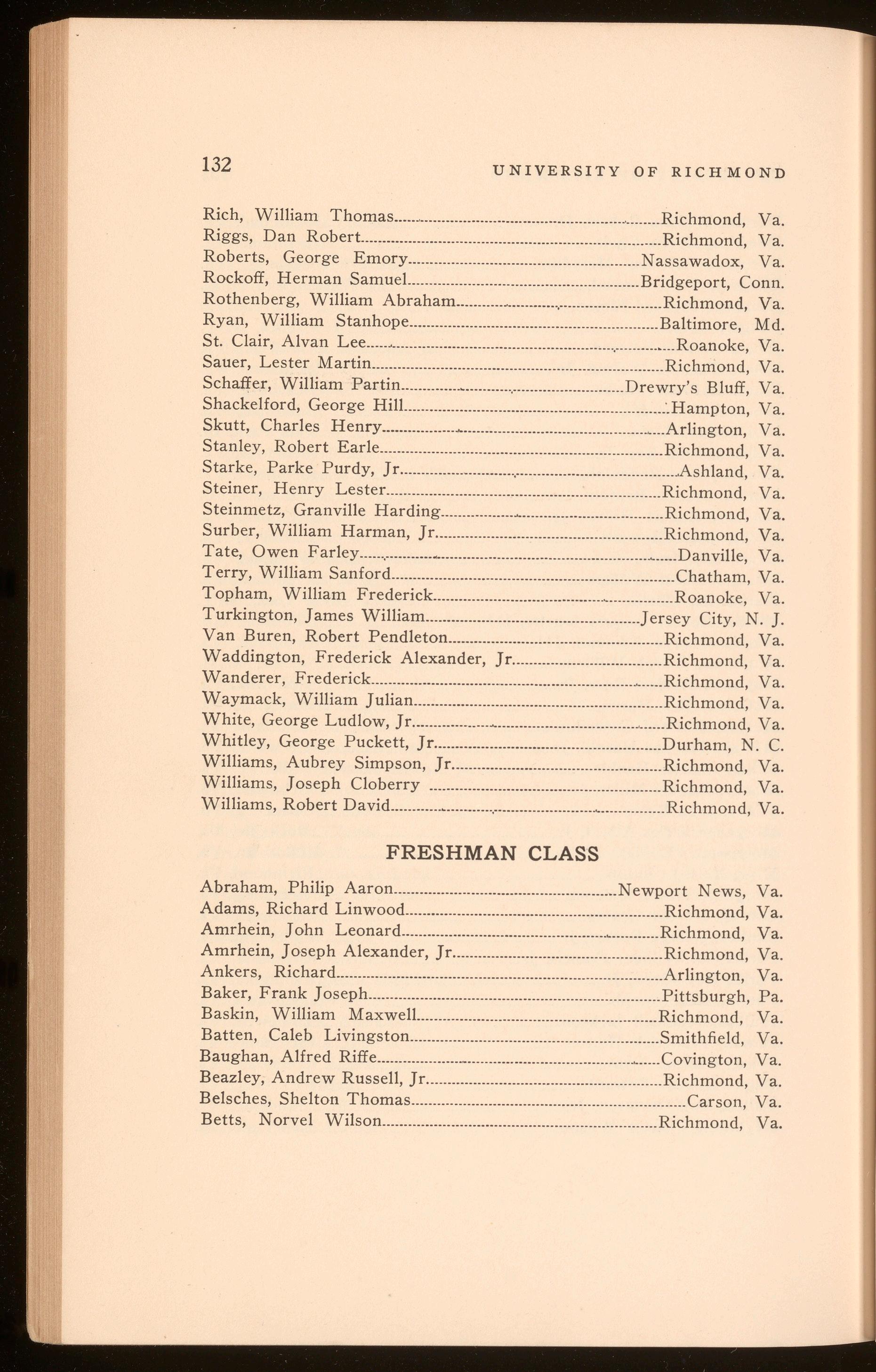
Rich, William Thomas .................................................... .-........Richmond, Va.
Riggs, Dan Robert ...................................................................... Richmond, Va.
Roberts, George Emory ...................................................... Nassawadox, Va.
Rockoff, Herman Samuel.. .................................................... Bridgeport, Conn.
Rothenberg, William Abraham ........................,........................Richmond, Va.
Ryan, William Stanhope .......................................................... Baltimore, Md.
St. Clair, Alvan Lee ,...................................................................Roanoke, Va.
Sauer, Lester Martin .................................................................... Richmond, Va.
Schaffer, William Partin ..............•......................................Drewry's Bluff, Va.
Shackelford, George Hill... ......................................................... .'.Hampton, Va.
Skutt, Charles Henry ................. ............................................... Arlington, Va.
Stanley, Robert Earle .................................................................. Richmond, Va.
Starke, Parke Purdy, Jr. ................................................................•Ashland, Va.
Steiner, Henry Lester ................................................................ Richmond, Va.
Steinmetz, Granville Harding ................. ................................. Richmond, Va.
Surber, William Harman, Jr ..................................................... Richmond, Va.
Tate, Owen Farley ..................•................................................. Danville, Va.
Terry, William Sanford .................................................................. Chatham, Va.
Topham, William Frederick. .......................................-. ..............Roanoke, Va.
Turkington, James William .................................................. Jersey City, N. J.
Van Buren, Robert Pendleton .................................................. Richmond, Va.
Waddington, Frederick Alexander, Jr ................................... Richmond, Va.
Wanderer, Frederick .............................. ............................... - Richmond, Va.
Waymack, William Julian .......................................................... Richmond, Va.
White, George Ludlow, J r ..................- ................................•......Richmond, Va.
Whitley, George Puckett, Jr ..................................................... Durham, N. C.
Williams, Aubrey Simpson, Jr ................................................. Richmond, Va.
Williams, Joseph Cloberry ...................................................... Richmond, Va.
Williams, Robert David ............•...........,....................... ............... Richmond, Va.
Abraham, Philip Aaron .................................................... Newport News, Va.
Adams, Richard Linwood ............................................................ Richmond, Va.
Amrhein, John Leonard ................................................•...........Richmond, Va.
Amrhein, Joseph Alexander, Jr ................................................. Richmond, Va.
Ankers, Richard ............................................................................ Arlington, Va.
Baker, Frank J oseph .................................................................... Pittsburgh, Pa.
Baskin, William Maxwell... ..................................................... Richmond, Va.
Batten, Caleb Livingston .......................................................... Smithfield, Va.
Baughan, Alfred Riffe ......................................................... - .....Covington, Va.
Beazley, Andrew Russell, Jr ....................................................... Richmond, Va.
Belsches, Shelton Thomas ................................................................ Carson, Va.
Betts, Norvel Wilson ................................................................ Richmond, Va.
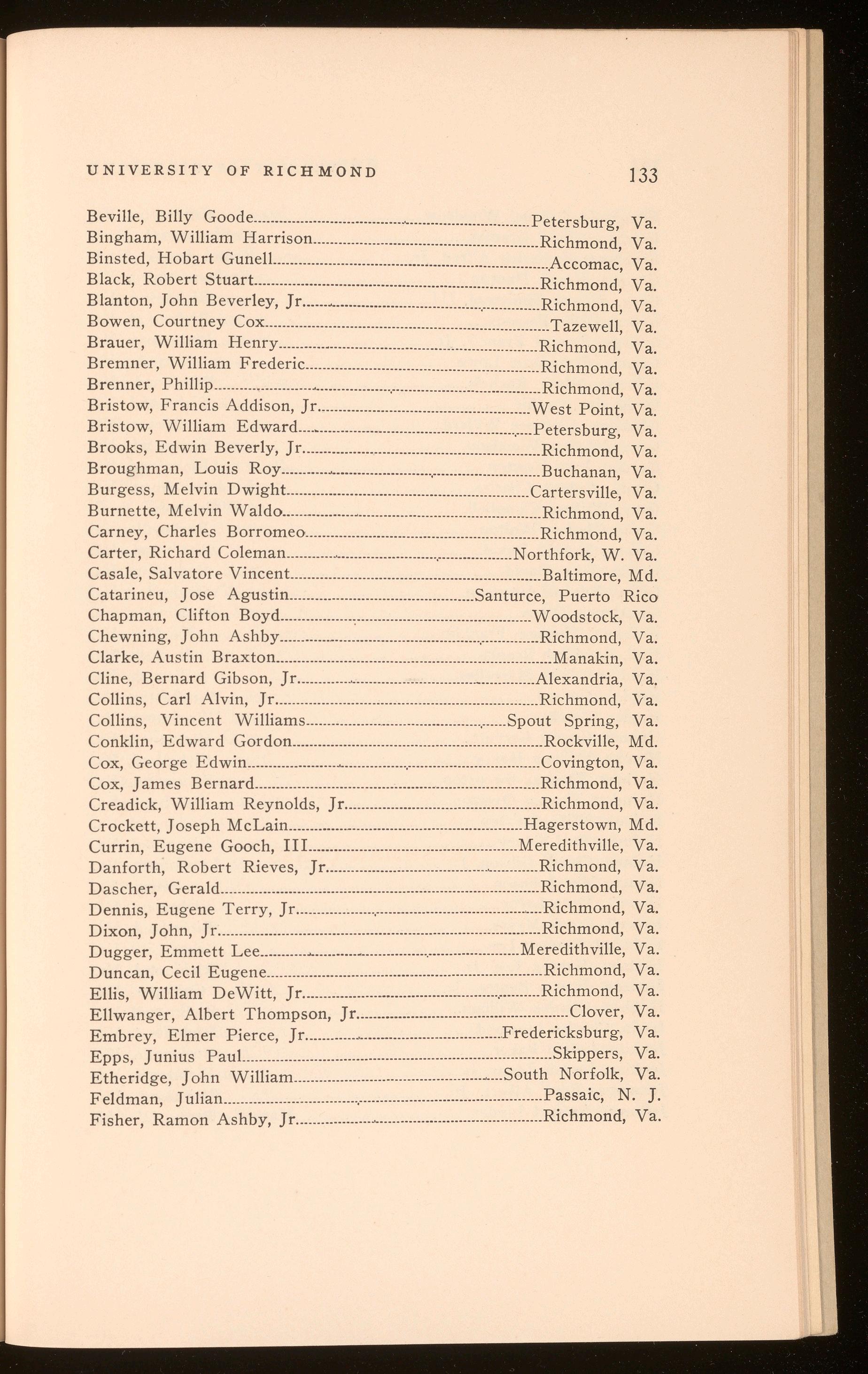
Beville, Billy Goode ...................................., .............................Petersburg, Va.
Bingham, William Harrison ......................................................Richmond, Va.
Binsted, Hobart Gunell... ................................................................Accomac, Va.
Black, Robert Stuart... Richmond, Va.
Blanton, John Beverley, Jr ...... .................................................Richmond, Va.
Bowen, Courtney Cox ....................................................................Tazewell, Va.
Brauer, William Henry Richmond, Va.
Bremner, William Frederic Richmond, Va.
Brenner, Phillip ..............................................................................Richmond, Va.
Bristow, Francis Addison, Jr. ..................................................West Point, Va.
Bristow, William Edward ....•....................................................Petersburg, Va.
Brooks, Edwin Beverly, Jr. Richmond, Va.
Broughman, Louis Roy ........... ..................................................Buchanan, Va.
Burgess, Melvin Dwight Cartersville, Va.
Burnette, Melvin W aldo ..............................................................Richmond, Va.
Carney, Charles Borromeo ........................................................Richmond, Va.
Carter, Richard Coleman ........................................................Northfork, W. Va.
Casale, Salvatore Vincent Baltimore, Md.
Catarineu, Jose Agustin ............................................Santurce, Puerto Rico
Chapman, Clifton Boyd ,..........................................Woodstock, Va.
Chewning, John Ashby ...............................................................Richmond, Va.
Clarke, Austin Braxton ..................................................................Manakin, Va.
Cline, Bernard Gibson, Jr ............................................•.............Alexandria, Va.
Collins, Carl Alvin, Jr Richmond, Va.
Collins, Vincent Williams .................................................Spout Spring, Va.
Conklin, Edward Gordon ............................................................Rockville, Md.
Cox, George Edwin .......................................................................Covington, Va.
Cox, James Bernard Richmond, Va.
Creadick, William Reynolds, Jr ...............................................Richmond, Va.
Crockett, Joseph McLain ........................................................Hagerstown, Md.
Currin, Eugene Gooch, III.. Meredithville, Va.
Danforth, Robert Rieves, Jr .......................................•...........Richmond, Va.
Dascher, Gerald ............................................................................Richmond, Va.
Dennis, Eugene Terry, Jr. .......................................................•...Richmond, Va.
Dixon, John, Jr .............................................................................Richmond, Va.
Dugger, Emmett Lee ........... Meredithville, Va.
Duncan, Cecil Eugene Richmond, Va.
Ellis, William DeWitt, Jr Richmond, Va.
Ellwanger, Albert Thompson, Jr Clover, Va.
Embrey, Elmer Pierce, Jr ................................................Fredericksburg, Va.
Epps, Junius Paul... .......................................................................Skippers, Va.
Etheridge, John William South Norfolk, Va.
Feldman, Julian ...........................................................................Passaic, N. J.
Fisher, Ramon Ashby, Jr Richmond, Va.
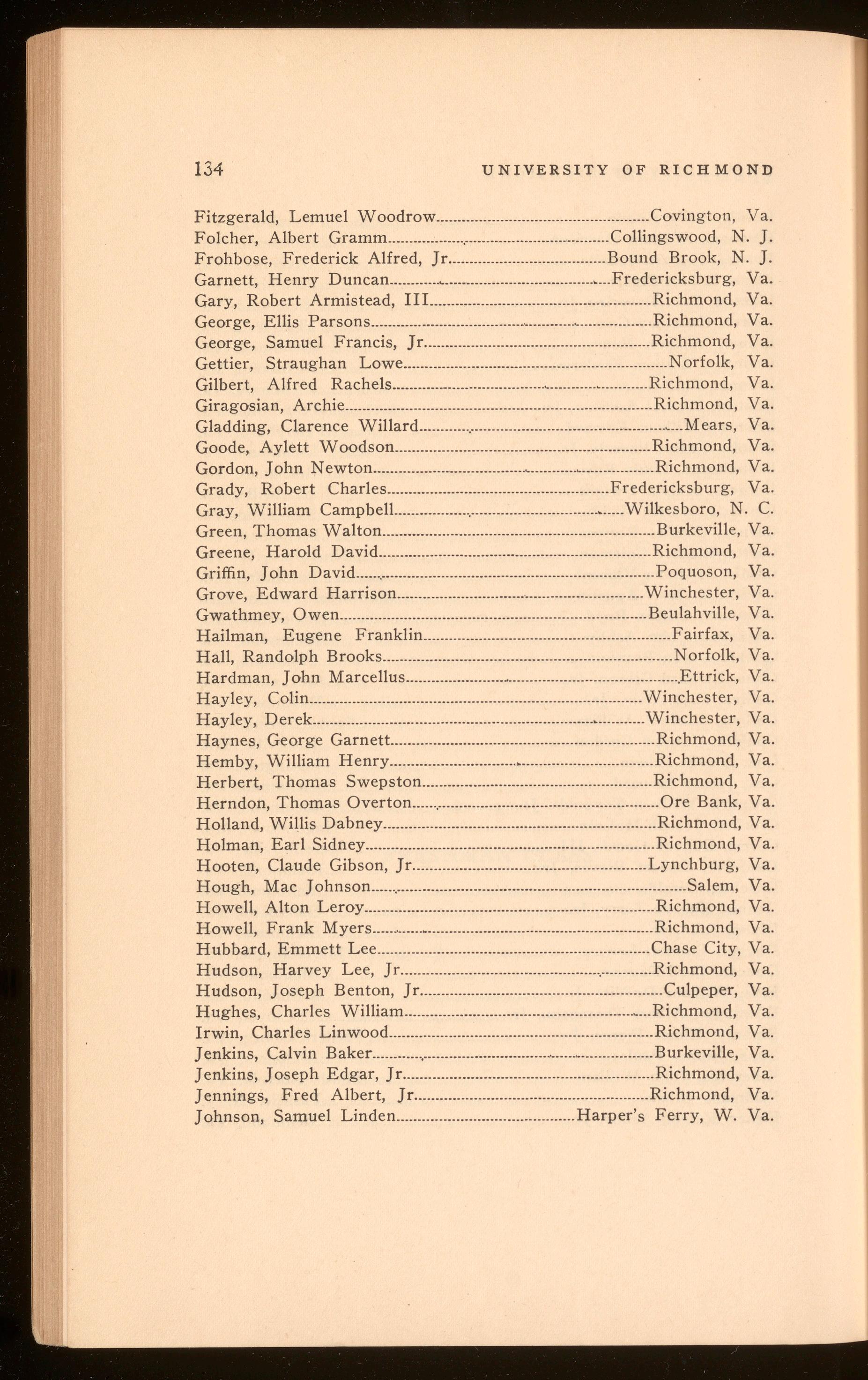
Fitzgerald, Lemuel Woodrow .. Covin g ton , Va .
F olcher, Albert Gramm .......... ...Collingswood, N. J.
Frohbose , Frederick Alfred, Jr .............. .....Bound Brook, N . J.
Garnett, Henry Duncan ............-........ • ..Fred e ricksburg, Va.
Gary, Robert Armistead, IIL ...................... Richmond, Va.
George, Ellis Parson s ...... •.................Richmond, Va.
George, Samuel Francis, Jr ........ ...........................Richmond, Va
Gettier, Strau g han Lowe .. ........Norfolk, Va.
Gilbert, Alfred Rachels .. ..·-······ ····· ·····Richmond, Va
Giragosian , Archie .................................. .Richmond , V a.
Gladding, Clarence Willard ....._............................. •. Mear s , Va
Goode, Aylett Woodson . ........................ Richmond , Va.
Gordon , John Newton .... ............................Richmond, Va
Grady, Robert Charles ........ Fred erick sburg , Va.
Gray, William Campbe!L. ......................... .• Wilke s boro , N . C.
Green, Thomas Walton ....................................... Burk ev ill e , Va
Greene, Harold David .................................. Richmond , Va
Griffin, John David ........................Poquoson, Va
Grove, Edward Harrison .... -............................Winch es t er, Va.
Gwathmey, Owen .................. .... Beulahvill e, Va.
Hailman, Eug ene Franklin ................... . Fairfax, Va .
Hall, Randolph Brooks ........................ Norfolk, Va .
Hardman, John Marc ellus ...........•....................... Ettr ick, Va
Hayley, Colin .... ......................Winch ester, Va.
Hayley, Derek ...... ..............•...........Winchester, Va
Haynes , George Garnett ...... ......... Richmond, Va.
Hemby, William Henry .......................... •. Richmond , Va .
Herbert, Thoma s Swepston ............... Richmond, V a .
Herndon, Thomas Overton .. ................................. Or e Bank, Va.
Holland, Willis Dabney .. ............................... ....Richmond , Va.
Holman, Earl Sidney .... ......................................Richmond, Va
Hooten, Claude Gibson, Jr .......Lynchburg, Va
Hough, Mac J ohnson ..... ....................Salem, Va
Howell, Alton Leroy ......................... Ri c hmond, Va.
Howell, Frank Myers ................... .Ri c hmond, Va.
Hubbard, Emmett Le e ............................. Chase City, Va
Hudson, Harvey Lee , Jr. ...............................Richmond, Va.
Hudson, Jo s eph Benton , Jr ............................. Culpeper , Va
Hughes, Charl e s William ............................... Richmond, Va
Irwin, Charles Linwood . ..................Richmond , Va
Jenkins, Calvin Baker ..................... .•. .• ..Burkeville, Va.
Jenkins, Joseph Edgar, J r ....... Richmond, Va .
Jennings, Fred Albert, Jr ........................... Richmond, Va .
Johnson, Samuel Linden ...................Harper ' s Ferry, W Va
John s ton, Vivian Daniel, J r. . ..............................................Richmond, Va.
Jones, Arthur Leake ....................Richmond, Va .
Jones , Edwin Williamson ........................................................Richmond, Va.
Jon e s , Quentin Reeve s ...................................Richmond, Va
Jontz, Robert J ames ..·-
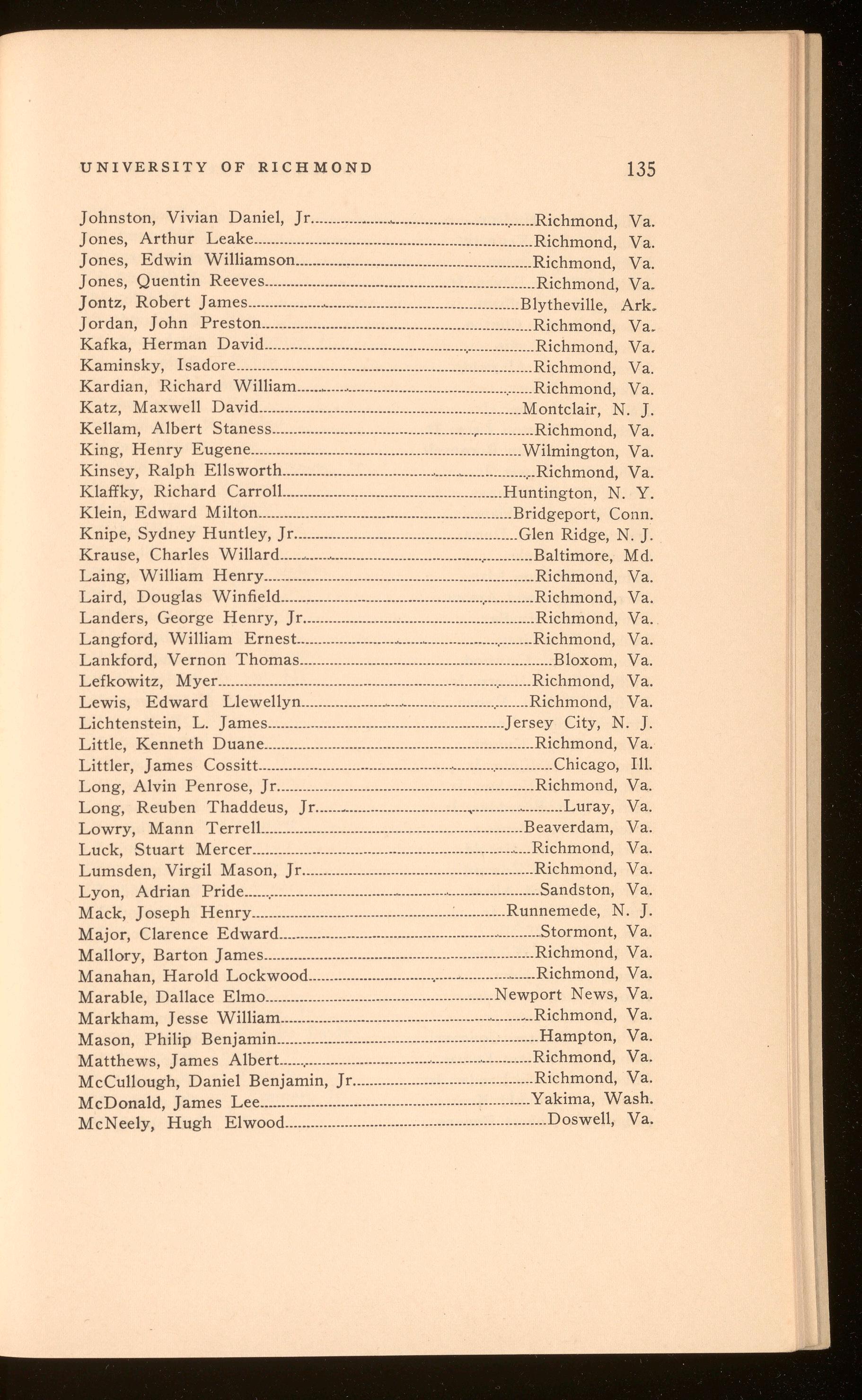
Blytheville, Ark
Jordan , John Preston ....................................................Richmond, Va
Kafka , Herman David .................................... Richmond, Va
Kamin sky , l sad o r e ............................................................... .Richmond, V a
Kardi a n , Richard William ..............................................Richmond, Va.
Kat z , M a xw e ll David .............................Montclair, N . J.
K e llam, Albert Staness ............................................, .............Richmond, Va.
Kin g, H e nry Eugene . ....................................Wilmington, Va.
Kin s ey, Ralph Ellsworth ............................................. ...Richmond, Va.
Klaffky, Richard Carroll... ..............................................Huntin g ton , N Y.
Klein, Edward Milton ..........................Bridg eport, Conn
Knip e, Sydn ey Huntley, Jr. .................................................. Glen Ridge, N. J
Krau se, Charles Willard ....., .....................................................Baltimor e, Md.
Lain g , William Henry .......................Richmond , V a.
L aird , Dou g las Winfield .............................................................Richmond , Va.
Landers , Geor ge Henry , Jr ..................................................Richmond , Va.
Lan g ford, William Erne s t ....................Richmond, Va. Lankford, Vernon Thomas .. ...Bl oxom, Va .
Lefkowitz , Myer ...............................Richmond , Va.
Lewi s , Edward Llewellyn ....................,....•............ ........Richm o nd, Va.
Lichten s t ein, L. James ............................................Jersey City, N J.
Littl e, Kenneth Duane . ..................................Richmond , Va.
Littl e r, Jame s Cossitt ....•. ..............Chica g o, Ill.
Lon g, Alvin Penrose , Jr Richm o nd, Va.
Lon g, R euben Thaddeus, Jr ...•................... .....•............•.........Lura y , Va . Lowry, Mann Terrell.. Beav e rdam, Va. Luck, Stuart Mercer .. .................................•...Richmond, Va.
Lum s den , Virgil Mason , Jr ................Richmond , V a . Lyon , Adrian Pride - Sandston, Va.
Mack , Jo seph Henry .........................Runnem ede, N . J .
Major , Clarence Edward .........Stormont, Va . Mallory, Barton James . ..............................................Richmond, Va.
Manahan, Harold Lockwood . ........................-.Richmond, Va.
Marable, Dallace Elmo . Newport N e w s, Va.
Markham, Jesse William ... Richmond, Va .
Mason, Philip Benjamin . ................Hampton, Va . Matthews , Jam e s Albert ...........................,............•...........Richmond, Va
McCullough , Daniel Benjamin , Jr Ri chmond , Va.
McDonald , James Lee ... .........Yakima , Wash .
McNeely, Hugh Elwood .................. Doswell, Va.
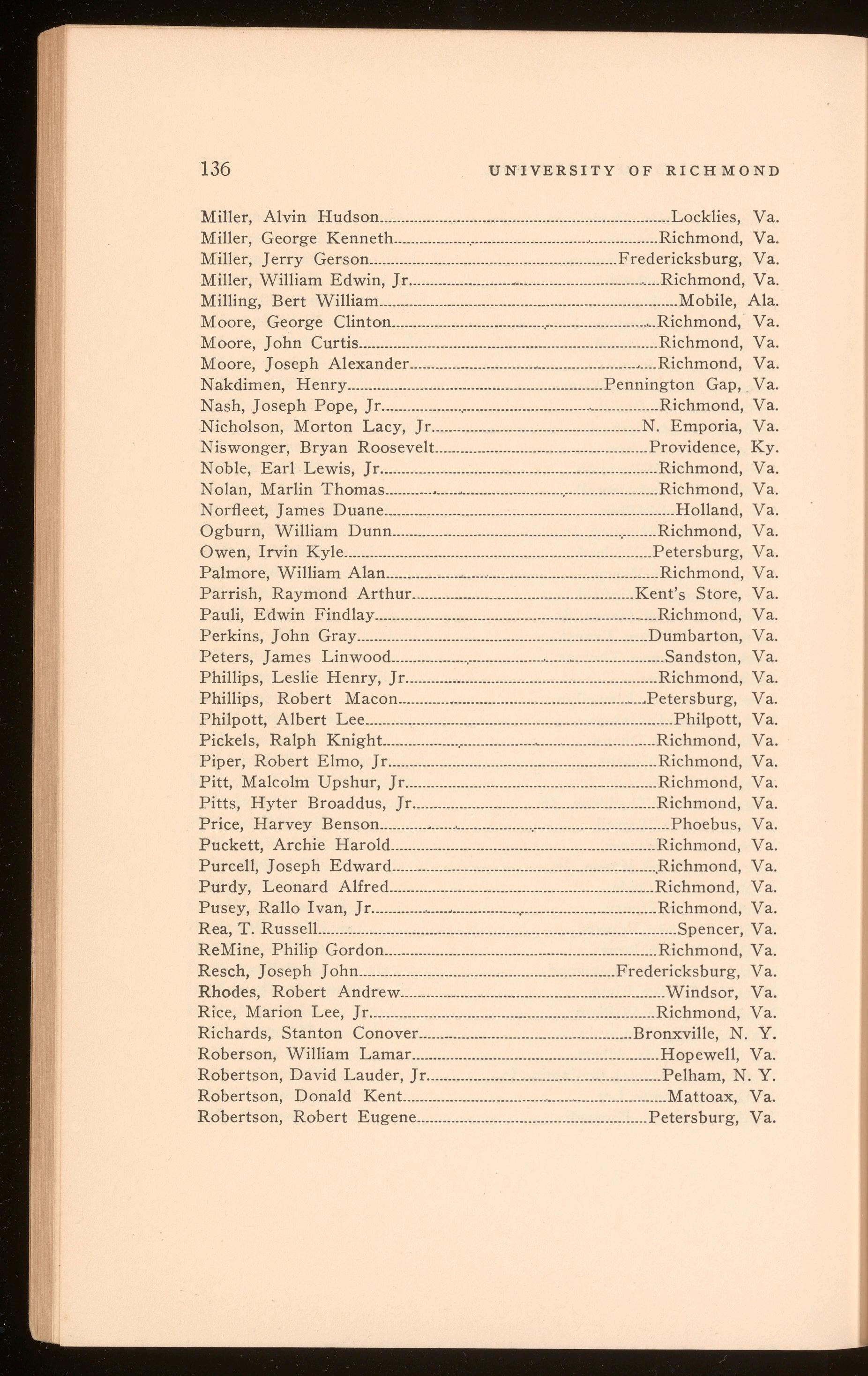
Miller, Alvin Hudson .................................................................... Locklies, Va.
Miller, George Kenneth ................................................................Richmond, Va.
Miller, Jerry Gerson .......................................................... Fredericksburg, Va.
Miller, William Edwin, Jr .......................................................•...Richmond, Va.
Milling, Bert William ...................................................................... Mobile, Ala.
Moore, George Clinton .............................................................•.Richmond, Va.
Moore, John Curtis ...................................................................... Richmond, Va.
Moore, Joseph Alexander .............................•.......................,....Richmond, Va.
N akdimen, Henry ............................................................ Pennington Gap, Va.
Nash, Joseph Pope, Jr ...................................................•...............Richmond, Va.
Nicholson, Morton Lacy, Jr.. ............................................... N. Emporia, Va.
Niswonger, Bryan Roosevelt .................................................. Providence, Ky.
Noble, Earl Lewis, Jr Richmond, Va.
Nolan, Marlin Thomas ...........•.....•...............................................Richmond, Va.
Norfleet, James Duane .................................................................... Holland, Va.
Ogburn, William Dunn ...............................................................Richmond, Va.
Owen, Irvin Kyle ........................................................................ Petersburg, Va.
Palmore, William Alan .................•.............................................. Richmond, Va.
Parrish, Raymond Arthur. Kent's Store, Va.
Pauli, Edwin Findlay .................................................................. Richmond, Va .
Perkins, John Gray .................................................................... Dumbarton, Va.
Peters, James Linwood .....................................,............................ Sandston, Va.
Phillips, Leslie Henry, Jr. .......................................................... Richmond, Va.
Phillips, Robert Macon .........................................................•Petersburg, Va.
Philpott, Albert Lee ........................................................................ Philpott, Va.
Pickets, Ralph Knight .....................................•.....-..................... Richmond, Va.
Piper, Robert Elmo, Jr ............................................................... Richmond, Va.
Pitt, Malcolm Upshur, Jr ........... Richmond, Va.
Pitts, Hyter Broaddus, Jr ......................................................... Richmond, Va.
Price, Harvey Benson ...........•..........................................................Phoebus, Va.
Puckett, Archie Harold .............................................................. Richmond, Va.
Purcell, Joseph Edward ...............................................................Richmond, Va.
Purdy, Leonard Alfred .............................................................. Richmond, Va.
Pusey, Rallo I van, J r ............, , Richmond, Va.
Rea, T. Russell .................................................................................... Spencer, Va.
ReMine, Philip Gordon ............................................................... Richmond, Va
Resch, Joseph John ............................................................ Fredericksburg, Va.
Rhodes, Robert Andrew .............................................................. Windsor, Va.
Rice, Marion Lee, Jr ................................................................... Richmond, Va.
Richards, Stanton Conover .................................................. Bronxville, N. Y.
Roberson, William Lamar .......................................................... Hopewell, Va.
Robertson, David Lauder, Jr ....................................................... Pelham, N. Y.
Robertson, Donald Kent , Mattoax, Va.
Robertson, Robert Eugene ...................................................... Petersburg, Va.
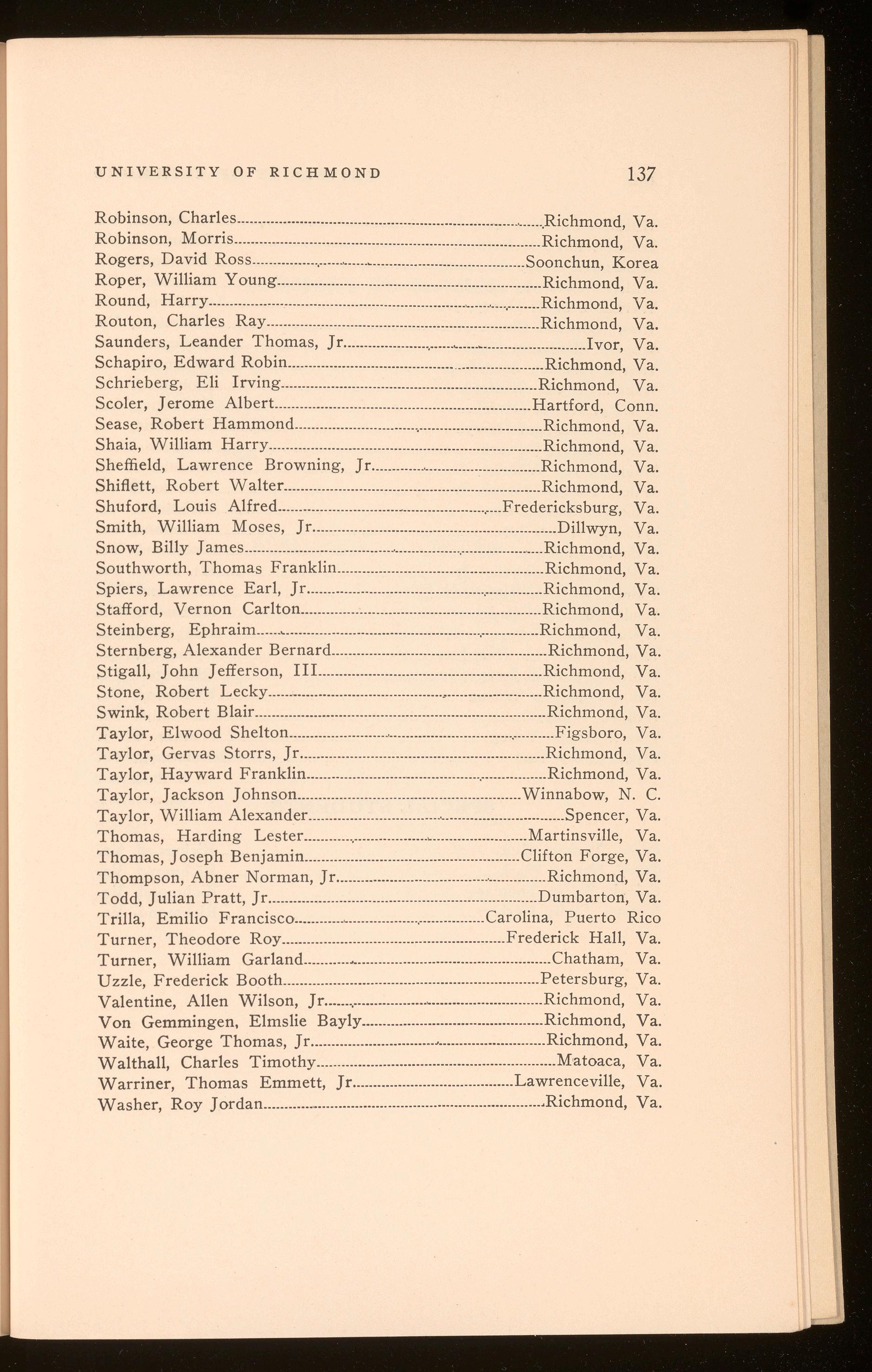
Rogers, David Ross ..............................•.....................................Soonchun, Korea
Roper, William Young Richmond, Va.
Round, Harry .............................................................. , ...................Richmond, Va.
Routon, Charles Ray ..................................................................Richmond, Va.
Saunders, Leander Thomas, Jr ............................•.....•..................... Ivor, Va.
Schapiro, Edward Robin ............................................................. Richmond, Va.
Schrieberg, Eli Irving ..............................................................Richmond, Va.
Scoler, Jerome Albert.. ............................................................Hartford, Conn.
Sease, Robert Hammond .............................................................Richmond, Va.
Shaia, William Harry ............... ..................................................Richmond, Va.
Sheffield, Lawrence Browning, Jr Richmond, Va.
Shiflett, Robert Walter ..............................................................Richmond, Va.
Shuford, Louis Alfred Fredericksburg, Va.
Smith, William Moses, Jr. ..........................................................Dillwyn, Va.
Snow, Billy J ames ...................................•.................................-...Richmond, Va.
Southworth, Thomas Franklin Richmond, Va.
Spiers, Lawrence Earl, Jr. .........................................................Richmond, Va.
Stafford, Vernon Carlton Richmond, Va.
Steinberg, Ephraim ......•..... Richmond, Va.
Sternberg, Alexander Bernard Richmond, Va.
Stigall, John Jefferson, 111......................................................Richmond, Va.
Stone, Robert Lecky .........................................., Richmond, Va.
Swink, Robert Blair ......................................................................Richmond, Va.
Taylor, Elwood Shelton ..................................................................Figsboro, Va.
Taylor, Gervas Storrs, Jr ...........................................................Richmond, Va.
Taylor, Hayward Franklin ........................ Richmond, Va.
Taylor, Jackson Johnson Winnabow, N. C.
Taylor, William Alexander Spencer, Va.
Thomas, Harding Lester ...............................•.......................Martinsville, Va.
Thomas, Joseph Benjamin ....................................................Clifton Forge, Va.
Thompson, Abner Norman, Jr Richmond, Va.
Todd, Julian Pratt, Jr .................................................................Dumbarton, Va.
Trilla, Emilio Francisco ............ Carolina, Puerto Rico
Turner, Theodore Roy Frederick Hall, Va.
Turner, William Garland ...............................................Chatham, Va.
Uzzle, Frederick Booth ..............................................................Petersburg, Va.
Valentine, Allen Wilson, Jr Richmond, Va.
Von Gemmingen, Elmslie Bayly ............................................Richmond, Va.
Waite, George Thomas, Jr ..............................,..........................Richmond, Va.
Walthall, Charles Timothy ..........................................................Matoaca, Va.
Warriner, Thomas Emmett, Jr .......................................Lawrenceville, Va.
Washer, Roy J ordan .....................................................................Richmond, Va.
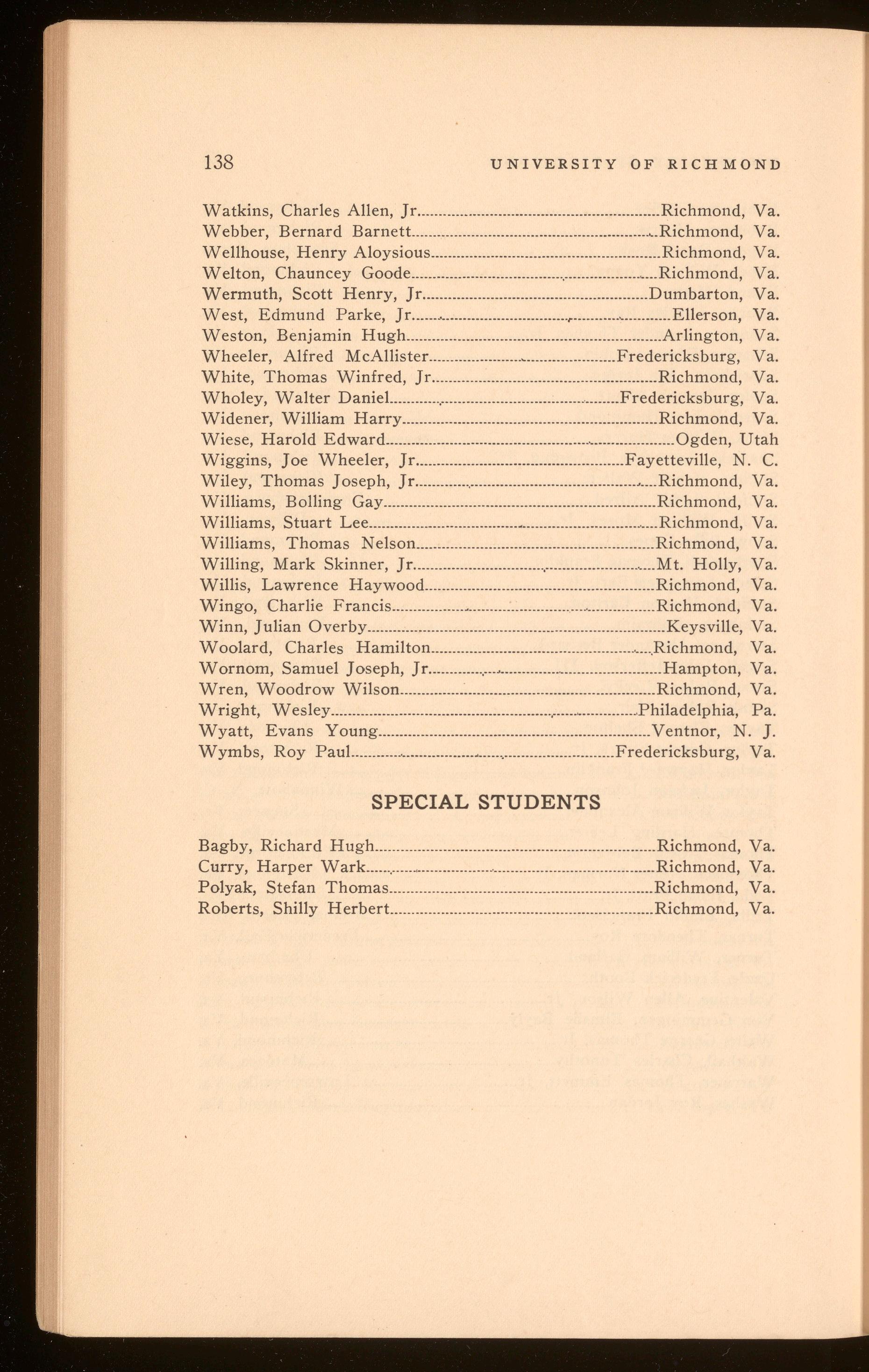
Watkins, Charles Allen, Jr. ........................................................ Richmond, Va. Webber, Bernard Barnett ..................................................... ...•.Richmond, Va. Wellhouse, Henry Aloysious ...................................................... Richmond, Va. Welton, Chauncey Goode , Richmond, Va. Wermuth, Scott Henry, Jr ..................................................... Dumbarton, Va. West, Edmund Parke, Jr ......,.............................., ..........., ........... Ellerson, Va. Weston, Benjamin Hugh ............................................................ Arlington, Va. Wheeler, Alfred McAllister ......................-..................... Fredericksburg, Va. White, Thomas Winfred, Jr. .................................................... Richmond, Va.
Wholey, Walter Daniel... ........ Fredericksburg, Va. Widener, William Harry ............................................................ Richmond, Va. Wiese, Harold Edward ................................................, ................... Ogden, Utah Wiggins, Joe Wheeler, Jr ................................................. Fayetteville, N. C. Wiley, Thomas Joseph, Jr .....................................................,.... Richmond, Va. Williams, Bolling Gay ................................................................ Richmond, Va. Williams, Stuart Lee .............·-·
Va. Williams, Thomas Nelson ........................................................ Richmond, Va. Willing, Mark Skinner, Jr Mt. Holly, Va. Willis, Lawrence Haywood ...................................................... Richmond, Va. Wingo, Charlie Francis ...............................................................Richmond, Va. Winn, Julian Overby ...................................................................... Keysville, Va. Woolard, Charles Hamilton Richmond, Va. Wornom, Samuel Joseph, Jr .................•......................................Hampton, Va. Wren, Woodrow Wilson ............................................................ Richmond, Va. Wright, W esley ...........................................................•..............Philadelphia, Pa. Wyatt, Evans Young ................................................................ Ventnor, N. J. Wymbs, Roy Paul .............•........... Fredericksburg, Va.
Bagby, Richard Hugh .................................................................. Richmond, Va. Curry, Harper Wark .......................................................................Richmond, Va. Polyak, Stefan Thomas .............................................................. Richmond, Va. Roberts, Shilly Herbert .............................................................. Richmond, Va.
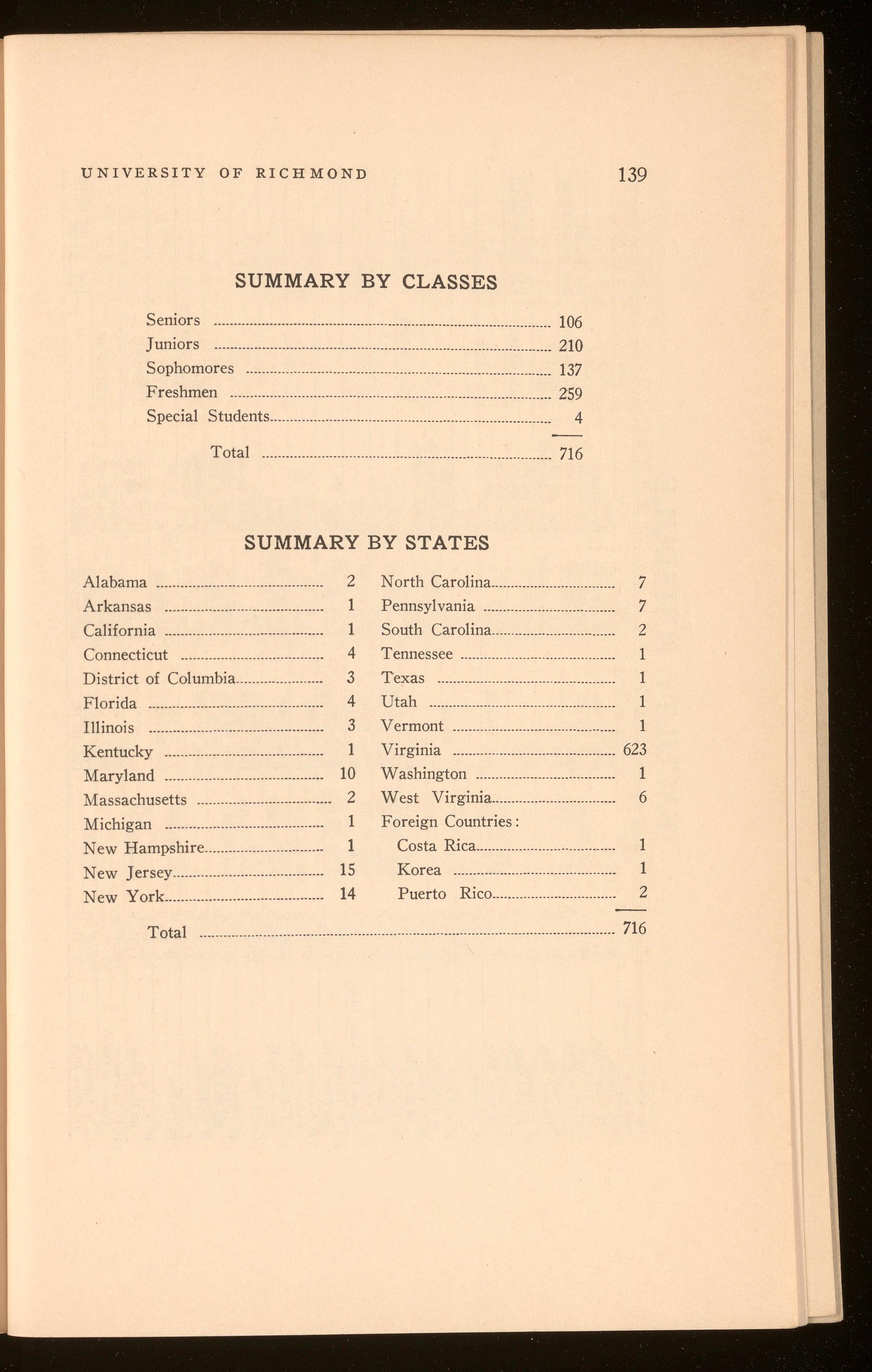
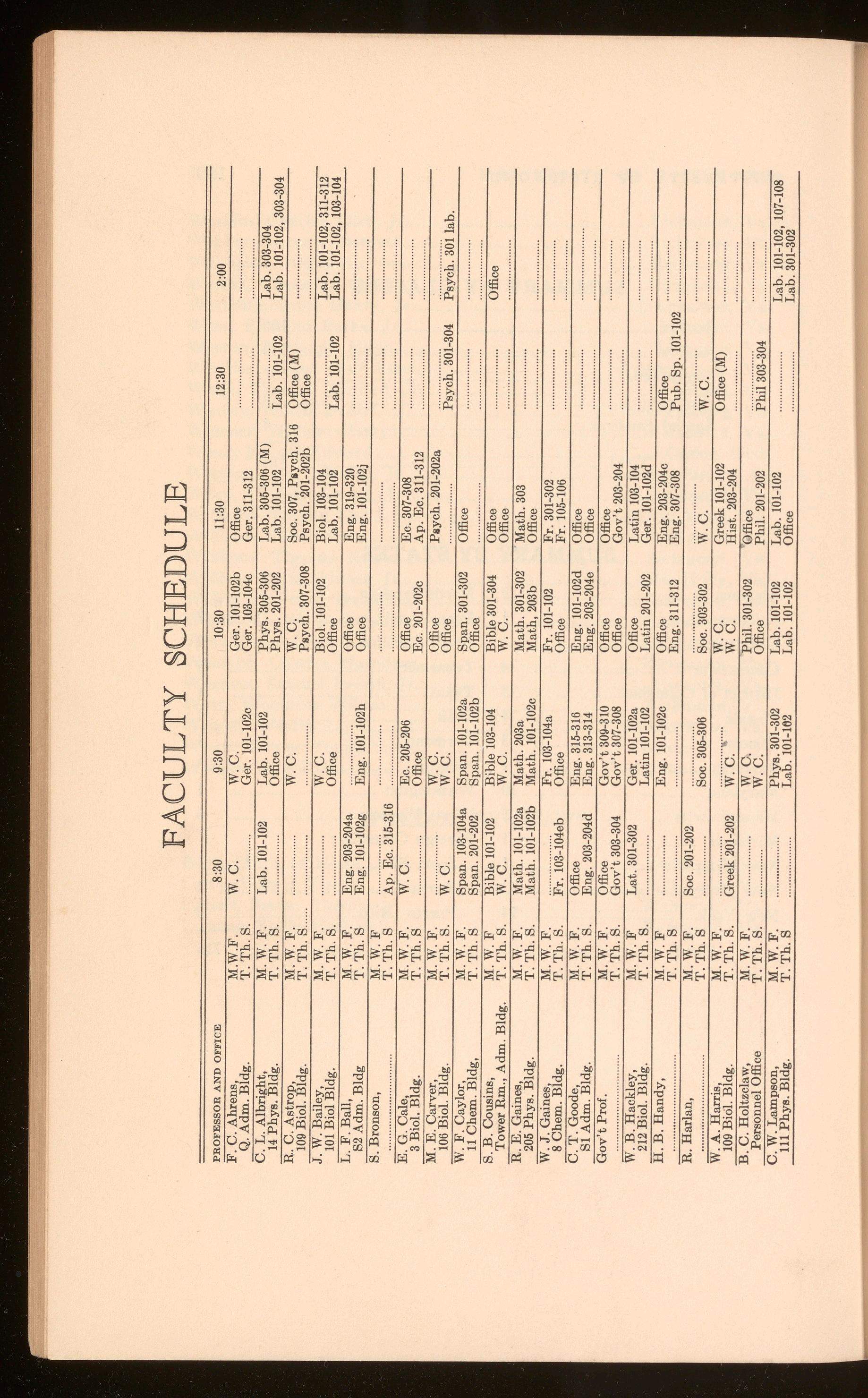
101-102, 311-312
F. C. Ahrens, M.W.F. W.C. w.c.
Q. Adm. Bldg. T.Th. S.
C. L. Albright, M.W.F.
14 Phys. Bldg. T.Th. S.
R . C. Astrop, M.W.F.
109 Biol. Bldg. T.Th. S . .
J. W. Bailey, M.W.F.
101 Biol Bldg. T.Th. S.
S2Adm. Bldg T.Th. S Eng. 101-102g
L. F. Ball, M.W.F. Eng. 203-204a E:;;ii". ioi:io2h
101-102j S. Bronson, M.W.F ....
Ee. 307-308 3 Biol. Bldg. T.Th.S Office Ee. 201-202c Ap. Ee. 311-312
T.Th. S E.G. Cale, M.W.F. Ee. 205-206
M. E. Carver, M.W.F. w.c. Office Paych. 201-202a P;y~h: aoi -3o4 P~y~h: aiii lab.
106 Biol. Bldg. T.Th.S. w.c. Office W. F. Caylor, M.W.F. Span. 103-104a Span. 101-102a Span. 301-302 11 Chem. Bldg, T. Th. S Span. 201-202 Span. 101-102b
S. B. Cousins, M.W.F Bible 101-102
Tower Rm., Adm. Bldg. T . Th. S. w.c. w.c. w.c. Office R. E . Gaines, M.W.F. Math. 101-102a Math . 203a Math. 301-302 Math. 303 205 Phys. Bldg. T.Th. S. Math. 101-102b Math. 101-102c Math, 203b
W. J. Gaines, M.W.F. F~: ioa~i04eb Fr. 103-104a Fr. 101-102 Fr 301-302
8 Chem. Bldg. T.Th. S. Office Office Fr. 105-106
C. T. Goode, M.W.F. Office Eng. 315-316
SI Adm. Bldg. T.Th. S. Eng. 203-204d Eng. 313-314
Gov't Prof. M.W.F.
T. Lavender, M.W.F.
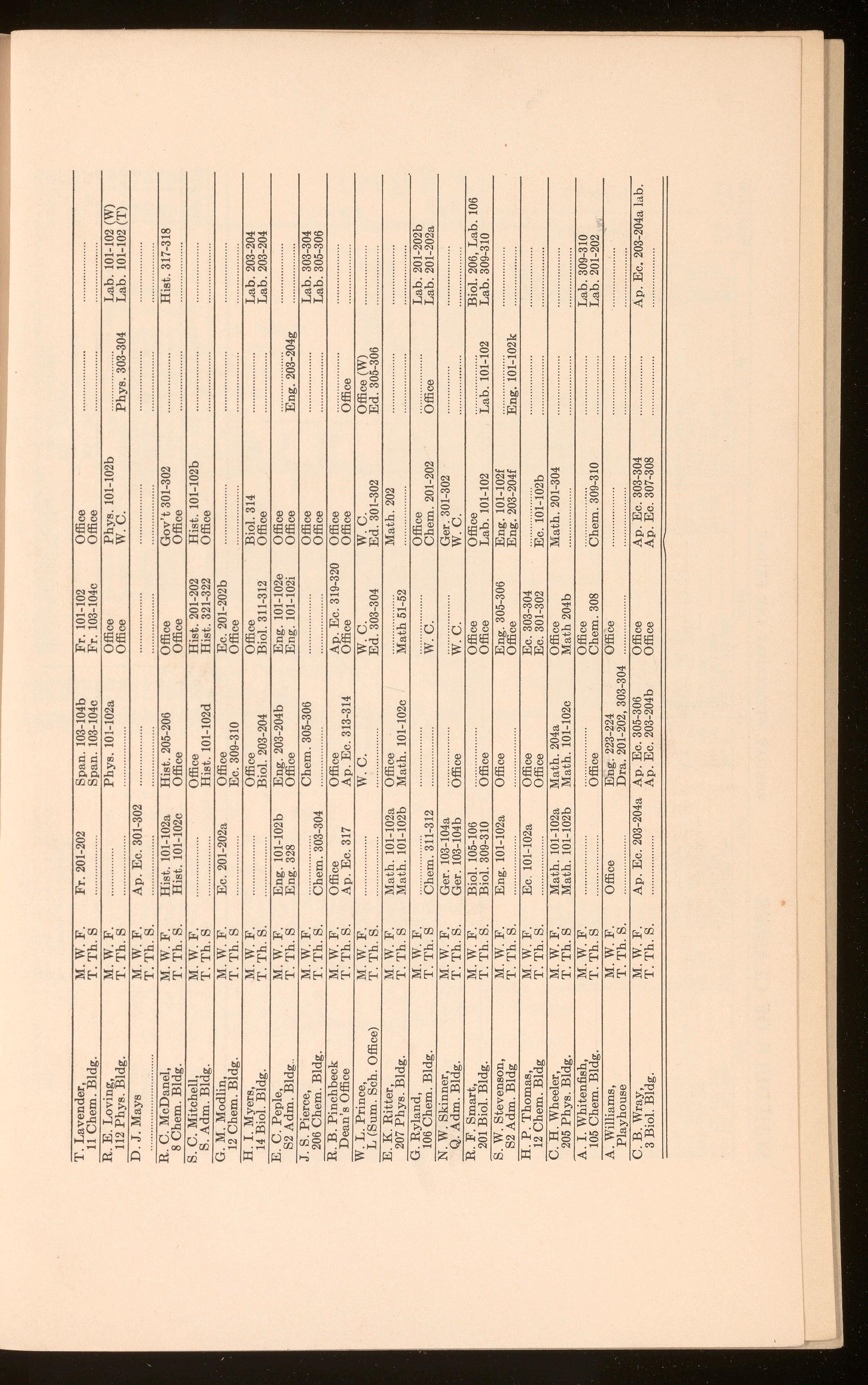
R. E . Loving,
14
E. C. Peple, M.W . F.
S2 Adm. Bldg
-
206 Chem. Bldg. T. Th. S.
J. S. Pierce, M.W.F. Che;;:;:
R. B. Pinchbeck M.W.F . Office
Dean's Office T. Th. S Ap. Ee. 317
W. L. Prince, M.W.F.
L (Sum . Sch. Office) T.Th. S.
E. K. Ritter, M.W.F. Math. 101-102a Office
201-202b 106 Chem. Bldg. T. Th. S
207 Phys. Bldg. T. Th. S Math 101-102b Math. 101-102c G. Ryland, M . W.F. Che;;:;. 31i-312
201-202a N. W. Skinner, M.W.F. Ger. 103-104a
· Ger. 301-302 Q. Adm. Bldg. T.Th. S. Ger . 103104b w . c. w.c. R. F. Smart, M.W . F. Biol. 105-106 Oiiice Office Office Biol. 206, Lab. 106 201 Biol. Bldg. T. Th. S. Biol. 309-310
Lab. 101102 Lab. 101102 Lab. 309310 S. W. Stevenson, M.W.F. Eng. 101-102a Office Eng. 305306 Eng. 101-102f E-;;g: 1iii:io2k S2Adm. Bldg T. Th. S.
Office Eng. 203-204f H.P. Thomas, M.W.F. Ee. 101-102a Office Ee. 303-304 'Ee. 101:io2b 12 Chem . Bldg T. Th. S. Office Ee. 301-302 C. H. Wheeler, M.W.F. Math. 101-102a Math 204a Office Math. 201-304 205 Phys. Bldg. T.Th.S Math. 101-102b Math . 101-102c Math 204b A. I. Whitenfish, M.W.F. Oiii.ce Office de;;:;: 309-310 Lah. 309-310 105 Chem. Bldg. T. Th.S Chem. 308 Lab. 201-202 A. Williams, M.W.F. Office Eng. 223-224 Office Playho u se T.Th. S. Dra. 201-202, 303304 C. B. Wray, M.W.F. Ap. Ee. 203-204a Ap. Ee. 305306
Office Ap. Ee. 303-304 Ap. Ee. 203-204a l ab. 3 Biol. Bldg. T. Th. S. Ap. Ee. 203204b
Office Ap. Ee. 307-308
12:3011:20 to to 1:10
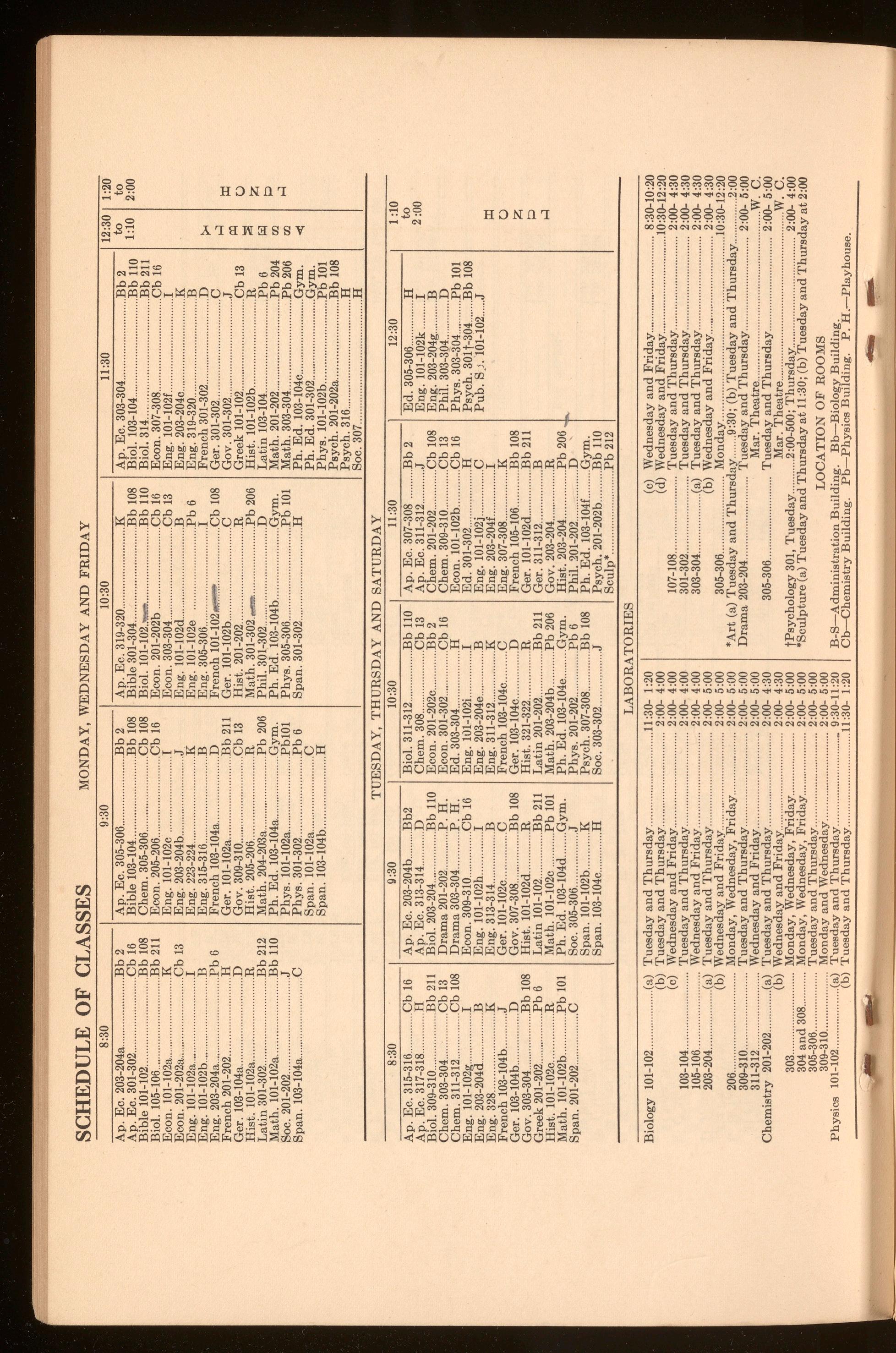
Eng. 203-204b J Eng. 223-224 K Eng. 315-316 B French 103-104a D..................... Ger. 101-102a ....
Bb 211 Gov 309-310 Cb 13 Econ. 303-304.. Cb 13 Eng. 101-!02d . . B.................... Eng. 101-102e Pb 6 Eng . 305-306 . . ...................... ! French 101-102.................. Cb 108 Ger 101-102b C Hist . 201-202 . .. R............................ Eng. 101-102f . . . . . .I Eng. 203-204c K Eng. 319320 B French 301-302.. . . D............ Ger. 301302 C Gov. 301-302 J Greek 101-102 Cb 13 Hist. 101-102a R Hist. 205-206 R M a th. 301-302. -.. . . .... . Pb 206 Hist. 101-102b. . R Latin 301-302...... . .......... Bb 212 Math. 204-203 a. . ....... . ..... Pb 206 Phil. 301-302 . ..... ....................... D Latin 103-104
Pb 6 Math. 101-102a ... . ................ Bb 110 Soc. 201-202 J Ph. Ed. 103-104a .. .
Gym. Phys. 101-102a PblOI Ph. Ed. 103-104b .... Gym. Phys. 305-306 Pb 1 01 Math. 201-202..
Gym. Ph. Ed. 301302 Gym Phys. 101-102b.
Pb 101 Psych. 201-202a
H.............. Span. 301-302 ............................... H Ph. Ed. 103-104c
Pb 204 Math. 303-304 Pb 206 Span. 103-104a ........................... C Phys. 301-302 Pb 6 Span. 101-102a C Span. 103-104b .
TUESDAY, THURSDAY AND SATURDAY 8 : 30 0:30 10:30 I 11:30 12:30
.
C Eng. 203-204f ............... ! Eng. 307-308. . K French 105106 Bb 108 Ed. 305306 ............. H Eng. 101-102k I... Eng. 203-204g ... . .. .. B... Phil. 303-394.. D Phys . 303-304 . ... ....... Pb 101 Psych 301 t-304 Bb 108 Pub S.J. 101-102 J Gov. 303-304 ................... Bb 108 Hist 101-102d R Hist. 321-322 ............... R Ger . 101-102d ............... Bb 211 Greek 201-202 ................. Pb 6 L a tin 101-102 Bb 211 Latin 201-202 Bb 211 Ger. 311-312 ................ B Hist. 101-102c R Math. 101-102c ..... . ... Pb 101 Math. 203-204b ........... Pb 206 Gov. 203-204 R Math . 101102b .......... Pb 101 Span. 201-202 ..... . .. C Ph. Ed 103-104d Gym. Soc. 305-306 J Span. 101-102b K Span 103104c H Ph Ed. 103104e Gym Phys. 201-202 Pb 6 Psych . 307-308 ............. Bb 108 Soc. 303-302. .. . ....... J Hist. 203-204. .. . .... Pb 206 -+Phil. 201-202 D ' Ph . Ed. 103-104£. . Gym. Psych . 201-202b ......... Bb 110 Sculp* . Pb 212
Ap. Ee. 315-316 Cb 16 Ap. Ee . 317-318 ......... H Biol. 309-310 ................... Bb 211 Chem. 303-304 Cb 13 Chem 311-312 Cb 108 Eng. 101102g
. B.. Eng. 328 ..................... K French 103-104 b J Ger. 103-104b D Ap. Ee. 203-204b . . . Bb2 Ap. Ee. 313-314 D Biol. 203-204 Bb 110 Drama 201202. . .. P.H . Drama 303-304 ........... P.H. Econ 309-310 Cb 16 Eng. 10!-102h ............. ! Eng. 313-314 B Ger . 101102c ............... C Gov. 307-308 ................. Bb 108 Biol. 311-312 Bb 110 Chem. 308 ..................... Cb 13 Econ. 201-202c .. . .. .. Bb 2 Econ 301-302 Cb 16 Ed. 303-304 ................... H Eng. 101-102i ! Eng. 203-204e B............... Eng. 311-312 ....... . K... French 103104c C Ger 1Q3-104c D Ap . Ee . 307-308 .......... Bb 2 Ap. Ee. 311-312 . .......... J Chem. 201-202 ............. Cb 108 Chem. 309-310 Cb 13 Econ. 101102b Cb 16 Ed. 301-302 H................... Eng. 101-102j
.I Eng. 203204d .
